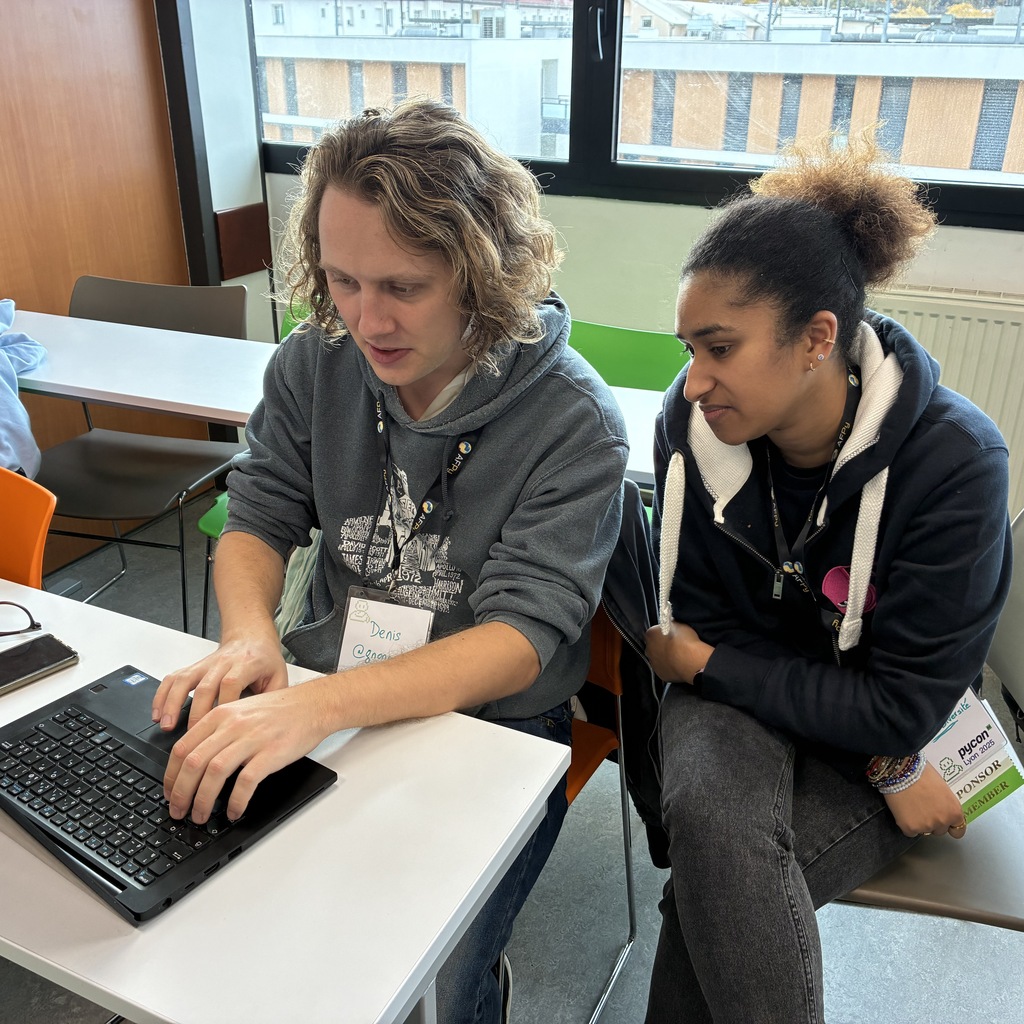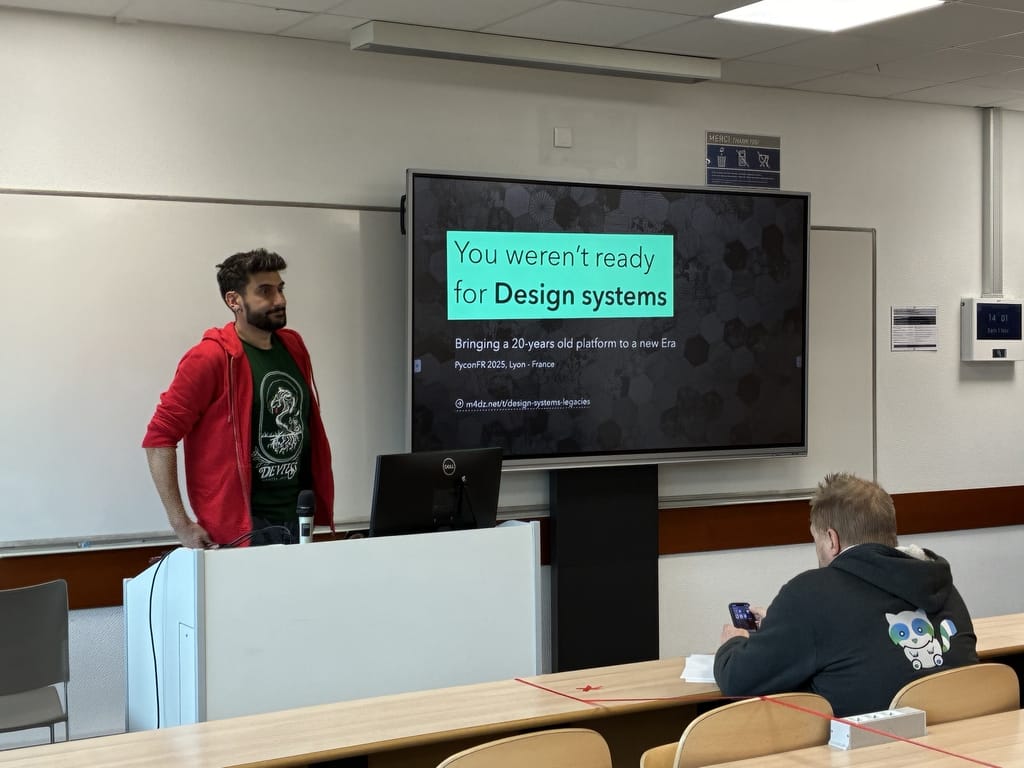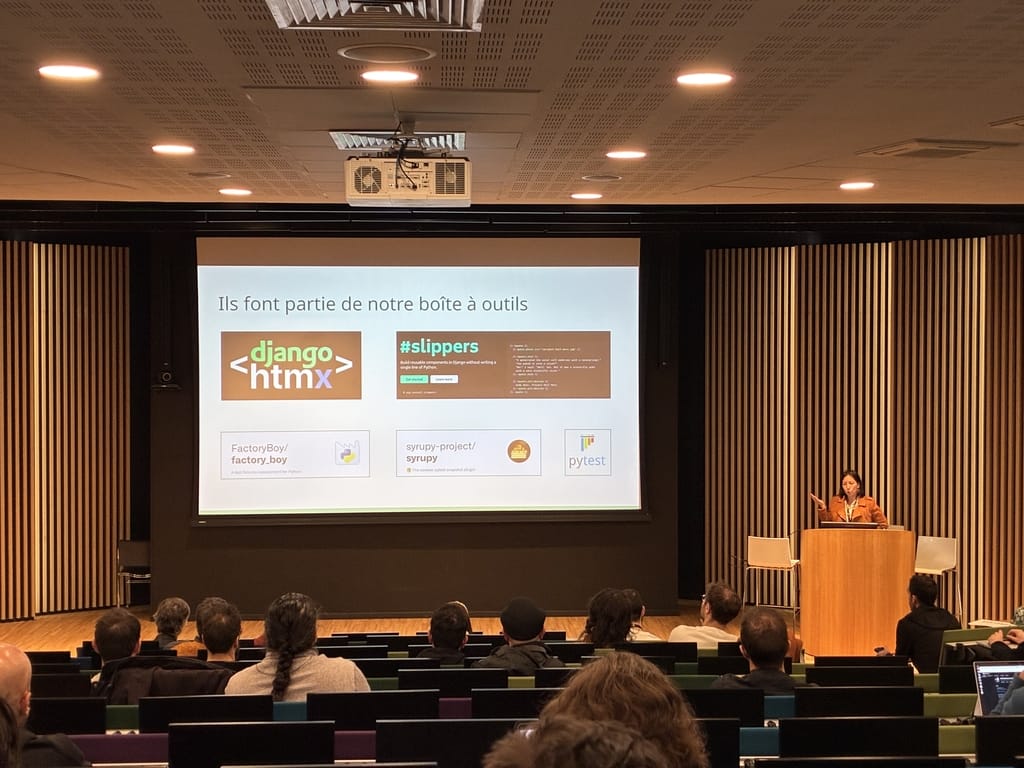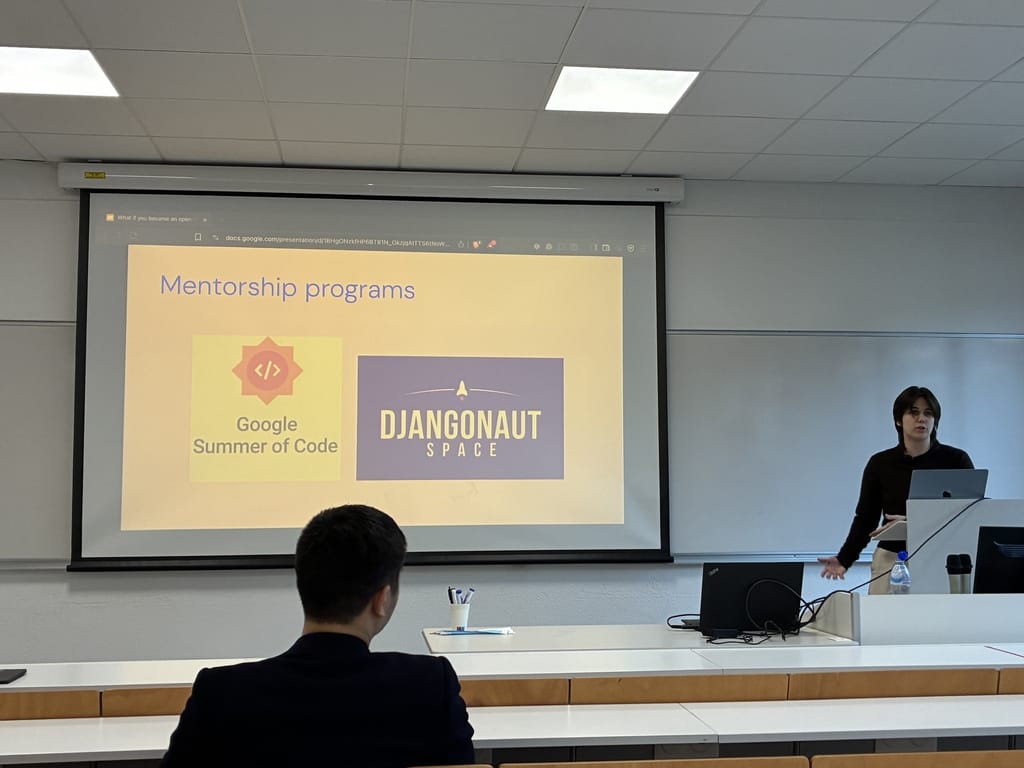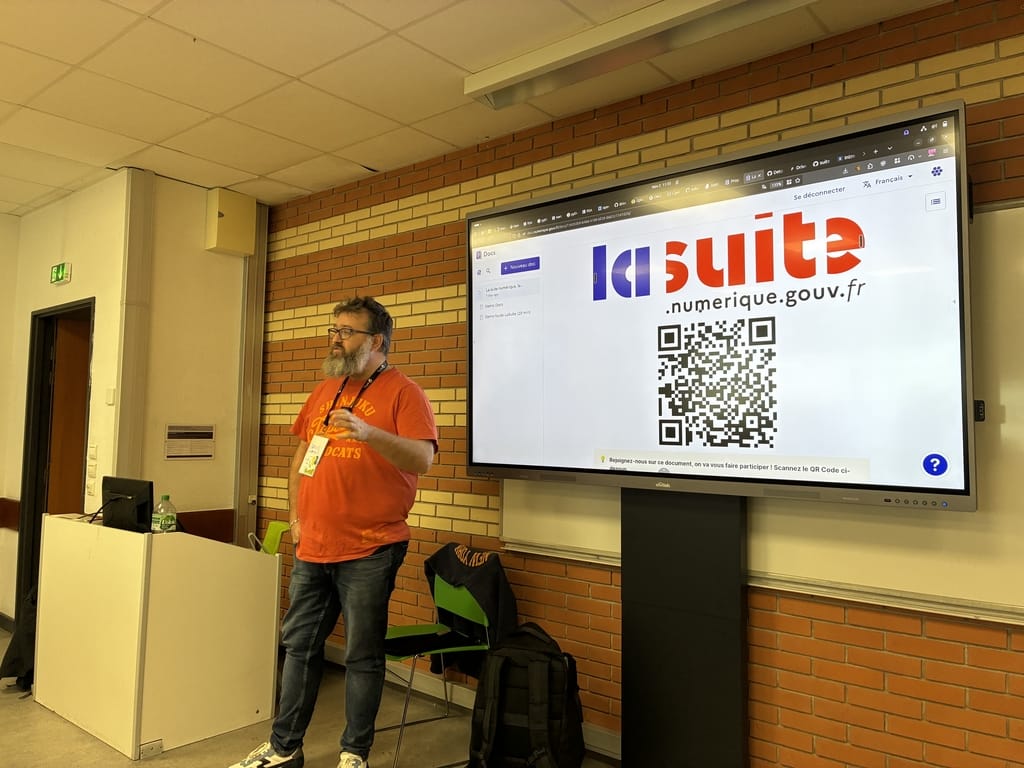Recent Entries
Tech (100)
Latest news about Django, the Python web framework.
From The Django weblog at 2026-02-21 09:11:04
DSF member of the month - Baptiste Mispelon
For February 2026, we welcome Baptiste Mispelon as our DSF member of the month! ⭐
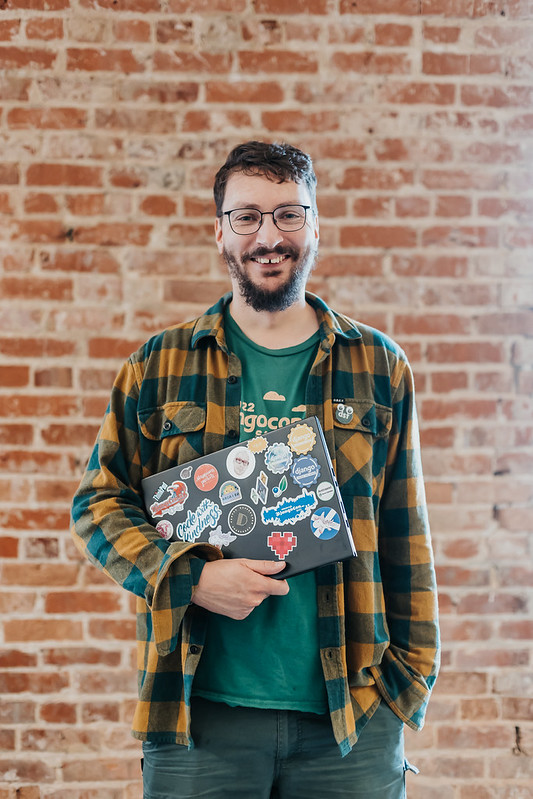 Photo by Bartek Pawlik - bartpawlik.format.com
Photo by Bartek Pawlik - bartpawlik.format.com
Baptiste is a long-time Django and Python contributor who co-created the Django Under the Hood conference series and serves on the Ops team maintaining its infrastructure. He has been a DSF member since November 2014. You can learn more about Baptiste by visiting Baptiste's website and his GitHub Profile.
Let’s spend some time getting to know Baptiste better!
Can you tell us a little about yourself? (hobbies, education, etc)
I'm a French immigrant living in Norway. In the day time I work as software engineer at Torchbox building Django and Wagtail sites. Education-wise I'm a "self-taught" (whatever that means) developer and started working when I was very young. In terms of hobbies, I'm a big language nerd and I'm always up for a good etymology fact. I also enjoy the outdoor whether it's on a mountain bike or on foot (still not convinced by this skiing thing they do in Norway, but I'm trying).
How did you start using Django?
I was working in a startup where I had built an unmaintainable pile of custom framework-less PHP code. I'd heard of this cool Python framework and thought it would help me bring some structure to our codebase. So I started rewriting our services bit-by-bit and eventually switched everything to Django after about a year.
In 2012, I bought a ticket to DjangoCon Europe in Zurich and went there not knowing anyone. It was one of the best decisions of my life: the Django community welcomed me and has given me so much over the years.
What other framework do you know and if there is anything you would like to have in Django if you had magical powers?
I've been making website for more than two decades now, so I've used my fair share of various technologies and frameworks, but Django is still my "daily driver" and the one I like the best. I like writing plain CSS, and when I need some extra bit of JS I like to use Alpine JS and/or HTMX: I find they work really well together with Django.
If I had magical powers and could change anything, I would remove the word "patch" from existence (and especially from the Django documentation).
What projects are you working on now?
I don't have any big projects active at the moment, I'm mostly working on client projects at work.
Which Django libraries are your favorite (core or 3rd party)?
My favorite Django library of all time is possibly django-admin-dracula. It's the perfect combination of professional and whimsical for me.
Other than that I'm also a big fan of the Wagtail CMS. I've been learning more and more about it in the past year and I've really been liking it. The code feels very Django-y and the community around it is lovely as well.
What are the top three things in Django that you like?
1) First of course is the people. I know it's a cliche but the community is what makes Django so special.
2) In terms of the framework, what brought me to it in the first place was its opinionated structure and settings. When I started working with Django I didn't really know much about web development, but Django's standard project structure and excellent defaults meant that I could just use things out of the box knowing I was building something solid. And more than that, as my skills and knowledge grew I was able to swap out those defaults with some more custom things that worked better for me. There's room to grow and the transition has always felt very smooth for me.
3) And if I had to pick a single feature, then I'd go for one that I think is underrated: assertQuerySetEqual(). I think more people should be using it!
What is it like to be in the Ops team?
It's both very exciting and very boring 😅
Most of the tasks we do are very mundane: create DNS records, update a server, deploy a fix. But because we have access and control over a big part of the infrastructure that powers the Django community, it's also a big responsibility which we don't take lightly.
I know you were one of the first members of the Django Girls Foundation board of directors. That's amazing! How did that start for you?
By 2014 I'd become good friend with Ola & Ola and in July they asked me to be a coach at the very first Django Girls workshop at EuroPython in Berlin. The energy at that event was amazing an unlike any other event I'd been a part of, so I got hooked.
I went on to coach at many other workshops after that. When Ola & Ola had the idea to start an official entity for Django Girls, they needed a token white guy and I gladly accepted the role!
You co-created Django Under the Hood series which, from what I've heard, was very successful at the time. Can you tell us a little more about this conference and its beginnings?
I'm still really proud of having been on that team and of what we achieved with this conference. So many stories to tell!
I believe it all started at the Django Village conference where Marc Tamlin and I were looking for ideas for how to bring the Django core team together.
We thought that having a conference would be a good way to give an excuse (and raise funds) for people to travel all to the same place and work on Django. Somehow we decided that Amsterdam was the perfect place for that.
Then we were extremely lucky that a bunch of talented folks actually turned that idea into a reality: Sasha, Ola, Tomek, Ola, Remco, Kasia (and many others) 💖.
As a former conference organizer and volunteer, do you have any recommendations for those who want to contribute or organize a conference?
I think our industry (and even the world in general) is in a very different place today than a decade ago when I was actively organizing conferences. Honestly I'm not sure it would be as easy today to do the things we've done.
My recommendation is to do it if you can. I've forged some real friendships in my time as an organizer, and as exhausting and stressful as it can be, it's also immensely rewarding in its own way.
The hard lesson I'd also give is that you should pay attention to who gets to come to your events, and more importantly who doesn't. Organizing a conference is essentially making a million decisions, most of which are really boring. But every decision you make has an effect when it's combined with all the others. The food you serve or don't serve, the time of year your event takes place, its location. Whether you spend your budget on fun tshirts, or on travel grants.
All of it makes a difference somehow.
Do you remember your first contribution in Django?
I do! It was commit ac8eb82abb23f7ae50ab85100619f13257b03526: a one character typo fix in an error message 😂
Is there anything else you’d like to say?
Open source is made of people, not code. You'll never go wrong by investing in your community. Claude will never love you back.
Thank you for doing the interview, Baptiste !
From The Django weblog at 2026-02-19 15:51:00
Plan to Adopt Contributor Covenant 3 as Django’s New Code of Conduct
Last month we announced our plan to adopt Contributor Covenant 3 as Django's new Code of Conduct through a multi-step process. Today we're excited to share that we've completed the first step of that journey!
What We've Done
We've merged new documentation that outlines how any member of the Django community can propose changes to our Code of Conduct and related policies. This creates a transparent, community-driven process for keeping our policies current and relevant.
The new process includes:
- Proposing Changes: Anyone can open an issue with a clear description of their proposed change and the rationale behind it.
- Community Review: The Code of Conduct Working Group will discuss proposals in our monthly meetings and may solicit broader community feedback through the forum, Discord, or DSF Slack.
- Approval and Announcement: Once consensus is reached, changes are merged and announced to the community. Changes to the Code of Conduct itself will be sent to the DSF Board for final approval.
How You Can Get Involved
We welcome and encourage participation from everyone in the Django community! Here's how you can engage with this process:
- Share Your Ideas: If you have suggestions for improving our Code of Conduct or related documentation, open an issue on our GitHub repo.
- Join the Discussion: Participate in community discussions about proposed changes on the forum, Discord, or DSF Slack. Keep it positive, constructive, and respectful.
- Stay Informed: Watch the Code of Conduct repository to follow along with proposed changes and discussions.
- Provide Feedback: Not comfortable with GitHub? You can also reach out via conduct@djangoproject.com, or look for anyone with the
Code of Conduct WGrole on Discord.
What's Next
We're moving forward with the remaining steps of our plan:
- Step 2 (target: March 15): Update our Enforcement Manual, Reporting Guidelines, and FAQs via pull request 91.
- Step 3 (target: April 15): Adopt the Contributor Covenant 3 with proposed changes from the working group.
Each step will have its own pull request where the community can review and provide feedback before we merge. We're committed to taking the time needed to incorporate your input thoughtfully.
Thank you for being part of this important work to make Django a more welcoming and inclusive community for everyone!
From The Django weblog at 2026-02-11 14:44:22
Django Steering Council 2025 Year in Review
The members of the Steering Council wanted to provide you all with a quick TL;DR of our work in 2025.
First off, we were elected at the end of 2024 and got started in earnest in early 2025 with the mission to revive and dramatically increase the role of the Steering Council.
We're meeting for a video conference at least monthly, you can deep dive into the meeting notes to see what we've been up to. We also have set up Slack channels we use to communicate in between meetings to keep action items moving along.
One of the first things we did was temporarily suspend much of the process around DEP 10. Its heart is in the right place, but it's just too complex and cumbersome day-to-day with a primarily volunteer organization. We're slowly making progress on a revamped and simplified process that addresses our concerns. It is our goal to finish this before our terms expire.
New Features Process
We've moved the process for proposing new features out of the Django Forum and mailing lists to new-features Github repository.
We made this change for a variety of reasons, but the largest being to reduce the workload for the Django Fellows in shepherding the process and answering related questions.
Community Ecosystem Page
One of our main goals is to increase the visibility of the amazing Django third-party package ecosystem. Long time Django users know which packages to use, which you can trust, and which ones may be perfect for certain use cases. However, MANY newer or more casual Django users are often unaware of these great tools and not sure where to even begin.
As a first step, we've added the Community Ecosystem page which highlights several amazing resources to keep in touch with what is going on with Django, how to find recommended packages, and a sample list of those packages the Steering Council itself recommends and uses frequently.
Administrative bits
There has been work on better formalizing and documenting our processes and building documentation to make it much easier for the next Steering Council members.
There has also been fair bit of work around helping organize Google Summer of Code participants to help ensure the projects undertaken are ones that will ultimately be accepted smoothly into Django.
Another area we have focused on is a simplified DEP process. We're still formalizing this, but the idea is to have the Steering Council do the majority of the heavy lifting on writing these and in a format that is shorter/simpler to reduce the friction of creating larger more complicated DEPs.
We have also been in discussions with various third parties about acquiring funding for some of the new features and updates on the horizon.
It's been a productive year and we're aiming to have 2026 be as productive if not more so. We're still setting all of our 2026 goals and will report on those soon.
Please reach out to the Steering Council directly if you have any questions or concerns.
From The Django weblog at 2026-02-04 16:00:00
Recent trends in the work of the Django Security Team
Yesterday, Django issued security releases mitigating six vulnerabilities of varying severity. Django is a secure web framework, and that hasn’t changed. What feels new is the remarkable consistency across the reports we receive now.
Almost every report now is a variation on a prior vulnerability. Instead of uncovering new classes of issues, these reports explore how an underlying pattern from a recent advisory might surface in a similar code path or under a slightly different configuration. These reports are often technically plausible but only sometimes worth fixing. Over time, this has shifted the Security Team’s work away from discovery towards deciding how far a given precedent should extend and whether the impact of the marginal variation rises to the level of a vulnerability.
Take yesterday’s releases:
We patched a “low” severity user enumeration vulnerability in the mod_wsgi authentication handler (CVE 2025-13473). It’s a straightforward variation on CVE 2024-39329, which affected authentication more generally.
We also patched two potential denial-of-service vulnerabilities when handling large, malformed inputs. One exploits inefficient string concatenation in header parsing under ASGI (CVE 2025-14550). Concatenating strings in a loop is known to be slow, and we’ve done fixes in public where the impact is low. The other one (CVE 2026-1285) exploits deeply nested entities. December’s vulnerability in the XML serializer (CVE 2025-64460) was about those very two themes.
Finally, we also patched three potential SQL injection vulnerabilities. One envisioned a developer passing unsanitized user input to a niche feature of the PostGIS backend (CVE 2026-1207), much like CVE 2020-9402. Our security reporting policy assumes that developers are aware of the risks when passing unsanitized user input directly to the ORM. But the division between SQL statements and parameters is well ingrained, and the expectation is that Django will not fail to escape parameters. The last two vulnerabilities (CVE 2026-1287 and CVE 2026-1312) targeted user-controlled column aliases, the latest in a stream of reports stemming from CVE 2022-28346, involving unpacking **kwargs into .filter() and friends, including four security releases in a row in late 2025. You might ask, “who would unpack **kwargs into the ORM?!” But imagine letting users name aggregations in configurable reports. You would have something more like a parameter, and so you would appreciate some protection against crafted inputs.
On top of all that, on a nearly daily basis we get reports duplicating other pending reports, or even reports about vulnerabilities that have already been fixed and publicized. Clearly, reporters are using LLMs to generate (initially) plausible variations.
Security releases come with costs to the community. They interrupt our users’ development workflows, and they also severely interrupt ours.
There are alternatives. The long tail of reports about user-controlled aliases presents an obvious one: we can just re-architect that area. (Thanks to Simon Charette for a pull request doing just that!) Beyond that, there are more drastic alternatives. We can confirm fewer vulnerabilities by placing a higher value on a user's duty to validate inputs, placing a lower value on our prior precedents, or fixing lower severity issues publicly. The risk there is underreacting, or seeing our development workflow disrupted anyway when a decision not to confirm a vulnerability is challenged.
Reporters are clearly benefiting from our commitment to being consistent. For the moment, the Security Team hopes that reacting in a consistent way—even if it means sometimes issuing six patches—outweighs the cost of the security process. It’s something we’re weighing.
As always, keep the responsibly vetted reports coming to security@djangoproject.com.
From The Django weblog at 2026-02-03 14:13:48
Django security releases issued: 6.0.2, 5.2.11, and 4.2.28
In accordance with our security release policy, the Django team is issuing releases for Django 6.0.2, Django 5.2.11, and Django 4.2.28. These releases address the security issues detailed below. We encourage all users of Django to upgrade as soon as possible.
CVE-2025-13473: Username enumeration through timing difference in mod_wsgi authentication handler
The django.contrib.auth.handlers.modwsgi.check_password() function for authentication via mod_wsgi allowed remote attackers to enumerate users via a timing attack.
Thanks to Stackered for the report.
This issue has severity "low" according to the Django security policy.
CVE-2025-14550: Potential denial-of-service vulnerability via repeated headers when using ASGI
When receiving duplicates of a single header, ASGIRequest allowed a remote attacker to cause a potential denial-of-service via a specifically created request with multiple duplicate headers. The vulnerability resulted from repeated string concatenation while combining repeated headers, which produced super-linear computation resulting in service degradation or outage.
Thanks to Jiyong Yang for the report.
This issue has severity "moderate" according to the Django security policy.
CVE-2026-1207: Potential SQL injection via raster lookups on PostGIS
Raster lookups on GIS fields (only implemented on PostGIS) were subject to SQL injection if untrusted data was used as a band index.
As a reminder, all untrusted user input should be validated before use.
Thanks to Tarek Nakkouch for the report.
This issue has severity "high" according to the Django security policy.
CVE-2026-1285: Potential denial-of-service vulnerability in django.utils.text.Truncator HTML methods
django.utils.text.Truncator.chars() and Truncator.words() methods (with html=True) and truncatechars_html and truncatewords_html template filters were subject to a potential denial-of-service attack via certain inputs with a large number of unmatched HTML end tags, which could cause quadratic time complexity during HTML parsing.
Thanks to Seokchan Yoon for the report.
This issue has severity "moderate" according to the Django security policy.
CVE-2026-1287: Potential SQL injection in column aliases via control characters
FilteredRelation was subject to SQL injection in column aliases via control characters, using a suitably crafted dictionary, with dictionary expansion, as the **kwargs passed to QuerySet methods annotate(), aggregate(), extra(), values(), values_list(), and alias().
Thanks to Solomon Kebede for the report.
This issue has severity "high" according to the Django security policy.
CVE-2026-1312: Potential SQL injection via QuerySet.order_by and FilteredRelation
QuerySet.order_by() was subject to SQL injection in column aliases containing periods when the same alias was, using a suitably crafted dictionary, with dictionary expansion, used in FilteredRelation.
Thanks to Solomon Kebede for the report.
This issue has severity "high" according to the Django security policy.
Affected supported versions
- Django main
- Django 6.0
- Django 5.2
- Django 4.2
Resolution
Patches to resolve the issue have been applied to Django's main, 6.0, 5.2, and 4.2 branches. The patches may be obtained from the following changesets.
CVE-2025-13473: Username enumeration through timing difference in mod_wsgi authentication handler
- On the main branch
- On the 6.0 branch
- On the 5.2 branch
- On the 4.2 branch
CVE-2025-14550: Potential denial-of-service vulnerability via repeated headers when using ASGI
- On the main branch
- On the 6.0 branch
- On the 5.2 branch
- On the 4.2 branch
CVE-2026-1207: Potential SQL injection via raster lookups on PostGIS
- On the main branch
- On the 6.0 branch
- On the 5.2 branch
- On the 4.2 branch
CVE-2026-1285: Potential denial-of-service vulnerability in django.utils.text.Truncator HTML methods
- On the main branch
- On the 6.0 branch
- On the 5.2 branch
- On the 4.2 branch
CVE-2026-1287: Potential SQL injection in column aliases via control characters
- On the main branch
- On the 6.0 branch
- On the 5.2 branch
- On the 4.2 branch
CVE-2026-1312: Potential SQL injection via QuerySet.order_by and FilteredRelation
- On the main branch
- On the 6.0 branch
- On the 5.2 branch
- On the 4.2 branch
The following releases have been issued
- Django 6.0.2 (download Django 6.0.2 | 6.0.2 checksums)
- Django 5.2.11 (download Django 5.2.11 | 5.2.11 checksums)
- Django 4.2.28 (download Django 4.2.28 | 4.2.28 checksums)
The PGP key ID used for this release is Jacob Walls: 131403F4D16D8DC7
General notes regarding security reporting
As always, we ask that potential security issues be reported via private email to security@djangoproject.com, and not via Django's Trac instance, nor via the Django Forum. Please see our security policies for further information.
From The Django weblog at 2026-01-21 18:13:15
Djangonaut Space - Session 6 Accepting Applications
We are thrilled to announce that Djangonaut Space, a mentorship program for contributing to Django, is open for applicants for our next cohort! 🚀
Djangonaut Space is holding a sixth session! This session will start on March 2nd, 2026. We are currently accepting applications until February 2nd, 2026 Anywhere on Earth. More details can be found in the website.
Djangonaut Space is a free, 8-week group mentoring program where individuals will work self-paced in a semi-structured learning environment. It seeks to help members of the community who wish to level up their current Django code contributions and potentially take on leadership roles in Django in the future.
“I'm so grateful to have been a part of the Djangonaut Space program. It's a wonderfully warm, diverse, and welcoming space, and the perfect place to get started with Django contributions. The community is full of bright, talented individuals who are making time to help and guide others, which is truly a joy to experience. Before Djangonaut Space, I felt as though I wasn't the kind of person who could become a Django contributor; now I feel like I found a place where I belong.” - Eliana, Djangonaut Session 1
Enthusiastic about contributing to Django but wondering what we have in store for you? No worries, we have got you covered! 🤝
From The Django weblog at 2026-01-15 14:14:37
DSF member of the month - Omar Abou Mrad
For January 2026, we welcome Omar Abou Mrad as our DSF member of the month! ⭐
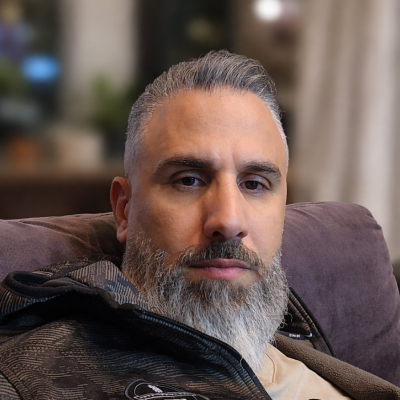
Omar is a helper in Django Discord server, he has helped and continuously help folks around the world in their Django journey! He is part of the Discord Staff Team. He has been a DSF member since June 2024.
You can learn more about Omar by visiting Omar's website and his GitHub Profile.
Let’s spend some time getting to know Omar better!
Can you tell us a little about yourself? (hobbies, education, etc)
Hello! My name is Omar Abou Mrad, a 47-year-old husband to a beautiful wife and father of three teenage boys. I’m from Lebanon (Middle East), have a Computer Science background, and currently work as a Technical Lead on a day-to-day basis. I’m mostly high on life and quite enthusiastic about technology, sports, food, and much more!
I love learning new things and I love helping people. Most of my friends, acquaintances, and generally people online know me as Xterm.
I have already an idea but where your nickname "Xterm" comes from?
xterm is simply the terminal emulator for the X Window System. I first encountered it back in the mid to late 90s when I started using Redhat 2.0 operating system. things weren’t easy to set up back then, and the terminal was where you spent most of your time.
Nevertheless, I had to wait months (or was it years?) on end for the nickname "Xterm" to expire on Freenode back in mid 2000s, before I snatched and registered it.
Alas, I did! Xterm, c'est moi! >:-]
How did you start using Django?
We landed on Django (~1.1) fairly early at work, as we wanted to use Python with an ORM while building websites for different clients. The real challenge came when we took on a project responsible for managing operations, traceability, and reporting at a pipe-manufacturing company.
By that time, most of the team was already well-versed in Django (~1.6), and we went head-on into building one of the most complicated applications we had done to date, everything from the back office to operators’ devices connected to a Django-powered system.
Since then, most of our projects have been built with Django at the core.
We love Django.
What other framework do you know and if there is anything you would like to have in Django if you had magical powers?
I've used a multitude of frameworks professionally before Django, primarily in Java (EE, SeamFramework, ...) and .NET (ASP.NET, ASP.NET MVC) as well as sampling different frameworks for educational purposes.
I suppose if I could snap my fingers and get things to exist in django it wouldn't be something new as much as it is official support of:
- Built-in and opinionated way to deal with hierarchical data in the ORM alongside the supporting API for building and traversing them optimally.
- Built-in websockets support. Essentially the django-channel experience.
- Built-in ORM support for common constructs like CTEs, and possibly the ability to transition from raw SQL into a queryset pipeline.
But since we're finger-snapping things to existence, it would be awesome if every component of django (core, orm, templates, forms, "all") could be installed separately in such a way that you could cherry pick what you want to install, so we could dismiss those pesky (cough) arguments (cough) about Django being bulky.
What projects are you working on now?
I'm involved in numerous projects currently at work, most of which are based on Django, but the one I'm working right now consists of doing integrations and synchronizations with SAP HANA for different modules, in different applications.
It's quite the challenge, which makes it twice the fun.
Which Django libraries are your favorite (core or 3rd party)?
- django-debug-toolbar hands down. It is an absolute beast of a library and a required tool. It is also the lib that influenced DryORM
- django-extensions obviously, for its numerous helper commands (shell_plus --print-sql, runserver_plus... and much more!)
- django-mptt while unmaintained, it remains one of my personal favorites for hierarchical data. It's a true piece of art.
I would like to mention that I'm extremely thankful for any and all core and 3rd Party libraries out there!
What are the top three things in Django that you like?
In no particular order:
- The ORM; We love it, it fits nicely with the rest of the components.
- I feel we should not dismiss what sets Django apart from most frameworks; Its defaults, the conventions, and how opinionated it is; If you avoid overriding the defaults that you get, you'll end up with a codebase that anyone can read, understand and maintain easily. (This is quite subjective and some may very well disagree! ^.^)
- The documentation. Django’s documentation is among the best out there: comprehensive, exhaustive, and incredibly well written.
You are helping a lot of folks in Django Discord, what do you think is needed to be a good helper according to you?
First and foremost, I want to highlight what an excellent staff team we have on the Official Django Discord. While I don’t feel I hold a candle to what the rest of the team does daily, we complement each other very well.
To me, being a good helper means:
- Having patience. You’ve built skills over many years, and not everyone is at the same stage. People will ask unreasonable or incorrect questions, and sometimes they simply won’t listen.
- Guiding people toward figuring things out themselves. Giving a direct solution rarely helps in the long run. There are no scoreboards when it comes to helping others.
- Teaching how to break problems down and reduce noise, especially how to produce the bare minimum code needed to reproduce an issue.
- Point them to the official documentation first, and teaching them how to find answers.
- Staying humble. No one knows everything, and you can always learn from your peers.
Dry ORM is really appreciated! What motivated you to create the project?
Imagine you're having a discussion with a djangonaut friend or colleague about some data modeling, or answering some question or concern they have, or reviewing some ORM code in a repository on github, or helping someone on IRC, Slack, Discord, the forums... or simply you want to do some quick ORM experiment but not disturb your current project. The most common ways people deal with this, is by having a throw-away project that they add models to, generate migrations, open the shell, run the queries they want, reset the db if needed, copy the models and the shell code into some code sharing site, then send the link to the recipient. Not to mention needing to store the code they experiment with in either separate scripts or management commands so they can have them as references for later.
I loved what DDT gave me with the queries transparency, I loved experimenting in the shell with shell_plus --print-sql and I needed to share things online. All of this was cumbersome and that’s when DryORM came into existence, simplifying the entire process into a single code snippet.
The need grew massively when I became a helper on Official Django Discord and noticed we (Staff) could greatly benefit from having this tool not only to assist others, but share knowledge among ourselves. While I never truly wanted to go public with it, I was encouraged by my peers on Discord to share it and since then, they've been extremely supportive and assisted in its evolution.
The unexpected thing however, was for DryORM to be used in the official code tracker, or the forums, or even in Github PRs! Ever since, I've decided to put a lot of focus and effort on having features that can support the django contributors in their quest evolve Django.
So here's a shout-out to everyone that use DryORM!
I believe you are the main maintainer, do you need help on something?
Yes, I am and thank you! I think the application has reached a point where new feature releases will slow down, so it’s entering more of a maintenance phase now, which I can manage.
Hopefully soon we'll have the discord bot executing ORM snippet :-]
What are your hobbies or what do you do when you’re not working?
Oh wow, not working, what's that like! :-]
Early mornings are usually reserved for weight training.\ Followed by a long, full workday.\ Then escorting and watching the kids at practice.\ Evenings are spent with my wife.\ Late nights are either light gaming or some tech-related reading and prototyping.\
Weekends look very similar, just with many more kids sports matches!
Is there anything else you’d like to say?
I want to thank everyone who helped make Django what it is today.
If you’re reading this and aren’t yet part of the Discord community, I invite you to join us! You’ll find many like-minded people to discuss your interests with. Whether you’re there to help, get help, or just hang around, it’s a fun place to be.
Thank you for doing the interview, Omar!
From The Django weblog at 2026-01-06 18:00:00
Django bugfix releases issued: 5.2.10, 6.0.1
Today we've issued the 5.2.10 and 6.0.1 bugfix releases.
The release packages and checksums are available from our downloads page, as well as from the Python Package Index.
The PGP key ID used for these releases is Jacob Walls: 131403F4D16D8DC7
From The Django weblog at 2025-12-31 20:42:35
DSF member of the month - Clifford Gama
For December 2025, we welcome Clifford Gama as our DSF member of the month! ⭐
Clifford contributed to Django core with more than 5 PRs merged in few months! He is part of the Triage and Review Team. He has been a DSF member since October 2024.
You can learn more about Clifford by visiting Clifford's website and his GitHub Profile.
Let’s spend some time getting to know Clifford better!
Can you tell us a little about yourself (hobbies, education, etc)
I'm Clifford. I hold a Bachelor's degree in Mechanical Engineering from the University of Zimbabwe.
How did you start using Django?
During my first year in college, I was also exploring open online courses on EDx and I came across CS50's introduction to web development. After watching the introductory lecture -- which introduced me to git and GitHub -- I discovered Django's excellent documentation and got started on the polls tutorial. The docs were so comprehensive and helpful I never felt the need to return to CS50. (I generally prefer comprehensive first-hand, written learning material over summaries and videos.)
At the time, I had already experimented with flask, but I guess mainly because I didn't know SQL and because flask didn't have an ORM, I never quite picked it up. With Django I felt like I was taking a learning fast-track where I'd learn everything I needed in one go!
And that's how I started using Django.
What projects are you working on now?
At the moment, I’ve been focusing on improving my core skills in preparation for remote work, so I haven’t been starting new projects because of that.
That said, I’ve been working on a client project involving generating large, image-heavy PDFs with WeasyPrint, where I’ve been investigating performance bottlenecks and ways to speed up generation time, which was previously around 30 minutes 😱.
What are you learning about these days?
I’ve been reading Boost Your Git DX by Adam Johnson and learning how to boost my Git and shell developer experience, which has been a great read. Aside from that, inspired by some blogs and talks by Haki Benita, I am also learning about software design and performance. Additionally, I am working on improving my general fluency in Python.
What other framework do you know and if there is anything you would like to have in Django if you had magical powers?
I am not familiar with any other frameworks, but if I had magic powers I'd add production-grade static-file serving in Django.
Django libraries are your favorite (core or 3rd party)?
The ORM, Wagtail and Django's admin.
What are the top three things in Django that you like?
- The community
- The documentation
- Djangonaut Space and the way new contributors are welcomed
How did you start contributing to Django?
I started contributing to Django in August last year, which is when I discovered the community, which was a real game changer for me. Python was my first course at university, and I loved it because it was creative and there was no limit to what I could build with it.
Whenever I saw a problem in another course that could be solved programmatically, I jumped at it. My proudest project from that time was building an NxN matrix determinant calculator after learning about recursion and spotting the opportunity in an algebra class.
After COVID lockdown, I gave programming up for a while. With more time on my hands, I found myself prioritizing programming over core courses, so I took a break. Last year, I returned to it when I faced a problem that I could only solve with Django. My goal was simply to build an app quickly and go back to being a non-programmer, but along the way I thought I found a bug in Django, filed a ticket, and ended up writing a documentation PR. That’s when I really discovered the Django community.
What attracted me most was that contributions are held to high standards, but experienced developers are always ready to help you reach them. Contributing was collaborative, pushing everyone to do their best. It was a learning opportunity too good to pass up.
How did you join the Triage and Review team?
About the time after I contributed my first PR, I started looking at open tickets to find more to work on, and keep on learning.
Sometimes a ticket was awaiting triage, in which case the first step was to triage it before assigning it to working on it, and sometimes the ticket I wanted was already taken, in which case I'd look at the PR if available. Reviewing a PR can be a faster way to learn about a particular part of the codebase, because someone has already done most of the investigative part of work, so I reviewed PRs as well.
After a while I got an invitation from Sarah Boyce, one of the fellows, to join the team. I didn't even know that I could join before I got the invitation, so I was thrilled!
How the work is going so far?
It’s been rewarding. I’ve gained familiarity with the Django codebase and real experience collaborating with others, which already exceeds what I expected when I started contributing.
One unexpected highlight was forming a friendship through one of the first PRs I reviewed.
SiHyun Lee and I are now both part of the triage and review team, and I’m grateful for that connection.
What are your hobbies or what do you do when you’re not working?
My main hobby is storytelling in a broad sense. In fact, it was a key reason I returned to programming after a long break. I enjoy discovering enduring stories from different cultures, times, and media—ranging from the deeply personal and literary to the distant and philosophical. I recently watched two Japanese classics and found I quite love them. I wrote about one of the films on my blog, and I also get to practice my Japanese, which I’ve been learning on Duolingo for about two years. I also enjoy playing speed chess.
Do you have any suggestions for people who would like to start triage and review tickets and PRs?
If there’s an issue you care about, or one that touches a part of the codebase you’re familiar with or curious about, jump in. Tickets aren’t always available to work on, but reviews always are, and they’re open to everyone. Reviewing helps PRs move faster, including your own if you have any open, sharpens your understanding of a component, and often clarifies the problem itself.
As Simon Charette puts it:
“Triaging issues and spending time understanding them is often more valuable than landing code itself as it strengthen our common understanding of the problem and allow us to build a consistent experience accross the diverse interfaces Django provides.”
And you can put it on your CV!
Is there anything else you’d like to say?
I’m grateful to everyone who contributes to making every part of Django what it is. I’m particularly thankful to whoever nominated me to be the DSF Member of the month.
I am optimistic about the future of Django. Django 6.1 is already shaping up with new features, and there are new projects like Django Bolt coming up.
Happy new year 🎊!
Thank you for doing the interview, Clifford and happy new year to the Django community 💚!
From The Django weblog at 2025-12-18 22:04:04
Hitting the Home Stretch: Help Us Reach the Django Software Foundation's Year-End Goal!
As we wrap up another strong year for the Django community, we wanted to share an update and a thank you. This year, we raised our fundraising goal from $200,000 to $300,000, and we are excited to say we are now over 88% of the way there. That puts us firmly in the home stretch, and a little more support will help us close the gap and reach 100%.
So why the higher goal this year? We expanded the Django Fellows program to include a third Fellow. In August, we welcomed Jacob Tyler Walls as our newest Django Fellow. That extra capacity gives the team more flexibility and resilience, whether someone is taking parental leave, time off around holidays, or stepping away briefly for other reasons. It also makes it easier for Fellows to attend more Django events and stay connected with the community, all while keeping the project running smoothly without putting too much pressure on any one person.
We are also preparing to raise funds for an executive director role early next year. That work is coming soon, but right now, the priority is finishing this year strong.
We want to say a sincere thank you to our existing sponsors and to everyone who has donated so far. Your support directly funds stable Django releases, security work, community programs, and the long-term health of the framework. If you or your organization have end-of-year matching funds or a giving program, this is a great moment to put them to use and help push us past the finish line.
If you would like to help us reach that final stretch, you can find all the details on our fundraising page
Other ways to support Django:
- Benevity Workplace Giving Program: If your employer participates, you can make donations to the DSF via payroll deduction.
- Sponsor Django via GitHub Sponsors: Support Django directly through GitHub's sponsorship platform.
- Official Merch Store: Buy official t-shirts, accessories, and more to support Django.
Thank you for helping support Django and the people who make it possible. We are incredibly grateful for this community and everything you do to keep Django strong.
From The Django weblog at 2025-12-18 18:50:00
Introducing the 2026 DSF Board
Thank You to Our Outgoing Directors
We extend our gratitude to Thibaud Colas and Sarah Abderemane, who are completing their terms on the board. Their contributions shaped the foundation in meaningful ways, and the following highlights only scratch the surface of their work.
Thibaud served as President in 2025 and Secretary in 2024. He was instrumental in governance improvements, the Django CNA initiative, election administration, and creating our first annual report. He also led our birthday campaign and helped with the creation of several new working groups this year. His thoughtful leadership helped the board navigate complex decisions.
Sarah served as Vice President in 2025 and contributed significantly to our outreach efforts, working group coordination, and membership management. She also served as a point of contact for the Django CNA initiative alongside Thibaud.
Both Thibaud and Sarah did too many things to list here. They were amazing ambassadors for the DSF, representing the board at many conferences and events. They will be deeply missed, and we are happy to have their continued membership and guidance in our many working groups.
On behalf of the board, thank you both for your commitment to Django and the DSF. The community is better for your service.
Thank You to Our 2025 Officers
Thank you to Tom Carrick and Jacob Kaplan-Moss for their service as officers in 2025.
Tom served as Secretary, keeping our meetings organized and our records in order. Jacob served as Treasurer, providing careful stewardship of the foundation's finances. Their dedication helped guide the DSF through another successful year.
Welcome to Our Newly Elected Directors
We welcome Priya Pahwa and Ryan Cheley to the board, and congratulate Jacob Kaplan-Moss on his re-election.
2026 DSF Board Officers
The board unanimously elected our officers for 2026:
- President: Jeff Triplett
- Vice President: Abigail Gbadago
- Treasurer: Ryan Cheley
- Secretary: Priya Pahwa
- Jacob Kaplan-Moss
- Paolo Melchiorre
- Tom Carrick
I'm honored to serve as President for 2026. The DSF has important work ahead, and I'm looking forward to building on the foundation that previous boards have established.
Our monthly board meeting minutes may be found at dsf-minutes, and December's minutes are available.
If you have a great idea for the upcoming year or feel something needs our attention, please reach out to us via our Contact the DSF page. We're always open to hearing from you.
From The Django weblog at 2025-12-11 15:19:22
Django Code of Conduct Transparency Report 2025
The Code of Conduct working group received 4 reports and met 12 times in 2025. This transparency report is a brief account of how those reports were handled. This year’s number is lower than previous years in part because of the formation of the Online Community Working Group which handles moderation on our official spaces and has been able to act directly on smaller scale infractions. In some cases we received additional reporting while investigating initial reports, but have not counted those as separate instances.
This working group conducts business in several ways. It has online meetings, typically once per month. It also discusses issues in a Slack channel, but most cases are handled in the meetings. The group welcomed three new members this year: Ariane Djeupang, Natalia Bidart, and Priya Pahwa. Natalia was selected by the new Online Communities Working Group as their liaison to the Code of Conduct Working group; Ariane and Priya were elected by the working group. The group also saw Jay Miller step down this year. We all want to thank Jay for his continued role in our community and for all the work he did with the Code of Conduct group.
It was the group’s intention to work with a consultant to update our Code of Conduct and processes. We reached out to two consultants to help with that work, but unfortunately we weren’t able to engage either to get that work completed. We hope to progress with that in 2026. In the meantime, we made a few internal process tweaks - creating up a new “ask CoC” channel with key stakeholders to discuss moderation and CoC enforcement, and having our team set up as moderators in GitHub until we find a better model.
Two reports from late 2024 carried into this year. Two reports resulted in suspensions from the relevant platforms. Another was shared with local event organizers.
Finally, this section provides a brief summary of the kinds of cases that were handled:
- One case involved repeated violations of the Discourse rules about self promotion. The working group recommended a suspension from the forum.
- One case involved repeated behavior across several platforms that discouraged participation and created problems for others. The working group recommended a suspension from all relevant platforms and working groups.
- One case involved an incident at a PSF-sponsored event. The information was passed on to the local organizers.
From The Django weblog at 2025-12-09 14:00:47
Online Community Working Group GitHub repo and project
The Online Community Working Group has introduced a new GitHub repository designed to manage and track ideas, suggestions, and improvements across Django's various online community platforms.
Introducing the Online Community Working Group Repository
Primarily inspired by the rollout of the New Features repository, the Online Community Working Group has launched their own version that works in conjunction with the Online Community Working Group Ideas GitHub project to provide a mechanism to gather feedback, suggestions, and ideas from across the online community and track their progression.
The primary aim is to help better align Django's presence across multiple online platforms by providing:
- Centralisation: A community-platform-agnostic place to collect feedback, suggestions, and ideas from members of any of Django's online communities.
- Visibility: With a variety of platforms in use across the community, some of which require an account before their content can even be read, discussions can happen in what effectively amount to private silos. This centralised repository allows all suggestions and ideas to be viewed by everybody, regardless of their community platform of choice.
- Consistency: A suggestion for one platform can often be a good idea for another. Issues and ideas raised centrally can be assessed against all platforms to better align Django's online community experience.
How to use the Online Community Working Group Repo
If you have an idea or a suggestion for any of Django's online community platforms (such as the Forum, Discord, or elsewhere), the process starts by creating an issue in the new repository.
You'll be asked to summarise the idea, and answer a couple of short questions regarding which platform it applies to and the rationale behind your idea.
The suggestion will be visible on the public board, and people will be able to react to the idea with emoji responses as a quick measure of support, or provide longer-form answers as comments on the issue.
The Online Community Working Group will review, triage, and respond to all suggestions, before deciding whether or how they can be implemented across the community.
Existing Online Communities
Note that we're not asking that you stop using any mechanisms in place within the particular community you're a part of currently—the Discord #suggestions channel is not going away, for example. However, we may ask that a suggestion or idea flagged within a particular platform be raised via this new GitHub repo instead, in order increase its visibility, apply it to multiple communities, or simply better track its resolution.
Conclusion
The Online Community Working Group was relatively recently set up, with the aim of improving the experience for members of all Django's communities online. This new repository takes a first step in that direction. Check out the repository at django/online-community-working-group on GitHub to learn more and start helping shape Django's truly excellent community presence online.
From The Django weblog at 2025-12-03 12:00:00
The Django team is happy to announce the release of Django 6.0.
The release notes assembles a mosaic of modern tools and thoughtful design. A few highlights are:
- Template Partials: modularize templates using small, named fragments for cleaner, more maintainable code. (GSoC project by Farhan Ali Raza, mentored by Carlton Gibson)
- Background Tasks: run code outside the HTTP request-response cycle with a built-in, flexible task framework. (Jake Howard)
- Content Security Policy (CSP): easily configure and enforce browser-level security policies to protect against content injection. (Rob Hudson)
- Modernized Email API: compose and send emails with Python's EmailMessage class for a cleaner, Unicode-friendly interface. (Mike Edmunds)
You can get Django 6.0 from our downloads page or from the Python Package Index.
The PGP key ID used for this release is Natalia Bidart: 2EE82A8D9470983E
With the release of Django 6.0, Django 5.2 has reached the end of mainstream support. The final minor bug fix release, 5.2.9, was issued yesterday. Django 5.2 will receive security and data loss fixes until April 2028. All users are encouraged to upgrade before then to continue receiving fixes for security issues.
Django 5.1 has reached the end of extended support. The final security release, 5.1.15, was issued on Dec. 2, 2025. All Django 5.1 users are encouraged to upgrade to a supported Django version.
See the downloads page for a table of supported versions and the future release schedule.
From The Django weblog at 2025-12-02 12:00:00
Django security releases issued: 5.2.9, 5.1.15, and 4.2.27
In accordance with our security release policy, the Django team is issuing releases for Django 5.2.9, Django 5.1.15, and Django 4.2.27. These releases address the security issues detailed below. We encourage all users of Django to upgrade as soon as possible.
CVE-2025-13372: Potential SQL injection in FilteredRelation column aliases on PostgreSQL
FilteredRelation was subject to SQL injection in column aliases, using a suitably crafted dictionary, with dictionary expansion, as the **kwargs passed to QuerySet.annotate() or QuerySet.alias() on PostgreSQL.
Thanks to Stackered for the report.
This issue has severity "high" according to the Django security policy.
CVE-2025-64460: Potential denial-of-service vulnerability in XML serializer text extraction
Algorithmic complexity in django.core.serializers.xml_serializer.getInnerText() allowed a remote attacker to cause a potential denial-of-service triggering CPU and memory exhaustion via specially crafted XML input submitted to a service that invokes XML Deserializer. The vulnerability resulted from repeated string concatenation while recursively collecting text nodes, which produced superlinear computation resulting in service degradation or outage.
Thanks to Seokchan Yoon (https://ch4n3.kr/) for the report.
This issue has severity "moderate" according to the Django security policy.
Affected supported versions
- Django main
- Django 6.0 (currently at release candidate status)
- Django 5.2
- Django 5.1
- Django 4.2
Resolution
Patches to resolve the issue have been applied to Django's main, 6.0 (currently at release candidate status), 5.2, 5.1, and 4.2 branches. The patches may be obtained from the following changesets.
CVE-2025-13372: Potential SQL injection in FilteredRelation column aliases on PostgreSQL
- On the main branch
- On the 6.0 branch
- On the 5.2 branch
- On the 5.1 branch
- On the 4.2 branch
CVE-2025-64460: Potential denial-of-service vulnerability in XML serializer text extraction
- On the main branch
- On the 6.0 branch
- On the 5.2 branch
- On the 5.1 branch
- On the 4.2 branch
The following releases have been issued
- Django 5.2.9 (download Django 5.2.9 | 5.2.9 checksums)
- Django 5.1.15 (download Django 5.1.15 | 5.1.15 checksums)
- Django 4.2.27 (download Django 4.2.27 | 4.2.27 checksums)
The PGP key ID used for this release is Natalia Bidart: 2EE82A8D9470983E
General notes regarding security reporting
As always, we ask that potential security issues be reported via private email to security@djangoproject.com, and not via Django's Trac instance, nor via the Django Forum. Please see our security policies for further information.
From The Django weblog at 2025-11-28 06:15:12
2026 DSF Board Election Results
The 2026 DSF Board Election has closed, and the following candidates have been elected:
- Jacob Kaplan-Moss
- Priya Pahwa
- Ryan Cheley
They will all serve two years for their term.
2026 Board
Directors elected for the 2025 DSF Board - Abigail Gbadago, Jeff Triplett, Paolo Melchiorre, Tom Carrick - are continuing with one year left to serve on the board.
Therefore, the combined 2026 DSF Board of Directors are:
- Abigail Gbadago
- Jacob Kaplan-Moss*
- Jeff Triplett
- Paolo Melchiorre
- Priya Pahwa*
- Ryan Cheley*
- Tom Carrick
* Elected to a two year term

Congratulations to our winners, and a huge thank you to our departing board members Sarah Abderemane and Thibaud Colas.
Thank you again to everyone who nominated themselves. Even if you were not successful, you gave our community the chance to make their voices heard in who they wanted to represent them.
From The Django weblog at 2025-11-21 13:00:00
DSF member of the month - Akio Ogasahara
For November 2025, we welcome Akio Ogasahara as our DSF member of the month! ⭐
Akio is a technical writer and systems engineer. He contributed to the Japanese translation for many years. He has been a DSF member since June 2025. You can learn more about Akio by visiting Akio's X account and his GitHub Profile.
Let’s spend some time getting to know Akio better!
Can you tell us a little about yourself (hobbies, education, etc.)
I was born in 1986 in Rochester, Minnesota, to Japanese parents, and I’ve lived in Japan since I was one. I’ve been fascinated by machines for as long as I can remember. I hold a master’s degree in mechanical engineering. I’ve worked as a technical writer and a software PM, and I’m currently in QA at a Japanese manufacturer.
I'm curious, where does your nickname “libratech” come from?
I often used “Libra” as a handle because the symbol of Libra—a balanced scale—reflects a value I care deeply about: fairness in judgment. I combined that with “tech,” from “tech writer,” to create “libratech.”
How did you start using Django?
Over ten years ago, I joined a hands-on workshop using a Raspberry Pi to visualize sensor data, and we built the dashboard with Django. That was my first real experience.
What other framework do you know and if there is anything you would like to have in Django if you had magical powers?
I’ve used Flask and FastAPI. If I could wish for anything, I’d love “one-click” deployment that turns a Django project into an ultra-lightweight app running on Cloudflare Workers.
What projects are you working on now?
As a QA engineer, I’m building Pandas pipelines for quality-data cleansing and creating BI dashboards.
What are you learning about these days?
I’m studying for two Japanese certifications: the Database Specialist exam and the Quality Control Examination (QC Kentei).
Which Django libraries are your favorite (core or 3rd party)?
Django admin, without question. In real operations, websites aren’t run only by programmers—most teams eventually need CRM-like capabilities. Django admin maps beautifully to that practical reality.
What are the top three things in Django that you like?
- Django admin
- Strong security
- DRY by design
You have contributed a lot on the Japanese documentation, what made you contribute to translate for the Japanese language in the first place?
I went through several joint surgeries and suddenly had a lot of time. I’d always wanted to contribute to open source, but I knew my coding skills weren’t my strongest asset. I did, however, have years of experience writing manuals—so translation felt like a meaningful way to help.
Do you have any advice for people who could be hesitant to contribute to translation of Django documentation?
Translation has fewer strict rules than code contributions, and you can start simply by creating a Transifex account. If a passage feels unclear, improve it! And if you have questions, the Django-ja translation team is happy to help on our Discord.
I know you have some interest in AI as a technical writer, do you have an idea on how Django could evolve with AI?
Today’s AI is excellent at working with existing code—spotting N+1 queries or refactoring SQL without changing behavior. But code written entirely by AI often has weak security. That’s why solid unit tests and Django’s strong security guardrails will remain essential: they let us harness AI’s creativity safely.
Django is celebrating its 20th anniversary, do you have a nice story to share?
The surgeries were tough, but they led me to documentation translation, which reconnected me with both English and Django. I’m grateful for that path.
What are your hobbies or what do you do when you’re not working?
Outside of computers, I enjoy playing drums in a band and watching musicals and stage plays! 🎵
Is there anything else you’d like to say?
If you ever visit Japan, of course sushi and ramen are great—but don’t miss the sweets and ice creams you can find at local supermarkets and convenience stores! They’re inexpensive, come in countless varieties, and I’m sure you’ll discover a new favorite!🍦
Thank you for doing the interview, Akio !
From The Django weblog at 2025-11-19 15:27:58
Twenty years of Django releases
On November 16th 2005, Django co-creator Adrian Holovaty announced the first ever Django release, Django 0.90. Twenty years later, today here we are shipping the first release candidate of Django 6.0 🚀.
Since we’re celebrating Django’s 20th birthday this year, here are a few release-related numbers that represent Django’s history:
- 447 releases over 20 years. That’s about 22 per year on average. We’re at 38 so far for 2025. Fun fact: 33 of those releases predate PyPI, and were published via the Django website only!
- 131 security vulnerabilities addressed in those Django releases. Our security issues archive is a testament to our stellar track-record.
- 262,203 releases of Django-related packages. Django’s community ecosystem is gigantic. There’s tens of releases of Django packages per day as of 2025. There were 52 just today. With the caveat this depends a lot on what you classify as a "Django" package.
This is what decades’ worth of a stable framework looks like. Expect more gradual improvements and bug fixes over the next twenty years’ worth of releases. And if you like this kind of data, check out the State of Django 2025 report by JetBrains, with lots of statistics on our ecosystem (and there’s a few hours left on their Get PyCharm Pro with 30 % Off & Support Django offer).
Support Django
If you or your employer counts on Django’s 20 years of stability, consider whether you can support the project via donations to our non-profit Django Software Foundation.
- ⚠️ today only - Get PyCharm Pro for 30% off - all the revenue goes to our Foundation.
- Donate on the Django website
- Donate on GitHub sponsors
- Check out how to become a Corporate Member
Once you’ve done it, post with #DjangoBirthday and tag us on Mastodon / on Bluesky / on X / on LinkedIn so we can say thank you!
Of our US $300,000.00 goal for 2025, as of November 19th, 2025, we are at:
- 58.7% funded
- $176,098.60 donated
From The Django weblog at 2025-11-19 12:00:00
Django 6.0 release candidate 1 released
Django 6.0 release candidate 1 is now available. It represents the final opportunity for you to try out a mosaic of modern tools and thoughtful design before Django 6.0 is released.
The release candidate stage marks the string freeze and the call for translators to submit translations. Provided no major bugs are discovered that can't be solved in the next two weeks, Django 6.0 will be released on or around December 3. Any delays will be communicated on the on the Django forum.
Please use this opportunity to help find and fix bugs (which should be reported to the issue tracker), you can grab a copy of the release candidate package from our downloads page or on PyPI.
The PGP key ID used for this release is Natalia Bidart: 2EE82A8D9470983E
From The Django weblog at 2025-11-19 08:13:22
Going build-free with native JavaScript modules
For the last decade and more, we've been bundling CSS and JavaScript files. These build tools allowed us to utilize new browser capabilities in CSS and JS while still supporting older browsers. They also helped with client-side network performance, minimizing the content to be as small as possible and combining files into one large bundle to reduce network handshakes. We've gone through a lot of build tools iterations in the process; from Grunt (2012) to Gulp (2013) to Webpack (2014) to Parcel (2017) to esbuild (2020) and Vite (2020).
And with modern browser technologies there is less need for these build tools.
- Modern CSS supports many of the features natively that the build tools were created for. CSS nesting to organize code, variables, @supports for feature detection.
- JavaScript ES6 / ES2015 was a big step forward, and the language has been progressing steadily ever since. It now has native module support with the import / export keywords
- Meanwhile, with HTTP/2 performance improvements, parallel requests can be made over the same connection, removing the constraints of the HTTP/1.x protocol.
These build processes are complex, particularly for beginners to Django. The tools and associated best practices move quickly. There is a lot to learn and you need to understand how to utilize them with your Django project. You can build a workflow that stores the build results in your static folder, but there is no core Django support for a build pipeline, so this largely requires selecting from a number of third party packages and integrating them into your project.
The benefit this complexity adds is no longer as clear cut, especially for beginners. There are still advantages to build tools, but you can can create professional results without having to use or learn any build processes.
Build-free JavaScript tutorial
To demonstrate modern capabilities, let's expand Django’s polls tutorial with some newer JavaScript. We’ll use modern JS modules and we won’t require a build system.
To give us a reason to need JS let's add a new requirement to the polls; to allow our users to add their own suggestions, instead of only being able to vote on the existing options. We update our form to have a new option under the selection code:
or add your own <input type="text" name="choice_text" maxlength="200" />
Now our users can add their own options to polls if the existing ones don't fit. We can update the voting view to handle this new option. We add a new choice_text input, and if there is no vote selection we will potentially handle adding the new option, while still providing an error message if neither is supplied. We also provide an error if both are selected.
def vote(request, question_id):
if request.POST['choice'] and request.POST['choice_text']:
return render(request, 'polls/detail.html', {
'question': question,
'error_message': "You can't vote and provide a new option.",
})
question = get_object_or_404(Question, pk=question_id)
try:
selected_choice = question.choice_set.get(pk=request.POST['choice'])
except (KeyError, Choice.DoesNotExist):
if request.POST['choice_text']:
selected_choice = Choice.objects.create(
question=question,
choice_text=request.POST['choice_text'],
)
else:
return render(request, 'polls/detail.html', {
'question': question,
'error_message': "You didn't select a choice or provide a new one.",
})
selected_choice.votes += 1
selected_choice.save()
return HttpResponseRedirect(reverse('polls:results', args=(question.id,)))
Now that our logic is a bit more complex it would be nicer if we had some JavaScript to do this. We can build a script that handles some of the form validation for us.
function noChoices(choices, choice_text) {
return (
Array.from(choices).some((radio) => radio.checked) ||
(choice_text[0] && choice_text[0].value.trim() !== "")
);
}
function allChoices(choices, choice_text) {
return (
!Array.from(choices).some((radio) => radio.checked) &&
choice_text[0] &&
choice_text[0].value.trim() !== ""
);
}
export default function initFormValidation() {
document.getElementById("polls").addEventListener("submit", function (e) {
const choices = this.querySelectorAll('input[name="choice"]');
const choice_text = this.querySelectorAll('input[name="choice_text"]');
if (!noChoices(choices, choice_text)) {
e.preventDefault();
alert("You didn't select a choice or provide a new one.");
}
if (!allChoices(choices, choice_text)) {
e.preventDefault();
alert("You can't select a choice and also provide a new option.");
}
});
}
Note how we use export default in the above code. This means form_validation.js is a JavaScript module. When we create our main.js file, we can import it with the import statement:
import initFormValidation from "./form_validation.js";
initFormValidation();
Lastly, we add the script to the bottom of our details.html file, using Django’s usual static template tag. Note the type="module" this is needed to tell the browser we will be using import/export statements.
<script type="module" src="{% static 'polls/js/main.js' %}"></script>
That’s it! We got the modularity benefits of modern JavaScript without needing any build process. The browser handles the module loading for us. And thanks to parallel requests since HTTP/2, this can scale to many modules without a performance hit.
In production
To deploy, all we need is Django's support for collecting static files into one place and its support for adding hashes to filenames. In production it is a good idea to use ManifestStaticFilesStorage storage backend. It stores the file names it handles by appending the MD5 hash of the file’s content to the filename. This allows you to set far future cache expiries, which is good for performance, while still guaranteeing new versions of the file will make it to users’ browsers.
This backend is also able to update the reference to form_validation.js in the import statement, with its new versioned file name.
Future work
ManifestStaticFilesStorage works, but a lot of its implementation details get in the way. It could be easier to use as a developer.
- The support for
import/exportwith hashed files is not very robust. - Comments in CSS with references to files can lead to errors during collectstatic.
- Circular dependencies in CSS/JS can not be processed.
- Errors during collectstatic when files are missing are not always clear.
- Differences between implementation of StaticFilesStorage and ManifestStaticFilesStorage can lead to errors in production that don't show up in development (like #26329, about leading slashes).
- Configuring common options means subclassing the storage when we could use the existing OPTIONS dict.
- Collecting static files could be faster if it used parallelization (pull request: #19935 Used a threadpool to parallelise collectstatic)
We discussed those possible improvements at the Django on the Med 🏖️ sprints and I’m hopeful we can make progress.
I built django-manifeststaticfiles-enhanced to attempt to fix all these. The core work is to switch to a lexer for CSS and JS, based on Ned Batchelder’s JsLex that was used in Django previously. It was expanded to cover modern JS and CSS by working with Claude Code to do the grunt work of covering the syntax.
It also switches to using a topological sort to find dependencies, whereas before we used a more brute force approach of repeated processing until we saw no more changes, which lead to more work, particularly on storages that used the network. It also meant we couldn't handle circular dependencies.
To validate it works, I ran a performance benchmark on 50+ projects, it’s been tested issues and with similar (often improved) performance. On average, it’s about 30% faster.
While those improvements would be welcome, do go ahead with trying build-free JavaScript and CSS in your Django projects today! Modern browsers make it possible to create great frontend experiences without the complexity.
From The Django weblog at 2025-11-07 09:01:19
Last week, we had a great time at PyCon FR 2025 - a free (!) gathering for Pythonistas in France. Here are some of our highlights.
Sprints on Django, our website, IA, marketing
Over two days, the conference started with 27 contributors joining us to contribute to Django and our website and online presence. Half in the room were complete newcomers to open source, wanting to get a taste of what it’s like behind the scenes. We also had people who were new to Django, taking the excellent Django Girls tutorial to get up to speed with the project. The tutorial is translated in 20 languages(!), so it’s excellent in situations like this where people come from all over Europe.
Carmen, one of our sprint contributors, took the time to test that our software for ongoing Board elections is accessible 💚
Discussing Django’s direction
At the sprints, we also organized discussions on Django’s direction - specifically on marketing, Artificial Intelligence, and technical decisions. Some recurring topics were:
- Highlights from the State of Django 2025 report produced by JetBrains, and the need for fundraising partnerships like their ongoing 30% Off PyCharm Pro – 100% for Django campaign.
- What “batteries included” means for Django in 2025. Does it include REST? Contributors discussed the recent forum thread Django needs a REST story.
- Type hints and Django. The existing feature requests, and how feature requests are meant to work for Django.
- The impact of Artificial Intelligence on Django and Django developers. How AI adoption could be supported with documentation investments, but also the ethical concerns of AI coding.
We had a great time during those two days of sprints ❤️ thank you to everyone involved, we hope you stick around!
Design systems with JinjaX, Stimulus, and Cube CSS
Mads demonstrated how to bring a design-system mindset to Django projects by combining JinjaX, Stimulus JS, and Cube CSS. Supported by modern tooling like Figma, Vite, and Storybook. JinjaX in particular, allows to take a more component-driven “lego blocks” approach to front-end development with Django.
Three years of htmx in Django
Céline Martinet Sanchez shared her takeaways from using htmx with Django over three years. The verdict? A joyful developer experience, some (solved) challenges with testing.
Her recommended additions to make the most of the two frameworks:
- django-htmx: opinionated htmx integration
- Slippers: better DX for Django templates
- factory_boy: test data generator (alternative to fixtures)
- Syrupy: snapshots for pytest
Becoming an open-source contributor in 2025
In her talk, Amanda Savluchinske explored how newcomers can get involved in open source—highlighting the Django community’s Djangonaut Space program. She explains why doing it is great, how to engage with busy maintainers, and specific actions people can take to get started.
We really liked her sharing a prompt she uses with AI, to iterate on questions to maintainers before hitting “send”:
“You are an expert in technical writing. I'm trying to write a message about a question I have about this open-source project I'm contributing to. Here's the link to its repo ‹Add link here›. I want to convey my question to the maintainers in a clear, concise way, at the same time that I want it to have enough context so that the communication happens with the least back and forth possible. I want this question to contain a short, max two sentence summary upfront, and then more context in the text's body. Ask me whatever questions you need about my question and context in order to produce this message.”
La Suite numérique: government collaboration powered by Django
PyCon FR also featured La Suite numérique, the French government’s collaborative workspace—developed with partners in Germany, the Netherlands (Mijn Bureau), and Italy. Their platform includes collaborative documents, video calls, chat, and an AI assistant — all powered by Django 🤘. This work is now part of a wider European Union initiative for sovereign digital infrastructure based on open source, for more information see: Commission to launch Digital Commons EDIC to support sovereign European digital infrastructure and technology.
Up next…
Up next, we have the first ever Django Day India event! And closer to France, DjangoCon Europe 2026 will take place in Athens, Greece 🇬🇷🏖️🏛️☀️
We’re elated to support events like PyCon FR 2025. To help us do more of this, take a look at this great offer from JetBrains: 30% Off PyCharm Pro – 100% for Django – All money goes to the Django Software Foundation!
From The Django weblog at 2025-11-06 05:00:00
Thank you to the 19 individuals who have chosen to stand for election. This page contains their candidate statements submitted as part of the 2026 DSF Board Nominations.
Our deepest gratitude goes to our departing board members who are at the end of their term and chose not to stand for re-elections: Sarah Abderemane and Thibaud Colas; thank you for your contributions and commitment to the Django community ❤️.
Those eligible to vote in this election will receive information on how to vote shortly. Please check for an email with the subject line “2026 DSF Board Voting”. Voting will be open until 23:59 on November 26, 2025 Anywhere on Earth.
Any questions? Reach out on our dedicated forum thread or via email to foundation@djangoproject.com.
All candidate statements ¶
To make it simpler to review all statements, here they are as a list of links. Voters: please take a moment to read all statements before voting! It will take some effort to rank all candidates on the ballot. We believe in you.
- Aayush Gauba (he/him) — St. Louis, MO
- Adam Hill (he/him) — Alexandria, VA
- Andy Woods (he/they) — UK
- Apoorv Garg (he/him) — India, now living in Japan
- Ariane Djeupang (she/her) — Cameroon
- Arunava Samaddar (he/him) — India
- Chris Achinga (he/him) — Mombasa, Kenya
- Dinis Vasco Chilundo (he/him) — Cidade de Inhambane, Mozambique
- Jacob Kaplan-Moss (he/him) — Oregon, USA
- Julius Nana Acheampong Boakye (he/him) — Ghana
- Kyagulanyi Allan (he/him) — Kampala, Uganda
- Nicole Buque (she) — Maputo, Mozambique
- Nkonga Morel (he/him) — Cameroun
- Ntui Raoul Ntui Njock (he/his) — Buea, Cameroon
- Priya Pahwa (she/her) — India, Asia
- Quinter Apondi Ochieng (she) — Kenya-Kisumu City
- Rahul Lakhanpal (he/him) — Gurugram, India
- Ryan Cheley (he/him) — California, United States
- Sanyam Khurana (he/him) — Toronto, Canada
Aayush Gauba (he/him) St. Louis, MO ¶
I’m Aayush Gauba, a Django developer and Djangonaut Space mentee passionate about open source security and AI integration in web systems. I’ve spoken at DjangoCon US and actively contribute to the Django community through projects like AIWAF. My focus is on using technology to build safer and more inclusive ecosystems for developers worldwide.
Over the past few years, I’ve contributed to multiple areas of technology ranging from web development and AI security to research in quantum inspired computing. I’ve presented talks across these domains, including at DjangoCon US, where I spoke about AI powered web security and community driven innovation. Beyond Django, I’ve published academic papers exploring the intersection of ethics, quantum AI, and neural architecture design presented at IEEE and other research venues. These experiences have helped me understand both the technical and philosophical challenges of building responsible and transparent technology. As a Djangonaut Space mentee, I’ve been on the learning side of Django’s mentorship process and have seen firsthand how inclusive guidance and collaboration can empower new contributors. I bring a perspective that connects deep research with community growth and balancing innovation with the values that make Django strong: openness, ethics, and accessibility.
As part of the DSF board, I would like to bridge the gap between experienced contributors and new voices. I believe mentorship and accessibility are key to Django’s future. I would also like to encourage discussions around responsible AI integration, web security, and community growth ensuring Django continues to lead both technically and ethically. My goal is to help the DSF stay forward looking while staying true to its open, supportive roots.
Adam Hill (he/him) Alexandria, VA ¶
I have been a software engineer for over 20 years and have been deploying Django in production for over 10. When not writing code, I'm probably playing pinball, watching a movie, or shouting into the void on social media.
I have been working with Django in production for over 10 years at The Motley Fool where I am a Staff Engineer. I have also participated in the Djangonauts program for my Django Unicorn library, gave a talk at DjangoCon EU (virtual) and multiple lightning talks at DjangoCon US conferences, built multiple libraries for Django and Python, have a semi-regularly updated podcast about Django with my friend, Sangeeta, and just generally try to push the Django ecosystem forward in positive ways.
The key issue I would like to get involved with is updating the djangoproject.com website. The homepage itself hasn't changed substantially in over 10 years and I think Django could benefit from a fresh approach to selling itself to developers who are interested in a robust, stable web framework. I created a forum post around this here: Want to work on a homepage site redesign?. I also have a document where I lay out some detailed ideas about the homepage here: Django Homepage Redesign.
Andy Woods (he/they) UK ¶
I’m am based in academia and am a senior Creative Technologist and Psychologist. I have a PhD in Multisensory Perception. I make web apps and love combining new technologies. I’ve worked in academia (Sheffield, Dublin, Bangor, Manchester, Royal Holloway), industry (Unilever, NL), and founded three technology-based startups. I am proud of my neurodiversity.
I was on the review team of DjangoCon Europe 2021. I have had several blog posts included on the Django Newsletter (e.g. django htmx modal popup loveliness). I have written a scientific article on using Django for academic research (under peer review). I have several projects mentioned on Django Packages e.g. MrBenn Toolbar Plugin. I am part of a cohort of people who regularly meet to discuss python based software they are developing in the context of startups, started by Michael Kennedy. Here is an example of an opensource django-based project I am developing there: Tootology.
I am keen on strengthening the link between Django and the academic community. Django has enormous potential as a research and teaching tool, but us academics don't know about this! I would like to make amends by advocating for members of our community to appear on academic podcasts and social media platforms to promote Django’s versatility, and to reach new audiences.
In my professional life, I lead work on Equality, Diversity, and Inclusion, and am committed to creating fair and supportive environments. I will bring this to the DSF. The Django community already takes great strides in this area, and I would like to build upon this progress. Python recently turning down a $1.5 million grant, which I feels exemplifies the awesomeness of the greater community we are a part of.
Apoorv Garg (he/him) India, now living in Japan ¶
I’m Apoorv Garg, a Django Software Foundation Member and open source advocate. I actively organize and volunteer for community events around Django, Grafana, and Postgres. Professionally, I work as a software engineer at a startup, focusing on building scalable backend systems and developer tools. I’m also part of the Google Summer of Code working groups with Django and JdeRobot, contributing to mentorship and open source development for over four years.
I have been actively speaking at various tech communities including Python, FOSSASIA, Django, Grafana, and Postgres. Over time, I’ve gradually shifted from just speaking to also organizing and volunteering at these community events, helping others get involved and build connections around open source technologies.
Beyond work, I’ve been mentoring students through Google Summer of Code with Django and JdeRobot. I also teach high school students the fundamentals of Python, Django, and robotics, helping them build curiosity and confidence in programming from an early stage.
Last year, I joined the Accessibility Working Group of the World Wide Web Consortium (W3C), which focuses on improving web accessibility standards and ensuring inclusive digital experiences for all users. My goal is to bring these learnings into the Django ecosystem, aligning its community and tools with global accessibility best practices.
Looking at the issues, I believe the opportunity of Google Summer of Code is currently very limited in Django. I know Django already has a lot of contributions, but being part of the core members in the JdeRobot organization, which is a small open source group, I understand the pain points we face when trying to reach that level of contribution. The way we utilize GSoC in JdeRobot has helped us grow, improve productivity, and bring in long-term contributors. I believe Django can benefit from adopting a similar approach.
Funding is another major issue faced by almost every open source organization. There are continuous needs around managing grants for conferences, supporting local communities and fellows, and sponsoring initiatives that strengthen the ecosystem. Finding sustainable ways to handle these challenges is something I want to focus on.
I also plan to promote Django across different open source programs. In my opinion, Django should not be limited to Python or Django-focused events. It can and should have a presence in database and infrastructure communities such as Postgres, Grafana, FOSSASIA, and W3C conferences around the world. This can help connect Django with new audiences and create more collaboration opportunities.
Ariane Djeupang (she/her) Cameroon ¶
I’m Ariane Djeupang from Cameroon (Central Africa) , a ML Engineer, Project Manager, and Community Organizer passionate about building sustainable, inclusive tech ecosystems across Africa. As a Microsoft MVP in the Developer Technologies category, an active DSF member and a leader in open source communities, I believe in the power of collaboration, documentation, and mentorship to unlock global impact.
My efforts focus on lowering the barriers to meaningful participation. My work sits at the intersection of production engineering, clear technical communication, and community building. I’ve spent years building ML production-ready systems with Django, FastAPI, Docker, cloud platforms, and also ensuring that the knowledge behind those systems is accessible to others. I’ve turned complex workflows into approachable, accessible guides and workshops that empower others to build confidently. I’ve also collaborated with global networks to promote ethical ML/AI and sustainable tech infrastructure in resource-constrained environments.
Through my extensive experience organizing major events like: DjangoCon Africa, UbuCon Africa, PyCon Africa, DjangoCon US, EuroPython, I’ve created inclusive spaces where underrepresented voices lead, thrive and are celebrated. This has equipped me with the skills and insights needed to drive inclusivity, sustainability and community engagement. I volunteer on both the DSF's CoC and the D&I (as Chair) working groups. I also contribute to the scientific community through projects like NumPy, Pandas, SciPy, the DISCOVER COOKBOOK (under NumFOCUS' DISC Program).
As the very first female Cameroonian to be awarded Microsoft MVP, this recognition reflects years of consistent contribution, technical excellence, and community impact. The program connects me with a global network that I actively leverage to bring visibility, resources, and opportunities back to Django and Python communities, bridging local initiatives with global platforms to amplify Django’s reach and relevance. It demonstrates that my work is recognized at the highest levels of the industry.
As a young Black African woman in STEM from a region of Africa with pretty limited resources and an active DSF member, I’ve dedicated my career to fostering inclusivity and representation in the tech and scientific spaces and I am confident that I bring a unique perspective to the table.
I will push the DSF to be more than a steward of code, to be a catalyst for global belonging. My priorities are:
- Radical inclusion: I'll work to expand resources and support for contributors from underrepresented regions, especially in Africa, Latin America, and Southeast Asia. This includes funding for local events, mentorship pipelines, and multilingual documentation sprints.
- Sustainable community infrastructure: I’ll advocate for sustainable models of community leadership, ones that recognize invisible labor, prevent burnout, and promote distributed governance. We need to rethink how we support organizers, maintainers, and contributors beyond code.
- Ethical tech advocacy: I’ll help the DSF navigate the ethical dimensions of Django’s growing role in AI and data-driven systems. From privacy to fairness, Django can lead by example. And I’ll work to ensure our framework reflects our values.
- Global partnerships: I want to strengthen partnerships with regional communities and allied open-source foundations, ensuring Django’s growth is global and socially conscious.
I will bring diversity, a young and energized spirit that I think most senior boards lack. My vision is for the DSF to not only maintain Django but to set the standard for inclusive, ethical, and sustainable open source. My goal is simple: to make Django the most welcoming, resilient, and socially conscious web framework in the world.
Arunava Samaddar (he/him) India ¶
Information Technology Experience 15 years
Microsoft Technology Python MongoDB Cloud Technology Testing People Manager Supervisor L2 Production Support and Maintenance
Well experience in software sales product delivery operations Agile Scrum and Marketing.
Chris Achinga (he/him) Mombasa, Kenya ¶
I am a software developer, primarily using Python and Javascript, building web and mobile applications. At my workplace, I lead the Tech Department and the Data team.
I love developer communities and supported emerging developers through meetups, training, and community events including PyCon Kenya, local Django Meetup and university outreach.
At Swahilipot Hub, I built internal tools, supported digital programs, and mentored over 300 young developers through industrial attachment programs. I primarily use Django and React to development internal tools, websites (Swahilipot Hub) including our radio station site (Swahilipot FM).
I also work with Green World Campaign Kenya on the AIRS platform, where we use AI, cloud technology, and blockchain to support environmental projects and rural communities.
Outside of engineering, I write technical content and actively organise and support developer communities along the Kenyan coast to help more young people grow into tech careers - Chris Achinga’s Articles and Written Stuff
I would want to get involved more on the community side, diversity in terms of regional presentation and awareness of Django, and the Django Software Foundation. In as much as they's a lot of efforts in place. With no available African entity of the DSF, this would make it difficult for companies/organization in Africa to donate and support the DSF, I would love to champion for that and pioner towards that direction, not only for Africa but also for other under-represented geographical areas.
I wasn't so sure about this last year, but I am more confident, with a better understanding of the Django ecosystem and I know I have the capabilities of getting more contributions to Django, both financially and code-wise. I would also love to make sure that Django and the ecosystem is well know through proper communication channels, I know this differs based on different countries, the goal is to make sure that the DSF is all over, of course, where we are needed. Create the feeling that Django is for everyone, everywhere!
Dinis Vasco Chilundo (he/him) Cidade de Inhambane, Mozambique ¶
I am a Rural Engineer from Universidade Eduardo Mondlane with practical experience in technology, data management, telecommunications, and sustainabilitty
In recent years, I have worked as a trainer and coach, as well as a researcher, empowering young people with programming, digital skills, and data analysis. I have also contributed to open-source projects, promoting access to technology and remote learning in several cities across Mozambique. These experiences have strengthened my belief in the power of open-source communities to create opportunities, foster collaboration, and drive innovation in regions with limited resources.
The thing I want the DSF to do is to expand its support for students and early career professionals.Personally, what I want to achieve is collaboration and transparency in actions as integrity is non negotiable.
Jacob Kaplan-Moss (he/him) Oregon, USA ¶
I was one of the original maintainers of Django, and was the original founder and first President of the DSF. I re-joined the DSF board in 2023, and have served as Treasurer since 2024. I used to be a software engineer and security consultant (REVSYS, Latacora, 18F, Heroku), before mostly retiring from tech in 2025 to become an EMT.
I've been a member of the DSF Board for 3 years, so I bring some institutional knowledge there. I've been involved in the broader Django community as long as there has been a Django community, though the level of my involvement has waxed and waned. The accomplishments I'm the most proud of in the Django community are creating our Code of Conduct (djangoproject.com/conduct/), and more recently establishing the DSF's Working Groups model (django/dsf-working-groups).
Outside of the Django community, I have about 15 years of management experience, at companies small and large (and also in the US federal government).
I'm running for re-election with three goals for the DSF: (a) hire an Executive Director, (b) build more ""onramps"" into the DSF and Django community, and (c) expand and update our Grants program.
Hire an ED: this is my main goal for 2026, and the major reason I'm running for re-election. The DSF has grown past the point where being entirely volunteer-ran is working; we need transition the organization towards a more professional non-profit operation. Which means paid staff. Members of the Board worked on this all throughout 2025, mostly behind the scenes, and we're closer than ever -- but not quite there. We need to make this happen in 2026.
Build ""onramps"": this was my main goal when I ran in 2024 (see my statement at 2024 DSF Board Candidates). We've had some success there: several Working Groups are up and running, and over on the technical side we helped the Steering Council navigate a tricky transition, and they're now headed in a more positive direction. I'm happy with our success there, but there's still work to do; helping more people get involved with the DSF and Django would continue to be a high-level goal of mine. And, I'd like to build better systems for recognition of people who contribute to the DSF/Django — there are some incredible people working behind the scenes that most of the community has heard of.
Expand and update our grants program: our grants program is heavily overdue for a refresh. I'd like to update our rules and policies, make funding decisions clearer and less ad-hoc, increase the amount of money we're giving per grant, and (funding allowing) expand to to other kinds of grants (e.g. travel grants, feature grants, and more). I'd also like to explore turning over grant decisions to a Working Group (or subcommittee of the board), to free up Board time for more strategic work.
Julius Nana Acheampong Boakye (he/him) Ghana ¶
I’m a proud Individual Member of the Django Software Foundation and a full-stack software engineer with a strong focus on Django and mobile development. Beyond code, I’m deeply involved in the global Python and Django , Google & FlutterFlow communities, actively contributing to the organization of several major conferences around the world.
I am a passionate full-stack software engineer with a strong focus on Django and mobile development. Over the years, I’ve contributed to the global Python and Django communities through volunteering, organizing, and speaking. I served as the Opportunity Grant Co-Chair for DjangoCon US (2024 & 2025), where I help ensure accessibility and inclusion for underrepresented groups. I also helped Organise DjangoCon Europe, where my impact was felt (see LinkedIn post)
I was also the as Design Lead for PyCon Africa 2024 and PyCon Ghana 2025 , where i worked everything designs to make the conference feel like home (see LinkedIn post) and I also helped organise other regional events, including DjangoCon Africa, PyCon Namibia, PyCon Portugal and etc. Beyond organising, I’ve spoken at several local and international conferences, sharing knowledge and promoting community growth including PyCon Africa, DjangoCon Africa, PyCon Nigeria, and PyCon Togo.
I’m also an Individual Member of the Django Software Foundation, and my work continues to center on empowering developers, building open communities, and improving access for newcomers in tech.
As a board member, I want to help strengthen Django’s global community by improving accessibility, diversity, and engagement especially across regions where Django adoption is growing but still lacks strong community infrastructure, such as Africa and other underrepresented areas.
My experience as Opportunity Grant Co-Chair for DjangoCon US and Design Lead for PyCon Africa has shown me how powerful community-driven support can be when it’s backed by inclusion and transparency. I want the DSF to continue building bridges between developers, organizers, and contributors making sure that everyone, regardless of location or background, feels seen and supported.
I believe the DSF can take a more active role in empowering local communities, improving mentorship pathways, and creating better visibility for contributors who work behind the scenes. I also want to support initiatives that make Django more approachable to new developers through clearer learning materials and global outreach programs.
Personally, I want to help the DSF improve communication with international communities, expand partnerships with educational programs and tech organizations, and ensure the next generation of developers see Django as not just a framework, but a welcoming and sustainable ecosystem.
My direction for leadership is guided by collaboration, empathy, and practical action building on Django’s strong foundation while helping it evolve for the future
Kyagulanyi Allan (he/him) Kampala, Uganda ¶
I am Kyagulanyi Allan, a software developer, and co-founder at Grin Mates. Grin Mates is an eco-friendly EVM dApp with an inbuilt crypto wallet that awards Green points for verified sustainable activities. Ii am very excited about the potential of web3 and saddened by some other parts of it.
I am a developer, and I have been lucky to volunteer and also contribute. I worked on diverse projects like AROC and Grin Mates. I volunteered as a Google student developer lead at my university, when i was working at after query experts on project pluto. I used Python to train the LLM mode on bash/linux commands.
My position on key issues is on advancing and advocating for inclusiveness, with priority on children from rural areas.
Nicole Buque (she) Maputo, Mozambique ¶
My name is Nicole Buque, a 20-year-old finalist student in Computer Engineering from Mozambique. I am deeply passionate about data analysis, especially in the context of database systems, and I love transforming information into meaningful insights that drive innovation.
During my academic journey, I have worked with Vodacom, contributing to website development projects that improved digital communication and accessibility. I also participated in the WT Bootcamp for Data Analysis, where I gained strong analytical, technical, and teamwork skills. As an aspiring IT professional, I enjoy exploring how data, systems, and community collaboration can create sustainable solutions. My experience has helped me develop both technical expertise and a people-centered approach to technology — understanding that real progress comes from empowering others through knowledge
Nkonga Morel (he/him) Cameroun ¶
Curious, explorer, calm, patient
My experience on Django is medium
My direction for the DSF is one of growth, mentorship, and openness ,ensuring Django remains a leading framework not just technically, but socially.
Ntui Raoul Ntui Njock (he/his) Buea, Cameroon ¶
I'm a software engineer posionate about AI/ML and solving problems in the healthcare sector in collaboration with others.
I'm a skilled software engineer in the domain of AI/ML, Django, Reactjs, TailwindCSS. I have been building softwares for over 2 years now and growing myself in this space has brought some level of impact in the community as I have been organizing workshops in the university of Buea, teaching people about the Django framework, I also had the privilege to participate at the deep learning indaba Cameroon where I was interviewed by CRTV to share knowledge with respect to deep learning. You could see all these on my LinkedIn profile (Ntui Raoul).
I believe that in collaboration with others at the DSF, I'll help the DSF to improve in it's ways to accomplish its goals. I believe we shall improve on the codebase of Django framework, it's collaboration with other frameworks so as to help the users of the framework to find it more easy to use the Django framework. Also I'll help to expand the Django framework to people across the world.
Priya Pahwa (she/her) India, Asia ¶
I'm Priya Pahwa (she/her), an Indian woman who found both community and confidence through Django. I work as a Software Engineer (Backend and DevOps) at a fintech startup and love volunteering in community spaces. From leading student communities as a GitHub Campus Expert to contributing as a GitHub Octern and supporting initiatives in the Django ecosystem, open-source is an integral part of my journey as a developer.
My belonging to the Django community has been shaped by serving as the Session Organizer of the global Djangonaut Space program, where I work closely with contributors and mentors from diverse geographies, cultures, age groups, and both coding and non-coding backgrounds. Being part of the organizing team for Sessions 3, 4, and ongoing 5, each experience has evolved my approach towards better intentional community stewardship and collaboration.
I also serve as Co-Chair of the DSF Fundraising Working Group since its formation in mid-2024. As we enter the execution phase, we are focused on establishing additional long-term funding streams for the DSF. I intend to continue this work by:
- Running sustained fundraising campaigns rather than one-off appeals
- Building corporate sponsorship relationships for major donations
- Focusing on the funding of the Executive Director for financial resilience
My commitment to a supportive ecosystem guides my work. I am a strong advocate of psychological safety in open-source, a topic I've publicly talked about (“Culture Eats Strategy for Breakfast” at PyCon Greece and DjangoCongress Japan). This belief led me to join the DSF Code of Conduct Working Group because the health of a community is determined not only by who joins, but by who feels able to stay.
If elected to the board, I will focus on:
- Moving fundraising WG from “effort” to infrastructure (already moving in the direction by forming the DSF prospectus)
- Initiating conference travel grants to lower barriers and increase participation for active community members
- Strengthening cross-functional working groups' collaboration to reduce organizational silos
- Designing inclusive contributor lifecycles to support pauses for caregiving or career breaks
- Highlighting diverse user stories and clearer “here’s how to get involved” community pathways
- Amplifying DSF’s public presence and impact through digital marketing strategies
Quinter Apondi Ochieng (she) Kenya-Kisumu City ¶
my name is Quinter Apondi Ochieng from Kisumu city , i am a web developer from kisumu city , Django has been part of my development professional journey for the past two years , i have contributed to local meetups as a community leader, developed several website one being an e-commerce website , also organized Django Girls kisumu workshop which didn't come to success due to financial constrains, workshop was to take place 1st November but postponed it.
In my current position, i lead small team building Django based applications, i have also volunteered as python kisumu community committee member which i served as a non-profit tech boards driven by passion.The experience have strengthen my skills in collaborations , decision making , long-term project planning and governance.I understand how important it is for the DSF to balance technical progress with sustainability and transparency.
The challenge I can help to negotiate is limited mentorship and unemployment. It has always blown my mind why IT, computer science, and SWE graduates struggle after campus life. In my country, SWE,IT and comp sci courses have final year projects that they pass and that have not been presented to any educational institute. I believe that if those projects are shipped, unemployment will be cut by over 50 %.
Rahul Lakhanpal (he/him) Gurugram, India ¶
I am a software architect working for over 13 years in the field of software development based out of Gurugram, India. For the past 8 years, I have been working 100% remotely, working as an independent contractor under my own company deskmonte
As a kid I was always the one breaking more toys than I played with and was super curious. Coming from a normal family background, we always had a focus on academics. Although I did not break into the top tier colleges, the intent and curiosity to learn more stayed.
As of now, I am happily married with an year old kid.
My skills are primarily Python and Django, have been using the same tech stack since the last decade. Have used it to create beautiful admin interfaces for my clients, have written APIs in both REST using django rest framework package along with GraphQL using django-graphene. Alongside, have almost always integrated Postgres and Celery+Redis with my core tech stack.
In terms of volunteering, I have been an active code mentor at Code Institute, Ireland and have been with them since 2019, helping students pick up code using Python and Django for the most part.
I love the django rest framework and I truly believe that the admin interface is extremely powerful and the utility of the overall offering is huge.
I would love to take django to people who are just starting up, support and promote for more meetups/conferences that can focus on django along with advancing django's utility in the age of AI.
Ryan Cheley (he/him) California, United States ¶
I'm Ryan and I’m running for the DSF Board in the hopes of being the Treasurer. I've been using Django since 2018. After several years of use, I finally had a chance to attend DjangoCon US in 2022. I felt like I finally found a community where I belonged and knew that I wanted to do whatever I could to give back.
My involvement with the community over the last several years includes being a:
- Maintainer of Django Packages
- Navigator with Djangonaut Space three times helping the Djangonauts work on Django Core
- Member of the Admin Team of Django Commons
- Three-time speaker at DjangoCon US
If elected to the board, I would bring valuable skills to benefit the community, including:
- Managing technical teams for nearly 15 years
- Nearly 20 years of project management experience
- Overseeing the financial operations for a team of nearly 30
- Consensus-building on large projects
I'm particularly drawn to the treasurer role because my background in financial management and budgeting positions me to help ensure the DSF's continued financial health and transparency.
For more details on my implementation plan, see my blog post Details on My Candidate Statement for the DSF.
If elected to the DSF Board I have a few key initiatives I'd like to work on:
- Getting an Executive Director to help run the day-to-day operations of the DSF
- Identifying small to midsized companies for sponsorships
- Implementing a formal strategic planning process
- Setting up a fiscal sponsorship program to allow support of initiatives like Django Commons
I believe these are achievable in the next 2 years.
Sanyam Khurana (he/him) Toronto, Canada ¶
I’m Sanyam Khurana (“CuriousLearner”), a seasoned Django contributor and member of the djangoproject.com Website Working Group, as well as a CPython bug triager and OSS maintainer. I’ve worked in India, the U.K., and Canada, and I’m focused on inclusion, dependable tooling, and turning first-time contributors into regulars.
I’ve contributed to Django and the wider Python ecosystem for years as a maintainer, reviewer, and issue triager. My Django-focused work includes django-phone-verify (auth flows), django-postgres-anonymizer (privacy/data handling), and Django-Keel (a production-ready project template). I also build developer tooling like CacheSniper (a tiny Rust CLI to sanity-check edge caching).
Repos: django-phone-verify , django-postgres-anonymizer , django-keel , cache_sniper
CPython & Django contributions: django commits, djangoproject.com commits, CPython commits
Beyond code, I’ve supported newcomers through docs-first guidance, small PR reviews, and patient issue triage. I’m a CPython bug triager and listed in Mozilla credits, which taught me to balance openness with careful review and clear process. I’ve collaborated across India, UK, and Canada, so I’m used to async work, time-zones, and transparent communication.
I owe my learnings to the community and want to give back. I understand the DSF Board is non-technical leadership like fundraising, grants/sponsorships, community programs, CoC support, and stewardship of Django’s operations and not deciding framework features. That’s exactly where I want to contribute.
I’ll push for an easy, skimmable annual “Where your donation went” report (fellows, events, grants, infra) plus lightweight quarterly updates. Clear storytelling helps retain individual and corporate sponsors and shows impact beyond core commits.
I want to grow contributors globally by turning their first PR into regular contributions. I want to make this path smoother by funding micro-grants for mentorship/sprints and backing working groups with small, delegated budgets under clear guardrails - so they can move fast without waiting on the Board.
I propose a ready-to-use “starter kit” for meetups/sprints: budget templates, venue ask letters, CoC, diversity travel-grant boilerplates, and a sponsor prospectus. We should prioritize regions with high Django usage but fewer historic DSF touchpoints (South Asia, Africa, LATAM). This comes directly from organizing over 120 meetups and annual conference like PyCon India for 3 years.
Your move now
That’s it, you’ve read it all 🌈! Be sure to vote if you’re eligible, by using the link shared over email. To support the future of Django, donate to the Django Software Foundation on our website or via GitHub Sponsors. We also have our 30% Off PyCharm Pro – 100% for Django 💚.
From The Django weblog at 2025-11-05 12:00:00
Django security releases issued: 5.2.8, 5.1.14, and 4.2.26
In accordance with our security release policy, the Django team is issuing releases for Django 5.2.8, Django 5.1.14, and Django 4.2.26. These releases address the security issues detailed below. We encourage all users of Django to upgrade as soon as possible.
CVE-2025-64458: Potential denial-of-service vulnerability in HttpResponseRedirect and HttpResponsePermanentRedirect on Windows
NFKC normalization in Python is slow on Windows. As a consequence, HttpResponseRedirect, HttpResponsePermanentRedirect, and redirect were subject to a potential denial-of-service attack via certain inputs with a very large number of Unicode characters.
Thanks to Seokchan Yoon (https://ch4n3.kr/) for the report.
This issue has severity "moderate" according to the Django security policy.
CVE-2025-64459: Potential SQL injection via _connector keyword argument in QuerySet and Q objects
The methods QuerySet.filter(), QuerySet.exclude(), and QuerySet.get(), and the class Q() were subject to SQL injection when using a suitably crafted dictionary, with dictionary expansion, as the _connector argument.
Thanks to cyberstan for the report.
This issue has severity "high" according to the Django security policy.
Affected supported versions
- Django main
- Django 6.0 (currently at beta status)
- Django 5.2
- Django 5.1
- Django 4.2
Resolution
Patches to resolve the issue have been applied to Django's main, 6.0 (currently at beta status), 5.2, 5.1, and 4.2 branches. The patches may be obtained from the following changesets.
CVE-2025-64458: Potential denial-of-service vulnerability in HttpResponseRedirect and HttpResponsePermanentRedirect on Windows
- On the main branch
- On the 6.0 branch
- On the 5.2 branch
- On the 5.1 branch
- On the 4.2 branch
CVE-2025-64459: Potential SQL injection via _connector keyword argument in QuerySet and Q objects
- On the main branch
- On the 6.0 branch
- On the 5.2 branch
- On the 5.1 branch
- On the 4.2 branch
The following releases have been issued
- Django 5.2.8 (download Django 5.2.8 | 5.2.8 checksums)
- Django 5.1.14 (download Django 5.1.14 | 5.1.14 checksums)
- Django 4.2.26 (download Django 4.2.26 | 4.2.26 checksums)
The PGP key ID used for this release is Natalia Bidart: 2EE82A8D9470983E
General notes regarding security reporting
As always, we ask that potential security issues be reported via private email to security@djangoproject.com, and not via Django's Trac instance, nor via the Django Forum. Please see our security policies for further information.
From The Django weblog at 2025-11-03 07:00:00
Announcing DjangoCon Europe 2026 in Athens, Greece! 🏛️🇬🇷
We’re excited to share that DjangoCon Europe returns in 2026 — this time in the historic and sun-soaked city of Athens, Greece 🇬🇷, with three days of talks from April 15–17, 2026!

Photo by Rafael Hoyos Weht on Unsplash
DjangoCon Europe is one of the longest-running Django events worldwide, now in its 18th edition - and 15th country!
What’s on the agenda
We’re preparing a mix of Django and Python talks, hands-on workshops, and opportunities to collaborate, learn, and celebrate our community. Whether you're new to Django or a long-time Djangonaut, DjangoCon Europe is designed to help you build new skills and connect with others who care about open-source software.
Athens provides the perfect backdrop — a lively, accessible city full of culture 🏛️, great food 😊, and spring sunshine ☀️.
Join us in Athens
DjangoCon Europe thrives because people across our community take part. As the organizers prepare the programe, there will be many ways to get involved:
- Attend the conference in person in Athens
- Submit a talk or workshop proposal (stay tuned for our Call for Proposals announcement)
- Sponsor the conference and support the Django ecosystem
- Volunteer your time to help the event run smoothly
Stay updated
We’ll share details on proposals, tickets, sponsorship packages, and sprints in the coming weeks, via our newsletter on the conference website.
We are also on:
From The Django weblog at 2025-11-02 14:29:05
Five ways to discover Django packages
With tens of thousands of available add-ons, it can be hard to discover which packages might be helpful for your projects. But there are a lot of options available to navigate this ecosystem – here are a few.
New ✨ Ecosystem page
Our new Django’s ecosystem page showcases third-party apps and add-ons recommended by the Django Steering Council.
State of Django
The 2025 State of Django survey is out, and we get to see how people who responded to the survey are ranking packages! Here are their answers to “What are your top five favorite third-party Django packages?”
| Responses | Package |
|---|---|
| 49% | djangorestframework |
| 27% | django-debug-toolbar |
| 26% | django-celery |
| 19% | django-cors-headers |
| 18% | django-filter |
| 18% | django-allauth |
| 15% | pytest-django |
| 15% | django-redis |
| 14% | django-extensions |
| 14% | django-crispyforms |
| 13% | djangorestframework-simplejwt |
| 12% | django-channels |
| 12% | django-storages |
| 12% | django-environ |
| 11% | django-celery-beat |
| 10% | django-ninja |
| 10% | None / I’m not sure |
| 7% | django-import-export |
| 7% | Wagtail |
| 6% | dj-database-url |
| 5% | django-silk |
| 5% | django-cookiecutter |
| 5% | dj-rest-auth |
| 5% | django-models-utils |
| 4% | django-taggit |
| 4% | django-rest-swagger |
| 3% | django-polymorphic |
| 3% | django-configurations |
| 3% | django-compressor |
| 3% | django-multitenant |
| 3% | pylint-django |
| 2% | django-braces |
| 2% | model-bakery |
| 2% | Djoser |
| 1% | django-money |
| 1% | dj-rest-knox |
| 8% | Other |
Thank you to JetBrains who created this State of Django survey with the Django Software Foundation! They are currently running a bit promotion campaign - Until November 11, 2025, get PyCharm for 30% off. All money goes to the Django Software Foundation!
Django Packages
Django Packages is a directory of reusable Django apps, tools, and frameworks, categorized and ranked by popularity. It has thousands of options that are easily comparable with category "grids".
Awesome Django
Awesome Django is more of a community-maintained curated list of Django resources and packages. It’s frequently updated, currently with 198 different package entries.
Reddit and newsletters
The r/django subreddit often covers new tools and packages developers are experimenting with. And here are newsletters that often highlight new packages or “hidden gems” in Django’s ecosystem:
- Django News - Weekly Django news, articles, projects, and more.
- Real Python (Newsletter and podcast)
From The Django weblog at 2025-10-31 16:47:10
Django Developers Survey 2025 results
The results from the 2025 Django Developers Survey are now available. This is the fourth annual report conducted from November 2024 to January 2025 by the Django Software Foundation in collaboration with JetBrains PyCharm.
The full report contains infographics, quotes, and dedicated sections so you can easily navigate through all the results. There is also a The State of Django 2025 blog post highlighting key Django trends in 2025 and actionable ideas for your own Django development.
From The Django weblog at 2025-10-30 08:48:56
Django is now a CVE Numbering Authority (CNA)
We’re proud to announce the Django Software Foundation has been authorized by the CVE Program as a CVE Numbering Authority (CNA)!
What it means for Django to be a CNA
Our security team deals with vulnerability reports on a daily basis, and every so often some turn out to be real vulnerabilities for us to fix and publish. CNAs are organizations responsible for the regular assignment of CVE IDs to vulnerabilities, and for creating and publishing information about the vulnerability in the associated CVE Record. Each CNA has a specific scope of responsibility for vulnerability identification and publishing. As a CNA, we are more autonomous through this process. For full details, see our scope on the new CVE Numbering Authority page.
How to report a vulnerability
For reporters, our process remains completely unchanged: to report a security issue in Django, please follow our security policies to report over email at security@djangoproject.com.
How our CNA operates
Our CNA is currently run within our existing security team, with support from the foundation’s President and Vice President. Day to day, the Django Fellows take care of CNA activities. Check our CNA page for more information and ways to contact us about CNA matters.
—
Thank you to Natalia Bidart for initiating our application process to become a CNA! And if you have feedback or questions, come say hi on the Django forum in Django as a CNA.
From The Django weblog at 2025-10-30 05:00:00
DSF member of the month - Anna Makarudze
Due to the Malcolm Tredinnick Memorial Prize announcement in September, we paused our regular DSF Member of the Month feature for that month.
For October 2025, we welcome Anna Makarudze as our DSF member of the month! ⭐
Anna is a Django Girls+ Trustee and has dedicated years to growing Django globally. She served as DSF President and founded DjangoCon Africa, helping expand Django's reach in the world. She has been a DSF member since August 2016. You can learn more about Anna by visiting Anna's Linkedin profile and her GitHub Profile.
Let’s spend some time getting to know Anna better!
Can you tell us a little about yourself (hobbies, education, etc)
I graduated with a BSc (Hons) in Computer Science from Midlands State University, Gweru, Zimbabwe, many years ago (2009). I am now pursuing an MSc in Software Engineering at Blekinge Institute of Technology in Karlskrona, Sweden, courtesy of a scholarship from the Swedish Institute. I have completed numerous courses for various IT certifications over the years, most of which have expired. I have also taken management courses to keep upskilling myself, as I enjoy learning.
Regarding hobbies, I enjoy baking, especially trying out new cake and pastry recipes for fun; it's my favourite way to relax after busy or stressful times. I also enjoy walking, particularly in areas with lush greenery and natural beauty, but my fear of snakes and creepy crawlies limits my solo adventures into the woods. My fear of snakes is justified; my family home (parents’) is located within a very natural reserve with many indigenous trees and forests, close to Lake Kyle in Masvingo. Although the area is stunning, it does have snakes and other wildlife such as hippopotamuses and crocodiles (if you go too close to the lake). I have encountered snakes many times at my parents’ house because of the numerous trees, so I have learnt to avoid them as most are venomous. Additionally, being African, a fear of these creatures and death is instinctive for me. I also enjoy listening to music, reading books, and occasionally watching a good film.
How did you start using Django?
I learnt Python in 2015 through Treehouse as part of a scholarship from Muzinda Hub’s Entrepreneurship training. We were expected to develop a Python project at the end of the three-month course, and I chose to use Flask. A friend of mine, Humphrey Butau, used Django, and he encouraged me to try it. After that, I was hooked.
What other framework do you know and if there is anything you would like to have in Django if you had magical powers?
I also know Flask, and recently, through school assignments, I have had to use Express JS. If I had magical powers, I would want Django to support NoSQL databases like MongoDB out of the box, just as it supports SQL databases. I have been working with the django-mongodb-backend and realised that it works if you either download their template or do some extra work to be able to run the default Django migrations.
What projects are you working on now?
As part of my Master’s studies, I am actually working on quite a number of projects for the two courses I am currently taking (until 31st October). For the Software Evolution and Maintenance course, we have been working on Home Assistant, which is also based on Python. We are working on a fork, though, so that we don’t flood the upstream with pull requests from Python, but it has been amazing seeing all the integrations available in it. My group and I chose to work on the Google Tasks integration. I will likely want to continue experimenting with Home Assistant even after the course ends.
For the Cloud Computing and Big Data Analysis course I am undertaking, I have recently completed two projects: one involving provisioning and orchestration of two RESTful Django microservices with Kubernetes, and another focused on Big Data Analysis using Express JS. Currently, I am working on implementing monitoring for an application that utilises Clojure and a MongoDB database, although I intend to develop the monitoring in Python.
Besides that, I am personally developing a MongoDB version of a Conveyances app I created several years ago, which was built using Django, Django Rest Framework, Vue, and Postgres. The app had nested data due to the restrictions of a SQL database structure, so I want to experiment with NoSQL to see how simpler it would be. I had meant to do this before DjangoCon Africa and present a talk on it, but the toll of organising a conference blocked me, so I am finally working on it now.
What are you learning about these days?
I am currently learning about cloud computing and Big Data, with a focus on provisioning and orchestrating Big Data Analysis cloud architectures. I am also learning how to improve and monitor the performance of these systems in terms of CPU, memory, and storage utilisation.
Which Django libraries are your favourite (core or 3rd party)?
My favourite Django core libraries are the Django ORM and Django Admin. They make it very easy to set up a functional website with minimal effort. The ORM simplifies database connections and queries, and Django Admin provides a ready-to-use backend admin interface. My favourite third-party library is Django Rest Framework. It makes creating RESTful APIs with Django quick and straightforward.
What are the top three things in Django that you like?
The top three things that I like in Django are the management commands, migrations and the authentication systems. I like how the management commands make it so easy to quickly automate stuff, whether it's the default Django management commands or if you have written your own. Django migrations do the work for you in terms of making changes to the database, and you need not worry about writing the SQL statements.
The authentication system is fairly basic, but it can get you started with minimal effort on your part. This makes Django fulfil its tagline of being “The framework for perfectionists with deadlines”. I have used it in most of my projects for my Master’s programme, where we were chasing deadlines, and it always turned out to be true.
You were previously a board member and President of the Django Software Foundation, what would you suggest to someone wondering if they should take this role or being part of the board?
Being part of the Django Software Foundation board is an excellent way to contribute to the Django community, as you can shape and influence important decisions related to Django and its ecosystem. While the DSF Board does not dictate the technical direction of Django, it does influence how those who impact the technical direction are selected or governed.
As President, you also have the chance to implement your ideas on the future of the Django community, the staff who maintain Django, and the direction of Django events. Although it may require more of your time than being an ordinary member due to additional responsibilities, it is a valuable opportunity to develop and strengthen your leadership skills.
Anyone who uses Django, even if they haven't contributed code but have attended or organised Django events, can be part of the DSF board. I joined the DSF board at the end of 2017 for 2018, after using Django for just over two years, so you need not worry about your level of experience. All you need is your commitment and a clear plan of what you hope the DSF board should achieve during your term.
You were the chair of DjangoCon Africa this year, what do you think is required to organize a conference like this? Why do you think this is important conference like DjangoCon Africa?
Organising a conference like DjangoCon Africa requires substantial community engagement, significant time, effort, and resilience. Firstly, Africa differs from other continents in many ways. In some aspects, these differences are advantageous, while in others, they present challenges. Technologically, Africa is a greenfield; there is ample opportunity for technological advances, and we have the population to pursue this, meaning most of our attendees are eager to learn and contribute to the community. We also have the “Ubuntu” community spirit ingrained within us, which makes our DjangoCon Africa events feel like home.
However, this presents a significant challenge regarding funding, as there are not many successful Django-based startups capable of financing an event as large as DjangoCon Africa. Our colonial history as a continent creates major obstacles to international financial transactions, mainly due to numerous structural barriers. This makes it notably harder for corporate sponsors without local offices to offer sponsorship.
Despite these challenges, I believe it is essential to organise DjangoCon Africa because it is the only continent where many Africans can travel visa-free or without restrictions. My first DjangoCon events were in Europe and then the US, and I have faced numerous visa applications each time I needed to travel. Within Africa, I can visit many countries visa-free. Once I arrive, I am often mistaken for a local until I speak, and then I am limited to speaking English, not their local language. DjangoCon Africa's programme is curated specifically for Africans, featuring talks suited to their level of understanding and offering numerous beginner workshops to help them get started, while also catering for mid-level and advanced programmers.
DjangoCon Africa takes over a year to plan, which demands a significant time commitment. When we are halfway through organising it, I ask myself why I keep getting into trouble by arranging a DjangoCon. After each event, I feel tired and exhausted but incredibly fulfilled because of the impact I can see we have achieved from that single occasion. While other events are more polished and well-established, DjangoCon Africa has only hosted two events so far and remains far from perfect, yet I still sense its impact despite all the imperfections. One can only truly understand the feeling of being at DjangoCon Africa if they have attended it.
I know you are a Django Girls+ Trustee, could you tell us a bit more about Django Girls+ and how we could be involved in Django Girls if we are interested?
Django Girls Foundation is a non-profit that empowers women+ to organise free programming workshops for women+ by providing the resources they need. Django Girls+ workshops are one or two-day events where participants are exposed to web development using Python and Django using our popular, beginner-friendly Django Girls Tutorial, which is open source. The participants get to learn at their own pace with the help of coaches.
We also have several open-source resources to help our volunteers run and organise our workshops: the Organiser Manual, Coach Manual, Organiser FAQs and Tutorial Extensions. In the 11 years that Django Girls+ has existed, (put some statistics + links)
There are several ways to get involved with Django Girls+. One can apply to organise a workshop in their city or become a coach at one of our events. They can also contribute to all the resources mentioned above, as well as our open-source website. They can also contribute financially by supporting us through Patreon, donating via PayPal or GitHub Sponsors (put links). If they are corporates, they can reach out to me as the Fundraising Coordinator and we can discuss a partnership. (link to fundraising email).
Django is celebrating its 20th anniversary, do you have a nice story to share?
Being part of the Django community since 2016 has been a blessing in my life. I have travelled to many countries for Python and Django conferences, forming many meaningful friendships that have become essential to me. I have contributed to Django in many ways, and in return, Django has given me so much. I have been able to showcase my leadership qualities through the Django community, and I am grateful to them for allowing me to be myself and celebrate my identity as an African woman who’s passionate about coding and community.
One of my favourite memories from DjangoCon Europe 2018 is taking a pedal boat ride with my good friend Jessica Upani in Heidelberg, right after DjangoCon Europe 2018. We had previously visited a castle, and it had been lovely. While on the boat, Jessica, true to her nature, kept laughing and not taking our safety seriously, while I, on the other hand, was panicking that we might capsize. We had no life jackets, and I was sure I wouldn’t swim well in the river. When we disembarked, I felt relieved and told her I was worried we would capsize and I wouldn’t be able to swim, and she admitted she was worried too. Who does that? With that, I say happy 20th birthday to Django. I have so many fond memories to share from the Django community.
Is there anything else you’d like to say?
The Django community has put in a lot of work to make the environment welcoming for beginners and for everyone, especially minorities. I have made many genuine friends over the years, whom I am always excited to meet again at various community events. I am one of those people who came for the framework and stayed for the community, and I would like to see this continue.
Thanks so much to all the work the DSF board members (past and present) have done all these years. Things move slowly in Djangoland, as Carlton Gibson likes to say, but it has been a great pleasure watching every board build on what the previous boards have started, and I hope to see that continue. Special thanks to all the working groups, members and volunteers that support the DSF - Django is great because of you.
Thank you for doing the interview, Anna !
From The Django weblog at 2025-10-25 18:53:48
On the Air for Django’s 20th Birthday: Special Event Station W2D
Back in July, we celebrated a very special occasion: Django’s 20th birthday 🎉 To mark the occasion, three amateur radio operators (including myself) spent the next 14 days, operating evenings and weekends, broadcasting a special event call sign: W2D.
Over those two weeks, we completed 1,026 radio contacts with radio operators in 47 geopolitical entities (for example, the continental US, Alaska and Hawaii are considered separate entities). The US Federal Communications Commission (FCC) issues special event "call signs" for these types of events. We selected W2D for 20 years of Django, but the reference to "Web 2.0" during Django's early years was a bonus!
Over 7,000 lookups were counted on a main callsign lookup site as radio operators checked into what W2D was about. Ham radio is a very popular activity, with more than 750,000 licensed hams in the US!
We created a custom certificate inspired by the design of the Django admin interface for those who made contact with us (certificates are common / expected for events like this in the radio hobby). Here is a sample one, other amateurs contacting the event were able to generate/download their own Django admin inspired certificate from a Django site (which does repeat for those who contacted us multiple times):
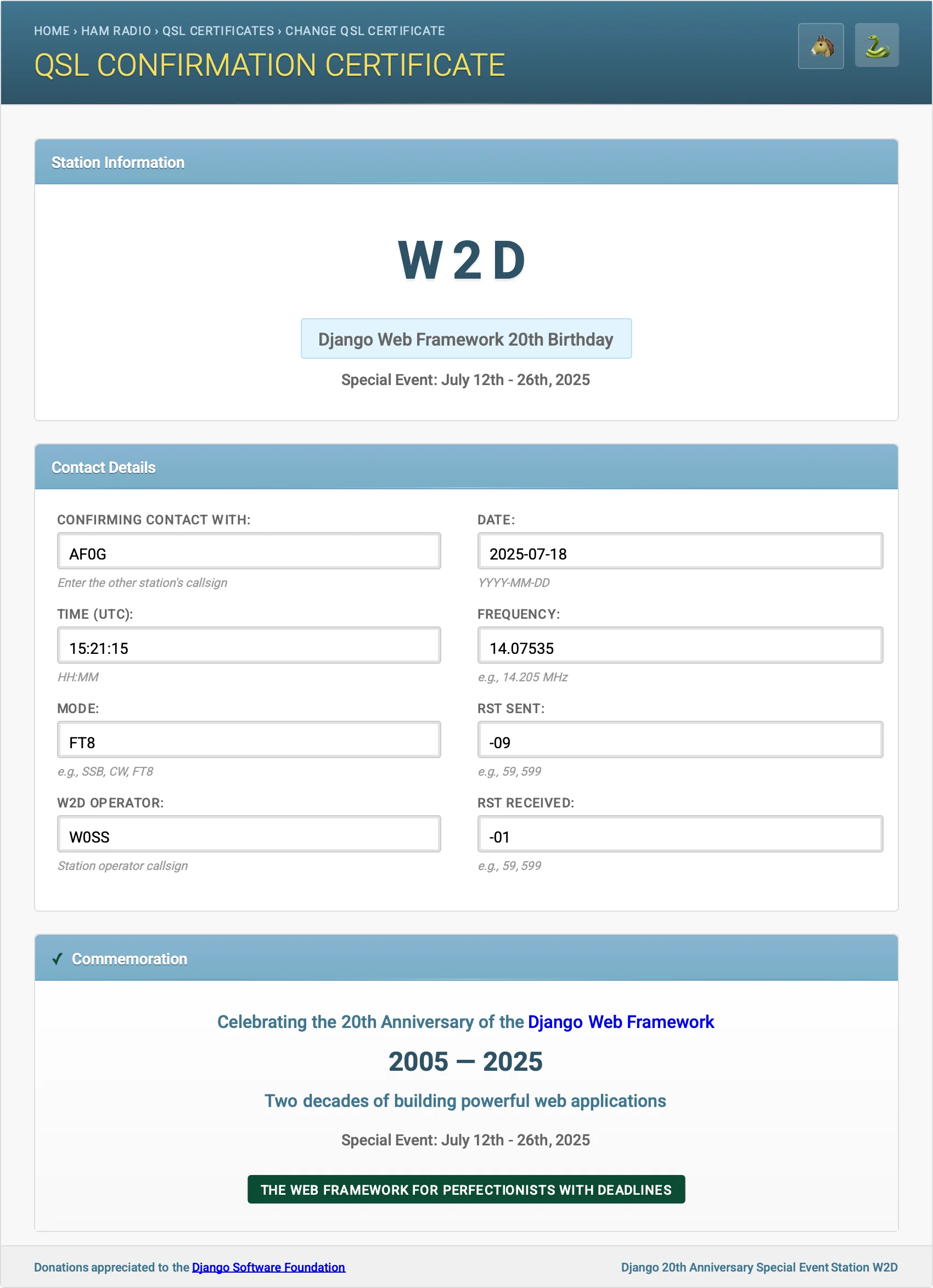
Thank you to the amateur radio operators who made the event possible and of course those who contacted us! Thanks to you this was a fun time for us all. Additionally, thank you to the Django Software Foundation and its members who make the Django Web Framework and its community possible.
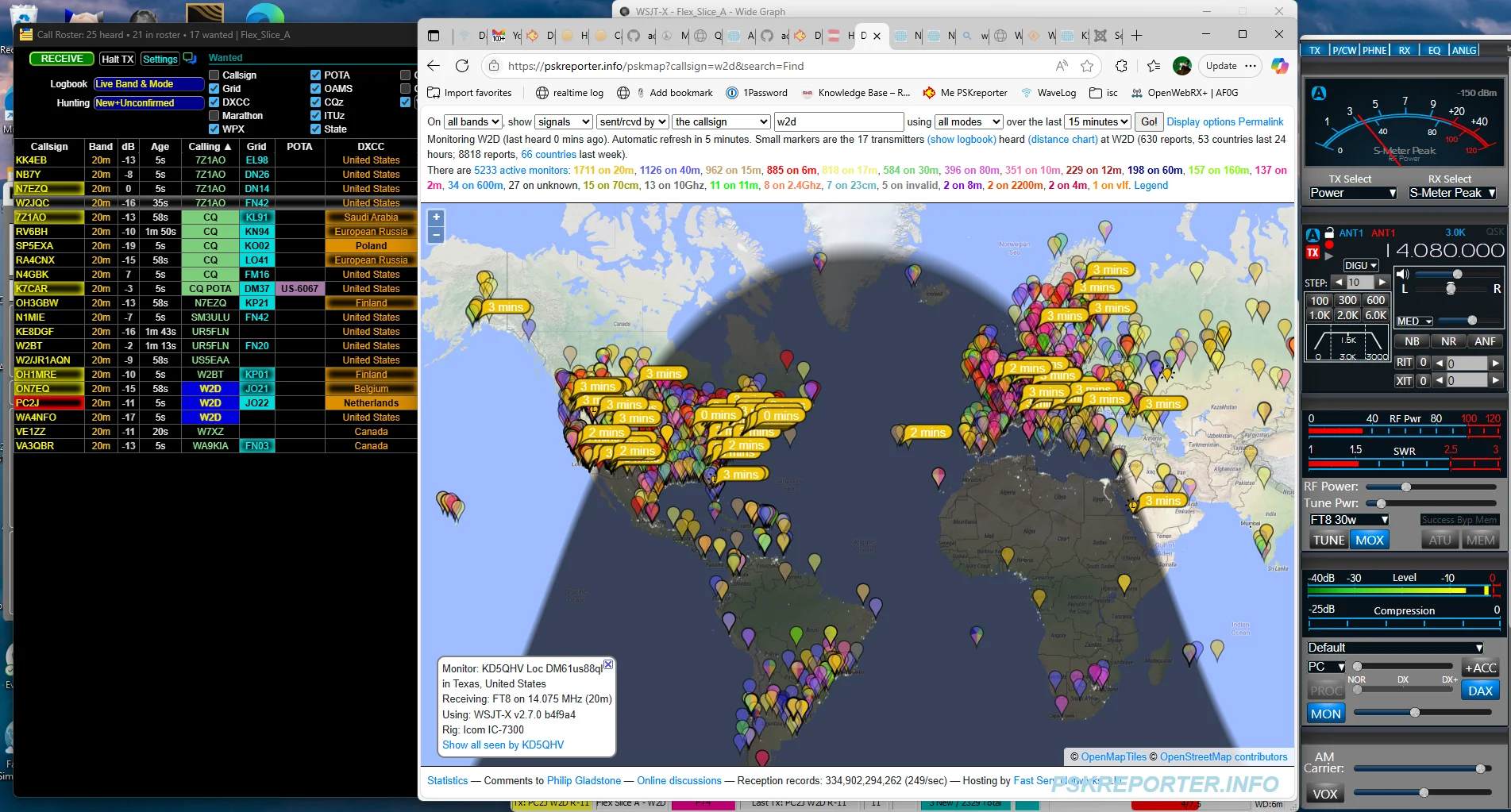
This screenshot shows 3 other stations (ON7EQ from Belgium, PC2J from the Netherlands, and WA4NFO from the US all calling W2D on "20 meters" (14 MHz, so named because the wavelength would be 20 meters long per wave) All of the orange bubbles in the map show the other stations receiving the signal from W2D being transmitted with 30 watts of RF power. The antenna is an approximately 63 foot long piece of wire running between a balcony and a fence post.
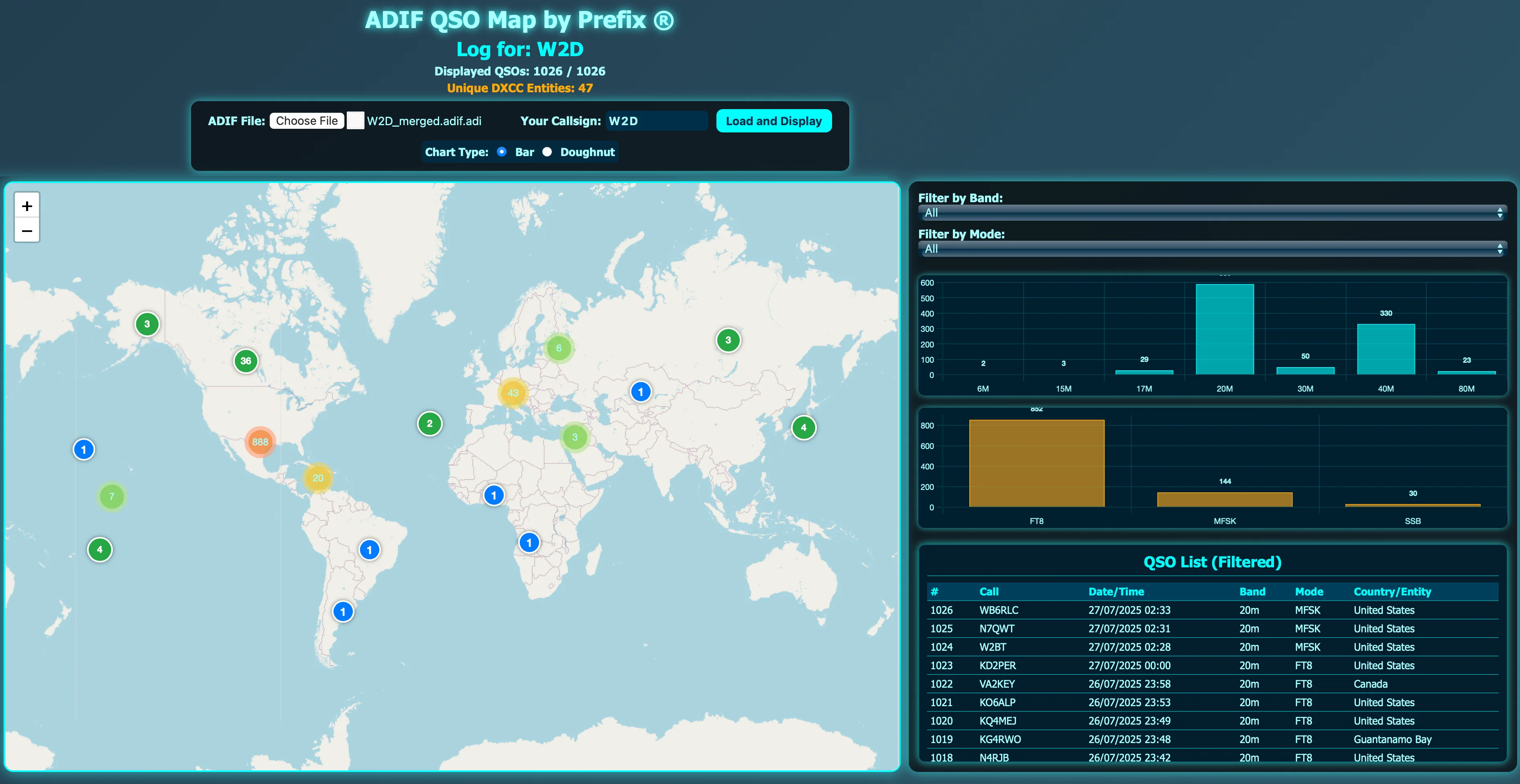
This map shows approximate locations of each geopolitical entity worked during the special event and a count of contacts made in each.
Check out our birthday website for more events – up next, PyDay + Cumple Django organized by PyLadies Colombia in Bogotá 🇨🇴 💛💙❤️
From The Django weblog at 2025-10-23 08:28:17
PyCharm & Django annual fundraiser
We are excited to share the news about our annual fundraiser – and a new way for you to benefit from it. We need your help to support key initiatives such as:
- Django Fellows: Ensuring the rapid development and maintenance of Django.
- Djangonaut Space: Onboarding new contributors to the Django project.
- Django Girls: Making the Django community accessible to programming beginners around the world.
From today to November 11, you have a unique opportunity to support Django through our "Buy PyCharm, Support Django" campaign. By purchasing PyCharm, you benefit in two powerful ways:
- Enhance your development: Gain access to a professional tool designed to maximize your productivity with features like first-class database management, API management, and frontend support.
- Support Django ✨: Contribute directly to the Django Software Foundation. When you purchase PyCharm at a 30% discount through our special campaign link, JetBrains will donate an equal amount to the Django Software Foundation.
Get 30% off PyCharm, Support Django
This is a wonderful opportunity to contribute to the community that supports you and improve your own development process with a top-notch tool.
Thank you for your ongoing support and dedication to Django. Together, we can ensure the continued success and growth of the framework we all rely on.
Other ways to donate
If you would like to donate in another way, especially if you are already a PyCharm customer, here are other ways to donate to the DSF:
- On our website via credit card
- Via GitHub Sponsors
- For those able to make a larger donation as corporate sponsors ($2000+), check out our corporate sponsors form
From The Django weblog at 2025-10-22 18:00:00
Django 6.0 beta 1 is now available. It represents the second stage in the 6.0 release cycle and is an opportunity to try out the changes coming in Django 6.0.
Django 6.0 assembles a mosaic of modern tools and thoughtful design, which you can read about in the in-development 6.0 release notes.
Only bugs in new features and regressions from earlier Django versions will be fixed between now and the 6.0 final release. Translations will be updated following the "string freeze", which occurs when the release candidate is issued. The current release schedule calls for a release candidate in about a month, with the final release scheduled roughly two weeks later on December 3.
Early and frequent testing from the community will help minimize the number of bugs in the release. Updates on the release schedule are available on the Django forum.
As with all alpha and beta packages, this release is not for production use. However, if you'd like to try some of the new features or help find and fix bugs (which should be reported to the issue tracker), you can grab a copy of the beta package from our downloads page or on PyPI.
The PGP key ID used for this release is Natalia Bidart: 2EE82A8D9470983E
From The Django weblog at 2025-10-11 09:31:47
Nominations are open for the elections of the 2026 Django Software Foundation Board of Directors. The Board guides the direction of the marketing, governance and outreach activities of the Django community. We provide funding, resources, and guidance to Django events on a global level.
The Board of Directors consists of seven volunteers who are elected to two-year terms. This is an excellent opportunity to help advance Django. We can’t do it without volunteers, such as yourself. Anyone including current Board members, DSF Members, or the public at large can apply to the Board. It is open to all.
How to apply
If you are interested in helping to support the development of Django we’d enjoy receiving your application for the Board of Directors. Please fill out the 2026 DSF Board Nomination form by 23:59 on October 31, 2025 Anywhere on Earth to be considered.
Submit your nomination for the 2026 Board
If you have any questions about applying, the work, or the process in general please don’t hesitate to reach out on the Django forum or via email to foundation@djangoproject.com.
Thank you for your time, and we look forward to working with you in 2026!
The 2025 DSF Board of Directors.
From The Django weblog at 2025-10-10 08:46:39
2025 Malcolm Tredinnick Memorial Prize awarded to Tim Schilling
We are pleased to announce that the 2025 Malcolm Tredinnick Memorial Prize has been awarded to Tim Schilling!
Tim embodies the values that define the Django community: generosity, respect, thoughtfulness, and a deep commitment to supporting others. He is a tireless community leader who creates spaces where newcomers thrive ❤️ exactly in the spirit of our prize and Malcolm Tredinnick’s work.

About Tim
As a co-founder of Djangonaut Space, Tim has encouraged countless people to take their first steps as contributors. With the overall program but also specific initiatives like co-writing sessions, Space Reviewers, Cosmic Contributors. Many community members trace their involvement in Django back to Tim’s encouragement and support.
Beyond Djangonaut Space, Tim serves on the Django Steering Council, is one of the founders of Django Commons, and is an active member of DEFNA, supporting DjangoCon US. He is known for thoughtful feedback, amplifying others’ work, and encouraging people to step forward for leadership roles.
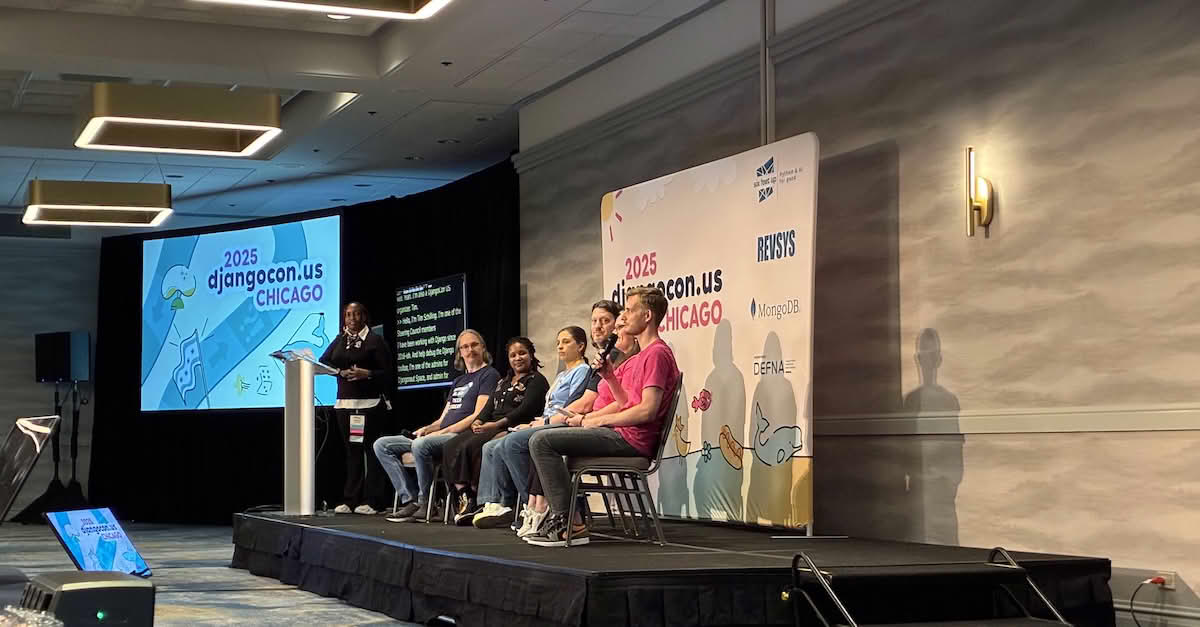
Quotes
Here is some of what people said about Tim’s involvement with the community:
Tim exemplifies all the values the Django community is known for. He is incredibly supportive of newcomers, respectful, and generous. Always ready to give constructive feedback and lend a hand where needed, be it through a pull review or the many Django-related forums he participates in, Tim is a natural leader, someone that the community looks up to.
– Felipe Villegas
Every time he spots a chance to help, he doesn't need to think twice. He's a welcoming person not only with newcomers, as in Djangonaut Space, but also with maintainers through Django Commons. Tim is also very creative, finding different ways to contribute. For example, inside the Djangonaut Space community, the "Space Reviewers" team was formed to host a live stream to help people become reviewers by sharing the process and also actually reviewing a ticket that needs some attention. The Django community is much more than blessed to have Tim, who exemplifies dedication, respect, and support for others.
– Raffaella
Tim just has this way of making sure newcomers feel welcome and get the support they need. He doesn't just talk about community building - he actually does the work to make it happen.
– Abe Hanoka
Tim is a thoughtful and caring community leader. He engages with newcomers in a warm and welcoming manner. In his roles as the admin for Djangonaut Space, the admin of Django Commons, and a member of the Steering Council, he strategically identifies the gaps in the community, collaborates with other members to develop an action plan, and follows through with the execution. He's doing some of the hardest work out there. Not only is Tim nurturing newcomers, he's also growing the community by bridging the gap between newcomers and experienced open source contributors. Tim's actions speak louder than words.
– Lilian
Other nominees
Other nominations for this year included:
- Adam Hill and Sangeeta Jadoonanan
- Anna Makarudze
- Baptiste Mispelon
- Bhuvnesh Sharma
- Carlton Gibson
- David Smith
- Ester Beltrami
- Jake Howard
- Lilian
- Mike Edmunds
- Mike Edwards
- Noah Maina
- Raymond Penners
- Simon Charette
- Will Vincent
Malcolm would be very proud of the legacy he has fostered in our community. Each year we receive many nominations, and it is always hard to pick the winner. If your nominee didn’t make it this year, you can always nominate them again next year!
Congratulations Tim on the well-deserved honor!
From The Django weblog at 2025-10-01 14:55:00
Django security releases issued: 5.2.7, 5.1.13, and 4.2.25
In accordance with our security release policy, the Django team is issuing releases for Django 5.2.7, Django 5.1.13, and Django 4.2.25. These releases address the security issues detailed below. We encourage all users of Django to upgrade as soon as possible.
CVE-2025-59681: Potential SQL injection in QuerySet.annotate(), alias(), aggregate(), and extra() on MySQL and MariaDB
QuerySet.annotate(), QuerySet.alias(), QuerySet.aggregate(), and QuerySet.extra() methods were subject to SQL injection in column aliases, using a suitably crafted dictionary, with dictionary expansion, as the **kwargs passed to these methods on MySQL and MariaDB.
Thanks to sw0rd1ight for the report.
This issue has severity "high" according to the Django security policy.
CVE-2025-59682: Potential partial directory-traversal via archive.extract()
The django.utils.archive.extract() function, used by startapp --template and startproject --template, allowed partial directory-traversal via an archive with file paths sharing a common prefix with the target directory.
Thanks to stackered for the report.
This issue has severity "low" according to the Django security policy.
Affected supported versions
- Django main
- Django 6.0 (currently at alpha status)
- Django 5.2
- Django 5.1
- Django 4.2
Resolution
Patches to resolve the issue have been applied to Django's main, 6.0 (currently at alpha status), 5.2, 5.1, and 4.2 branches. The patches may be obtained from the following changesets.
CVE-2025-59681: Potential SQL injection in QuerySet.annotate(), alias(), aggregate(), and extra() on MySQL and MariaDB
- On the main branch
- On the 6.0 branch
- On the 5.2 branch
- On the 5.1 branch
- On the 4.2 branch
CVE-2025-59682: Potential partial directory-traversal via archive.extract()
- On the main branch
- On the 6.0 branch
- On the 5.2 branch
- On the 5.1 branch
- On the 4.2 branch
The following releases have been issued
- Django 5.2.7 (download Django 5.2.7 | 5.2.7 checksums)
- Django 5.1.13 (download Django 5.1.13 | 5.1.13 checksums)
- Django 4.2.25 (download Django 4.2.25 | 4.2.25 checksums)
The PGP key ID used for this release is Jacob Walls: 131403F4D16D8DC7
General notes regarding security reporting
As always, we ask that potential security issues be reported via private email to security@djangoproject.com, and not via Django's Trac instance, nor via the Django Forum. Please see our security policies for further information.
From The Django weblog at 2025-09-21 06:00:00
Sarah Boyce - Maternity leave announcement
Hello Djangonauts,
At the end of this month, I'll be stepping away from my role as Django Fellow for some time while I'm on maternity leave.
During this period, I don't anticipate being active on Trac, in PR reviews, on the Forum, or on Discord. I would appreciate folks giving me space to settle in with my new baby.
Django will be well looked after by our Fellows, Natalia Bidart and Jacob Walls, who will continue supporting the project and community while I'm away.
I'm grateful to be part of such a wonderful community, and I look forward to returning after I have settled into this new chapter of my life. Thank you all for your support in keeping Django thriving.
Sarah Boyce
Django Fellow, mum-to-be
From The Django weblog at 2025-09-17 12:00:00
Django 6.0 alpha 1 is now available. It represents the first stage in the 6.0 release cycle and is an opportunity to try out the changes coming in Django 6.0.
Django 6.0 assembles a mosaic of modern tools and thoughtful design, which you can read about in the in-development 6.0 release notes.
This alpha milestone marks the feature freeze. The current release schedule calls for a beta release in about a month and a release candidate roughly a month after that. We'll only be able to keep this schedule with early and frequent testing from the community. Updates on the release schedule are available on the Django forum.
As with all alpha and beta packages, this release is not for production use. However, if you'd like to take some of the new features for a spin, or help find and fix bugs (which should be reported to the issue tracker), you can grab a copy of the alpha package from our downloads page or on PyPI.
The PGP key ID used for this release is Natalia Bidart: 2EE82A8D9470983E
From The Django weblog at 2025-09-13 21:18:27
Nominate a Djangonaut for the 2025 Malcolm Tredinnick Memorial Prize
Hello Everyone 👋 It is that time of year again when we recognize someone from our community in memory of our friend Malcolm.
Malcolm was an early core contributor to Django and had a huge influence on Django as we know it today. Besides being knowledgeable he was also especially friendly to new users and contributors. He exemplified what it means to be an amazing Open Source contributor. We still miss him to this day.
The prize
Our prizes page summarizes it nicely:
The Malcolm Tredinnick Memorial Prize is a monetary prize, awarded annually, to the person who best exemplifies the spirit of Malcolm’s work - someone who welcomes, supports, and nurtures newcomers; freely gives feedback and assistance to others, and helps to grow the community. The hope is that the recipient of the award will use the award stipend as a contribution to travel to a community event -- a DjangoCon, a PyCon, a sprint -- and continue in Malcolm’s footsteps.
Please make your nominations using our form: 2025 Malcolm Tredinnick Memorial Prize nominations. Nominations are welcome from everyone.
We will take nominations until Saturday, September 27th, 2025, 23:59 Anywhere on Earth, and will announce the results in early October. If you have any questions please use our dedicated forum thread or contact the DSF Board.
From The Django weblog at 2025-09-08 22:59:58
Getting Started With Open Source Through Community Events
In July, I joined Raffaella Suardini and Sage Abdullah for the Djangonaut Space Space Reviewers Episode 6, where we reviewed a Django PR during a live stream. This was a fun event. I won’t get into the technical aspects of the review, and I won’t point out the many mistakes I made. Instead, I want to revisit several “getting started with open source” community events and reflect on my personal growth since I first got involved with open source.
I hope this encourages others to attend those events and similarly get involved!
Tutorial office hours 🕐
My first open source contribution happened accidentally during DjangoCon US 2023. I volunteered to host office hours to help tutorial attendees set up their development environments. I went through the tutorial projects, found a missing dependency in one of them, and reported it on the conference chat. A conference organizer, Tim Schilling, responded and suggested that I open a pull request (PR) to the project. I remember thinking to myself, “Really? I can do that?”.
Sprints 🏃
During the Sprint Days of the conference, I participated and opened two PRs to address accessibility issues. I didn’t know much about accessibility at that point, and I would not have known how to navigate the contribution process and pick out issues on my own. Thankfully, the project leaders were there to guide new contributors, and I was able to gain hands-on experience with these first few PRs.
Testathons 🧪
There was another event that took place during the Sprint Days called Testathon. I had heard of hackathons before, but I had not heard of testathons. I attended and found out they were like live stream coding or group pair programming. One person shared their screen and the group chimed in on strategies. The purpose of the testathon was to show people how to test open source projects against Django’s beta release. The code driver (or anyone else in the group) would point out what files to look for, how to run tests, and how to open PRs. Every project is slightly different, from project setup to contributing etiquette, and I learned several different things from attending 2 testathons. I loved the interactive and intimate nature of the event. It exposed me to another aspect of open source projects and contributions. I also thought it was very brave of people to share their screens and work through code together in a group. My brain would have short circuited if I were put on the spot like that!
—
From DjangoCon US 2023, I participated in 3 different types of events where I got hands-on experience with open source contributions, and I wanted more! I was curious about the live stream coding and group pair programming opportunities, too. This was definitely outside of my comfort zone, and I wanted to know how I could overcome my own inhibitions and participate more actively. I wanted to be able to jump into events so nonchalantly as everyone else seemed to do. (Of course, that’s the perception. Now, I know that most people feel some level of nervousness or anxiety when they are hosting or attending such events, and that’s absolutely normal.)
Djangonaut Space 🚀
When the Djangonaut Space program was announced, I jumped at the opportunity. I applied and was accepted for the first session, which took place from mid-January to early March of 2024. With the guidance of the Navigator and Captain on my team, I learned to sift through the Django’s Trac ticket management system, pick out a ticket, and I also faced my fear of posting comments publicly. The PR was merged, and it was thrilling to see my GitHub username in the history of the Django code base.
In March 2024, when the first Djangonaut Space session came to a close, Tim, a program organizer, asked if anyone was interested in hosting a “Getting Started With Contributing” event. I expressed my interest, and Tim suggested a ticket to work on. Unfortunately, I didn’t follow through. How could I host a “Getting Started With Contributing” event? First, I wasn’t sure if I even knew how to get started. Second, I wasn’t ready to lead an event and the discussions while simultaneously sharing my screen and thinking out loud. Finally, I wasn’t ready to be on camera in the public eye. Even though I had just finished the Djangonaut Space program, I hadn’t overcome my own inhibitions. I didn’t ask for guidance, and the event never materialized.
Space Reviewers 👾
About 8 months later in November 2024, Space Reviewers launched its very first episode. I thought it was such a creative format. I wanted to be a part of it. By this time, I was getting a lot of training with event organizing through my role as the Session Organizer for Djangonaut Space, but I wasn’t sure how to ask about joining the Space Reviewers crew, and maybe it was too early in the formation of the group to bring on another member.
It wasn’t until June 2025 that I finally asked if I could help out with Space Reviewers. The crew welcomed me as a new member. I started out by making a pre-recorded video, a PR Review Deep Dive, that was uploaded to the Djangonaut Space YouTube channel. I had a lot of fun recording and editing the video.
A month later, in July 2025, the crew members planned for the next episode. Raffaella scheduled time for the event and created the show notes, and I was taking on Tim’s role as a co-organizer. Because I would be managing the video stream and sharing my screen, I realized that I could be the single point of failure during the event. There was no safety element that a pre-recorded video offers. If my internet went down, or if my computer crashed, or if I stupidly clicked the wrong button, the live stream could come to a halt. It was a terrifying thought, but I took on the risks and pushed forward.
On the day of the event, there was a delay to the start time and some fumbles on my end, but overall, it was very fun and productive. People joined and shared their tips and tricks in the live chat. By the end, we were able to walk through the review process and post our comments on the PR. Looking back, I think making the pre-recorded video was a great stepping stone towards hosting the live stream.
I’m so glad I had the opportunity to work with Raffaella and Sage as part of Space Reviewers. They have a lot of insights and perspectives that I didn’t have. I had a lot of fun taking on the new challenges that came with organizing this event. Initially, I struggled internally as I tried to face some of my fears. There were moments leading up to the event where I thought to myself, “Why did I volunteer to do this???” In the end, I’m glad I did.
Personal growth 🌱
Some of the challenges I overcame might not seem like a big deal, but when I compare myself to where I was at the beginning of DjangoCon US 2023, I can see my personal growth quite prominently. Now, I know how to get started with contributing, and I am able to walk people through the process. I am also a lot more comfortable taking ownership of organizing and leading events. (I remember a time when I constantly needed to ask for permission or confirmation before executing an action.) I can brush off the fumbles I make as the camera is rolling, and I can continue on with the discussion.
When I revisit the community events that I have participated in over the past 2 years, from Space Reviewers, to Sprints, to Testathons, to Tutorial office hours, I realize how far I have come. I am also reminded of what it was like to be absolutely new to open source and to the community. Although I still feel somewhat new, I’m not a deer in headlights anymore. I’m still trying to find my place in open source, and the best way to do that is to continue showing up and continue helping out. One small PR at a time, one small review at a time. One little blog, one little video…
Let’s Get Started! 🌟
If you’re looking to contribute to open source, check out the upcoming events and programs.
- Djangonaut Space Session 5 - An 8-week, semi-structured mentorship program and community. Applications are open now until Sep 14th.
- Django on the Med - 3 days of Sprints to work on Django, taking place 7th-9th Oct 2025, in Palafrugell Spain.
- DjangoCon US 2025 - 3 days of talks and 2 days of Sprints, from 8th-12th Sep 2025, in Chicago, IL, USA.
- Django Girls+ - One-day programming workshops, for women and underrepresented persons. Check out the 26 upcoming events hosted all around the world.
It doesn’t matter if you’ve been making software for 20 years or 20 days, there are many events to help you get started with open source, and many more reasons to stick around.
Thank you to Lilian for proposing this guest post on the Django blog! Lilian was our DSF Member of the Month in August 2025. You can learn more about her at ontowhee.com and follow her writing at buttondown.com/ontowhee.
From The Django weblog at 2025-09-05 15:02:23
DSF at EuroPython 2025: Celebrating 20 years of Django
This year, the Django Software Foundation (DSF) was invited by EuroPython to come to the event, showcase the framework and the vibrant community around it. The DSF had a booth in the community area where attendees could learn more about Django and meet maintainers.
This year was extra special: Django’s 20th birthday was right at the beginning of the conference! The milestone was marked in style, starting on Wednesday evening at Pyvo, the local Python community meetup in Prague, where we celebrated with a cake.
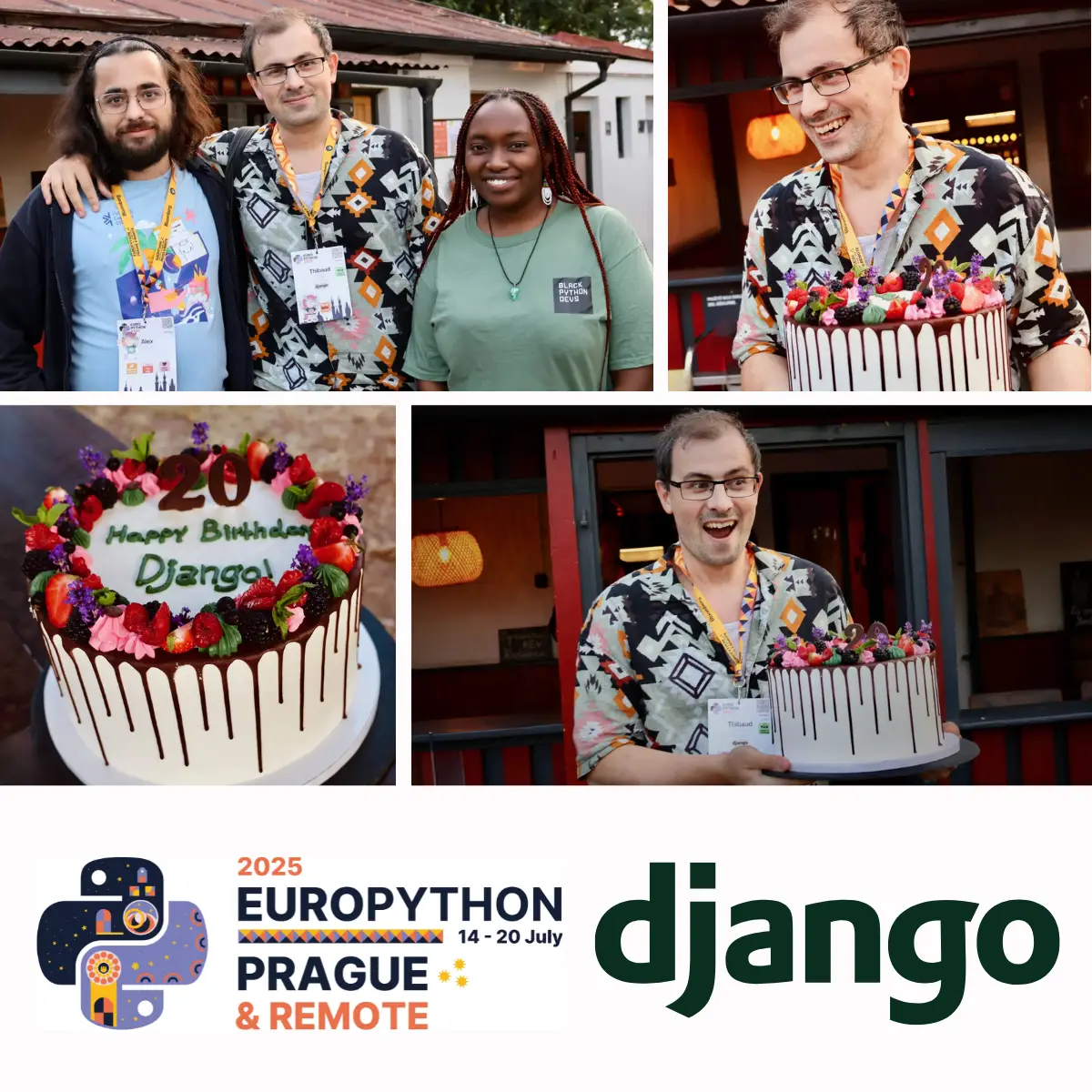
On Friday, the celebration continued with an open-space gathering at the conference — and, of course, another cake 🎂. For people who missed this, there are other local Django birthday events running through the rest of 2025!
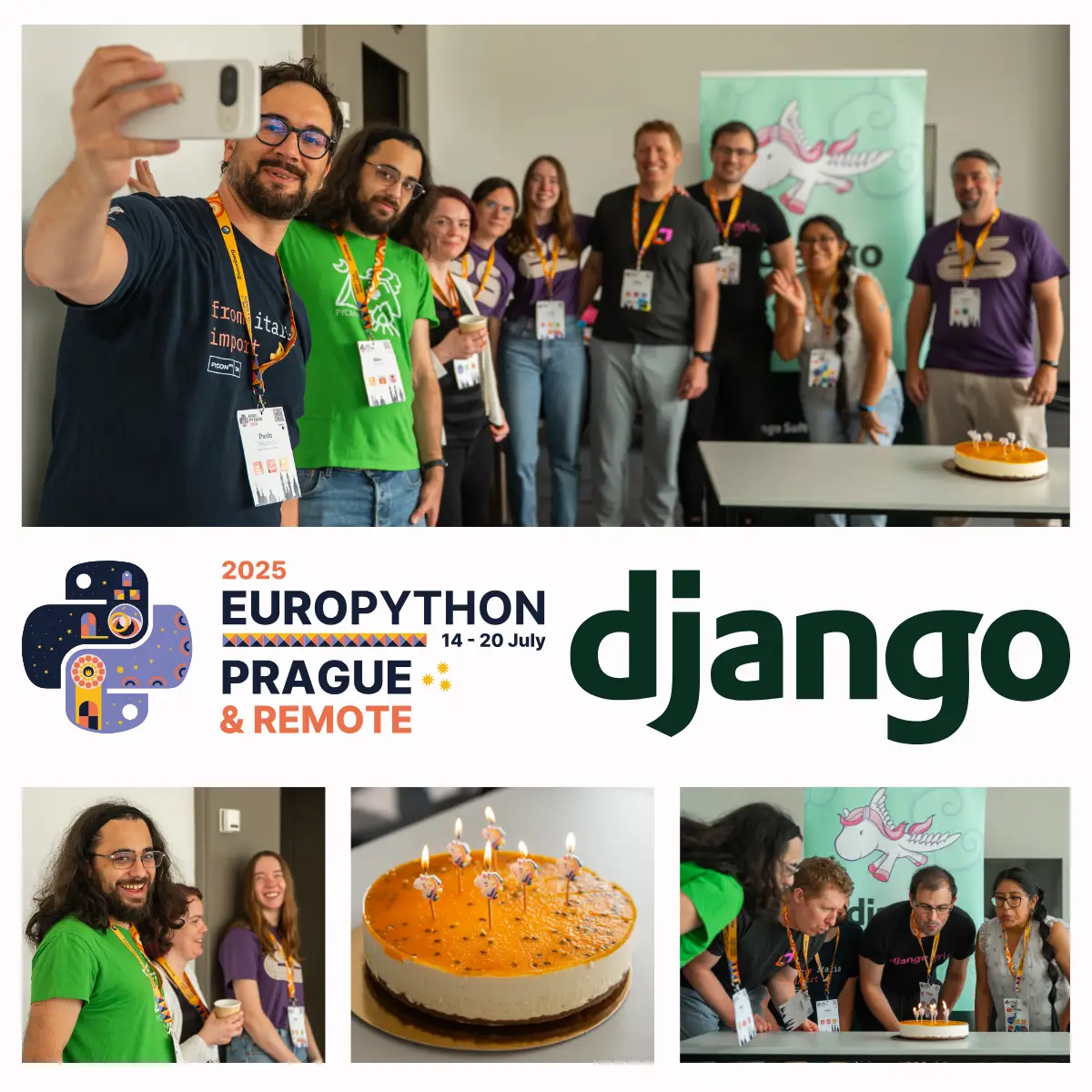
View all local 20th birthday events
Adding to the festive atmosphere, the DSF shared stickers co-branded with their unofficial pony mascot and the EuroPython and EuroPython Society logos. These became an instant hit with attendees, combining Django’s playful mascot with EuroPython Society’s identity.
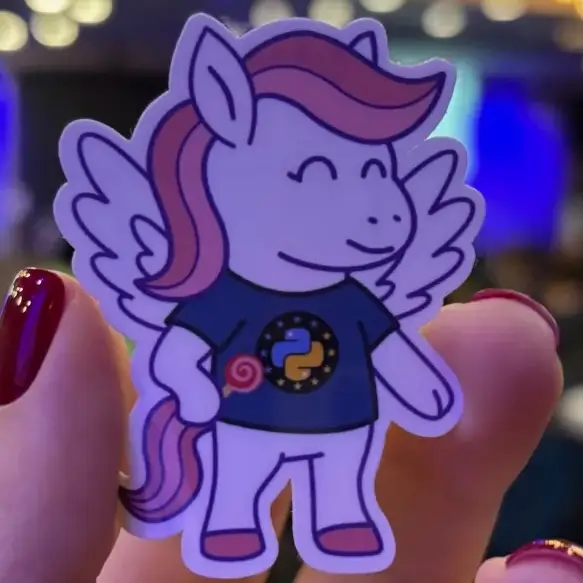
The Django community was also active during the sprint weekend. Over two days, 21 participants worked on Django, tackling 12 issues and merging 4 pull requests. For newcomers, it was a welcoming way to start contributing; for experienced developers, it was a chance to share knowledge and push the project forward together.
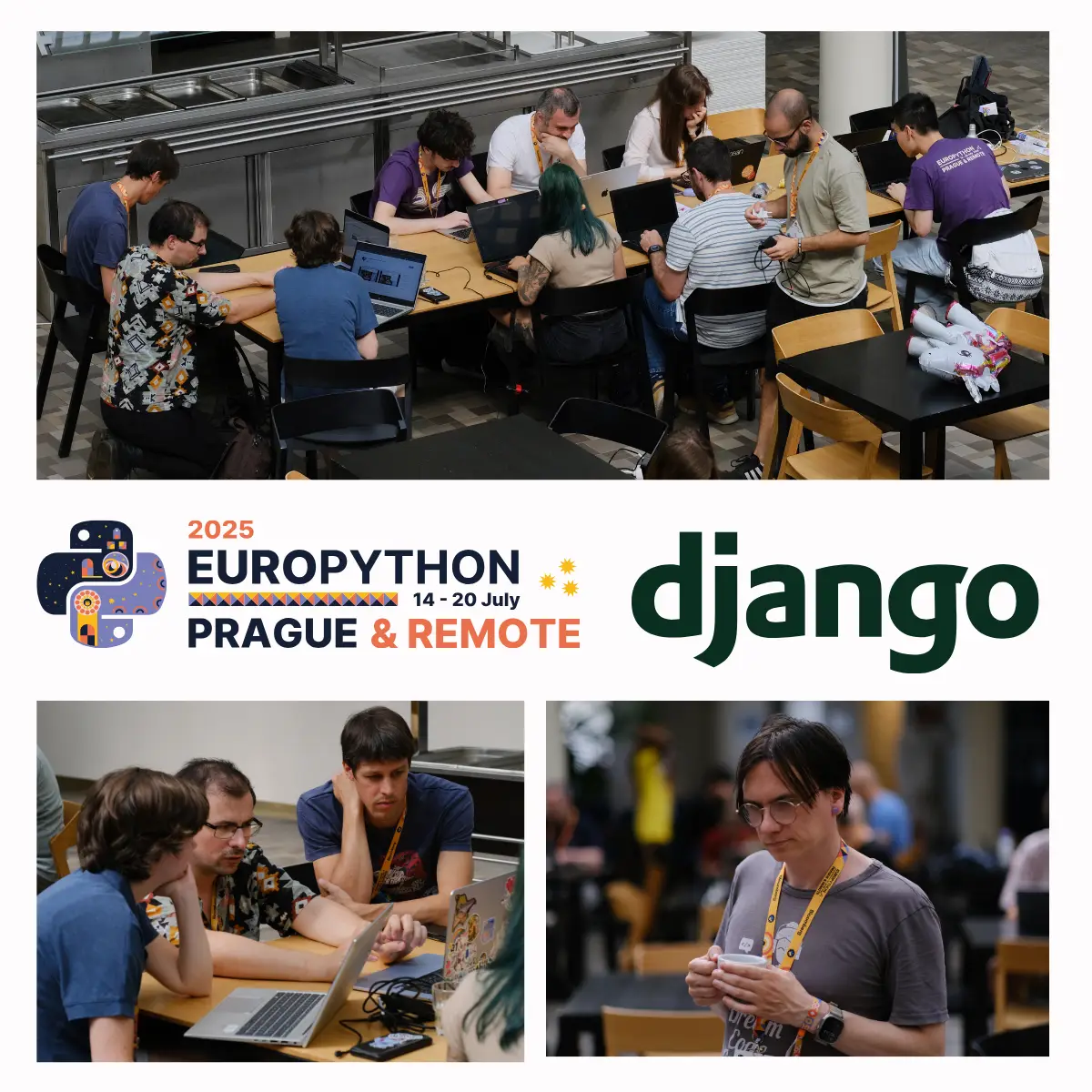
We asked the members of the Django Software Foundation attending EuroPython how they liked EuroPython and this is what they said:
The talks and tutorials were so great and I got to witness amazing projects from this community. This was my first europython conference and let me tell you, this community overdelivered. It was also my first time organizing Django Girls outside Africa. Django Girls Prague was amazing.\
- Doreen Nangira - Django Girls organizer
Just the perfect mixture of catching up with people I know, meeting people I don’t know, learning new things. Time well spent chatting w/ Python veterans and also first-timers. Volunteering there was ACE, and I’m thankful we got to have a booth and birthday cake for Django 🎂\
- Thibaud Colas - President, Django Software Foundation
It was my first EuroPython, it felt really special! I was surrounded by wonderful people, and it was an amazing experience to volunteer at our community booth.\
- Raffaella Suardini - Djangonaut Space organizer
We’re delighted the DSF joined us this year. If you’re part of a foundation and would like to have a booth at EuroPython, keep an eye out for our Call for Communities next year.
Thank you to EuroPython Vice Chair and DSF Individual member Mia Bajić for reporting back on the event ❤️. And thank you to our volunteers Tom Carrick, Thibaud Colas, Raffaella Suardini, and Alex Gómez who represented our foundation at the conference. As well as to Doreen Nangira who ran the Django Girls+ workshop at the conference!
From The Django weblog at 2025-09-04 18:01:36
Last call for DjangoCon US 2025 tickets!
DjangoCon US starts next week in Chicago, IL on September 8-12th, 2025!
With three amazing keynotes and over fifty presentations over three days, join us in person or online where you can watch presentations on your own schedule or stream live with us during the live event.
Can't make it to Chicago? Our online tickets give you the best of both worlds. Watch live as it happens or catch up on your own schedule – all talks will be available to stream throughout the conference and beyond. You'll get the same great content, participate in online discussions, and join our vibrant community from wherever you are. Plus, with two days of virtual sprints alongside our in-person sprints, online attendees can contribute to Django projects and collaborate with the community just like everyone else.
Get your ticket today before it's too late! Check out the full schedule, visit 2025.djangocon.us for more details, or contact us at hello@djangocon.us with any questions.
From The Django weblog at 2025-09-04 16:02:51
Keyboard shorcuts in Django via GSoC 2025
This summer I participated in the Google Summer of Code program with Django. My work focused on introducing keyboard shortcuts to the Django admin interface which led to a new package: django-admin-keyshortcuts.
Proposal and Community Discussions
My original GSoC proposal was to improve the existing django-admin-keyboard-shortcuts package maintained by one of my mentors, Tom. The plan was to fix bugs, add new keyboard shortcuts, build a command palette, and eventually merge these features into Django's core admin. I initially thought getting my GSoC proposal accepted meant I could dive straight into coding. But Tom explained that Django has its own process for new features, which starts off with community discussions.
After posting on the forum and gathering feedback, we decided to focus on keyboard shortcuts only, and continue exploring that in packages rather than target Django core immediately. This way the feature can be tested and improved more quickly without waiting on Django's long release cycle.
The accessibility team helped drafting keyboard shortcuts outlining key requirements and expected outcomes, in particular making sure shortcuts would be widely compatible with browsers and assistive technologies. That document served as the base for developing django-admin-keyshortcuts.
django-admin-keyshortcuts
This package adds useful keyboard shortcuts to the Django admin interface. The goal is to make the Django admin interface faster to navigate and more accessible to keyboard-first users. Here are some of the shortcuts we have added so far:
- / focuses the search bar.
- j/k focuses next/previous object.
- Ctrl+s saves the object.
- Alt+d prompts to delete the object.
The package also comes with a keyboard shortcuts dialog, crucial so users of the admin can discover those new features:
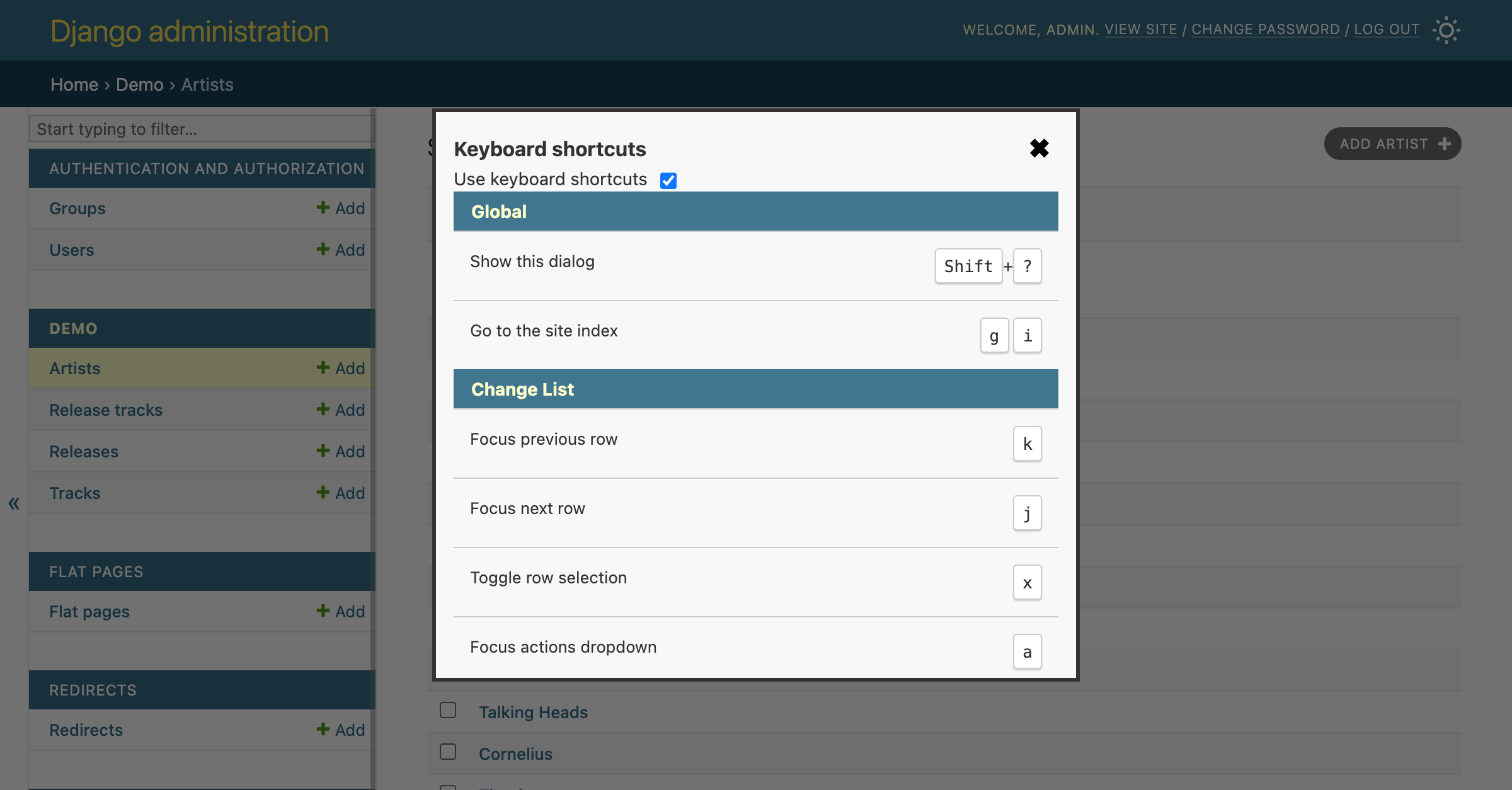
Developers can also define custom shortcuts by extending admin templates. Detailed instructions can be found in the package's README.
Under the hood, the package uses the hotkey library for handling shortcuts. The library seems to be well maintained (compared to other alternatives) and is used for keyboard shortcuts in GitHub.
What's next
We have made a lot of progress, but there's still work to do before we can push to merge this functionality inside Django core.
Implementation issues
Right now, there are a couple of known problems:
- Shortcuts do not trigger when input or textfield is focused:
- Shortcut keys not consistent when switched to non-US layouts:
To address these we may wait for the hotkey library maintainers to implement the necessary fixes, or look for alternatives.
Gather feedback
We want more users to try it out! Testing in different scenarios will help find bugs faster and improve the package. The default shortcut set is also small, we need feedback to determine which shortcuts are most useful. We also plan to list the package on a new "Experiments" section on the new Django Ecosystem page to make it more visible.
But for now, try it out and let us know what you think! We have a static admin demo for people to directly try the shortcuts. Or install django-admin-keyshortcuts to test it on your own project.
Let us know what you think over on the Django Forum!
From The Django weblog at 2025-09-03 11:36:27
Django security releases issued: 5.2.6, 5.1.12, and 4.2.24
In accordance with our security release policy, the Django team is issuing releases for Django 5.2.6, Django 5.1.12, and Django 4.2.24. These releases address the security issues detailed below. We encourage all users of Django to upgrade as soon as possible.
CVE-2025-57833: Potential SQL injection in FilteredRelation column aliases
FilteredRelation was subject to SQL injection in column aliases, using a suitably crafted dictionary, with dictionary expansion, as the **kwargs passed QuerySet.annotate() or QuerySet.alias().
Thanks to Eyal Gabay (EyalSec) for the report.
This issue has severity "high" according to the Django security policy.
Affected supported versions
- Django main
- Django 5.2
- Django 5.1
- Django 4.2
Resolution
Patches to resolve the issue have been applied to Django's main, 5.2, 5.1, and 4.2 branches. The patches may be obtained from the following changesets.
CVE-2025-57833: Potential SQL injection in FilteredRelation column aliases
- On the main branch
- On the 5.2 branch
- On the 5.1 branch
- On the 4.2 branch
The following releases have been issued
- Django 5.2.6 (download Django 5.2.6 | 5.2.6 checksums)
- Django 5.1.12 (download Django 5.1.12 | 5.1.12 checksums)
- Django 4.2.24 (download Django 4.2.24 | 4.2.24 checksums)
The PGP key ID used for this release is : 3955B19851EA96EF
General notes regarding security reporting
As always, we ask that potential security issues be reported via private email to security@djangoproject.com, and not via Django's Trac instance, nor via the Django Forum. Please see our security policies for further information.
From The Django weblog at 2025-08-30 21:30:00
DSF member of the month - Lilian
For August 2025, we welcome Lilian as our DSF member of the month! ⭐
Lilian contributes to the community by writing blog posts, being active in the Django forum and participating in code reviews with the Space Reviewers. Starting as a participant in the first Djangonaut Space session, she progressed to become both a Captain and Session organizer. She has been a DSF member since March 2024. Lilian is looking for new opportunities!
You can learn more about Lilian by visiting Lilian's website and her GitHub Profile.
Let’s spend some time getting to know Lilian better!
Can you tell us a little about yourself (hobbies, education, etc)?
My name is Lilian and I started contributing to Django during the sprint days of DjangoCon US 2023. I continued contributing through the Djangonaut Space program, where I've been involved as a mentee, a mentor, and a session organizer. I love the impact the program brings to Django and how it has helped so many individuals in various ways. My hobbies include cooking and sharing meals with my friends and volunteering at local events.
I'm curious, where does your GitHub nickname come from?
Haha, towhee is a bird and I just prefixed it with the preposition “on”.
How did you start using Django?
I had a project from a client where there was an existing website that was built in PHP. The client wanted to add new features. At the time, I was mainly using Flask for other projects, but I started seeing Django rise in popularity. I evaluated PHP and Django, and I chose Django for its security features. The fact that it was in Python also meant I could develop the new features pretty quickly. The project ended up being a hybrid of PHP and Django with Apache server routing different pages to each application.
What other framework do you know and if there is anything you would like to have in Django if you had magical powers?
I've worked with Flask and SQLAlchemy. I like that SQLAlchemy comes with an ORM, but you can still build queries without it. I like that its queries resemble SQL. In Django, I would like to have a way to write CTEs without resorting to raw SQL and losing the mapping between data and objects. There is the django-cte library, but constructing the queries can still be challenging to me. There’s definitely a tradeoff. However, I don’t know if asking Django to support CTEs is the answer.
What projects are you working on now?
I'm building an ELT (Extract, Transform, Load) pipeline to pull data from multiple sources and run analyses. I'm learning tools like dbt (data build tool) and Airflow to orchestrate the data transformation. It's very interesting to use a framework for managing data.
What are you learning about these days?
I'm learning about databases. I’ve always been curious about their implementation. When I worked on tickets for Django’s ORM, the comments and code reviews from Simon Charette showed me where to look for information, and that got me to dive in further. I participate in the Postgres Patch Review Workshop to review patches, and Andy Pavlo’s lectures are a great source to learn from too.
Which Django libraries are your favorite (core or 3rd party)?
One of my favorite libraries is django-extensions, because it has many useful commands, including the graph_models command that generates ERDs, which helps me navigate the data models in larger projects.
My other favorite libraries are django-allauth and django-rest-framework, because I use it in pretty much every project.
What are the top three things in Django that you like?
I like Djangonaut Space, the community, and the documentation.
You've shown a lot of interest in the contribution process lately, could you share a bit more what you are trying to do and what your goal is?
Django is known for having a high barrier to entry when it comes to contributions and it can have long turnaround times. Djangonaut Space is trying to change that by having mentors guide people through the process and help with code reviews.
How can we expand this effort to make onboarding new contributors easier?
What are some low hanging fruits that will make contributing to Django a more intuitive and pleasant experience?
Areas I’m exploring include:
-
Make the ticket lifecycle more prominent. Make the queues easy to access, and ensure a ticket will get attention from the right people.
-
Gain insights into contribution bottlenecks so DSF Board and Working Groups can make better decisions on where to allocate funds and resources.
-
Provide recognition for work done beyond the PR authorship to encourage continued involvement.
You have taken part of Djangonaut Space program in many ways, do you have any advice or thing to mention for people hesitant to apply to the program for the future session?
For anyone who is hesitant, check out the media page to learn about past participants' experiences. Check out the AMA video and many other videos on the YouTube channel to learn more about the program. There are many opportunities to try new things and learn new skills in open source, and Djangonaut Space is a great place to get started. You'll meet and work with people from all around the globe, which is pretty awesome!
What do you do for fun outside of programming?
I am trying new things! I’m volunteering at a community run radio station, where I’m learning to operate the video cameras during live mic events and training to become a DJ. It’s pretty cool meeting bands from all around the world.
Is there anything else you’d like to say?
I'm extremely grateful for the Djangonaut Space program and the Django community!
Thank you for doing the interview, Lilian !
From The Django weblog at 2025-08-13 15:03:19
Building better APIs: from Django to client libraries with OpenAPI
tl;dr
A summary of resources and learnings related to building REST API I put together over the last couple of years. Complete API development workflow from Django backend to frontend clients using Django REST Framework, drf-spectacular for OpenAPI spec generation, and automated client generation with openapi-generator. Big productivity boost!
There is a lot of discussion about frameworks for building REST APIs, some of them being even able to generate OpenAPI specs directly for you. Django is not quite known for that, but there are ways of doing this by automating most of the process while being very productive and offering your team a clean developer experience.
Overview
The stack I prefer makes use of several additional modules you will require: django-rest-framework and drf-spectacular alongside Django. REST Framework helps you extend your application in order to have a REST API, while drf-spectacular will help you the ability to generate the OpenAPI spec (standalone post: Create OpenAPI spec for Django REST Framework APIs.
After having the OpenAPI spec, you can generate clients with openapi-generator. Here is an example I mapped out of generating an Angular client:
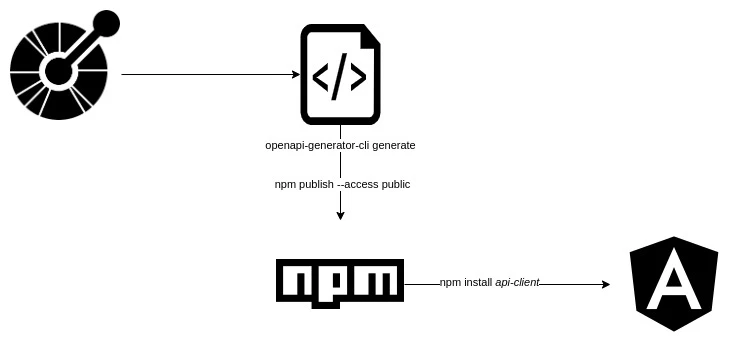
Step-by-step process
There is also a recording from my GLT 2025 talk where I summarize most of these ideas.
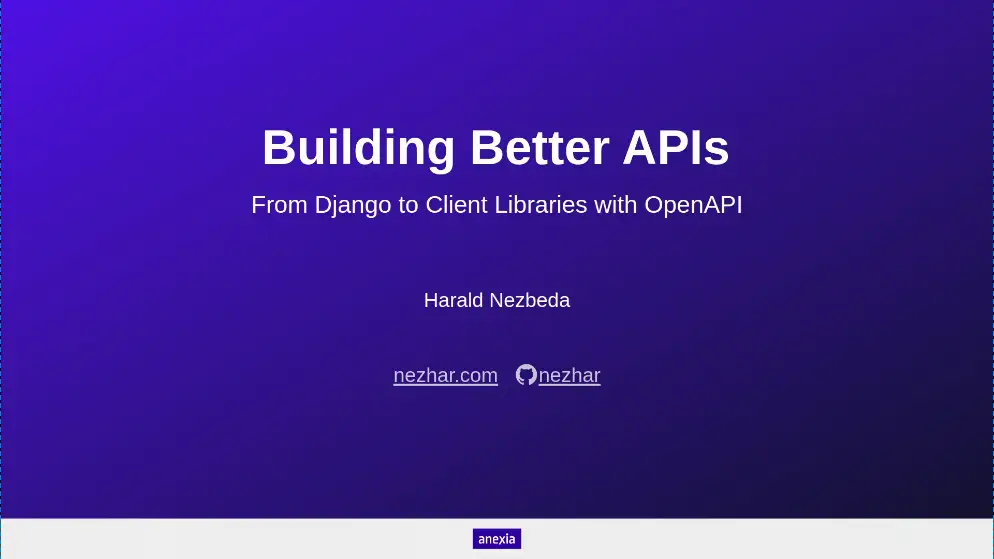
In case you want to follow along, here is a step-by-step guide from the repository I showed during the presentation:
- Create a Django project
- Add a Django app
- Models and database migrations
- DRF serializers
- DRF views
- Configure URLs
- Add and configure drf spectacular
- Generate OpenAPI
From the last step, you can generate the API clients for the platform you require. You can follow the README and the examples available in my glt25-client repository.
Maintaining compatibility over time
The final tool you can use is openapi-diff, which will help you keep your documentation compatible. This is very important once your REST API is used in production:
Example of a compatible change: glt25-demo v1 to v2
docker run --rm -t openapitools/openapi-diff:latest https://github.com/nezhar/glt25-demo/releases/download/v1/openapi.yaml https://github.com/nezhar/glt25-demo/releases/download/v2/openapi.yaml
Example of a breaking change: glt25-demo v2 to v3
docker run --rm -t openapitools/openapi-diff:latest https://github.com/nezhar/glt25-demo/releases/download/v2/openapi.yaml https://github.com/nezhar/glt25-demo/releases/download/v3/openapi.yaml
Automating the maintenance
The process can be automated even further using GitHub Actions and Dependabot. Here are what the steps look like with this full continuous delivery setup:
Takeways
Building a complete API development workflow from Django to client libraries using OpenAPI creates a powerful and maintainable development experience. By combining Django REST Framework with drf-spectacular for automatic OpenAPI spec generation and openapi-generator for client creation, you can eliminate manual API documentation and reduce integration errors.
If you want to go even further, you can automate the integration of error codes inside the OpenAPI spec. This way you can better support languages that are even more strict when consuming the REST API!
Thank you to Harald Nezbeda for proposing this guest post on the Django blog!
From The Django weblog at 2025-08-11 20:30:00
Welcome Our New Fellow - Jacob Tyler Walls
We are pleased to welcome Jacob Tyler Walls as the newest member of the Django Fellowship team. Jacob joins Natalia Bidart and Sarah Boyce, who continue in their roles as Django Fellows.
Jacob is a full-stack developer and open-source maintainer with five years of experience using and contributing to Django. He got involved in open source thanks to music technology. After majoring in music and philosophy at Williams College, Jacob earned a Ph.D. in music composition from the University of Pennsylvania. Programming coursework both fed into his creative output and also led to roles as a Python generalist working on music information retrieval and as a developer for an interactive music theory instruction site using Django.
As a member of Django’s Triage & Review Team, Jacob is passionate about software testing and eager to pay forward the mentorship he received as a contributor. Jacob also co-maintains the Python projects music21 and pylint.
Most recently, as part of his work as a core developer of Arches, an open-source Django/Vue framework for managing cultural heritage data, Jacob had the opportunity to explore the expressive potential of Django’s ORM. He gave a DjangoCon talk on his experience adapting QuerySets to work with highly generic data access patterns and an analogous talk for an audience of Arches developers. Since 2022, he has focused on developing GIS-powered Django apps at Azavea and later Farallon Geographics.
When time permits, Jacob continues to teach music theory, including most recently as an adjunct faculty member at the University of Delaware. (Perhaps another time Django Reinhardt will end up on the syllabus.)
You can find Jacob on GitHub as @jacobtylerwalls and follow occasional musical updates at jacobtylerwalls.com
Thank you to all the applicants to the Fellowship. We hope to expand the program in the future, and knowing there are so many excellent candidates gives us great confidence as we work toward that goal.
From The Django weblog at 2025-08-09 10:38:58
Django’s accessibility contributing guide
The Django accessibility team is excited to announce that our accessibility contribution guidelines are now live in the documentation 🎉
These new guidelines are designed to support contributors in making Django more accessible to all users — including those who navigate the web using screen readers, keyboard-only inputs, and other assistive technologies.
They outline practical steps for designing and testing accessible user interfaces, how to contribute, follow up on ongoing accessibility issues, and contact the team. For beginners, we also recommend resources like The A11Y Project to get started.
We welcome your feedback and contributions as we continue to improve accessibility across the Django ecosystem! Come say hi on the Django Forum: Accessibility contributing guide.
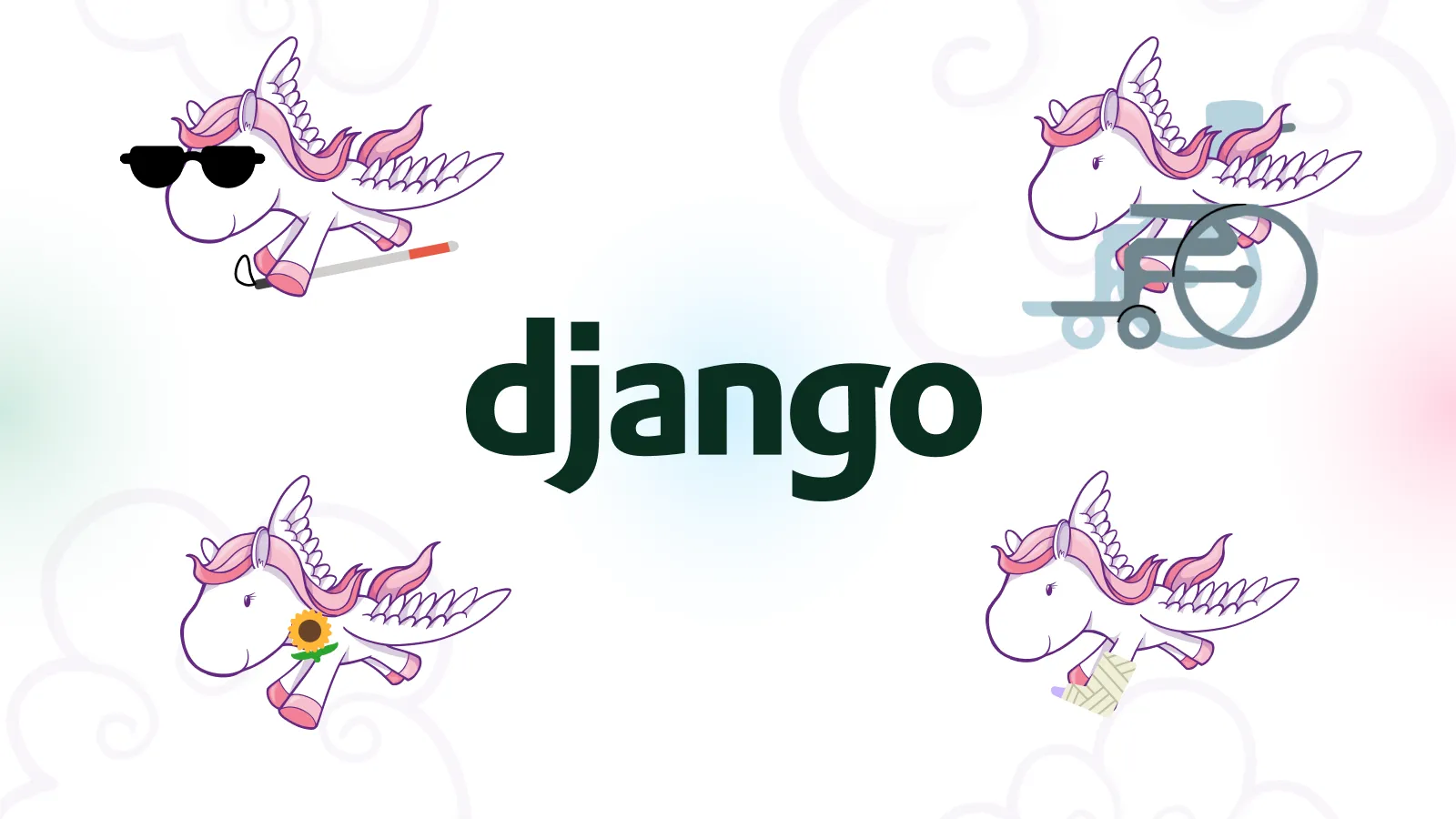
From The Django weblog at 2025-08-06 08:53:57
Django bugfix release issued: 5.2.5
Today we've issued the 5.2.5 bugfix release.
The release package and checksums are available from our downloads page, as well as from the Python Package Index.
The PGP key ID used for this release is : 3955B19851EA96EF
From The Django weblog at 2025-08-03 14:20:56
DSF member of the month - Jake Howard
For July 2025, we welcome Jake Howard as our DSF member of the month! ⭐
Jake actively shares his knowledge through blog posts and community talks. He is part of the Security Team Working Group and he created the DEP 14. He has been a DSF member since June 2024.
You can learn more about Jake by visiting Jake's website and his GitHub Profile.
Let’s spend some time getting to know Jake better!
Can you tell us a little about yourself (hobbies, education, etc)
I’m Jake. I’m a Senior Systems Engineer at Torchbox, where I’ve been for a little over 4 years. “Systems Engineer” is a fairly loaded title, and means different things to different people. I like to describe it as doing everything technical to do with Software Engineering which isn’t Programming (Sysadmin, Devops, IT support, Security, Networking), but also doing a fair bit of Programming.
Most of my hobbies revolve around technology. I’m an avid self-hoster, running applications on servers both in “the cloud” and in my house. There’s been a server of some kind in my house for the last 10 years. I’m generally quite a private person, so I like to know what’s happening to my data. Since I started working remotely at the start of the 2020 pandemic, I’ve channeled some of this passion into posts on my website, with posts about all manner of things I’ve done from self-hosting to general software engineering.
Away from my desk (sort of), I’m a volunteer for Student Robotics, inspiring college students into STEM through competitive robotics (no, not quite like Robot Wars). In school, I was always the quiet one, but now I seem completely at home with public speaking, commentary and otherwise being in front of large crowds of people. I wish I knew the secret - I’d make millions!
My GitHub is also pretty active, with contributions all over the place (OpenZFS, Nebula VPN, Gitea, Plausible Analytics, OpenCV, Ansible…).
I’m curious, where your nickname “RealOrangeOne” comes from?
Because a lot of life happens online (especially in the last 5 years), many people haven’t even seen pictures of me, let alone met me in person. I am not in fact a talking piece of fruit. For a while, I tried to stay anonymous, avoiding photos or videos of me on the internet. But since I discovered I enjoy public speaking, I’ve sort of given up on that (for the most part).
By now, I’m sure many people have speak. But, for those who don’t know: I, like my father before me, am ginger 🔥 (the hair colour, not the plant).
The exact specifics of how being ginger lead to “TheOrangeOne” are sadly lost to time. I’ve owned theorangeone.net for well over a decade at this point. Unfortunately, it’s not a particularly original nickname, and I have to be fast to claim it when signing up to new services. In some places (where I wasn’t fast enough) I’m forced to sub out “The” for “Real”, which has lead to some confusions, but not too many. Canonically, I prefer “TheOrangeOne”, but as we all know, naming things is hard.
How did you start using Django?
I’ve been using Django since around the 1.8 release. My job at the time was at a Django development agency, so it was the first real Python framework I’d used. The first few weeks there was my first exposure to Django, pip, package management and collaborative software engineering - it was quite a lot to learn at once. I didn’t realise it at the time, but I was working working as a junior alongside a couple fairly well-known names in the Django community like Tom Christie (DRF, Starlette, HTTPX) and Jamie Matthews (django-readers, django-zen-queries). We mostly built single-page apps with React, so I learned Django and Django Rest Framework at the same time, which means I now often have to look back at the docs to remember how forms and templates work.
As for contributing to Django, that came much later. My first commit to Django was in May 2024. Having used Django for a while, and written plenty of packages, I’d never stopped to look at how upstream was developed. Around the time of DEP 14 kicking off, I needed to look a bit more at the inner workings of the Django project, to learn what was in store for me. When scrolling through Trac tickets, I found an interesting looking ticket, and got to work. At the time of writing, I’ve now closed 9 Trac tickets across 12 PRs, and some pretty cool features (simple block tags, better Accept header parsing, performance improvements to the URL router) now have my name on them (metaphorically speaking).
I wouldn’t call myself an “active” contributor, but I try and keep an eye on the tickets and forum threads which interest me the most, and chime in when I can.
What other framework do you know and if there is anything you would like to have in Django if you had magical powers?
Since it’s the first framework I learned, and so far has done everything I need, I’ve mostly used Django. For a few smaller services, I’ve leaned more towards Starlette and AIOHTTP, but for anything even slightly large I’ve just used Django - since I’d end up recreating much of Django using the smaller frameworks anyway. A better (likely official) path for single-file Django (ie without some of the magic module handling) might help draw a few more people in and fill a few more of these “micro-service” style use-cases.
I’m a class-based views person - I like the encapsulation and easy extension of base views. As with any opinion on the internet, I’m sure many people disagree with me, but to me it’s just personal preference. I’m still surprised it’s a pattern not seen by many other Python frameworks.
Following in the footsteps of Python, I often wonder if Django could also do with some dead battery removal (or at least extracting into separate packages). Django is a pretty big framework, and whilst the contrib apps are intended to be separate, they also require hooks and assumptions in other areas of the codebase. I might be wrong (it happens quite a lot), but I suspect some of those packages would be better suited externally, perhaps improving some developer momentum - and lightening the load for the Fellows. Django’s sitemap and syndication (RSS) frameworks are 2 places I wish would get some more love.
Outside of Python, I’m a big fan of Rust (as cliche as it may be). Whilst Rust is a popular language, there isn’t really a “Django” like (batteries included) framework - it’s all composing the pieces you need yourself. However, that doesn’t stop people being very productive with it. As a result, most of the frameworks have very generic interfaces, letting developers pass state around as needed, rather than trying to do everything themselves. Outside of the obvious static typing debate (which I’m in favour of), I’d love to see Django embrace some dependencies, especially if they bring some performance improvements. It may end up being a bad idea, but it might also help those who want to use Django’s modules outside of Django.
Many years ago, I tried to be a polyglot - switching between different programming languages (and frameworks) to find new ways of working and match the problem to the correct solution. Now, I’ve settled mostly on Python and Rust. They fit my needs well, I’m very productive in them, and between the 2 there’s not much they can’t handle. Given my background, and the fact most sysadmin-y tools are written in it, I’m really not a fan of Go.
What projects are you working on now?
Over time, I’ve slowly stepped back from having big side projects - being a new dad sure takes up time and energy. Large projects ended up feeling too much like work outside of work, and I end up either getting distracted or bored. After work, I want to do something fun, not that seems like yet another job. I’m the kind of person who gets the sudden urge to research something interesting for an evening, dive in, then not think about it again for several weeks. It’s not the most productive way of doing things, which is why my posts are all over the place, but it doesn’t feel much like work for me - I lean heavily on what interests me at any time to drive what I want to do.
With that said, I’m currently in the process of rebuilding my website. Of course, both the current and new versions are built on Django, but the new build should be easier to maintain, faster, and hopefully won’t need rewriting again in just a couple years. Most of my other projects have been small tools to make my home server that bit nicer.
Professionally, I’m not really a developer anymore. As a sysadmin (ish), much of my day-to-day doesn’t involve much programming. I spend much more of my time deploying, monitoring and administering Django applications than I do writing them. My main project at the moment is helping port a large Java / JS deployment over to Django and Wagtail, running on Kubernetes with some very high and interesting stability and scaling requirements. Since most of my professional live has been at software agencies, I’ve tended to bounce between different projects, rather than sitting on a single one. So I’m also supporting on a few other smaller projects as and when I’m needed.
Which Django libraries are your favorite (core or 3rd party)?
django-tasks, of course!
…
Oh right, a serious answer…
I have to say, one of the most underrated modules in Django is django.utils. It’s not as glamourous as the ORM, forms or cache, but it’s a treasure trove of useful methods. I personally always like looking at the internal helper functions large frameworks use - see the problems they’ve had to solve time and time again. Whilst there’s not the same stability guarantees, I’ve definitely been helped out on a few occasions by some undocumented functions.
In that theme, I’m a fan of libraries which do one thing and do it well. I quite like small libraries which aim to solve a problem. There’s definitely a line before that becomes a problem (anyone remember left-pad?), but libraries which scope creep are often harder to work with than the more narrow-scoped ones, whilst the smaller ones just keep on working and making my life easier. For example, django-environ makes reading and parsing environment variables into settings really easy and clean, and django-decorator-include helps including other urlpatterns whilst wrapping them in a decorator - particularly helpful for 3rd-party package’s URLs.
Finally, I’ve got a real soft-spot for whitenoise (and ServeStatic for ASGI users). Django’s documentation deters people pretty hard from serving media and static files using Django - and rightly so in performance-critical environments. However, for most people, having to additionally maintain (and secure) nginx is more maintenance than necessary. whitenoise serves static files using Django directly, without any extra configuration, whilst also pre-compressing files for a nice performance boost. To me, it’s such a universally-useful library, I’d love to see it it included in Django itself someday.
I’ll throw a bonus shout out for granian, a new (ish) WSGI / ASGI server written in Rust. gunicorn has a near monopoly on running Python apps in production, especially in the WSGI space, so it’s nice to see a newcomer. granian isn’t always faster, but doing the HTTP handling in Rust (and using popular libraries to do it) can improve stability and throughput, without holding the GIL. I’ve not run anything in production with it yet, but I’ve been using it on personal projects for almost a year without issue.
What are the top three things in Django that you like?
Contrary to what I’ve already said, I actually like Django’s batteries. Sure, there’s quite a few “dead” ones in need of some cleaning up and TLC, but having most of what I need already installed makes me far more productive. I don’t need to think about how to render my form on the page, save the results as a model, or properly handle errors - everything “just works”, and works together. Sure, batteries have their downsides - it makes swapping them out rather difficult, but I’d rather ship my feature sooner than compare the trade-offs of different ORMs. The auto-reloading in django-tasks is only around 8 lines of code thanks to django.utils.autoreload being so easy to hook in to.
Secondly: Forms, but not for the reasons you might think. Most forms are created to take submissions from the user, validate them, then probably save them to a model. However, they’re great as general data validation. I’ve written plenty of views with complex querystring requirements, and leaning on forms to validate them saves a lot of boilerplate code. Sure, pydantic might be a bit faster and have more features, but given I’m already productive with django.forms, and it’s already installed and well understood by other developers in my team, I don’t feel the need to reach for something else.
Finally, I wouldn’t say it’s quite a “favourite”, and it’s well-known as being far-from-perfect, but I’ve got a real soft-spot for the Django Admin. It lets me focus on building the core of an application, rather than the internal interface - particularly when there are no strong requirements for it, or it’s only going to be used by me and a few others. Since it’s a fair raw view of the database by default, I’ve definitely been bitten by some less-than-restrictive permissions, but there’s generally all the hooks I need. I don’t like building frontends, so only needing to build 1 rather than 2 makes me a lot happier, especially if it comes with authentication, permissions, read-only views and a dark mode 😎!
How did you join the security team?
I’d love to say it’s an interesting story, stroking my ego that I saved the day. But the reality is, as usual, far less glamorous.
As an engineer, I’ve tended towards 2 specialties: Security and Performance, which usually go hand-in-hand. In early 2023, I was invited to join the Wagtail CMS Security team after reporting and subsequently helping fix a memory exhaustion issue. I was already involved in all things security at Torchbox, especially our ISO-27001 certification, so I was already known when I submitted a vulnerability report.
Thibaud mentioned to me late last year that the project potentially looking for new members of the security team, to help with resourcing and some potential process improvements within the foundation. I naturally jumped at the opportunity - since the team is generally closed to new members and “fully-staffed”. After a few gentle reminders (he’s a busy guy), I received a message from Sarah formally inviting me in March.
Since then, I’ve tried to review every report which came through, and helped author a few patches. A few reports even had to be raised upstream with Python’s Security Response Team (PSRT). It’s been an interesting experience, and I’m looking forward to seeing how the team developers over the coming years.
I’m aware that you have created DEP 14 on the Background Workers, how the work is going so far? Do you need support from the community on anything?
DEP 14 (the proposal to add a native background workers API to Django) has been a really interesting journey. I’m beyond humbled to see the community interest behind it. When I started down this road, I’d only intended to start the conversations and help rally the community interest. Since then, and 6000 lines of code later, I’m mostly single-handedly writing a database-backed production-grade task system.
Right now, we’re at a bit of a cross-roads. Many of the foundational parts work, relatively well. The difficulty comes with the more complex features: Retries, dependencies, robust execution. Building a task system is easy - building a reliable one people want to actually use is incredibly difficult. If anyone out there is interested in getting involved, please do! Report issues, fix bugs, contribute to design discussions. Most of the APIs are based on what I think looks sensible. Software this large, pivotal and complex can’t be built in isolation - so it needs a diverse audience to ensure we (I) make the right decisions, and design an API people actually want to use that will last and scale for years to come.
The next challenge on my list to tackle is timeouts - a highly requested feature. It sounds simple, but the reality is far from it. Many of those challenges sparked the topic of my upcoming PyCon UK talk later this year.
Django is celebrating its 20th anniversary this month. Any nice story to share?
My personal highlight was DjangoCon Europe 2024 - my first DjangoCon. I ended up bringing the stereotypically grey British weather with me, but I had a great week chatting Django with some interesting people, and putting faces to the names and handles I’d seen online. After the talk announcing DEP 14 and background tasks, I was inundated with people voicing their support - many wondering how it’d taken this long.
But personally, I’m more interested in what’s to come. Of course, there’s django-tasks, but the next sets of releases are shaping up to be pretty interesting. Over the last 3-4 years or so, I’ve personally noticed a bit of a resurgence in people’s appetites for change in Django. The 6.x Steering Council have a lot of interesting ideas, and clearly the community agree. People are happy with what Django can do now, but want to bring it a little more up-to-date - and are happy to put in the work to do it. Only a few weeks ago, django-csp was included in core, making it easier to make more secure applications. I’m sure that’s just the start. The fact people are still keen on working on a framework which just celebrated 20 years shows it must be doing something right!
Is there anything else you’d like to say?
I’d like to thank whoever nominated me to be a DSF member in the first place. To this date, I have no idea who you are.
Beyond that, I’m just looking forward to seeing what comes of Django, and Python in general over the next few years.
Thank you for doing the interview, Jake !
From The Django weblog at 2025-07-31 15:34:04
Djangonaut Space is looking for contributors to be mentors
Hello Django 🌌 Universe!
🛰️ This is Djangonaut Space phoning home about Session 5! We're recruiting technical mentors (Navigators) to join our next 🌟stellar🌟 mission.
👩🚀 We are looking for people who regularly contribute to Django or a Django related package, that want to mentor others. Our next session will be Oct-Nov.
🚀 Come join us and be a cosmic contributor! Express your interest to be a mentor here.
📚 Want to learn more about what it means to be a Navigator:
🤝 Interested people will have to complete a 30 minute meet & greet type interview with organizers.
✋ If you're interested in applying to be a Djangonaut, applications will open and close in September (dates to be determined). The latest information will be posted on our site, djangonaut.space. Please follow our social media accounts or subscribe to our newsletter for announcements.
☄️ We'll see you around the cosmos!
Djangonaut Space session organizers
From The Django weblog at 2025-07-25 07:54:01
DjangoCon Africa 2025 Heads to Arusha 🇹🇿
We’re excited to share that DjangoCon Africa is returning this year — and this time we’re heading to Arusha, Tanzania from August 11–15, 2025! 🎉
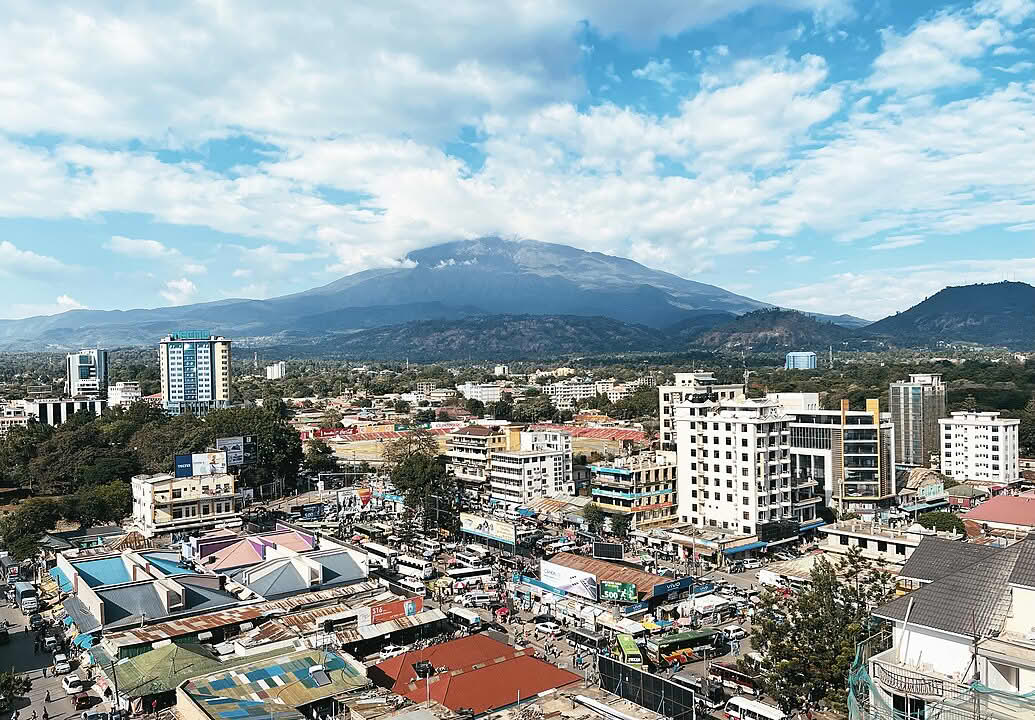
Arusha city view with Mount Meru in the background, credits Halidtz - CC BY-SA 4.0
This second edition builds on the incredible success of the inaugural DjangoCon Africa held in Zanzibar in 2023. That event welcomed over 200 attendees from 22+ countries, with more than half of the participants being women — a powerful statement about the growing diversity and strength of the African tech ecosystem.
What to expect at DjangoCon Africa 2025
Five action-packed days of:
- 💬 Talks Three full days of diverse talks spanning programming, technology, society, career development, business, education, and more — all with voices from across Africa and around the globe.
- 🖥️ Workshops Hands-on training led by Django and Python experts — perfect for deepening your skills and learning new ones.
- 🤝 Sprints Join code sprints and contribute to open source projects, including Django itself.
- 👩💻 Django Girls workshop A special pre-conference workshop for women interested in web development — part of a global initiative that has introduced thousands of women to Django.
- 🔍 Discovery & connections Meet developers, designers, educators, and innovators from across the continent. Share stories. Build partnerships. Celebrate African tech talent.
Co-hosting with UbuCon Africa 2025
This year’s DjangoCon Africa comes with a special twist: we’re proud to co-host the first-ever UbuCon Africa — a regional gathering of Ubuntu users and contributors.
From August 13–15, UbuCon Africa will bring together Linux and open source enthusiasts to celebrate people-powered tech, collaboration, and the Ubuntu spirit of “I am because we are.” Whether you're a die-hard Debian dev or just curious about Ubuntu — you’ll feel right at home.
🎟 Secure your spot & get involved
Whether you’re looking to attend, speak, sponsor, or volunteer, DjangoCon Africa has a place for you.
This is more than just a conference. It’s a celebration of community, learning, and open source built by and for people across Africa and beyond.
Join us in Arusha this August. Let’s shape the future of Django together.
From The Django weblog at 2025-07-13 11:02:18
On July 13th 2005, Jacob Kaplan-Moss made the first commit to the public repository that would become Django. Twenty years and 400+ releases later, here we are – Happy 20th birthday Django! 🎉
Join the celebrations
We want to share this special occasion with you all! Our new 20-years of Django website showcases all online and local events happening around the world, through all of 2025. As well as other opportunities to celebrate!
- Expect birthday cake 🎂 and singing Happy Birthday
- A special quiz or two? see who knows all about Django trivia
- Showcase of great community achievements
View our 20th birthday website
Support Django
As a birthday gift of sorts, consider whether you or your employer can support the project via donations to our non-profit Django Software Foundation. For this special event, we want to set a special goal!
Over the next 20 days, we want to see 200 new donors, supporting Django with $20 or more, with at least 20 monthly donors. Help us making this happen:
- Donate on the Django website
- Donate on GitHub sponsors
- Or check out how to become a Corporate Member
Once you’ve done it, post with #DjangoBirthday and tag us on Mastodon / on Bluesky / on X / on LinkedIn so we can say thank you!
Of our US $300,000.00 goal for 2025, as of July 13th, 2025, we are at:
- 25.6% funded
- $76,707 donated
The next 20 years
20 years is a long time in open source – and we want to keep Django thriving for many more, so it keeps on being the web framework for perfectionists with deadlines as the industry evolves. We don’t know how the web will change it that time, but from Django, you can expect:
- Many new releases, each with years of support
- Thousands more packages in our thriving ecosystem
- An inclusive and supportive community with hundreds of thousands of developers
Happy 20th birthday, Django!
From The Django weblog at 2025-07-02 12:00:00
Django bugfix release issued: 5.2.4
Today we've issued the 5.2.4 bugfix release.
The release package and checksums are available from our downloads page, as well as from the Python Package Index.
The PGP key ID used for this release is Natalia Bidart: 2EE82A8D9470983E
From The Django weblog at 2025-06-30 11:00:00
Django has always been more than just a web framework; it’s a testament to what a dedicated community can build together. Behind every Django release, bug fix, or DjangoCon is a diverse network of people working steadily to strengthen our open-source ecosystem. To celebrate our collective effort, the Django Software Foundation (DSF) is excited to share our 2024 Annual Impact Report 🎉
In this report, you’ll discover key milestones, narratives of community folks, the impact of the events running throughout the year, and much more, ramping up to how we’re laying the groundwork for an even more resilient and inclusive Django community.
Why we publish this report
Transparency is essential for our community-driven organization. Everyone deserves to know how our work and investments translate into real impact. It’s more than just statistics. It’s our way to:
- Show how your contributions make a difference, with vibrant highlights from the past year.
- Reflect on community progress, recognizing the people and ideas that keep Django thriving.
- Invite more individuals and organizations to get involved.
Looking ahead: call to action
As we make progress through 2025, the Django Software Foundation remains dedicated to strengthening the ecosystem that supports developers, contributors, and users around the world. With a growing network of working groups, community initiatives, and the commitment of volunteers, we’re focused on nurturing the people and executing ideas that make Django what it is: the web framework for perfectionists with deadlines.
Help keep this momentum strong by supporting Django through any of the following ways:
- Donate to Django to support future development
- Convince your company to become a Corporate Member
- Join the Foundation as an Individual Member
- Get involved with the working groups
- Join our community on the Django Forum or Discord server.
- Follow and re-share our posts on Mastodon, on Bluesky, or on X.
- Follow our page on LinkedIn.
Thank you, everyone, for your dedication and efforts. Here’s to another year of collaboration, contribution, and shared success!
From The Django weblog at 2025-06-27 07:51:21
Watch the DjangoCon Europe 2025 talks
They’re now all available to watch on YouTube, with a dedicated playlist ⭐️ DjangoCon Europe 2025 Dublin. For more quality Django talks in 2025, check out our next upcoming events!
All the DjangoCon Europe talks


































From The Django weblog at 2025-06-17 18:09:45
DSF member of the month - Elena Williams
For June 2025, we welcome Elena Williams as our DSF member of the month! ⭐
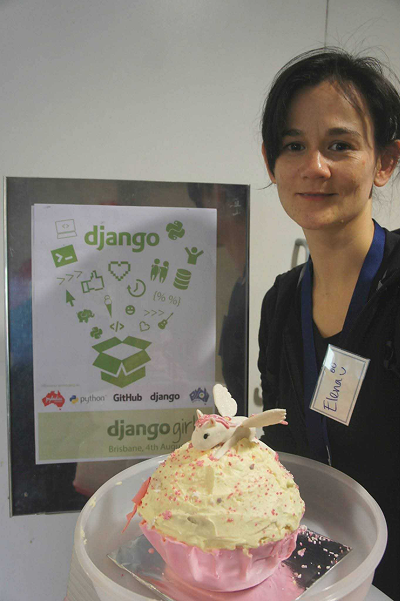
Elena is a dedicated member of the Django community. She is part of the Code of Conduct Working Group and she is a Django Girls organizer in Australia. She has been a DSF member since July 2014.
You can learn more about Elena by visiting Elena's website and her GitHub Profile.
Let’s spend some time getting to know Elena better!
Can you tell us a little about yourself (hobbies, education, etc)
My background is that I was always interested in computers, though my parents were more creative types, my Dad was an Architect (of built structures). When I was a kid we had computers for CAD around the house before it was common. I was always into STEM subjects, but unfortunately in that era for girls to do engineering it was a bit too hostile for me, so I trained in finance instead and worked in that industry (finance and banking, MNE orgs) for nearly a decade. I kept coming back to coding and was always building computers, and was obsessed with the internet as a technology from pretty early on. Just after I discovered Django I did a Masters in Computing at ANU. To this day my main hobbies are programming/webdev (very much a person who codes for fun) and the open source community. My persistent other hobbies are hackspace activities, I like CNC and laser stuff, but will pick up any and all tools/mediums and give them a go, lately been spending time with blender and cabinetry. When I can, I like to get away to snowboard or kitesurf, and this wild Australian long distance endurance navigation sport called rogaining. Really at the moment I’m mostly focussed on being a parent (which is an awesome experience), my friends (mostly python related), my job and working on the community here in Australia. With my family we go camping/hiking more than most. I’ve also continued to be a sessional academic at ANU teaching software engineering for many years.
How did you start using Django?
Golly, I’ve been using Django forever. I’d started doing web stuff in the early ‘00s and worked in a range of languages and paradigms. I was working in a physics research institute at a high profile university in Australia doing web stuff and made friends with a bunch of the doctoral students. In around 2007, one of these students, and my good mate, Dave, randomly recommended this new framework Django and Python (and emacs also actually but that’s a different story). Basically I got into it immediately and never looked back and went on to build a career around Django (actually Dave later gave up physics and did the same thing too). I’ve been engaged with the Python and Django communities to varying degrees since about 2011 as well. To be honest when I discovered the language and the framework I really didn’t expect to still be passionate about them all these years later but I really am! Hopefully I can continue to be well into the future also.
What other framework do you know and if there is anything you would like to have in Django if you had magical powers?
Over the years (being a curious person) I’ve worked with many many web frameworks and technologies, the vast majority of the big ones. In recent years I’ve been spending time with FastAPI and SQLAlchemy as well as non-python technologies. Django is better though.
Not using Django as much at the moment makes me love it even more and realise how lucky we are with such a well designed and well supported framework. It’s not perfect but it’s outstanding.
Having said that: at a technical level I’d love to have “cheaper” ways (in every sense) to deploy. Even though deployment methods have changed beyond recognition several times over the years, I always thought this would get easier over time and am kind of surprised that it hasn’t.
Very specific to me is that I need Django to have stronger support for many database schemas in the same project, but honestly this is just a specific problem I have inherited in a project at the moment, but it’ll pass eventually.
What projects are you working on now?
Over the last few years I’ve helped organise a number of events, including PyConAU, though realised I’d been taking on too many projects and trying to pull back actually! Still: Internationally I’m on DSF CoC with a great team. Nationally this year I’ve been serving on the committee of our main Australian open source foundation body, Linux Australia, as well as working in a small team trying to bring together all of the Australian python user groups under a banner we hope to call Python Australia and I’ve had a keen interest in python user groups around the world. In my home town I’ve been organising our local user groups for some time with an awesome team, as well as our fantastic local PyLadies.
For work I’m flat-chat working in a senior role on a Platform team in a small data company that provides “critical digital infrastructure” for Australia. Though my most important project of all at the moment really is my family, and I do really prioritise my friends and being healthy nowadays. I’m an avid hackerspace person and do have a couple of purportedly active projects (I’m obsessed with maps among other things) but these are relatively neglected at the moment as I just don’t have the bandwidth.
Which Django libraries are your favorite (core or 3rd party)?
I just love the ORM. We’re so spoiled in the Django community we don’t realise how mature and feature-rich the ORM is. Maybe I’m biased because I’ve been using it for so long I just “think” in Django ORM and I’ve been working away from it lately. It’s such a (comparative) pleasure to use. You can nit-pick at it but compared to anything else it’s so beautifully thought through.
The admin was the Django “killer app” in 2008 and I’d argue still is in 2025. To be some dozens of seconds away from a custom CMS backend at any time is still magical. Pony magical. It’s still as impressive as ever to show off to people. Also in the same way that Guido says python makes a great calculator: Django makes a great quick tool for really fast data munging, can’t describe how liberating it feels using it for this purpose.
Writing tests in Django is under-rated too.
There are so many amazing 3rd party libraries, too many to mention. For shout-outs I don’t think I have any projects without Debug Toolbar. The 3rd party caching libraries Memcache and Redis are both great. I’m also usually happy when I turn on Celery, and excited to see DEP-0014 on its way. Danny and Audrey’s Django Cookiecutter project is a great reference even if you don’t take the whole enchilada.
What are the top three things in Django that you like?
I’ve been lucky to generally have had a pretty great time with Django. Generally I’ve used it for projects where it was a really good fit and so it wasn’t painful. As such I like weird little quirky things about Django. Haters-can-hate but I actually really like a bunch of this controversial stuff, for example I like settings.py as a pattern for projects that aren’t out of control; I enjoy using and customising the management commands framework; I think Meta class as an approach to that type of awkward problem is neat; I’ve generally had a pretty nice time with the template language; I dig into utils and reuse them probably more often than most; ORM and the Tests obviously (it’s trivial to plugin pytest of course). Everything is a trade-off in software engineering and while I’m very biased: I just like the trade-offs that Django has chosen, they’re some of the best-in-class.
The top 3 things though? This is tough. I just like it. To nail down actual answers though:
- the framework workflow overall;
- that the project has stayed so consistently high quality and battle-hardened for so many years;
- and the community and my friends (shout out sp-wg)
I know you have start Django with one of the first version, what do you think of the evolution of the framework?
This is a great question! Thanks for being interested in this history, the Django history is a nice story of having good values and persisting and this actually being successful over the long run.
For me there’s all the “back in my day” stuff that’s not obvious now, like Python not being taken seriously as a “real” programming language, let alone javascript, but now those tides have very much turned, and web development is considered extremely respectable and high profile, which was unimaginable when I started. Django started in Web1.0 (whatever that meant), and actually grew substantially during Web2.0 and now even in the modern Web3 era is kind of establishing itself into being part of the backbone of the large parts of the internet that aren’t obvious. Thibaud has a list he maintains of websites that he believes use Django, this is great if you haven’t seen it.
One of the most impressive parts of the evolution has been how decisions have been made and implemented. In normal “work” you just have to make things as fast as possible and endlessly add features consequences-be-damned. Open source gets to be fundamentally the opposite. Traditionally one of the defining characteristics of Open Source is that “time is no object”. That is good design and implementation can be allowed the time to breathe and be excessively thought through. There is no rush or deadline. While there’s always conflict and drama I think there has been less so in Django than in most other projects as design decisions have been painstakingly threshed out and perfected in mailing lists, tickets, DEPs and forums over the months and years it takes to make them. The people inside see the drama but we’re in the news almost never compared to most projects in the same space. The point is that hypothetically it’s possible to try to make the best possible design decisions. In practice most projects don’t do this, but I think Django has demonstrated exemplary maturity in trying to pursue this ideal, and is regularly recognised for it.
The original founding team deserve full credit for instilling this culture and each successive group of stewards deserve credit for preserving it.
There have (and always will be) missteps. For example CBVs are such an obviously good idea on paper, but in practice people don’t think so. On the other hand Andrew Godwin’s implementation of migrations back in the day, that was completely re-writing South from scratch, was truly lovely, even though it was a battle to get to the point of having migrations at all. There’s the history around the db module, which pretty much everyone was too scared to touch after Malcolm died until there were some impressive breakthroughs in it during the “under the hood” sessions not long after DjangoGirls people started coming on board.
Django consciously has decided to be extremely considered in its adoption of change and this has been a great thing. Other frameworks have generally been more cavalier, while Django has been steady, careful and reliable. The other full-feature frameworks are kind of in decline, or have hurt themselves by too-much-change-too-fast, while Django has steadily slowly grown and is the trusty go-to tool for a certain kind of job.
Now moving forward I see focus on the very subtle things that make the framework nicer to use and understand, On just making the core capabilities better and more reliable and performant, and only very very carefully adding features.
In an age where so much quality degradation is occurring, it inspires hope that projects like Django can persist as beacons of high quality, held together by a small group and big community of thoughtful, caring individuals. Hopefully this is something we can continue for a long time into the future also!
You are part of the Code of Conduct working group, how is it to work with the working group? Do you have space available for new members? What does it require according to you?
Code of Conduct WGs are slightly niche and exposed to a certain kind of work and responsibility. Not to mention that respecting many sensitives and view-points is necessary. It also means having the guts to tell people “that’s not how it’s done here” when it needs to be said. Personally it’s a kind of work I’ve grown to be passionate about. I truly believe having a great culture is at the core of community (and really anything good) and can be a complex balancing act of competing factors and emotions. It’s certainly not the kind of thing everyone is into, but if you are, the WG is looking for more diversity, if nothing else it’s tending slightly older at the moment.
Having said that: Within all of the open source communities from local to international levels there’s always space for people who are willing to turn up and help!
Join your local community! Find the parts of community that “speak” to you. Maybe it’s starting a meetup, helping your local conference, running a DjangoGirls. Maybe it’s something engineer-related like finally adding something to an open source library that you’re into, adding some beginner docs somewhere, or engaging with Djangonaut Space. Maybe it’s something online like helping out in forum.djangoproject.com, Reddit or Discord.
As organisers we have this cheat code for finding new people to invite to help more, it’s called “looking for chair-stackers”, that is people who engage to help in the little ways, such as helping stack chairs at the end of an event or generally pack down, wipe up, carry boxes or put things away. Or online: people who go out of their way to try to understand and chip in to manage extra rules, or answer the unanswered thing that’s been sitting there for a while. Or people who just ask “can I help out with that?” when the organisers seem tired or stressed out. Having people around who help in these ways has huge value and has been the beginning of many people being involved in communities and making life-long friends and connections.
Now more than ever though, it’s so important to connect to your community. We are stronger, better and healthier when we are connected to and relied on by other people and we have others we can share our experiences with.
Particularly us computer people tend not to be as good with connecting with other people, but everyone should find their way to get out and connect! It’s sometimes hard but it’s always better.
You have organized many DjangoGirls in Australia, how did you start? Do you have any advice for someone who would like to organize a DjangoGirls event?
In 2014 I was living in Perth, Australia, where Russell Keith Magee is based and we had a budding Python/Django User Group. At one of the meetings news emerged about how Ola and Ola were running this thing called “DjangoGirls” at EuroPython in a few weeks. PyConAU was scheduled a couple of weeks after this. I was like, that’s a great idea, I can absolutely have a go at doing that and emailed them immediately asking if I could copy their materials and plan. We pulled it together with an amazing bunch of people and I think this was technically the 2nd DjangoGirls event ever. In the following years I’ve been involved in many more, including the first North American DjangoGirls. From our Perth series of events a successful organisation was spun off called SheCodes.
In the more-than-a-decade since then the world has changed so much! Particularly in the tech world. I would say specifically for DjangoGirls events, they are very region specific. My first advice for organising an event in your region is to see if there’s been one previously and reach out to the event organisers, or at least the nearest organisers – I think these days there are few places on earth that haven’t had a DjangoGirls event nearish-by. The resources on the website are actually great for getting going and the international DjangoGirls team are lovely, but also always looking for more help.
Where I live now, back in the capital, Canberra, we are very well supported for education services. We held a DjangoGirls event a couple of years ago, but for the attendees what emerged was that what we really wanted was just to connect with other technical women.
Now what has been very successful for us is an ongoing PyLadies/Women’s Software group who meet up regularly and talk about things that matter to our experience. We use the “lean-coffee” model and it’s been unexpectedly functional. This has been one of the best groups I’ve ever been in with a range of technical women regularly sharing our weird and statistically unusual experiences together, it feeds the soul, and is strongly recommended if you don’t participate in a group like this already.
Is there anything else you’d like to say?
A final shout out to the original leaders of the Django community, for me personally Russell, Jeff, Jacob, Andrew and Baptiste in particular, but everyone who has persisted over the years in just turning up over the long haul and keeping our part of the world as beautiful as can be. My friends Dave, Matt and Jonah. Thibaud is a great president right now. Rarely is there a dedicated Django person who is not absolutely delightful and I feel both proud and honoured to be part of this community. A big thank you to everyone (especially you Sarah! And all the Sarahs, Natalias, Lillys and Olas) who help to make Django what it is.
Thank you for doing the interview, Elena !
From The Django weblog at 2025-06-10 09:06:32
Django bugfix releases issued: 5.2.3, 5.1.11, and 4.2.23
Following the June 4, 2025 security release, the Django team is issuing releases for Django 5.2.3, Django 5.1.11, and Django 4.2.23 to complete mitigation for CVE-2025-48432: Potential log injection via unescaped request path (full description).
These follow-up releases migrate remaining response logging paths to a safer logging implementation, ensuring that all untrusted input is properly escaped before being written to logs. This update does not introduce a new CVE but strengthens the original fix.
We encourage all users of Django to upgrade as soon as possible.
Affected supported versions
- Django main
- Django 5.2
- Django 5.1
- Django 4.2
Resolution
Patches to resolve the issue have been applied to Django's main, 5.2, 5.1, and 4.2 branches. The patches may be obtained from the following changesets.
CVE-2025-48432: Potential log injection via unescaped request path
- On the main branch
- On the 5.2 branch
- On the 5.1 branch
- On the 4.2 branch
The following releases have been issued
- Django 5.2.3 (download Django 5.2.3 | 5.2.3 checksums)
- Django 5.1.11 (download Django 5.1.11 | 5.1.11 checksums)
- Django 4.2.23 (download Django 4.2.23 | 4.2.23 checksums)
The PGP key ID used for this release is : 3955B19851EA96EF
From The Django weblog at 2025-06-09 18:00:00
DSF calls for applicants for a Django Fellow
The Django Software Foundation is announcing a call for Django Fellow applications. A Django Fellow is a contractor, paid by the Django Software Foundation, who dedicates time to maintain the Django framework.
The Fellowship program was started in 2014 as a way to dedicate high-quality and consistent resources to the maintenance of Django. The Django Software Foundation currently supports two Fellows –Natalia Bidart and Sarah Boyce– and has approved funding for a new full-time Fellow. This position will be initially for a period of one year, but may be extended depending on fundraising levels.
Beyond keeping Django running, a fellow is a representative of Django itself. They embody the welcoming culture of Django and aid the community to progress the framework. Fellows are often called upon to speak at Django conferences and events.
They are also usually leading Django Sprints occurring in conferences or other setups. Hence a Django Fellow often engages in both informal and formal mentorship.
Responsibilities
Fellow duties include (but are not limited to):
- Monitoring security reports and ensuring security issues are acknowledged and responded to promptly
- Fixing release blockers and helping to backport fixes to these and security issues
- Ensure timely releases including being a release manager for a new version of Django
- Triaging tickets on Trac
- Reviewing and merging pull requests
- Answering contributor questions on the Forum
- Helping new Django contributors land patches and learn our philosophy
Requirements
A Django fellow reviews a very large amount of Django contributions. This requires knowledge in every aspect of web development that the Django framework touches. This turns out to be an intimidatingly-large list of technical topics, many of which are listed below. It’s not our expectation that you come into the job knowing everything on this list! We hope you’ll have solid experience in a few of these topics, particularly some of the “core” technologies important to Django (Python, relational databases, HTTP). But we fully expect that you’ll learn most of this on the job. A willingness to learn, and a demonstrated history of doing so, is more important than comprehensive knowledge.
The technical topics you can expect to work on includes (and is not limited to):
- SQL and Databases: SQLite, MySQL, Postgres, Oracle
- Technical Documentation
- Javascript
- CSS
- Semantic HTML
- Accessibility
- UI/UX design (Web and CLI)
- Python async
- Python features (and versions), compatibility matrix, etc.
- Everything around HTTP
- Security best practices
There are also:
- Complex processes which need adhering to
- Multiple discussions which need opinions and direction
- Requirements for both formal and informal mentorship
And required professional skills such as:
- Conflict resolution
- Time management and prioritization expertise
- Ability to focus in short periods of time and do substantial context switches
- Self-awareness to recognize their own limits and reach out for help
- Relationship-building and coordination with Django teams, working groups, and potentially external parties.
- Tenacity, patience, compassion and empathy are essential
Therefore a Django Fellow requires the skills and knowledge of a senior generalist engineer with extensive experience in Python and Django. Open source experience, especially in contributing to Django, is a big plus.
Being a Django contributor isn't a prerequisite for this position — we can help get you up to speed. We'll consider applications from anyone with a proven history of working with either the Django community or another similar open-source community. While no geographical location is required, we have a slight preference for timezones between around -8 and +3 UTC to allow for better working hours to overlap the current fellows.
If you're interested in applying for the position, please email us at fellowship-committee@djangoproject.com describing why you would be a good fit along with details of your relevant experience and community involvement. Lastly, please include at least one recommendation.
The current hourly rate for a fellow is $82.26 USD.
Applicants will be evaluated based on the following criteria:
- Details of Django and/or other open-source contributions
- Details of community support in general
- Understanding of the position
- Clarity, formality, and precision of communications
- Strength of recommendation(s)
Applications will be open until midnight AoE, 1 July, 2025, with the expectation that the successful candidate will start around August 1, 2025.
From The Django weblog at 2025-06-04 12:00:00
Django security releases issued: 5.2.2, 5.1.10, and 4.2.22
In accordance with our security release policy, the Django team is issuing releases for Django 5.2.2, Django 5.1.10, and Django 4.2.22. These releases address the security issues detailed below. We encourage all users of Django to upgrade as soon as possible.
CVE-2025-48432: Potential log injection via unescaped request path
Internal HTTP response logging used request.path directly, allowing control characters (e.g. newlines or ANSI escape sequences) to be written unescaped into logs. This could enable log injection or forgery, letting attackers manipulate log appearance or structure, especially in logs processed by external systems or viewed in terminals.
Although this does not directly impact Django's security model, it poses risks when logs are consumed or interpreted by other tools. To fix this, the internal django.utils.log.log_response() function now escapes all positional formatting arguments using a safe encoding.
Thanks to Seokchan Yoon (https://ch4n3.kr/) for the report.
This issue has severity "moderate" according to the Django security policy.
Affected supported versions
- Django main
- Django 5.2
- Django 5.1
- Django 4.2
Resolution
Patches to resolve the issue have been applied to Django's main, 5.2, 5.1, and 4.2 branches. The patches may be obtained from the following changesets.
CVE-2025-48432: Potential log injection via unescaped request path
- On the main branch
- On the 5.2 branch
- On the 5.1 branch
- On the 4.2 branch
The following releases have been issued
- Django 5.2.2 (download Django 5.2.2 | 5.2.2 checksums)
- Django 5.1.10 (download Django 5.1.10 | 5.1.10 checksums)
- Django 4.2.22 (download Django 4.2.22 | 4.2.22 checksums)
The PGP key ID used for this release is Natalia Bidart: 2EE82A8D9470983E
General notes regarding security reporting
As always, we ask that potential security issues be reported via private email to security@djangoproject.com, and not via Django's Trac instance, nor via the Django Forum. Please see our security policies for further information.
From The Django weblog at 2025-05-22 10:12:02
Why, in 2025, do we still need a 3rd party app to write a REST API with Django?
The question was asked to the president of the DSF this year at FOSDEM, after his talk. And it is clearly a legitimate one!
But… is it True? Do we actually need a 3rd party app to write an API with Django?
In a lot of cases, when you require a complex and full-featured API, I would recommend you do use one. Django REST Framework and Django Ninja being very sound choices with a bunch of nifty things you might need in a bigger project.
But… what if what you need is a simple REST API that does CRUD? Do you really need a 3rd party app to do that?
Let's try not to!
Let's first ask what is a REST API in the context of this article. Let's limit ourselves to building this:
- a URL that answers to
GETrequests with a list of records of a single model type POST-ing to that same URL should create a new record- a second URL with the primary key of a record tagged to the end. When
GET-ing that URL, one should receive only that single record, in a similar format as in the list PUT-ing data to that URL should update the record and return that record with updated valuesDELETE-ing to that same URL should delete the record- everything should be achieved using JSON
Listing records from a model
Chances are you have heard of generic class-based views (CBVs) in Django, the one that comes to mind when it comes to listing records is the built-in django.views.generic.ListView.
ListView extends 2 other classes, BaseListView and MultipleObjectTemplateResponseMixin. Since we want to build an API, we clearly don't need to extend anything template-related. Looking at what BaseListView provides, one can notice the only thing really missing there is a render_to_response method. And this is going to be the case for most of the other base classes.
This sets our starting point!
The type of response we want to render is a json response and Django already provides one. So let's build a JsonViewMixin that looks like this for now:
class JsonViewMixin(View):
response_class = JsonResponse
content_type = 'application/json'
def render_to_response(self, context, **response_kwargs):
response_kwargs.setdefault("content_type", self.content_type)
return self.response_class(context, **response_kwargs)
The next thing we have to tackle is that the context returned by BaseListView's get_context_data returns much more data than what we strictly need for this article. Also the list of records returned is not serialized to json.
Serializers for mutliple formats already exist in Django core (see django.core.serializers) but I will go a different route here. There is another way to serialize data in Django that you are likely familiar with but is not labelled as clearly: forms.
Forms are used in regular views to serialize models to simple types, understandable by HTML forms (mostly text) and vice-versa. This is very close to what we need, since json is also mostly text-based.
To start with, using forms as serializers requires creating a new form instance for each record in the list we want to return.
Let's add that to the mixin!
def serialize_many(self, obj_list):
return [self.serialize_one(obj) for obj in obj_list]
def serialize_one(self, obj)
form = self.get_form_for_object(obj)
serialized = form.initial
serialized['pk'] = obj.pk # forms strip pk's from their data
return serialized
def get_form_for_object(self, obj):
form_class = self.get_form_class()
kwargs = self.get_form_kwargs()
kwargs['instance'] = obj
return form_class(**kwargs)
Why use forms?
ModelForms are a built-in and robust Django tool that are built around the idea of handling the transition between Model fields and simple (and also JSON-serializable) types (mostly text and numbers). Which is exactly what we want from (de-)serializers in a lot of cases.
If you need to (de-)serialize a custom field type, Django documents creating a custom form field and this covered in various places like StackOverflow.
Moving on to our first View
Now that we have a tool to serialize the records list returned by BaseListView let's write the first version of JsonListView. As I alluded to earlier, we need to strip down what is returned from get_context_data.
class JsonListView(JsonViewMixin, BaseListView):
def get_context_data(self, **kwargs):
context = super().get_context_data(**kwargs)
# wrapping this in a dict for security reasons
return {
'results': self.serialize_many(context['object_list'])
}
This won't work yet because get_form_class that I used in the JsonViewMixin is only provided by classes that descend from FormMixin. Since we want this view to handle both listing and creating records, let's go and fix that in the next section!
1 down, 3 to go: Adding records
First thing first, let's rebrand JsonListView and make it inherit from BaseCreateView.
class JsonListCreateView(JsonViewMixin, BaseCreateView, BaseListView):
Form creation and validation will be handled automatically by Django!
Almost…
The first concern will be with populating the form with POST data. While Django does this for you when dealing with URL encoded or multipart form data, it does not (yet) handle json-encoded POST content.
But this can be handled by taking advantage of the modularity of Django's generic class-based-views and overwritting get_form_kwargs.
Let's address this (in a naïve way) within the mixin as it will be applicable to any JSON view:
def get_form_kwargs(self):
kwargs = super().get_form_kwargs()
if (
len(kwargs.get("data", {})) == 0
and self.request.content_type == "application/json"
and len(self.request.body)
):
# The request has a JSON body that we did not decode
kwargs["data"] = json.loads(self.request.body)
return kwargs
An issue that could arise here is that a JSONDecoderError could be triggered. get_form_kwargs does not return a response so I don't think it is the right place to handle the exception.
The post method does return a response, let's wrap the original one with a try/except (still in the mixin):
def post(self, request, *args, **kwargs):
try:
return super().post(request, *args, **kwargs)
except json.decoder.JSONDecodeError as e:
return self.response_class(
{"error": f"json decode error: {e.msg}"},
status=HTTPStatus.UNSUPPORTED_MEDIA_TYPE,
)
Speaking of returning responses, the BaseCreateView class is built around HTML principles and its form_valid and get methods are both designed to render a form (via get_context_data).
In the case of our REST API, the "create" part of things should not be involved with GET requests.
Furthermore the reply to an invalid form submission should only comprise of an error (status + message) and should not require anything provided by get_context_data.
Still, in regards to form validation, a valid form should not result in a redirect (behaviour of BaseCreateView) but rather in a 201 response optionally containing the representation of the created record.
The form handling part is generic enough to put it in the mixin itself.
The behaviour of GET is specific to the list/create view though.
Let's write the code accordingly:
class JsonViewMixin(View):
...
def form_invalid(self, form):
return self.response_class(
{'errors': form.errors},
status=HTTPStatus.UNPROCESSABLE_CONTENT
)
def form_valid(self, form):
self.object = form.save()
context = self.serialize_one(self.object)
return self.response_class(
context,
status=HTTPStatus.CREATED
)
class JsonListCreateView(JsonViewMixin, BaseCreateView, BaseListView):
...
def get_context_data(self, **kwargs):
# Explicitly point to BaseListView instead of `super()`
# to prevent actions taken by
# BaseCreateView's implementation of `get_context_data`
context = BaseListView.get_context_data(self, **kwargs)
return {
'results': self.serialize_many(context['object_list'])
}
Halfway there!
That was everything needed to handle the create and list portions of our CRUD REST application. Now we can move on to the read, update, delete part. We'll do that in a second View class as it requires a slightly different URL, one that contains the pk of the resource.
Both read and update functionalities are provided by Django BaseUpdateView but, as with the create/list view, the major difference in this case will be that we need a much simpler context.
class JsonReadUpdateView(JsonViewMixin, BaseUpdateView):
def get_context_data(self, **kwargs):
return self.serialize_one(self.object)
That's it!!!
Well, almost…
BaseUpdateView is wired to answer to POST requests for updating a record while REST good practices want us to use PUT instead. The fix for this is to raise an error in reply to POST calls while directing PUTs to the parent's post implementation.
def post(self, request, *args, **kwargs):
return self.response_class(status=HTTPStatus.METHOD_NOT_ALLOWED)
def put(self, request, *args, **kwargs):
return super().post(self, request, *args, **kwargs)
One more fix…
Our mixin implementation returns a 201 on form_valid. In case of any view which is not creating a record, this should be 200. Here are the necessary changes:
class JsonViewMixin(View):
form_valid_status = HTTPStatus.OK # new property
def form_valid(self, form):
self.object = form.save()
context = self.serialize_one(self.object)
return self.response_class(
context, status=self.form_valid_status # use the new property
)
...
class JsonListCreateView(JsonViewMixin, BaseCreateView, BaseListView):
form_valid_status = HTTPStatus.CREATED # override in case of creation
Why PUT and not PATCH?
BaseUpdateView builds a form that expects all fields to be filled. Non-present fields would be reset to empty on the existing record for partial updates.
I'll leave it as an exercise to the reader to override that behaviour in case of a PATCH request in order to "pre-fill the form" with existing values, maybe by using the form's initial property… 😉
Finally…
The last bit of logic we have to implement is for deleting objects. Most of the code from Django's BaseDeleteView is related to creating and validating a form for confirming the user's intend on deleting the resource. This is usually not the expected behaviour for a REST API, this part being handled by whatever is calling the API.
Furthermore, it doesn't implement a delete method. In the HTML world of Django's BaseDeleteView, everything is done using GET and POST. So we are (mostly) on our own for this last part.
We can still leverage the get_object implementation provided by BaseUpdateView though.
Here is what implementing the delete operation for our read/update/delete view looks like:
class JsonReadUpdateDeleteView(JsonViewMixin, BaseUpdateView): # name changed
...
def delete(self, request, *args, **kwargs):
self.get_object().delete()
# data is required by JsonResponse
return self.response_class(data={}, status=HTTPStatus.NO_CONTENT)
Conclusion
This implementation is basic and clearly naïve. But it gets the job done!
And this can all be done by leveraging Django-provided tools and mechanisms, mainly using Django's generic CBVs.
Generic class-based views have been built in such a modular fashion that implementing one's own mini REST framework can be done in less than 100 lines of code.
A non-negligible advantage of such an approach is that most libraries written to work with Django's generic CBVs are also likely to work with this implementation.
This rather simple approach can certainly be improved (handling exceptions in delete… anyone?) and is clearly not going to cover everybody's use cases. And it most likely misses handling a bunch of edge cases!
And if you are building a large REST API, I would say you are probably still better off using a 3rd party library but… to me, the answer to the question “Why do you need a 3rd party application to write a simple REST application with Django?” is: "You don’t"
If you enjoyed this article, read more from Emma on Emma has a blog, which is where this piece was from. Or watch the FOSDEM talk that Emma reacts to:
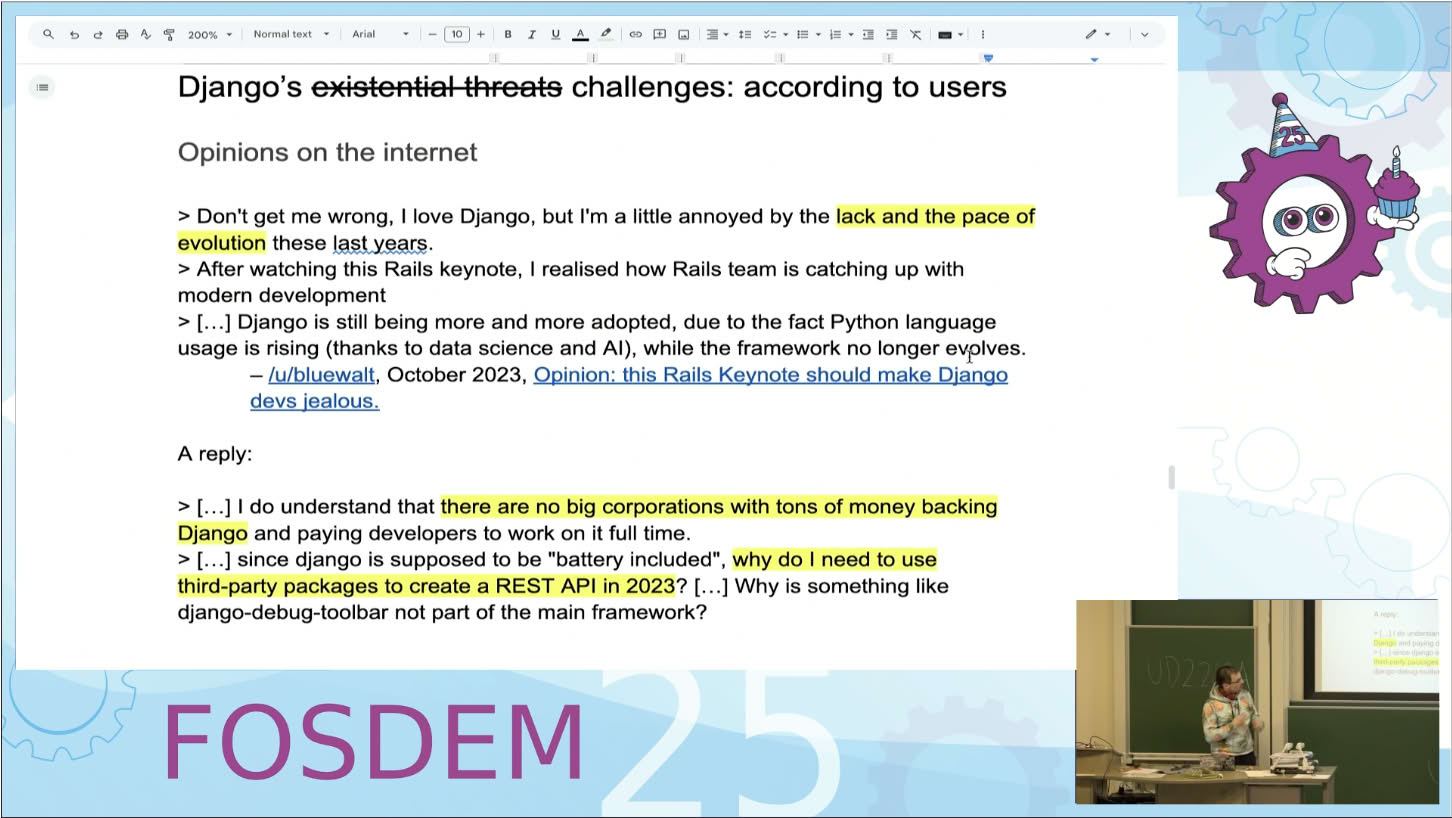
From The Django weblog at 2025-05-16 12:54:21
Our Google Summer of Code 2025 contributors
We’re excited to introduce our Google Summer of Code 2025 contributors!
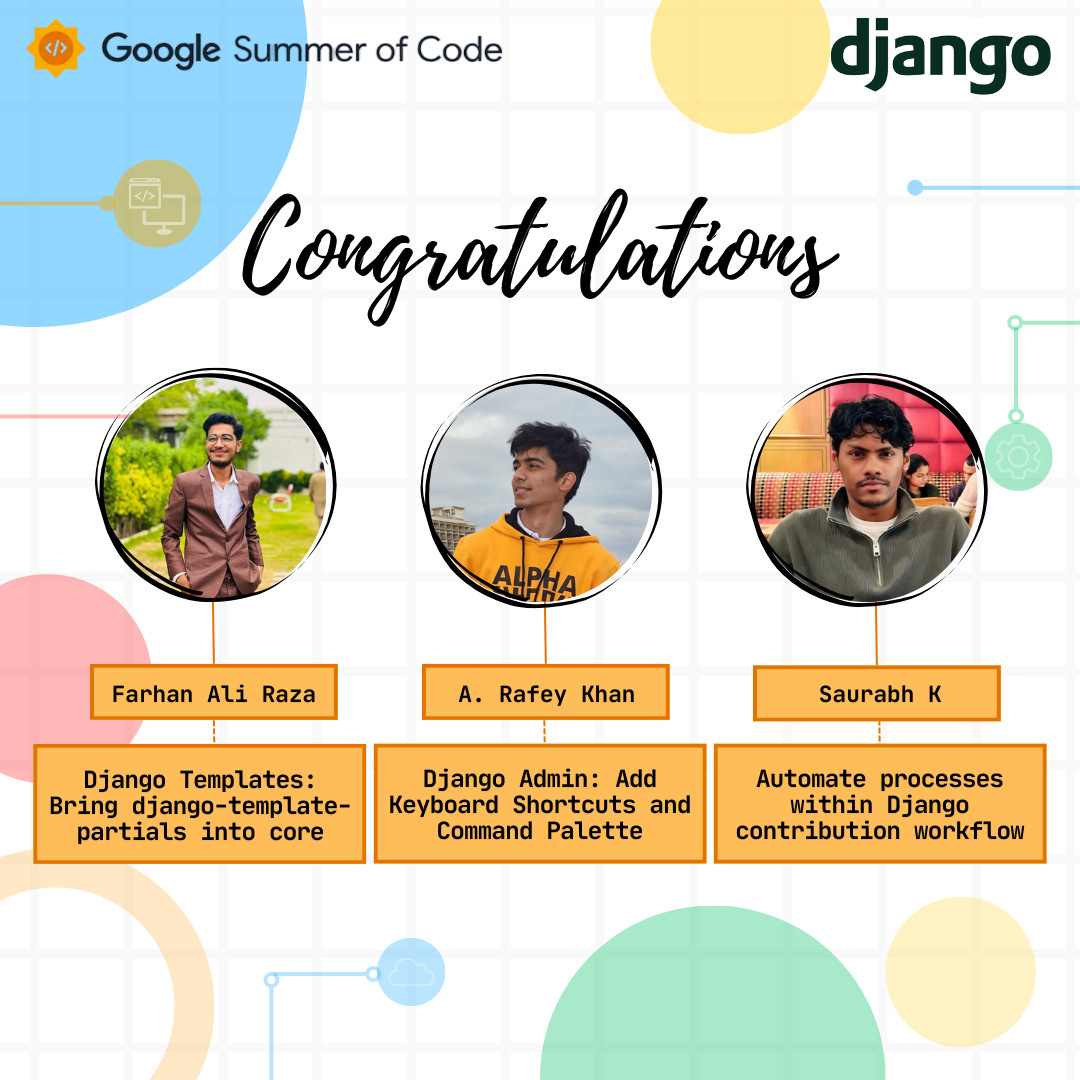
These amazing folks will be working on impactful projects that will shape Django’s future.\ Meet the contributors 👇
A. Rafey Khan
Project: Django Admin – Add Keyboard Shortcuts & Command Palette. Mentors: Tom Carrick, Apoorv Garg
Rafey will work on making Django Admin faster and more accessible through keyboard-driven workflows. Excited to see this land!
Farhan Ali Raza
Project: Bring django-template-partials into core. Mentor: Carlton Gibson
Farhan will be enhancing Django’s template system by adding first-class support for partials—making componentized templates easier than ever.\
Saurabh K
Project: Automate processes within Django’s contribution workflow. Mentor: Lily Foote
Saurabh will work on streamlining how contributors interact with Django repo—automating repetitive tasks and improving dev experience for all. \ A huge shoutout to our mentors (and Org Admin Bhuvnesh Sharma) and the broader Django community for supporting these contributors! 💚\ \ Let’s make this a summer of learning, building, and collaboration.
From The Django weblog at 2025-05-15 15:00:00
Our new accessibility statement
Happy Global Accessibility Awareness Day! We thought this would be a fitting occasion to announce our brand new Django accessibility statement 🎉
Did you know that according to the WebAIM Million survey, 94.6% of sites have easily-detectable accessibility issues? We all need to work together to build a more inclusive web (also check out our diversity statement if you haven’t already!). There are accessibility gaps in Django itself too. This statement improves transparency, and clearly states our intentions. And we hope it encourages our community and the industry at large to more widely consider accessibility.
How to use this statement
Read it, share it with your friends, or in a procurement context!
- Use it to understand where there are gaps in Django that need to be addressed on projects.
- And opportunities to contribute to Django and related projects ❤️
- Factor it into legal compliance. For example with the European Accessibility Act. Starting June 2025, accessibility becomes a legal requirement for large swaths of the private sector in the European Union.
- Share it with venues for Django events to demonstrate the importance of accessibility for their competitiveness.
How you can help
Take a moment to provide any feedback you might have about the statement on the Django Forum. Let us know if you would prefer additional reporting like an ATAG audit, or VPAT, ACR, or any other acronym. Let us know if you’d like to contribute to the accessibility of the Django community! 🫶
From The Django weblog at 2025-05-15 05:55:48
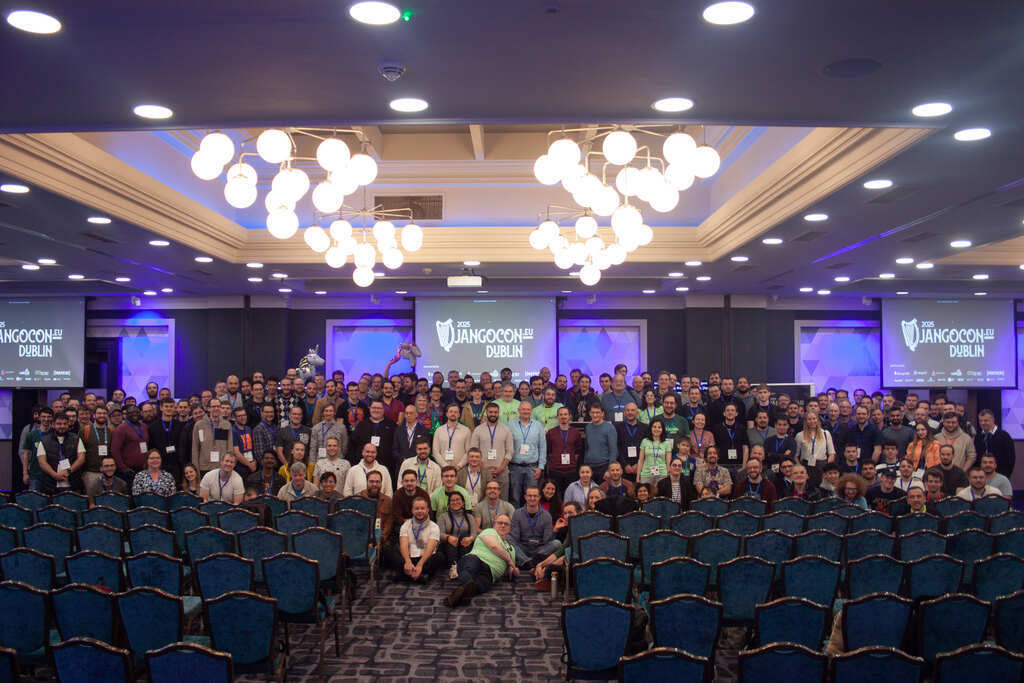
We had a blast at DjangoCon Europe 2025, and hope you did too! Events like this are essential for our community, delighting both first-timers and seasoned Djangonauts with insights, good vibes, and all-around inspiration. This year’s conference brought together brilliant minds from all corners of the globe. And featured early celebrations of Django’s 20th birthday! ⭐️🎂🎉
After launching in 2005, Django turns 20 in 2025, and the conference was a great occasion for our community to celebrate this. And work on the sustainability of the project together.
We need more code reviews
Our Django Fellow Sarah Boyce kicked off the conference with a call for more contributions – of the reviewing kind. In her words,
Django needs your help. Every day, contributors submit pull requests and update existing PRs, but there aren't enough reviewers to keep up. Learn why Django needs more reviewers and how you can help get changes merged into core.
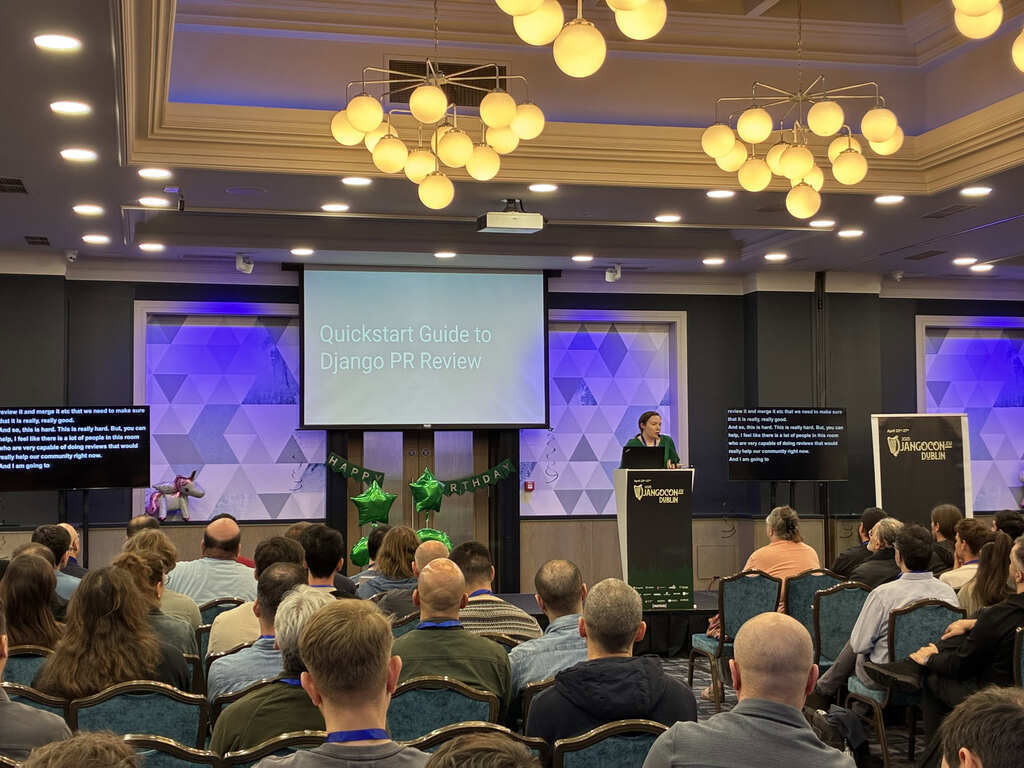
We need more fundraising
Our Vice President Sarah Abderemane got on stage to encourage more financial support of Django from attendees, showcasing how simple it is to donate to the project (get your boss to do it!). We have ambitious plans for 2025, which will require us to grow the Foundation’s budget accordingly.
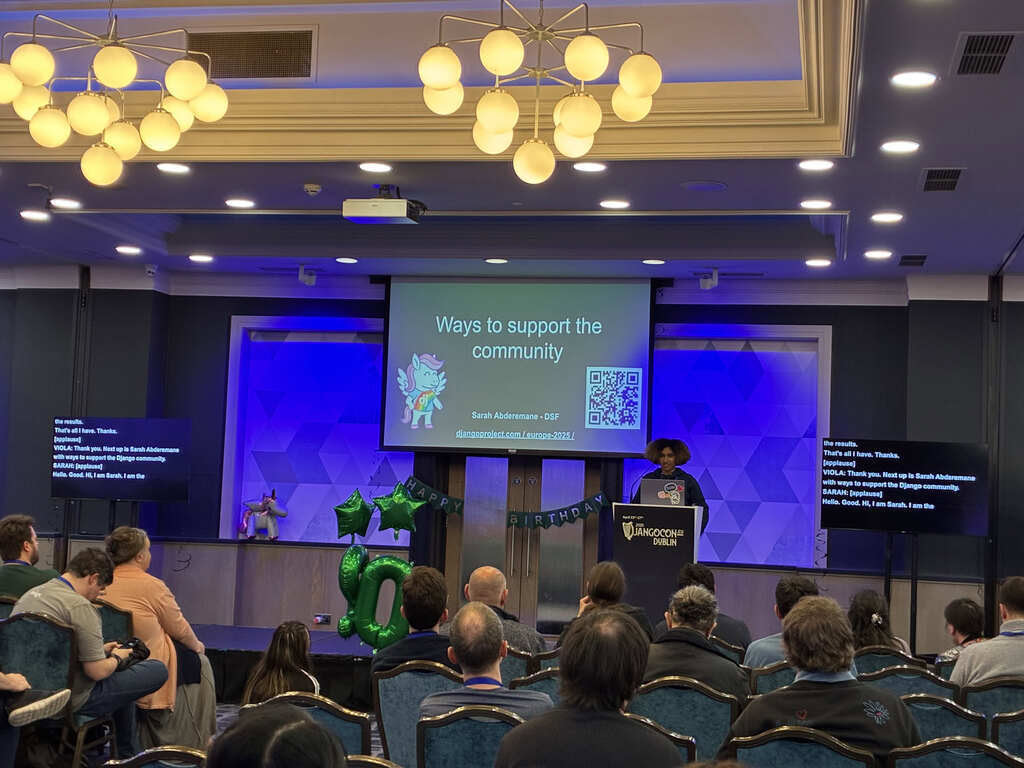
Annual meeting of DSF Members
Our Board members Tom Carrick, Thibaud Colas, Sarah Abderemane, and Paolo Melchiorre were at the conference to organize a meeting of Members of the Django Software Foundation. This was a good occasion to discuss long-standing topics, and issues of the moment, such as:
- Diversity, equity and inclusion. Did you know we recently got awarded the CHAOSS DEI bronze badge? We need to keep the momentum in this area.
- Management of the Membership at the Foundation. With different visions on how much the membership is a recognition or a commitment (or both). There was interest in particular in sharing more calls to action with members.
- Content of the website. A long-standing area for improvement (which we’re working on!)
All in all this was a good opportunity for further transparency, and to find people who might be interested in contributing to those areas of our work in the future.
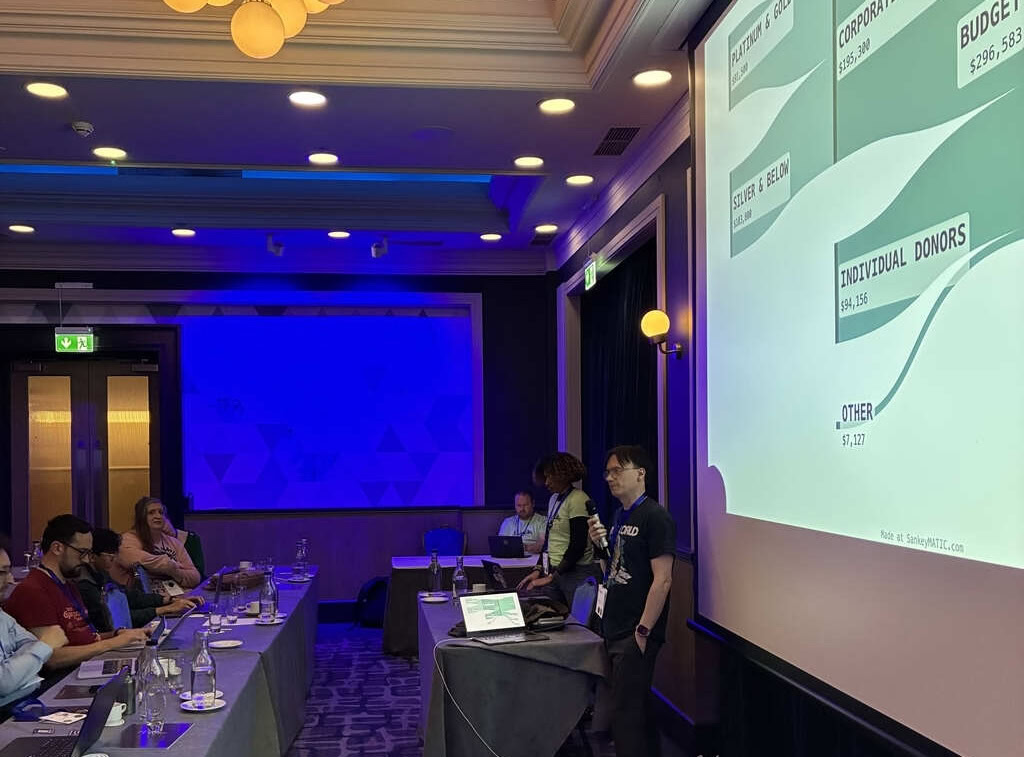
Birthday celebrations
There was a cake (well, three!). Candles to blow out. And all-around great vibes and smiles, with people taking pictures and enjoying specially-made Django stickers!
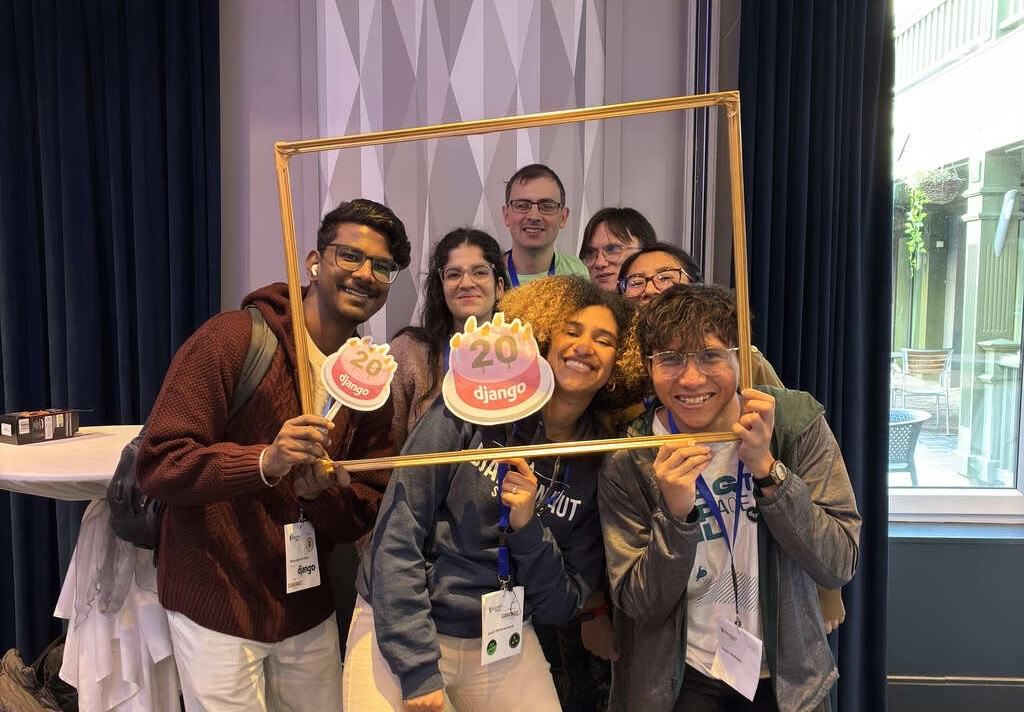
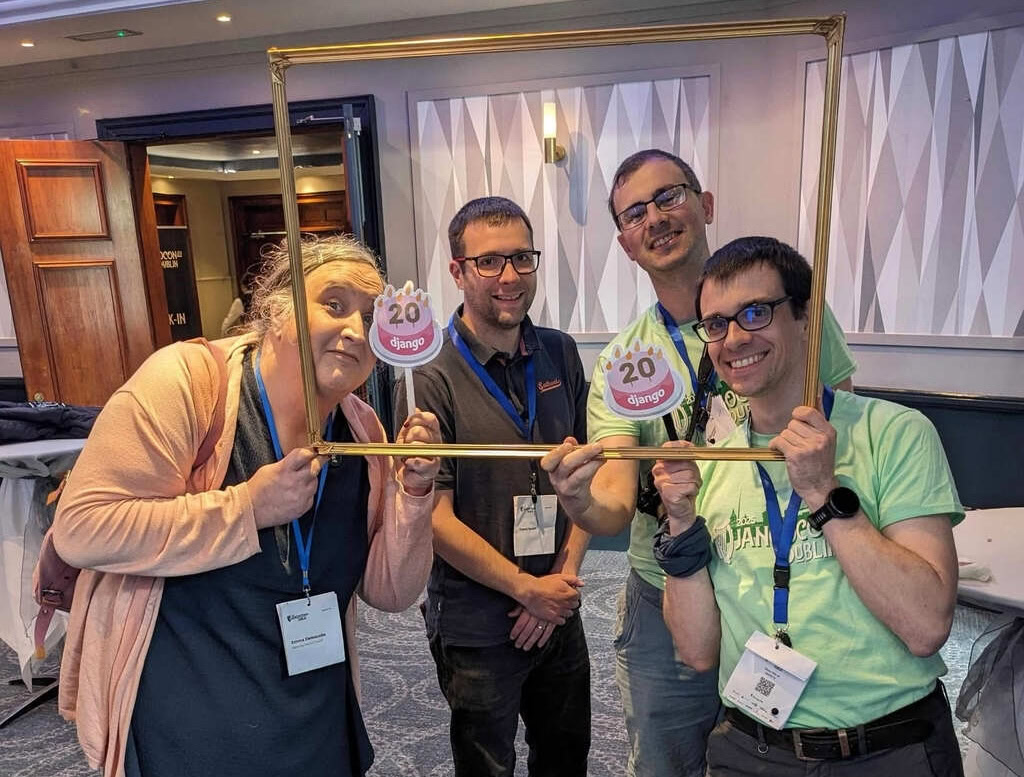
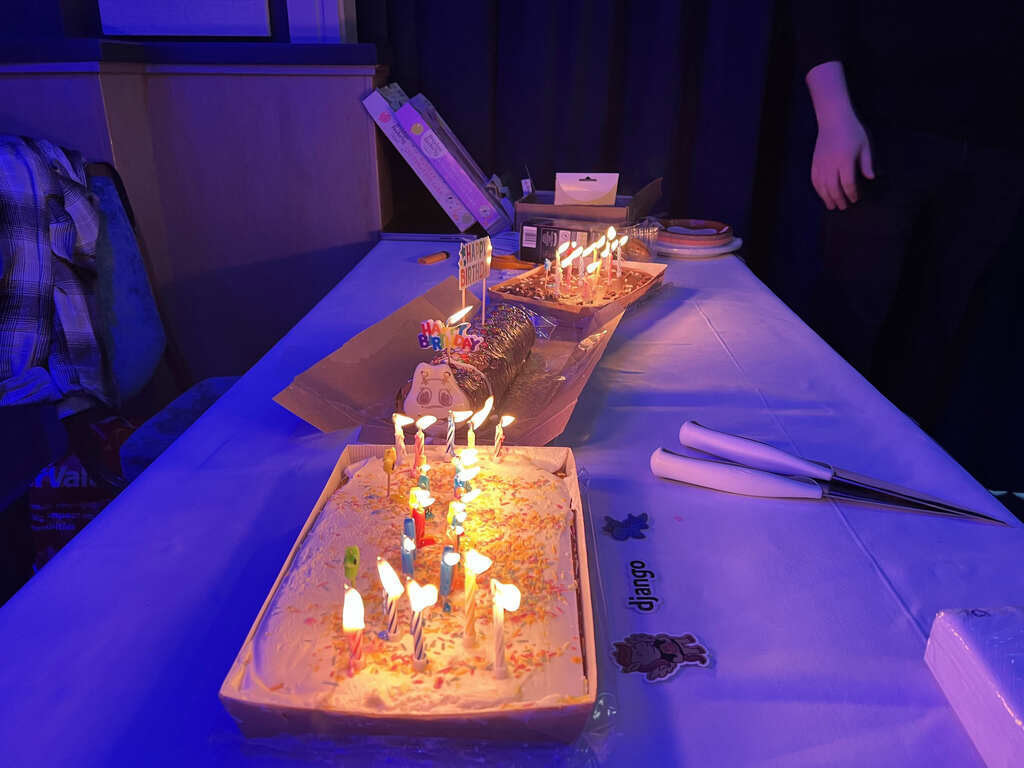
Up next
We have a lot more events coming up this year where the Foundation will be present, and bringing celebrations of Django’s 20th birthday!
PyCon US 2025
It’s on, now! And we’re present, with a booth. Come say hi! There will be Django stickers available:
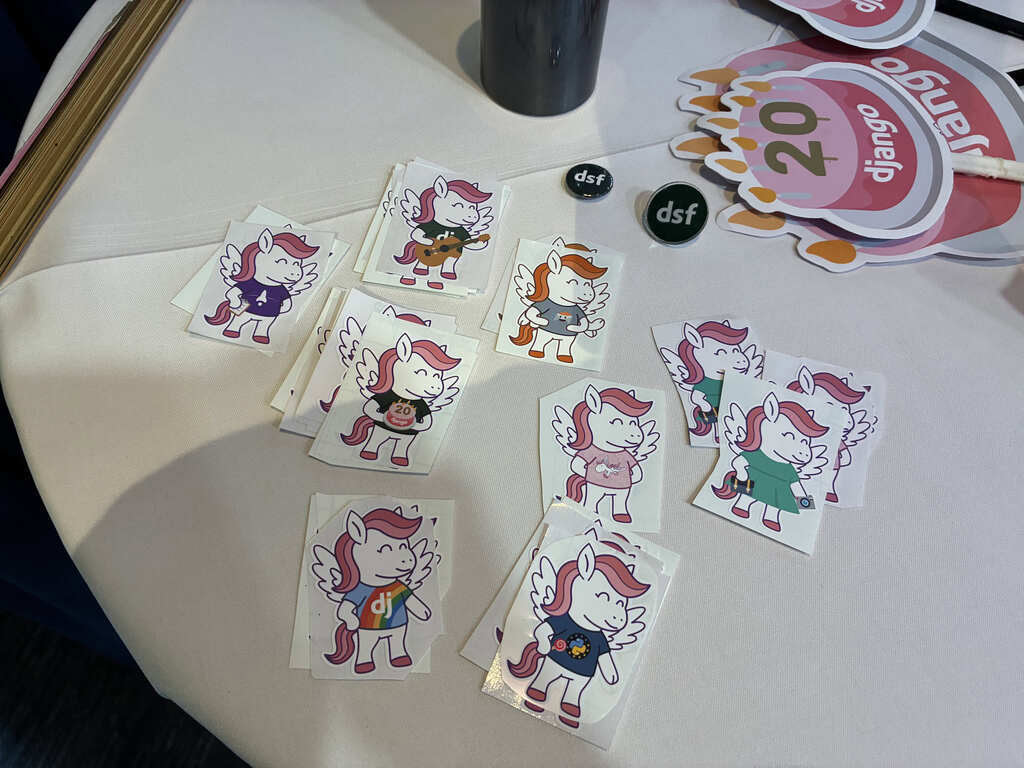
PyCon Italia 2025
Some of the PyCon Italia team was there at DjangoCon Europe to hype up their event – and we’ll definitely be there in Bologna! They promised better coffee 👀, and this will have to be independently verified. Check out their Djangonauts at PyCon Italia event.
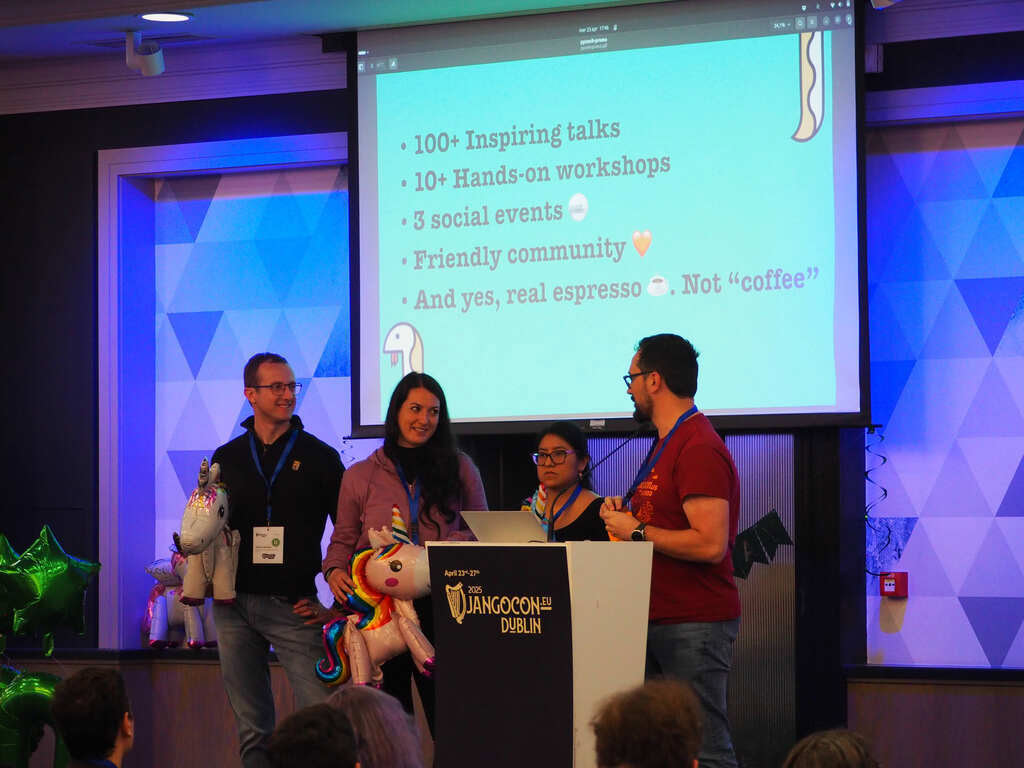
EuroPython 2025
We got to meet up with some of the EuroPython crew at DjangoCon Europe too, and we’ll definitely be there at the conference too, as one of their EuroPython community partners 💚. There may well be birthday cake there too, get your tickets!
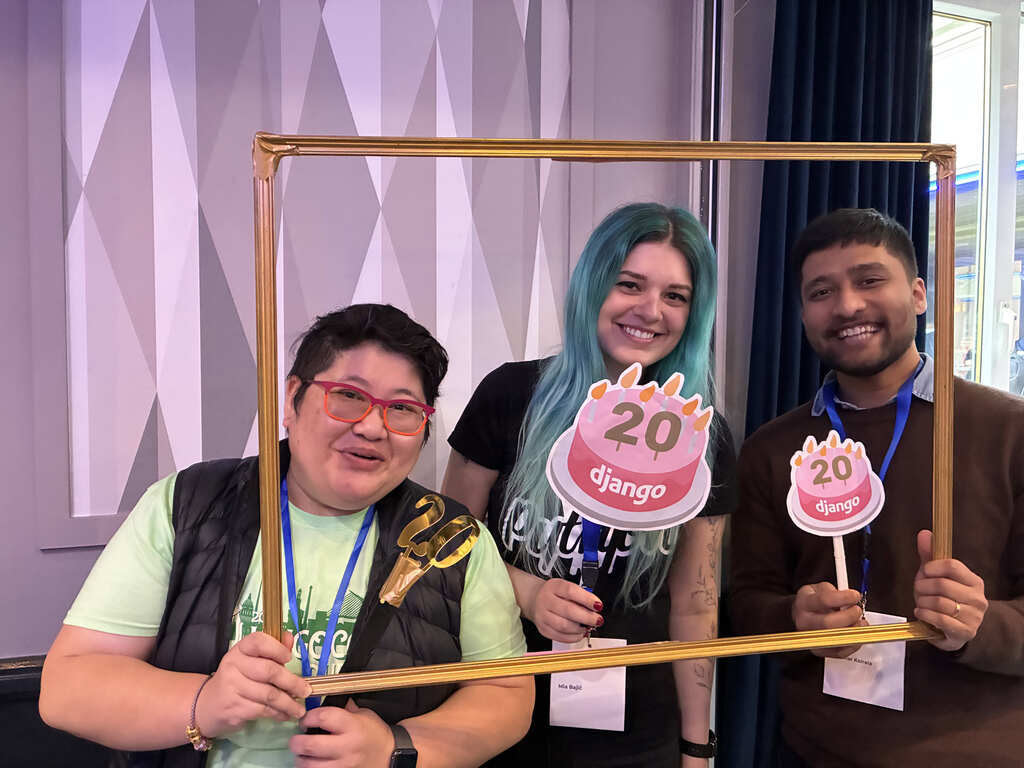
Django events
And if you haven’t already, be sure to check out our next flagship Django events!
- DjangoCon Africa 2025, in Arusha, Tanzania 🇹🇿 in August.
- DjangoCon US 2025, in Chicago, USA 🇺🇸 in September.
Thank you to everyone who joined us at DjangoCon Europe, and thank you to the team behind the conference in particular ❤️. DjangoCon Europe continues to show the strength and warmth of our community, proving that the best part of Django is truly the people. See you at the next one!
From The Django weblog at 2025-05-14 13:00:00
DSF member of the month - Simon Charette
For May 2025, we welcome Simon Charette as our DSF member of the month! ⭐
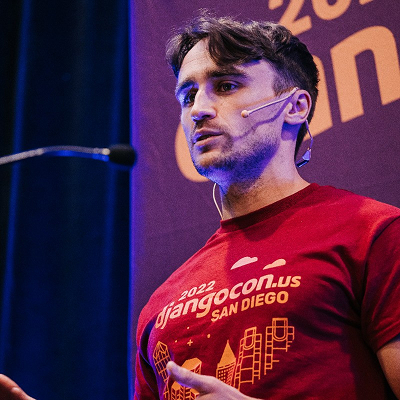
Simon Charette is a longtime Django contributor and community member. He served on the Django 5.x Steering Council and is part of the Security team and the Triage and Review team. He has been a DSF member since November 2014.
You can learn more about Simon by visiting Simon's GitHub Profile.
Let’s spend some time getting to know Simon better!
Can you tell us a little about yourself (hobbies, education, etc)
My name is Simon Charette and I'm based in Montréal. I've been contributing to Django for over a decade mainly to the ORM and I have a background in software engineering and mathematics. I work as a principal backend engineer at Zapier where we use Python and Django to power many of our backend services. Outside of Django and work I like to spend time cycling around the world, traveling with my partner, and playing ultimate frisbee.
Out of curiosity, your GitHub profile picture appears to be a Frisbee, is it correct? If so, have you been playing for a long time?
I've been playing ultimate frisbee since college which is around the time I started contributing to Django. It has been a huge part of my life since then as I made many friends and met my partner playing through the years. My commitment to ultimate frisbee can be reflected in my volume of contributions over the past decade as it requires more of my time during certain periods of the year. It also explains why I wasn't able to attend most DjangoCon in spring and fall as this is usually a pretty busy time for me. I took part in the world championships twice and I played in the UFA for about 5 years before retiring three years ago. Nowadays I still play but at a lower intensity level and I am focused on giving back to the community through coaching.
How did you start using Django?
Back in college I was working part time for a web agency that had an in house PHP framework and was trying to determine which tech stack and framework they should migrate to in order to ease onboarding of their developers and reduce their maintenance costs. I was tasked, with another member of the team, to identify potential candidates and despite my lack of familiarity with Python at the time we ended up choosing Django over PHP's Symphony mainly because of its spectacular documentation and third-party app ecosystem.
What other framework do you know and if there is anything you would like to have in Django if you had magical powers?
If I had magical powers I'd invent Python ergonomics to elegantly address the function coloring problem so it's easier for Django to be adapted to an async-ready world. I'm hopeful that the recent development on the GIL removal in Python 3.13+ will result a renewed interest in the usage of threading, which Django is well equipped to take advantage of, over the systematic usage of an event loop to deal with web serving workloads as the async world comes with a lot of often overlooked drawbacks.
What projects are you working on now?
I have a few Django related projects I'm working on mainly relating to ORM improvements (deprecating extra, better usage of RETURNING when available) but the main one has been a tool to keep track of the SQL generated by the Django test suite over time to more easily identity unintended changes that still pass the test suite. My goal with this project is to have a CI invokable command that would run the full Django test suite and provide a set of tests that generated different SQL compared to the target branch so its much easier to identify unintended side effects when making invasive changes to the ORM.
Which Django libraries are your favorite (core or 3rd party)?
- DRF
- django-filter
django-seal(shameless plug)
What are the top three things in Django that you like?
- The people
- The ORM, unsurprisingly
- The many entry points the framework provides to allow very powerful third-party apps to be used together
You've contributed significantly to improving the Django ORM. What do you believe is the next big challenge for Django ORM, and how do you envision it evolving in the coming years?
The ORM's expression interface is already very powerful but there are effectively some remaining rough edges. I believe that adding generalized support for composite virtual fields (a field composed of other fields) could solve many problems we currently face with how relationships are expressed between models as we currently lack a way to describe an expression that can return tuples of values internally. If we had this building block, adding a way to express and compose table expressions (CTE, subquery pushdown, aggregation through subqueries) would be much easier to implement without denaturing the ORM by turning it into a low level query builder. Many of these things are possible today (e.g. django-cte) but they require a lot of SQL compilation and ORM knowledge and can hardly be composed together.
How did you start to contribute to the ORM? What would be the advice you have for someone interested to contribute to this field?
I started small by fixing a few issues that I cared about and by taking the time to read through Trac, mailing lists, and git-blame for changes in the area that were breaking tests as attempted to make changes. One thing that greatly helps in onboarding on the ORM is to at least have some good SQL fundamentals. When I first started I already had written a MSSQL ORM in PHP which helped me at least understand the idea behind the generation of SQL from a higher level abstraction. Nowadays there are tons of resources out there to help you get started on understand how things are organized but I would suggest this particular video where I attempt to walk through the different phases of SQL generation.
Is there anything else you’d like to say?
It has been a pleasure to be able to be part of this community for so long and I'd like to personally thank Claude Paroz for initially getting me interested in contributing seriously to the project.
Thank you for doing the interview, Simon !
From The Django weblog at 2025-05-07 15:00:00
Django security releases issued: 5.2.1, 5.1.9 and 4.2.21
In accordance with our security release policy, the Django team is issuing releases for Django 5.2.1, Django 5.1.9 and Django 4.2.21. These releases address the security issues detailed below. We encourage all users of Django to upgrade as soon as possible.
CVE-2025-32873: Denial-of-service possibility in strip_tags()
django.utils.html.strip_tags() would be slow to evaluate certain inputs containing large sequences of incomplete HTML tags. This function is used to implement the striptags template filter, which was thus also vulnerable. django.utils.html.strip_tags() now raises a SuspiciousOperation exception if it encounters an unusually large number of unclosed opening tags.
Thanks to Elias Myllymäki for the report.
This issue has severity "moderate" according to the Django security policy.
Affected supported versions
- Django main
- Django 5.2
- Django 5.1
- Django 4.2
Resolution
Patches to resolve the issue have been applied to Django's main, 5.2, 5.1, and 4.2 branches. The patches may be obtained from the following changesets.
CVE-2025-32873: Denial-of-service possibility in strip_tags()
- On the main branch
- On the 5.2 branch
- On the 5.1 branch
- On the 4.2 branch
The following releases have been issued
- Django 5.2.1 (download Django 5.2.1 | 5.2.1 checksums)
- Django 5.1.9 (download Django 5.1.9 | 5.1.9 checksums)
- Django 4.2.21 (download Django 4.2.21 | 4.2.21 checksums)
The PGP key ID used for this release is Natalia Bidart: 2EE82A8D9470983E
General notes regarding security reporting
As always, we ask that potential security issues be reported via private email to security@djangoproject.com, and not via Django's Trac instance, nor via the Django Forum. Please see our security policies for further information.
From The Django weblog at 2025-04-26 15:58:08
New-features github repo and project
New Feature Request/Proposal Process with GitHub Repository
Django is experimenting with a new GitHub repository specifically designed to manage feature ideas and their progression. This is a significant shift away from the previous process of posting those to the forum.
Introducing the Django Features Repository
The Django Steering Council has launched a new GitHub repository at https://github.com/django/new-features dedicated to managing feature requests and ideas. This repository works in conjunction with a GitHub project to provide more efficient tracking of feature ideas as they move through various stages of consideration.
Why This Matters for Django Developers
This new approach aims to addresses several challenges the Django community has faced with feature requests:
- Community involvement: Clear guidelines on how to participate in feature discussions
- Structured workflow: A defined path from idea to implementation
- Better resource allocation: Prioritization based on community support and feasibility
The New Feature Process Flow
The process follows a workflow with several key decision points:
- New Idea Submission: Community members submit feature ideas as GitHub issues
- Community Support Phase: The community reacts with emojis and comments to express support or concerns
- Evaluation for Core Inclusion: The Steering Council determines if the feature belongs in Django core or whether it is more appropriate as a 3rd party package
- Implementation Planning: Through an expedited DEP (Django Enhancement Proposal) process
How to Participate
Have a Feature Idea?
If you have an idea for improving Django, the process starts by creating an issue in the new repository. Before submitting, review the new feature process documentation to understand what to expect.
Want to Help Shape Django's Future?
There are three key areas where community involvement is needed:
- Community Support Assessment: Review open tickets and share your support using emoji reactions
- 👍 For features you would use
- 👎 For features that might cause problems
- 😕 For features you're indifferent about
-
🎉 For easy wins
-
Core Evaluation: Help determine whether features should exist in Django core or as third-party packages
-
Implementation Volunteering: Assist with implementing, reviewing implementations, and maintenance of approved features
Benefits for the Django Community
We believe this new process can help with:
- Clearer communication: Understanding where a feature stands in the process
- More efficient feature development: Resources directed to features with demonstrated community support
- Better separation of concerns: Distinguishing between features that belong in core versus those better suited as third-party packages
- Reduced friction: Expedited processes for smaller feature requests
Providing Feedback
If you have thoughts about the new process itself, we'd love to get feedback through the Django Forum.
Conclusion
The experimental new feature repository represents is one of several steps Django is taking in order to try and improve the contributor experience journey. By providing a structured, transparent process for feature requests, Django aims to better serve its community while maintaining the framework's quality and sustainability.
For developers interested in contributing to Django or proposing new features, this new system should provide clearer expectations while making it easier to locate and participate in the discussion around a specific feature.
Check out the repository at https://github.com/django/new-features to learn more and start participating in this new adventure.
From The Django weblog at 2025-04-18 15:19:46
Django Admin Theme Roundup 2025
One of Django’s most appreciated features is the built-in admin functionality. In fact, it was ranked as the most useful contrib app in the 2023 Django developer survey.
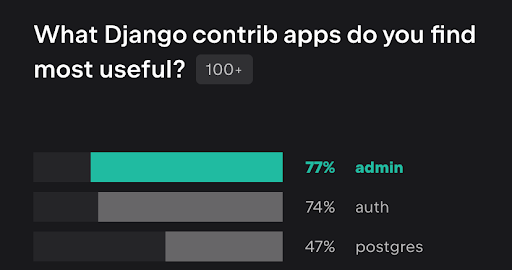
With a few lines of code, Django automatically generates an administrative interface to add, update, and edit objects in your database. While it's not meant to replace a full-featured frontend, the admin makes rapid prototyping possible and provides a lot of functionality out of the box.
However, the admin’s focus is not on a flashy user interface and some people have found it to be a little plain – some have even called it ugly! But fortunately, like all Django applications, the admin’s CSS and HTML templates can be overridden and tweaked. Here are a few projects which have done that, and are recently updated as of early 2025.
Chime in on the Django forum thread here with your favorite Django admin theme or if I missed any other options!
Note that these packages are listed in the order of the “easiest” integration to the hardest. However, the later libraries also tend to provide more features.
Dracula
A dark (and light) theme for the Django Admin based on the very popular Dracula which has themes for 400+ applications. This library is a quick win to give the admin a bit of pizazz without requiring much setup or changing the default admin functionality.
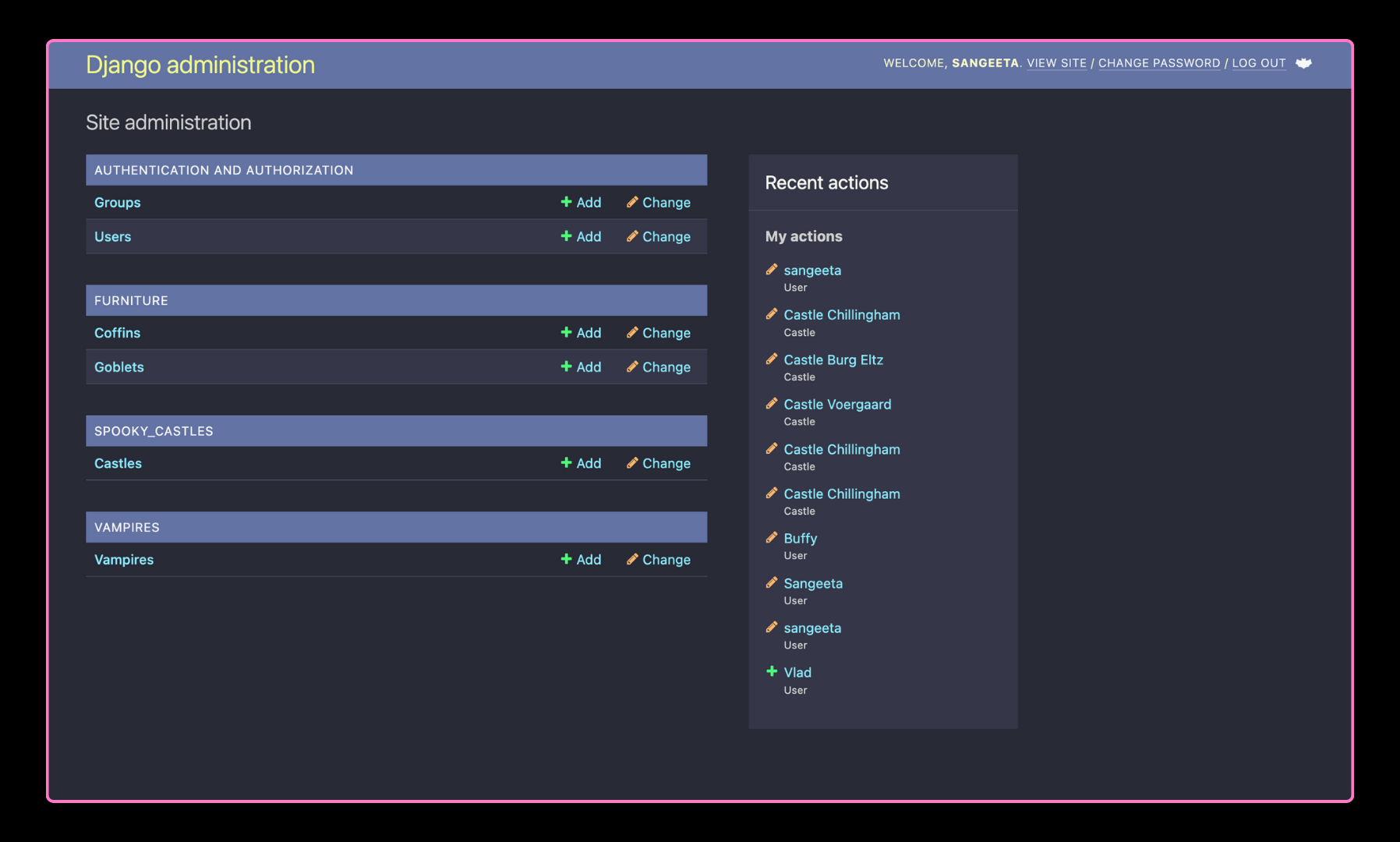
Django Daisy
Django Daisy is a responsive admin built with DaisyUI and TailwindCSS. Application icons can be added by utilizing Font Awesome. Very minimal (and completely optional!) configuration.
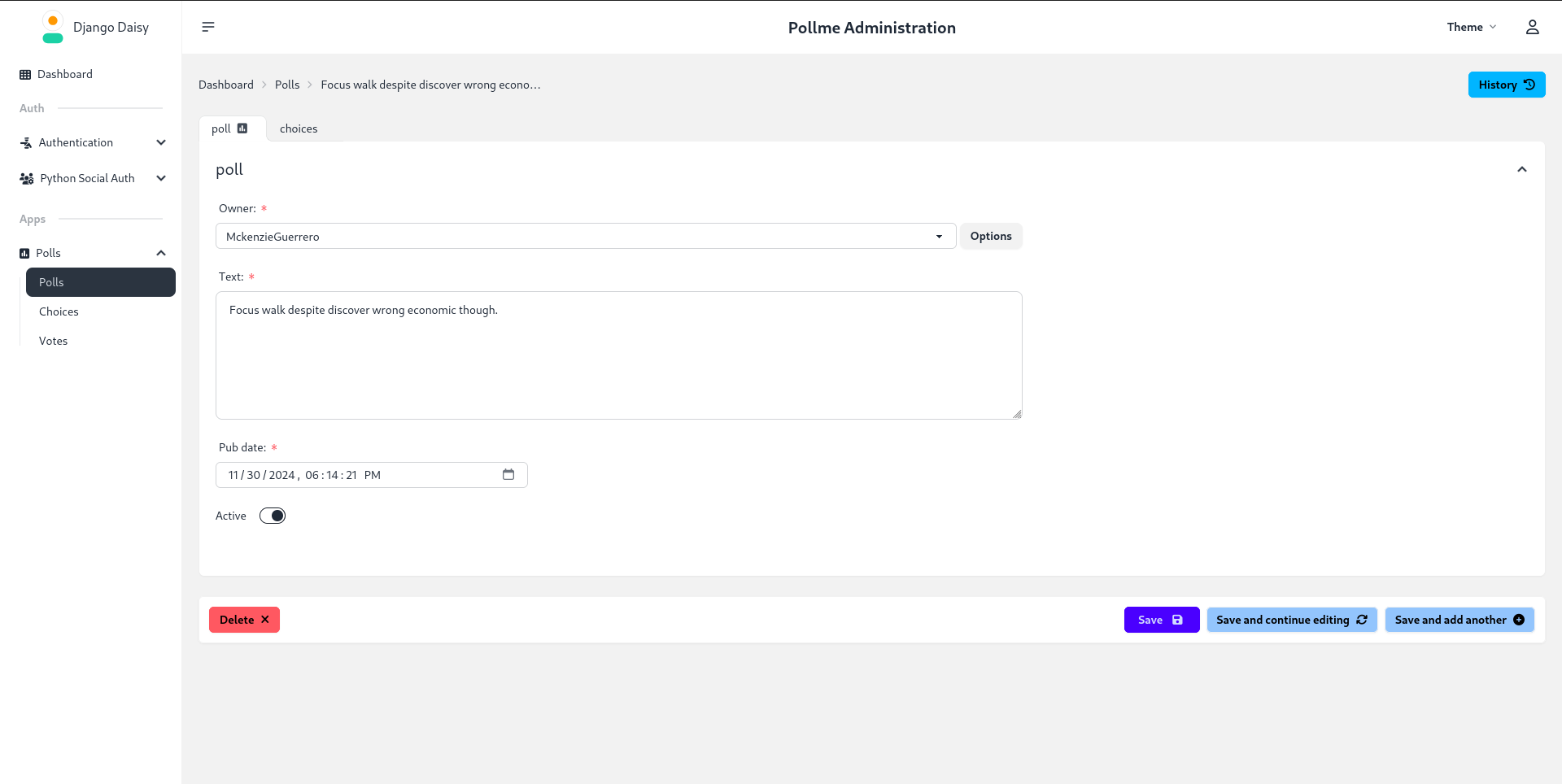
django-jazzmin
A drop-in theme for the Django admin that utilises AdminLTE 3.2 & Bootstrap 5. All of the configuration is optional which means the installation is very straight-forward. However, it also includes the ability to create custom menus, convert all pop-ups to modals, and a slick UI customizer. django-jazzmin also includes a wide selection of built-in themes.
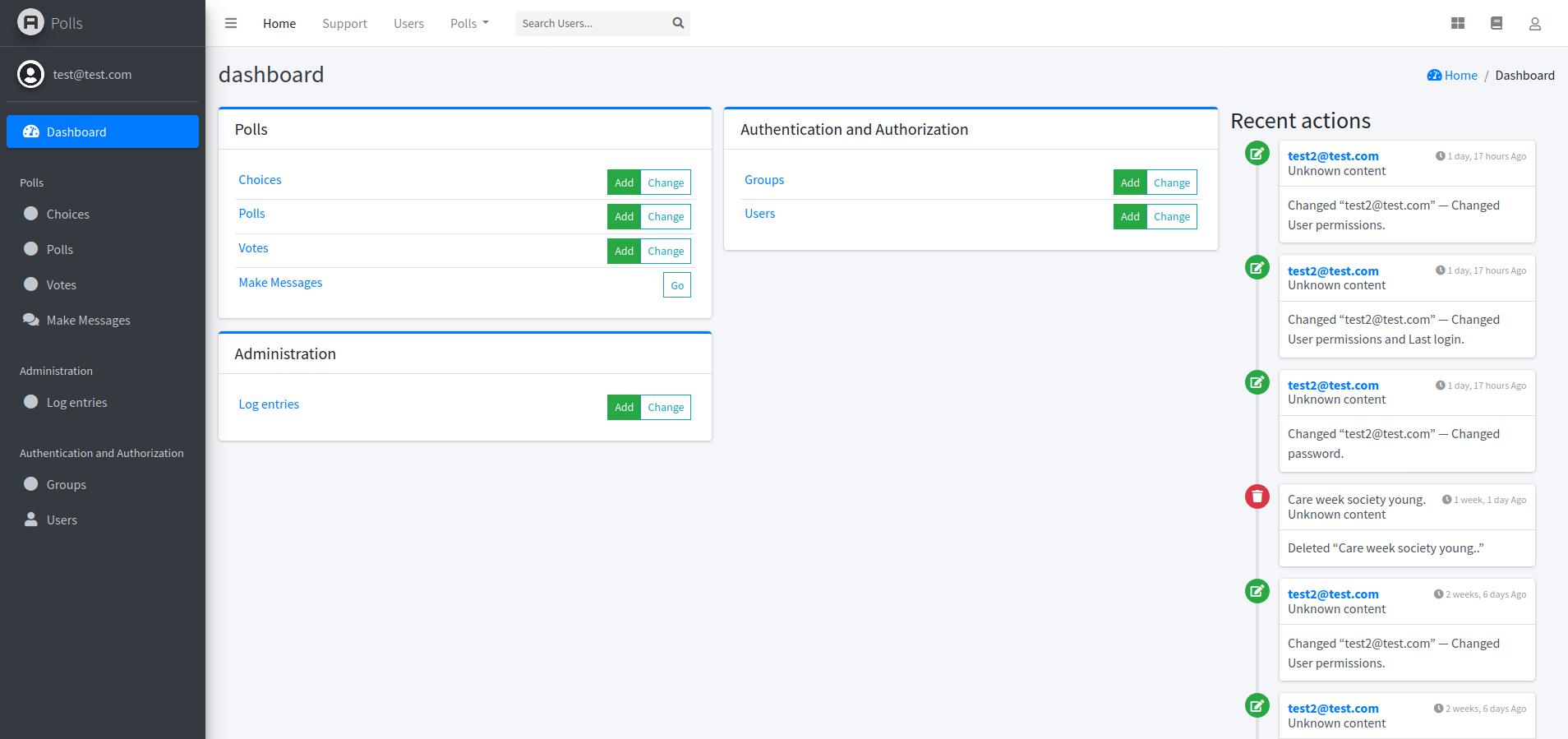
django-admin-kubi
Kubi applies a Bootstrap 5 facelift to the Django admin, but also adds Sass support for custom styling and Font Awesome icons. It includes a sidebar menu for easy navigation and support for some third-party packages, including django-modeltranslation, django-modeltrans, django-import-export, django-two-factor-auth, and django-colorfield.
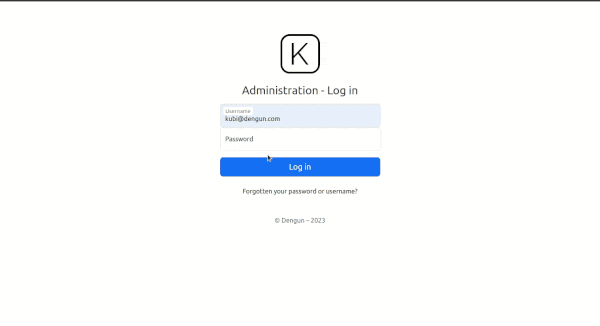
django-jet-reboot
Modern template for the Django admin interface with improved functionality. It provides the ability to create a custom dashboard and modules. Also includes user-selectable themes through the UI.
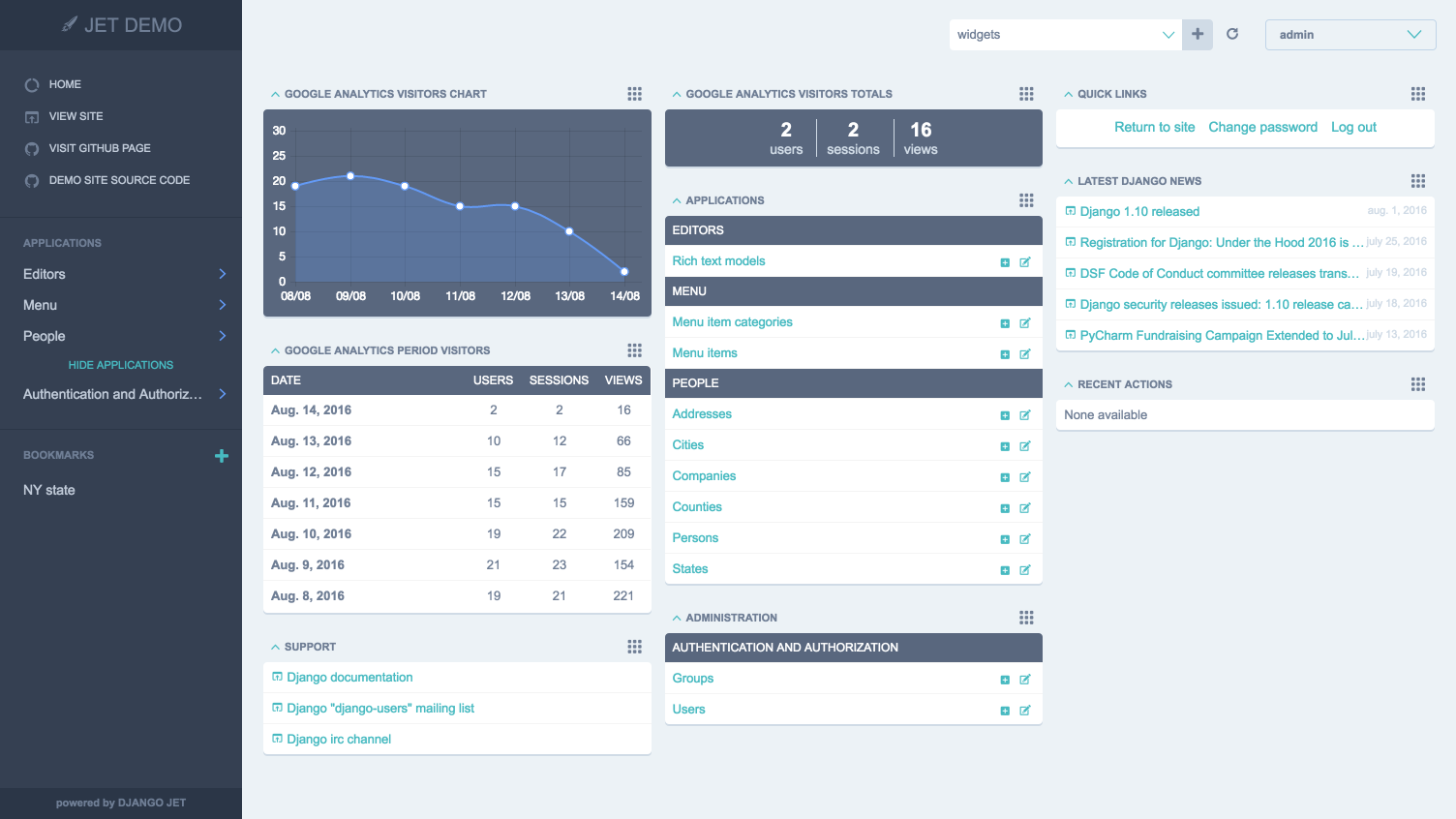
django-semantic-admin
A responsive Django admin theme based on Semantic UI. Includes JavaScript datepicker and timepicker components. Includes support for django_filter and django-import-export.
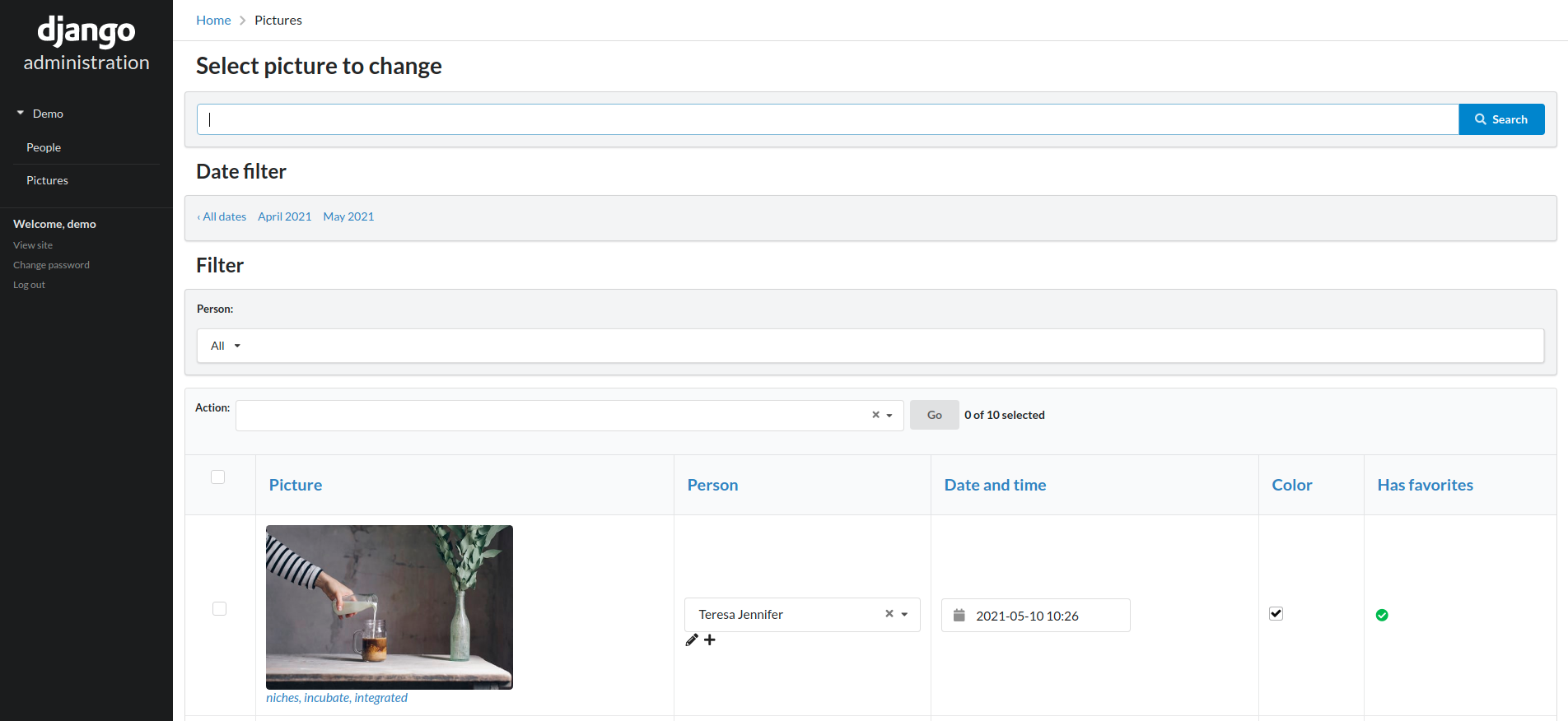
Simple UI
A modern theme based on vue + element-ui which comes with 28 different themes. The documentation is originally in Chinese, but there is a translation in English.
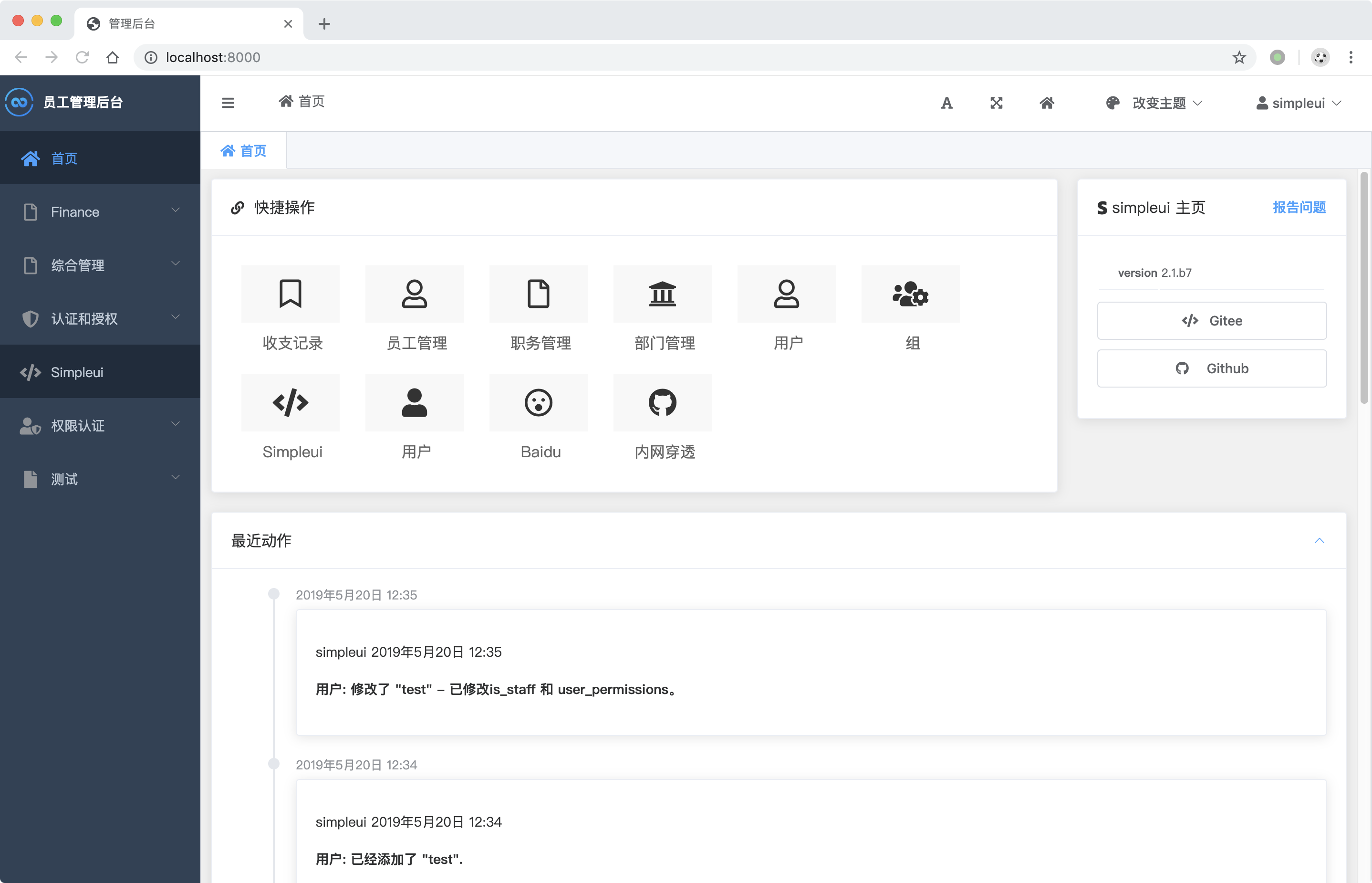
Grapelli
Grappelli is a grid-based alternative to the Django admin which provides a few nifty features such as a custom TinyMCE integration, customizable dashboard, and inline sortables which can be updated by drag and drop.
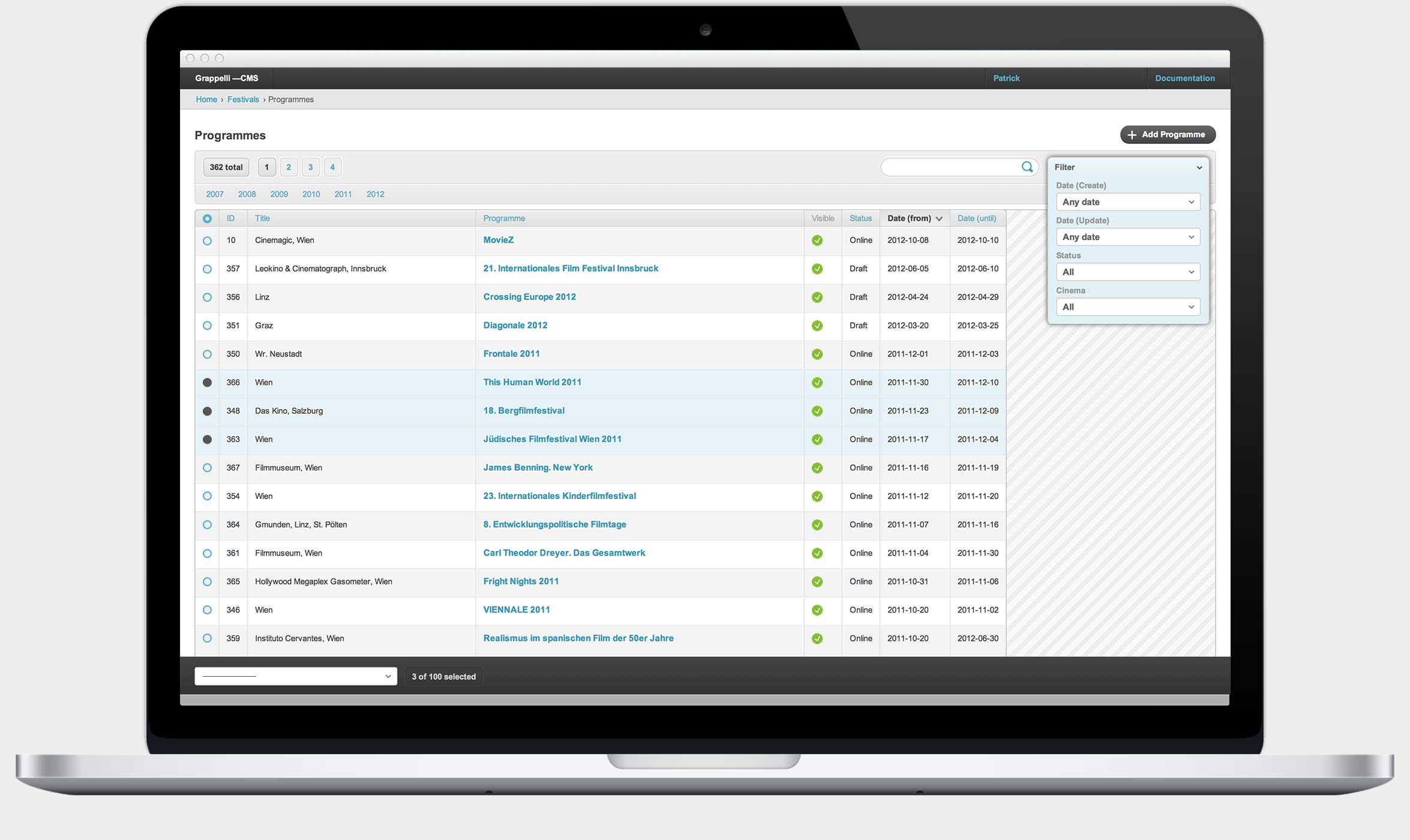
django-admin-interface
A modern responsive flat admin interface which comes with optional themes that can be installed for Bootstrap, Foundation, and U.S. Web Design Standards, and customizable by the admin itself. Other features include replacing admin pop-ups with modals, accordions in the navigation bar to collapse applications, sticky filters and buttons to prevent them from scrolling off the screen, and a language switcher. Also includes support for django-ckeditor, django-dynamic-raw-id, django-json-widget, django-modeltranslation, django-rangefilter, django-streamfield, django-tabbed-admin, and sorl-thumbnail.
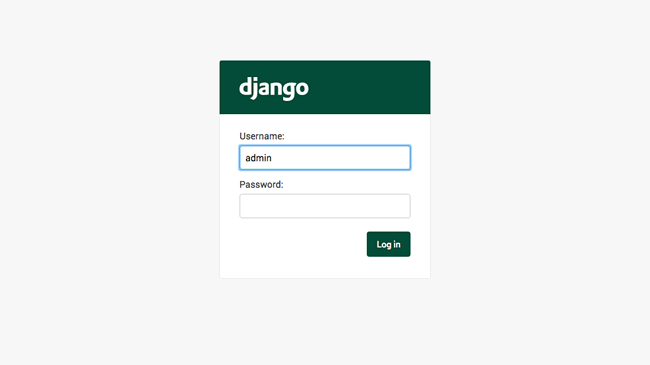
Unfold
Unfold transforms the Django admin and is built with TailwindCSS. It includes custom widgets, pages, and admin sites. Also provides a language selector, conditional fields, custom filters, tabs, and additional features for actions. There are a lot of available settings and it is extremely customizable.
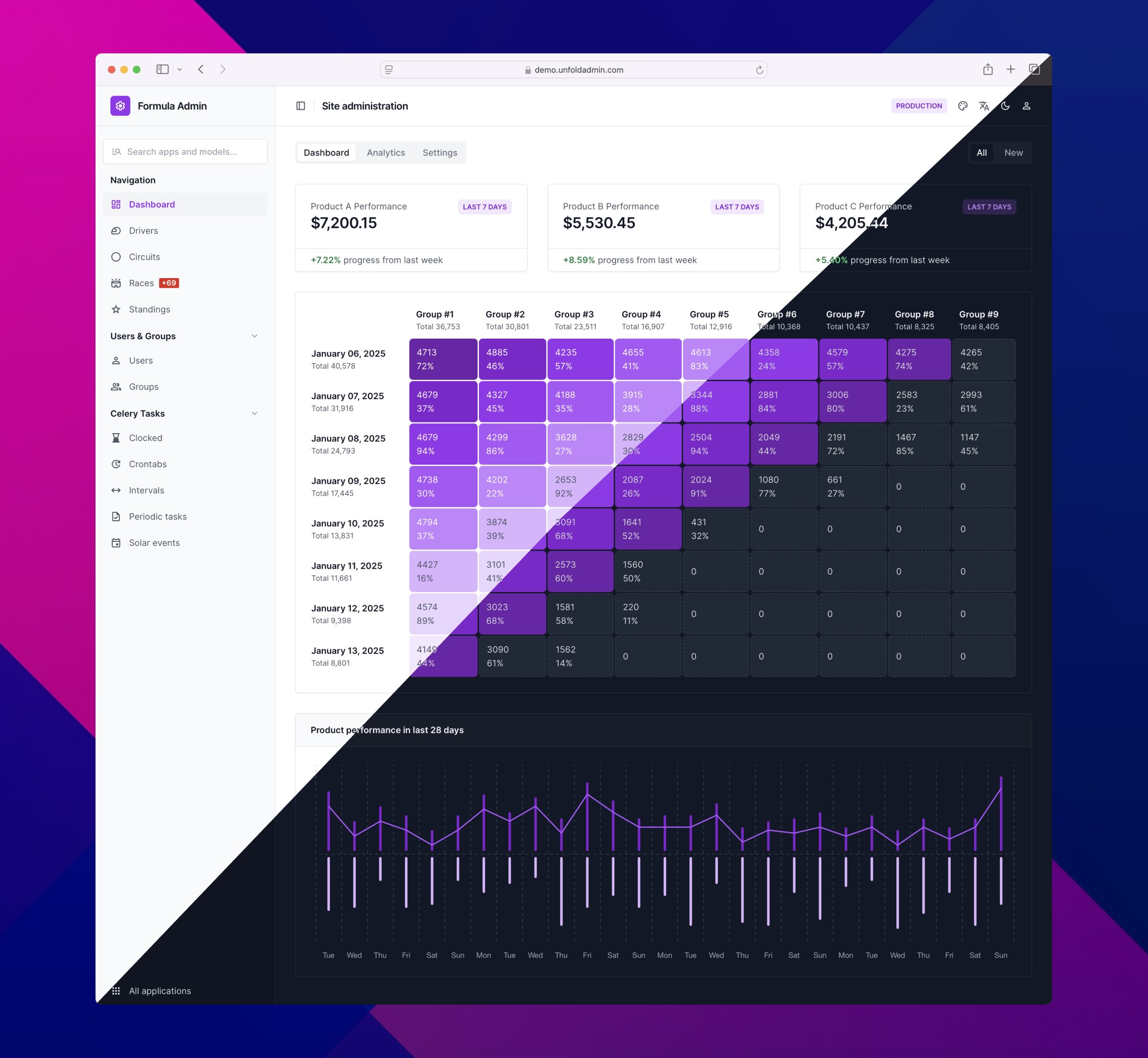
From The Django weblog at 2025-04-18 08:07:28
See you at PyCon US in Pittsburgh!

We’ll be at PyCon US 2025, and hope to see the Django community and all our Python friends there ❤️! We have been granted a community booth at the conference – come say hi in the Expo Hall during open hours. There may be Django stickers available to pick up!
Represent Django
For our Individual Members – if you’d like to help us showcase Django, we’re looking for help staffing the booth (members-only forum)! This is a great opportunity to give back to support our project – consider it!
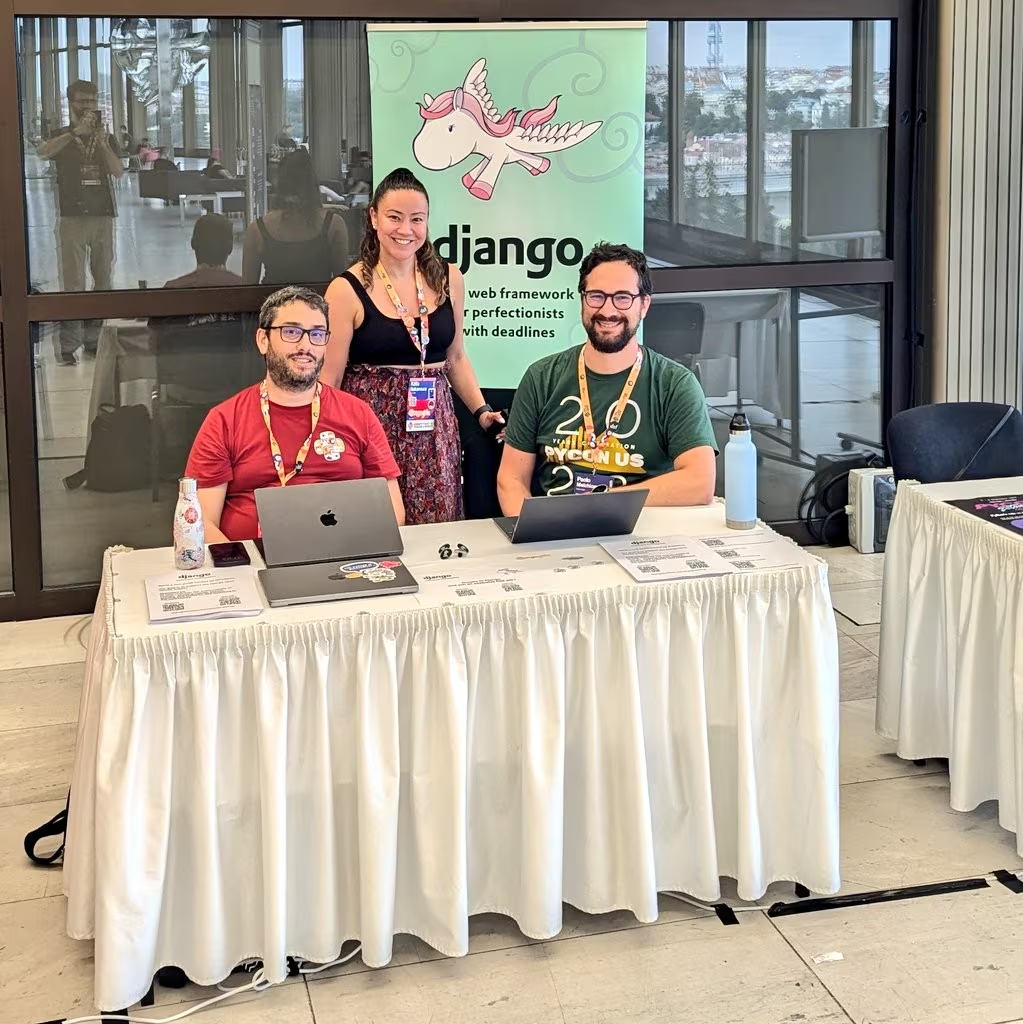
Credit: Paolo Melchiorre (CC-BY-SA)
From The Django weblog at 2025-04-17 10:00:00
Run your tests against Django's main!
This is the blog version of a talk! If you prefer, watch the recording on YouTube:
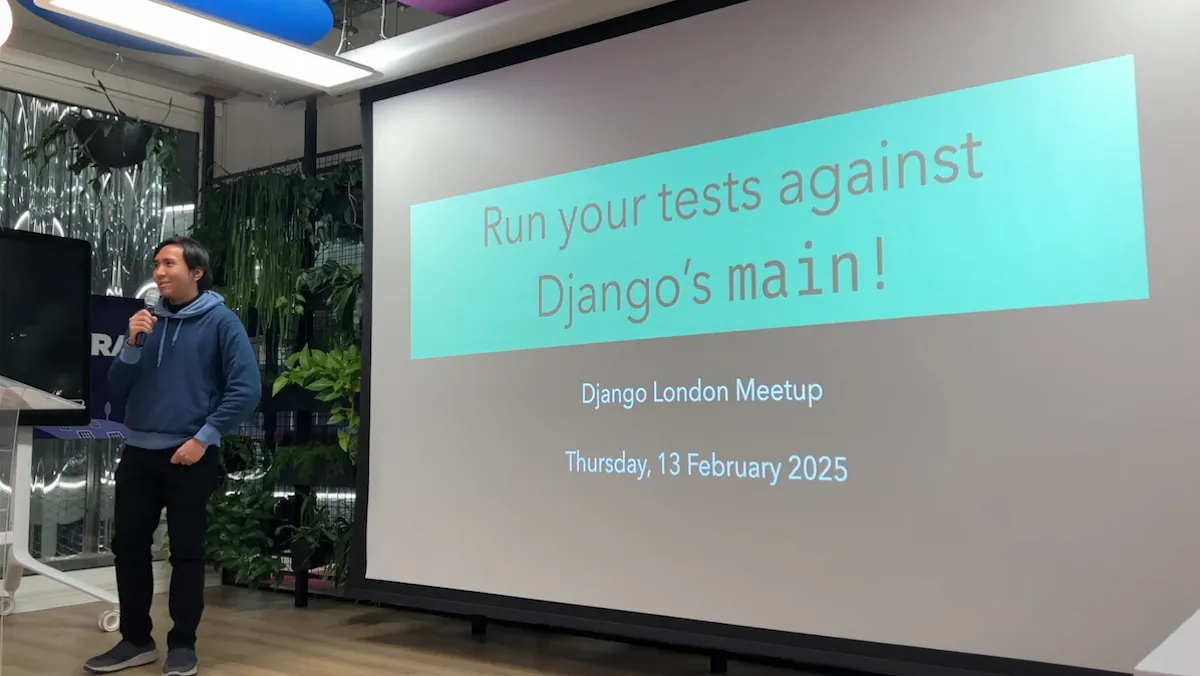
Django is known for its stability. The framework makes a strong commitment to API stability and forwards-compatibility, ensuring that developers can rely on it for building long-term, maintainable projects. A key aspect of this commitment involves extensive testing and structured releases—an area where testing by Django users can significantly enhance Django’s reliability. Here’s a closer look at how this works, and how you can contribute 🤝.
How Django stays stable
Django's stability is upheld through rigorous testing. As of Django 5.2, there are more than 18,000 tests run against all officially supported database backends, Python versions, and operating systems. Additionally, Django follows a well-structured deprecation policy, ensuring that public APIs are deprecated over at least two feature releases before being removed.
The feature release schedule is systematic and structured:
- Active development happens on the
mainbranch. - A stable branch (for example
stable/5.2.x) is forked when an alpha release is made. - After a month, the beta release follows, where only release-blocking bug fixes are allowed.
- A month later, a release candidate (RC) is published, marking the translation string freeze.
- If no critical bugs are found, the final release is published after a couple of weeks.
With this structured approach, Django ensures that releases are stable. However, bugs can and do occasionally slip through the cracks!
Catching issues early
The best time to catch issues is before they reach the final release. Ideally, potential bugs should be caught at the pull request stage, but keeping up with all changes is challenging. This is where the community can help—by running their tests with Django's main branch.
How you can help
You can set up your test suite to run with Django's main branch in your tests pipeline. Here's an example using GitHub Actions, a popular Continuous Integration platform:
test:
runs-on: ubuntu-latest
continue-on-error: ${{ matrix.experimental }}
strategy:
matrix:
include:
- python: "3.13"
django: "git+https://github.com/django/django.git@main#egg=Django"
experimental: true
steps:
- uses: actions/checkout@v4
- uses: actions/setup-python@v5
with:
python-version: ${{ matrix.python }}
- run: pip install -r requirements.txt
- if: ${{ matrix.experimental }}
run: pip install "${{ matrix.django }}"
- run: python -Wd manage.py test
If you maintain a Django package, you likely already test with multiple Django versions. Adding the main branch ensures that your project stays ahead of potential breaking changes.
Why this helps you
Running tests with Django main allows you to detect when changes in Django break your project. Sometimes, this happens due to the removal of internal APIs (that were never intended for reuse outside Django 🙈). If your tests fail, you can identify which commit caused the issue and adjust your code accordingly.
For example, on the Wagtail CMS project, recently caught an issue when an internal class, SubqueryConstraint, was removed from Django. This wasn't a bug in Django—it was the removal of an internal workaround that was no longer needed. If your project relies on internal APIs, testing against main is crucial to avoid surprises.
Why this helps Django
Testing with main doesn't just help your project—it helps Django too. Sometimes, your tests may fail due to legitimate regressions in Django that its test suite doesn't cover. Reporting these issues ensures they get fixed before the next release.
For example, just two days before Django 5.2 alpha was released, Wagtail tests on main helped detect a bug where calling .full_clean() on a child model in a multi-table inheritance setup triggered an unintended database query. This regression was promptly fixed, ensuring a smoother release for all users.
Take action: test against Django's main and report issues
By running your tests against Django's main branch and reporting any issues you find, you contribute to a more stable framework for everyone. It's a small step that makes a big impact.
So, take a few minutes today to update your automated tests setup and help keep Django as reliable as ever!
From The Django weblog at 2025-04-14 22:10:40
DSF member of the month - Öykü Gümüş
For April 2025, we welcome Öykü Gümüş as our DSF member of the month! ⭐
Öykü Gümüş has been Django developer for many years. She has been DjangoCon Europe organizer in 2018 and Django Girls mentor in Istanbul for multiple years. She has been a DSF member since November 2019.
You can learn more about Öykü by visiting Öykü's GitHub Profile.
Let’s spend some time getting to know Cory better!
Can you tell us a little about yourself (hobbies, education, etc)
Hi, I am Öykü, software engineer currently based in Germany.
I studied Computer Engineering in Istanbul, and during my university years, I realised I really enjoy being part of tech communities such as Django Girls, PyLadies and etc.. And I have been trying to play an active role in such groups ever since! Apart from that, I like drawing, and currently trying to improve my illustration skills. In general, I enjoy learning new things. For example started learning cello after 25 years of age, and loving every minute of my attempts to play it. I also love cycling and hiking. Germany is offering so much in those areas and I am always looking for a chance to get on the road.
How did you start using Django?
During my university studies, I started working as a part time developer and my first ever job was with Django. Loved how versatile it was!
What other framework do you know and if there is anything you would like to have in Django if you had magical powers?
Besides Django, I’ve used Flask, which gives you more control and is great for microservices, and FastAPI, which I really like for its async capabilities and performance. If I had magical powers to add something to Django, I’d probably improve its async support to make it more seamless throughout the stack. Right now, you can work around it, but it’s not as smooth as in FastAPI, for example.
What projects are you working on now?
Lately, I’ve been diving into GraphQL—experimenting with Graphene in Django and playing around with Apollo Client on the frontend. It’s been interesting to compare it with traditional REST APIs and explore how it can streamline data fetching in more complex UIs.
Which Django libraries are your favorite (core or 3rd party)?
There are a few Django libraries I keep reaching for, both core and third-party. Core-wise, I really appreciate how solid the django.contrib.admin is. It saves so much time in early development. Also, Django’s ORM and authentication system are very well designed—I rarely need to look elsewhere unless I’m doing something super custom. For third-party libraries, a few that I really enjoy using: django-rest-framework django-allauth and graphene-django
What are the top three things in Django that you like?
The ORM, the "Batteries Included" policy and Django's amazing community ❤️
You have been mentor for DjangoGirls+ multiple times, how did you start to mentor? Do you have any recommendation for potential folks interested to mentor?
Oh yes, I met with Django Girls in Istanbul and immediately wanted to take part by mentoring and couldn't love it more! It has great atmosphere and provides such a supportive environment, that I can safely suggest everyone just at least try it once. It's amazing to see the direct impact you can make on people by simply being there. One thing anyone interested in mentoring should never forget is to always maintain an inclusive and safe space.
You were part of the DjangoCon Europe organization in 2018, what makes you volunteer for this event?
The kindness of the organisers of another conference actually. It was Europython 2017 folks, and they kindly provided me, student at the time, a financial aid to join the conference and it was my first tech conference ever! Loved it so much, that I thought I should pay it forward. 🙂
Is there anything else you'd like to say?
Thanks so much for the chat—really enjoyed it! I also just want to say how valuable communities like this are, especially for folks starting out or navigating their path. Having spaces where people can share, support, and learn from each other makes a huge difference.
Thank you for doing the interview, Öykü !
From The Django weblog at 2025-04-09 07:22:15
Annual meeting of DSF Members at DjangoCon Europe
We’re organizing an annual meeting for members of the Django Software Foundation! It will be held at DjangoCon Europe 2025 in two weeks in Dublin, bright and early on the second day of the conference. The meeting will be held in person at the venue, and participants can also join remotely.
Register to join the annual meeting
What to expect
This is an opportunity for current and aspiring members of the Foundation to directly contribute to discussions about our direction. We will cover our current and future projects, and look for feedback and possible contributions within our community.
If this sounds interesting to you but you’re not currently an Individual Member, do review our membership criteria and apply!
From The Django weblog at 2025-04-02 11:16:11
The Django team is happy to announce the release of Django 5.2.
The release notes showcase a composite of new features. A few highlights are:
- All models are automatically imported in the shell by default.
- Django now supports composite primary keys! The new django.db.models.CompositePrimaryKey allows tables to be created with a primary key consisting of multiple fields.
- Overriding a BoundField got a lot easier: this can now be set on a form, field or project level.
You can get Django 5.2 from our downloads page or from the Python Package Index. The PGP key ID used for this release is: 3955B19851EA96EF
With the release of Django 5.2, Django 5.1 has reached the end of mainstream support. The final minor bug fix release, 5.1.8, which was also a security release, was issued today. Django 5.1 will receive security and data loss fixes until December 2025. All users are encouraged to upgrade before then to continue receiving fixes for security issues.
Django 5.0 has reached the end of extended support. The final security release, 5.0.14, was issued today. All Django 5.0 users are encouraged to upgrade to Django 5.1 or later.
See the downloads page for a table of supported versions and the future release schedule.
From The Django weblog at 2025-04-02 10:37:50
Django security releases issued: 5.1.8 and 5.0.14
In accordance with our security release policy, the Django team is issuing releases for Django 5.1.8 and Django 5.0.14. These releases address the security issues detailed below. We encourage all users of Django to upgrade as soon as possible.
CVE-2025-27556: Potential denial-of-service vulnerability in LoginView, LogoutView, and set_language() on Windows
Python's NFKC normalization is slow on Windows. As a consequence, django.contrib.auth.views.LoginView, django.contrib.auth.views.LogoutView, and django.views.i18n.set_language were subject to a potential denial-of-service attack via certain inputs with a very large number of Unicode characters.
Thanks to sw0rd1ight for the report.
This issue has severity "moderate" according to the Django security policy.
Affected supported versions
- Django main
- Django 5.2 (currently at release candidate status)
- Django 5.1
- Django 5.0
Resolution
Patches to resolve the issue have been applied to Django's main, 5.2 (currently at release candidate status), 5.1, and 5.0 branches. The patches may be obtained from the following changesets.
CVE-2025-27556: Potential denial-of-service vulnerability in LoginView, LogoutView, and set_language() on Windows
- On the main branch
- On the 5.2 branch
- On the 5.1 branch
- On the 5.0 branch
The following releases have been issued
- Django 5.1.8 (download Django 5.1.8 | 5.1.8 checksums)
- Django 5.0.14 (download Django 5.0.14 | 5.0.14 checksums)
The PGP key ID used for this release is : 3955B19851EA96EF
General notes regarding security reporting
As always, we ask that potential security issues be reported via private email to security@djangoproject.com, and not via Django's Trac instance, nor via the Django Forum. Please see our security policies for further information.
From The Django weblog at 2025-03-19 07:49:49
Django 5.2 release candidate 1 released
Django 5.2 release candidate 1 is the final opportunity for you to try out a composite of new features before Django 5.2 is released.
The release candidate stage marks the string freeze and the call for translators to submit translations. Provided no major bugs are discovered that can't be solved in the next two weeks, Django 5.2 will be released on or around April 2. Any delays will be communicated on the on the Django forum.
Please use this opportunity to help find and fix bugs (which should be reported to the issue tracker), you can grab a copy of the release candidate package from our downloads page or on PyPI.
The PGP key ID used for this release is Sarah Boyce: 3955B19851EA96EF
From The Django weblog at 2025-03-14 11:53:00
DSF member of the month - Cory Zue
For March 2025, we welcome Cory Zue (@coryzue.com) as our DSF member of the month! ⭐
Cory Zue is a Django developer for many years. He is currently a member of the DSF Social Media Working Group and he has been a DSF member since octobre 2022.
You can learn more about Cory by checking out his website or visiting Cory's GitHub Profile.
Let’s spend some time getting to know Cory better!
Can you tell us a little about yourself (hobbies, education, etc)
I'm a programmer-turned-manager-turned-entrepreneur and currently run a portfolio of businesses on my own (using Django of course!).
I grew up in Massachusetts and studied Computer Science at MIT where I met the founders of Dimagi, where I ended up as CTO for 10 years before starting my own businesses. In 2016, I moved to Cape Town, South Africa for a "temporary" relocation, and have been here ever since. These days my main hobbies include surfing, trail running, and exploring nature with my wife and two boys.
How did you start using Django?
My first major Django project was working on an SMS-based system that helped with the distribution of millions of bednets in Nigeria. It was built on top of a Django-based platform called RapidSMS that was initially developed by UNICEF. After that I worked on several other RapidSMS systems before eventually leading Dimagi's CommCare server team. CommCare eventually became -- to my knowledge -- the largest open source Django codebase in terms of contributions/commits.
What other framework do you know and if there is anything you would like to have in Django if you had magical powers?
I still love Django and use it for most projects that need a backend. That said, I find Django's "hands off" approach to modern front end development to be a big barrier for people who aren't already familiar with the framework.
If I had magical powers I would convince the Django community that it is worth providing some out-of-the-box support for modern front end tooling like TailwindCSS or a JavaScript bundler. I'd also try to get official "starter projects" built into the framework that show how you can use Django with some of the more popular front end options like React and HTMX.
What projects are you working on now?
My main project right now is SaaS Pegasus, which is a Django codebase creator that helps you spin up new projects more efficiently by bundling in even more batteries than Django itself. This includes things like configuring auth, front end, and deployment, but also has some more powerful features like multi-tenancy and billing baked in.
One of the great things about running Pegasus is that I can justify building new Django apps as dogfooding the product. So I always have other Django projects I'm working on. Right now the biggest one is a RAG chat-with-your-data LLM project called Scriv.ai.
Within the Django community my main contributions are in the form of writing in-depth guides to using Django, as well as pitching in on the Social Media working group to help grow Django's audience.
Which Django libraries are your favorite (core or 3rd party)?
It's hard to go with anything other than the ORM (and migrations framework), which I still feel is Django's greatest and most important feature. It just fits my brain much better than SQLAlchemy or other options I've used.
One lesser-known library I'll shout out that I have been enjoying lately is django-cotton, which provides a nice little layer of syntactic sugar and tooling that makes working with components in Django templates much nicer.
What are the top three things in Django that you like?
-
The ORM + migrations.
-
The community.
-
That nearly every backend use case I have already has a feature that's been built to accommodate it (e.g. middleware, messages, i18n, etc.). I feel like the modern JavaScript frameworks I've used are way behind on this front.
What would you recommend to someone who wants to start out as an entrepreneur like you?
I have an entire talk/article about this!
But if I were to emphasize the most important part that worked for me, it was creating enough space in my life for deep, uninterrupted work and structuring it in a way that I never ran out of money or energy while I was trying (by working part time while I was getting started). In general, the path to success usually takes a long time, so giving yourself plenty of time is really important. The tactics you can figure out as you go, but the space and time to do it is the most important thing to have in place. Your main goal is not to quit.
Is there anything else you'd like to say?
Thank you for including me in this series!
Thank you for doing the interview, Cory!
From The Django weblog at 2025-03-13 14:00:00
Accessibility and inclusivity at FOSDEM 2025
For this year’s FOSDEM conference, our Django accessibility team organized the "Inclusive Web" track. Here’s a recap of how it went!
The idea for the Inclusive Web devroom started at FOSDEM 2024, where we discussed the importance of showcasing accessibility and inclusivity work in open source, in web development and beyond. The Django accessibility team got to work on a FOSDEM 2025 proposal. Lo and behold, it got accepted, and here we are with a room full of people interested in those topics, and a great lineup of speakers!
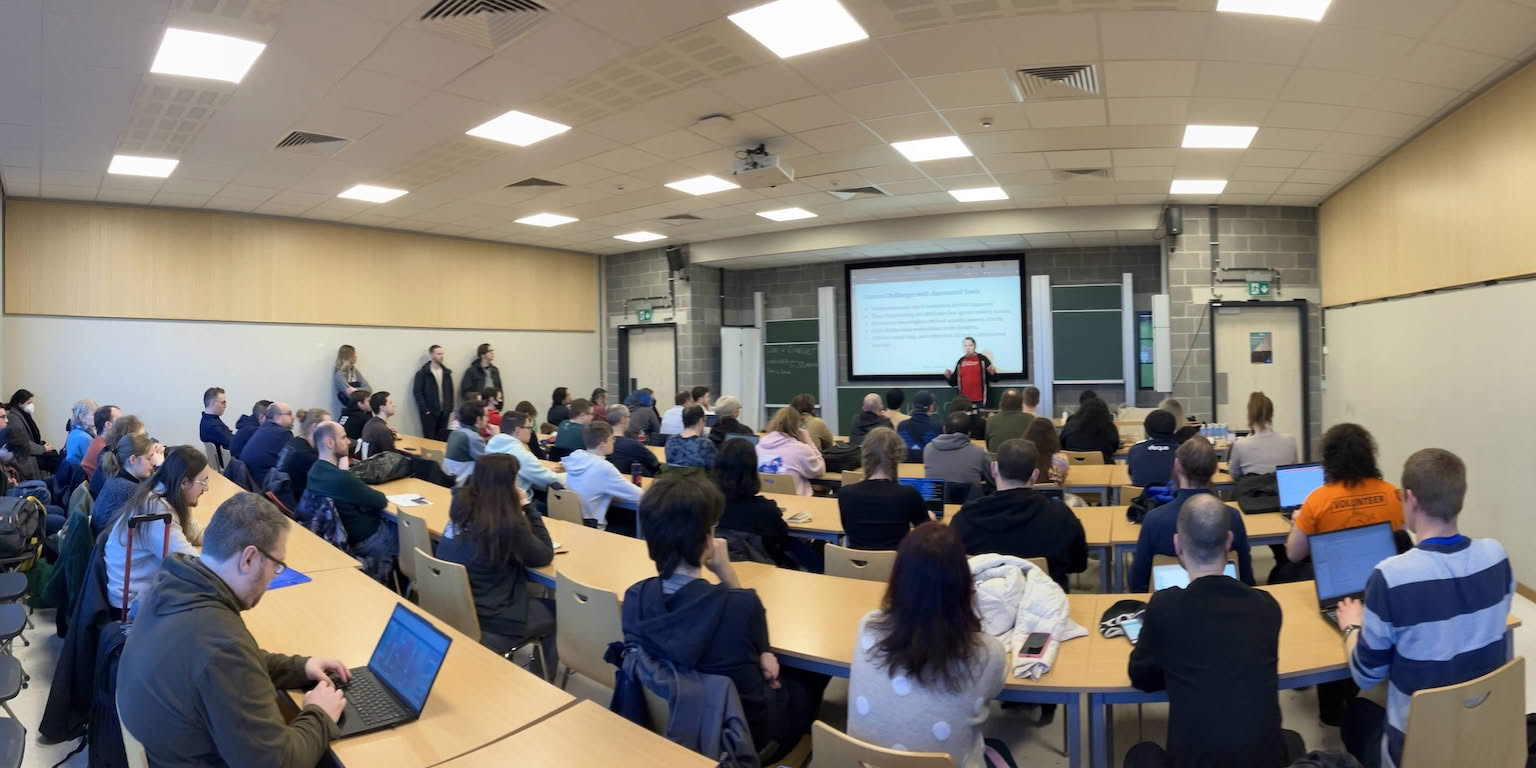
The room was full for most of the day with about 70 attendees, with the conference also providing a livestream for remote participants. We had a great mix of talks, covering a lot of the aspects of the Inclusive Web that we wanted to showcase.
The talks
Top Accessibility Errors Found in Open Source Through Automated Testing
In the first talk of the day, Raashi Saxena shares insights on the most common accessibility errors in open-source projects, based on manual and automated testing. She highlights real-world case studies to help developers improve accessibility in their projects – and warn against the legal risks of poor accessibility!
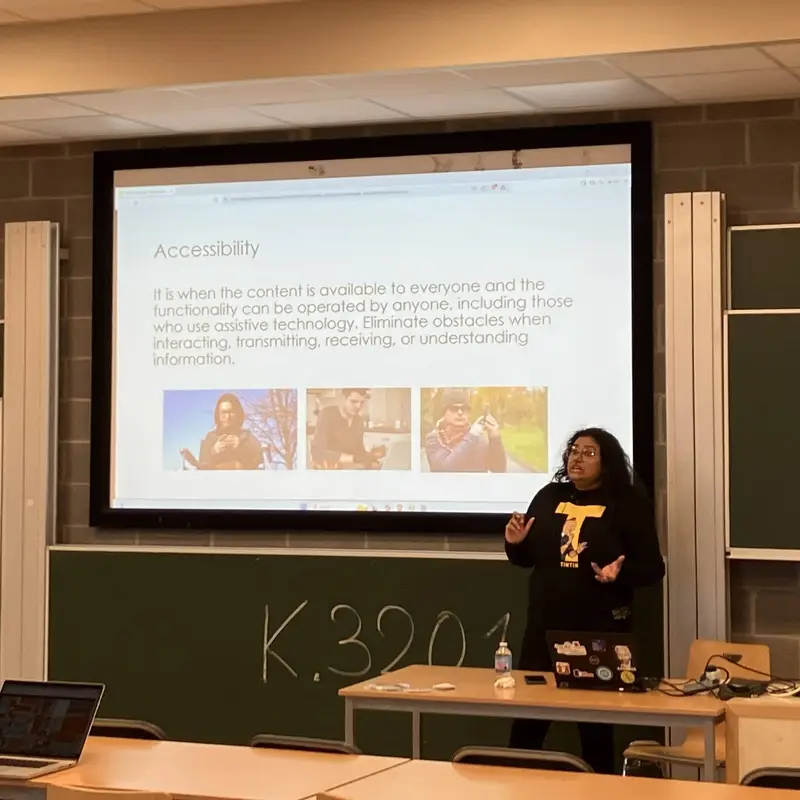
Solving the world’s (localization) problems
Eemeli Aro and Ujjwal Sharma introduce MessageFormat 2, a new standard to address long-standing localization challenges. They discuss its potential applications and the tools being built around it. This standard is very promising for Django developers working on multilingual applications to provide better translations for users, and better capabilities for translators.
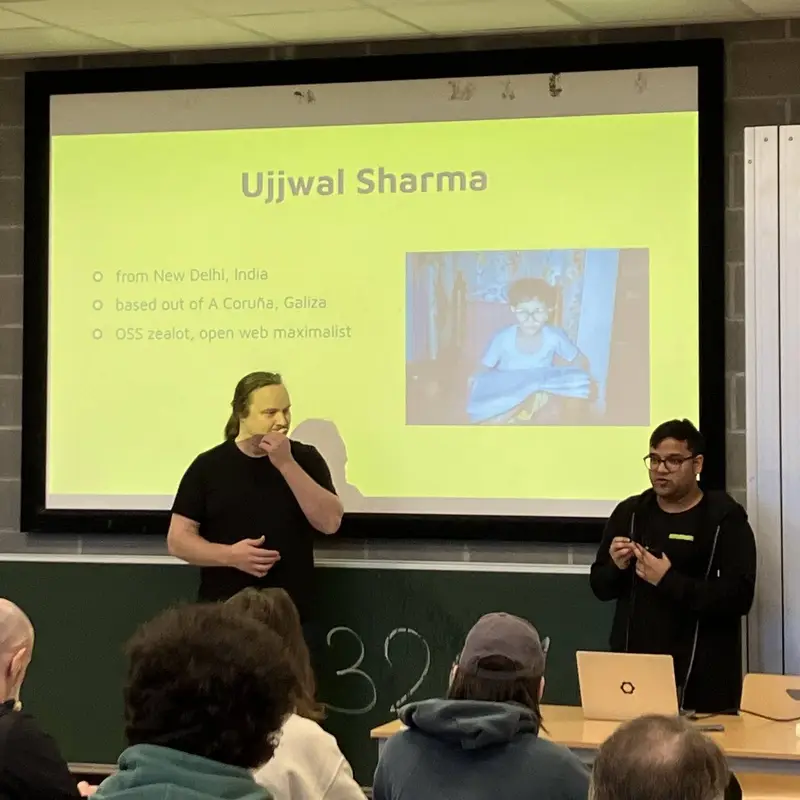
Alternative Text for Images: How Bad Are Our Alt-Text Anyway?
Mike Gifford explores the importance of alt text in web accessibility and how often it misses the mark. He demonstrates his alt text scan Python script for auditing alt-text across websites. Alt text is a common issue on Django projects, and the AI generation showcased by Mike has the potential to move the needle.
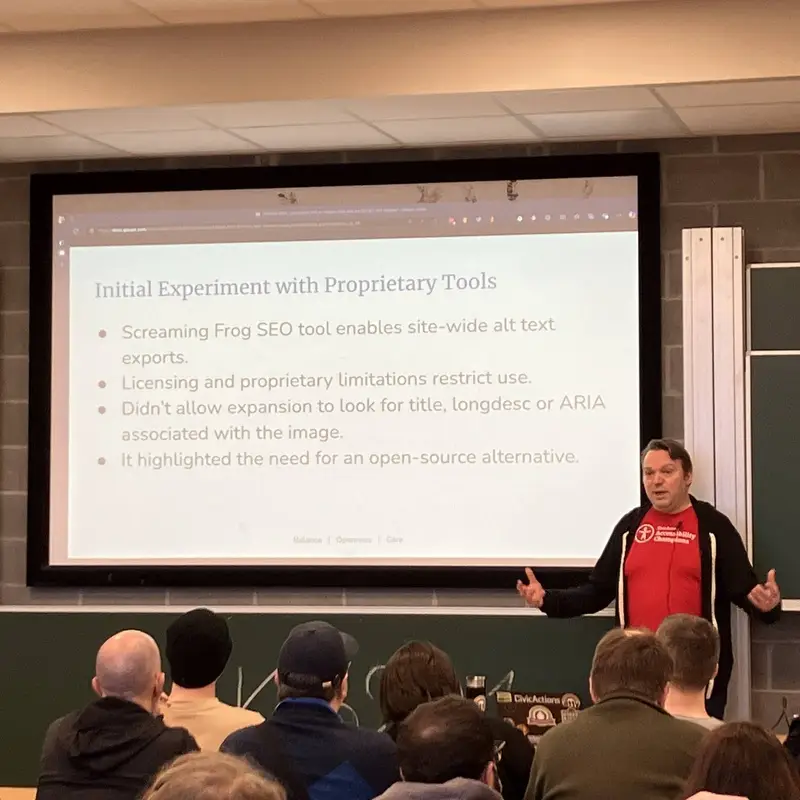
Secure and Inclusive: WebAuthn for (Multi-Factor) Authentication
Storm Heg explains how WebAuthn (Passkeys) offers a secure and user-friendly alternative to traditional authentication methods. This talk covers how it works, its accessibility benefits, and how Django developers can integrate it into their projects. Storm showcases his django-otp-webauthn package and other alternatives.
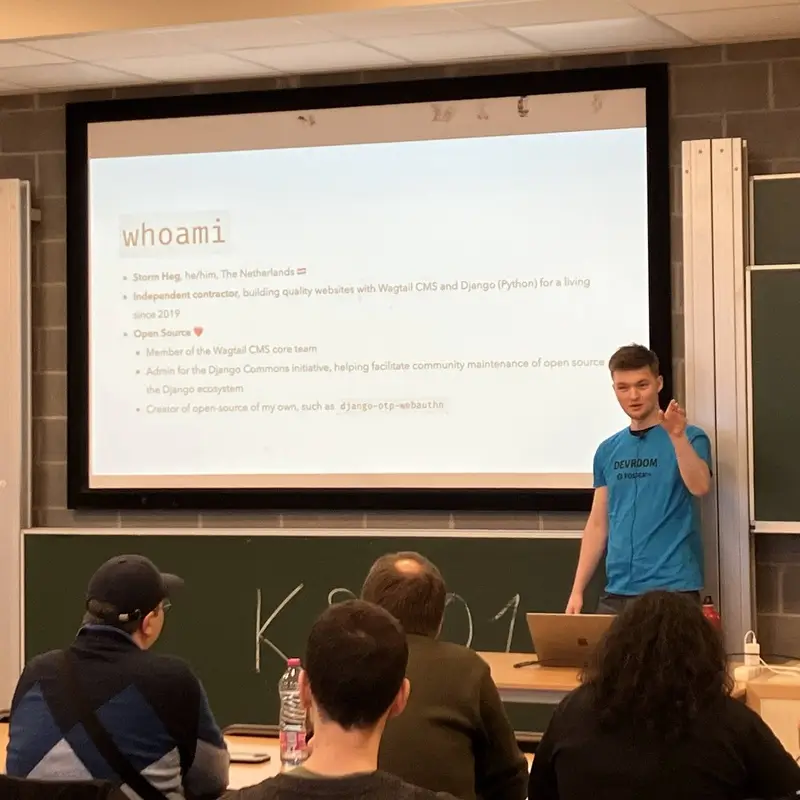
How do we work out the environmental savings from accessibility?
Chris Adams discusses how supporting older devices through accessible digital services can reduce e-waste. He explores research on hardware obsolescence, data-driven methods for measuring environmental impact, and policy changes in digital sustainability. This builds upon previous work by Chris showcasing the parallels between web accessibility and sustainability.
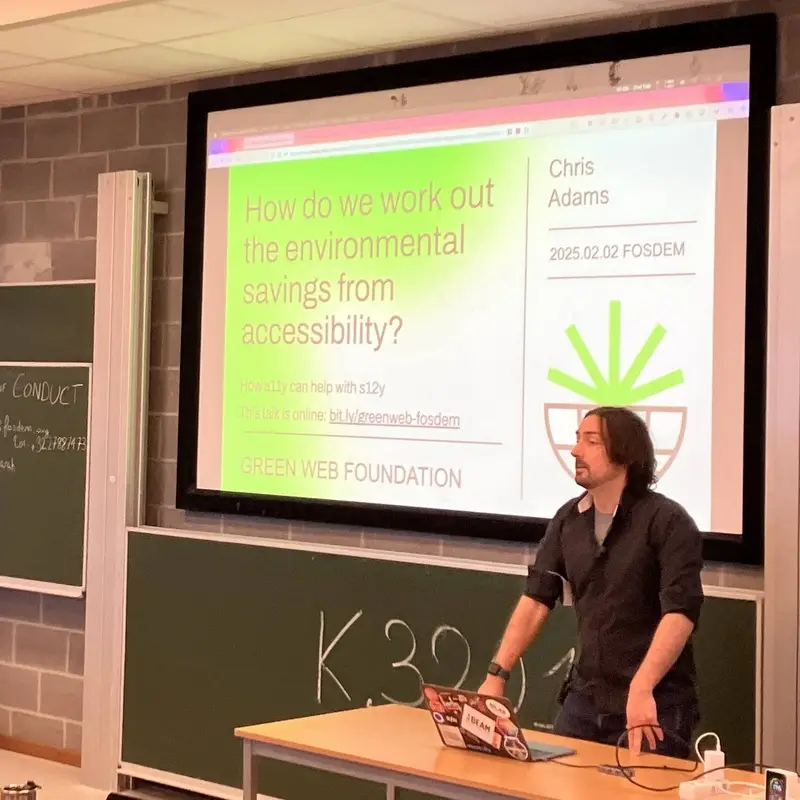
Growing inclusive communities: Djangonaut Space program
Raffaella Suardini shares the success of the Djangonaut Space mentorship program in fostering sustainable contributions and welcoming new contributors. She provides strategies for building inclusive tech communities, which are crucial to the success of open-source projects like Django 💜.
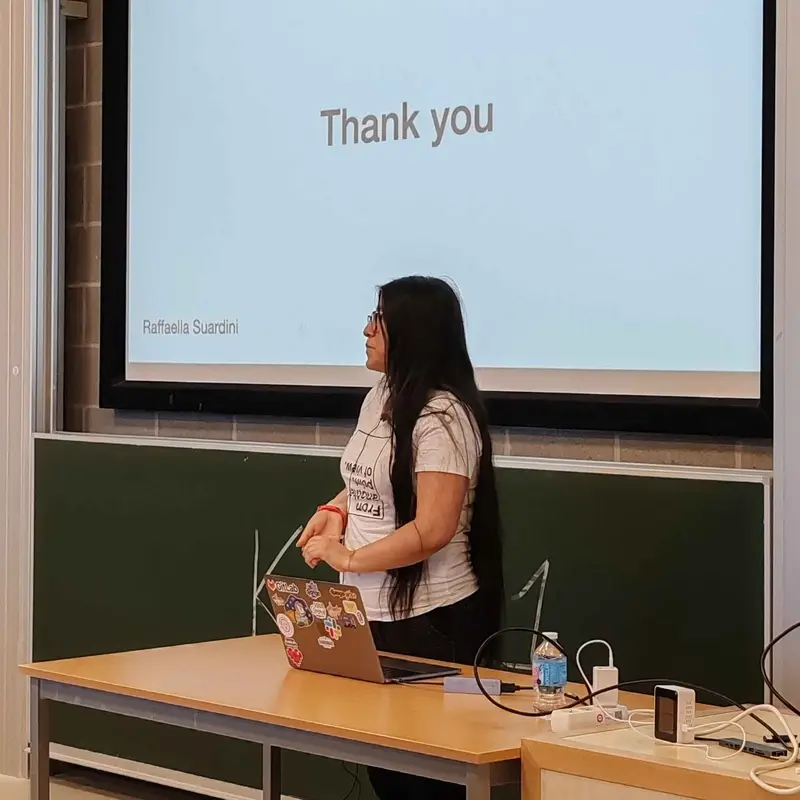
Multilingual Speech Technologies That Understand You
Jessica Rose discusses how Common Voice’s crowdsourced speech dataset helps developers build speech technologies for underrepresented languages. She highlights the challenges of linguistic diversity in tech – which are very relevant for a project with such an international and multiligual user base as Django.
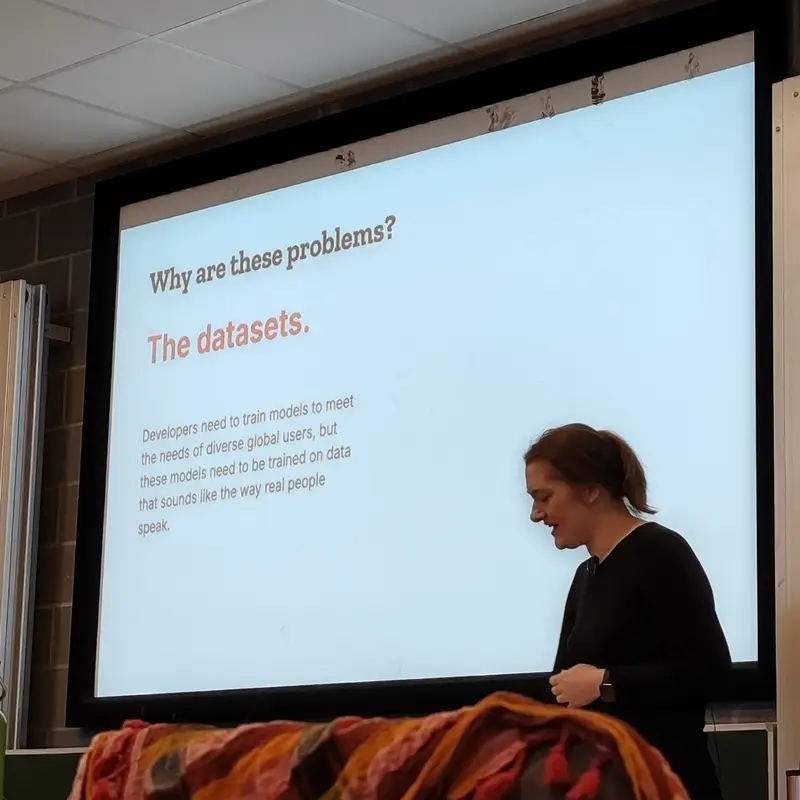
ATAG accessibility audits: worth your while
Thibaud Colas introduces the Authoring Tool Accessibility Guidelines (ATAG) and explains why they are essential for content creation tools, like the Django admin. He shares highlights of where projects can learn a lot from ATAG, making this talk valuable for Django developers working with content publishing.
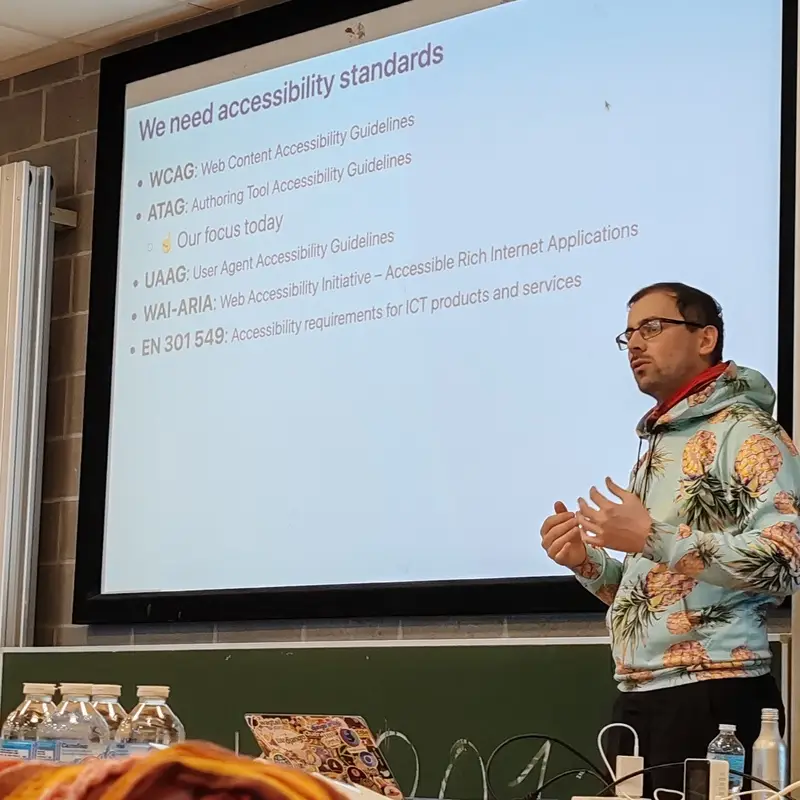
All recordings
You can watch them all on the FOSDEM website:
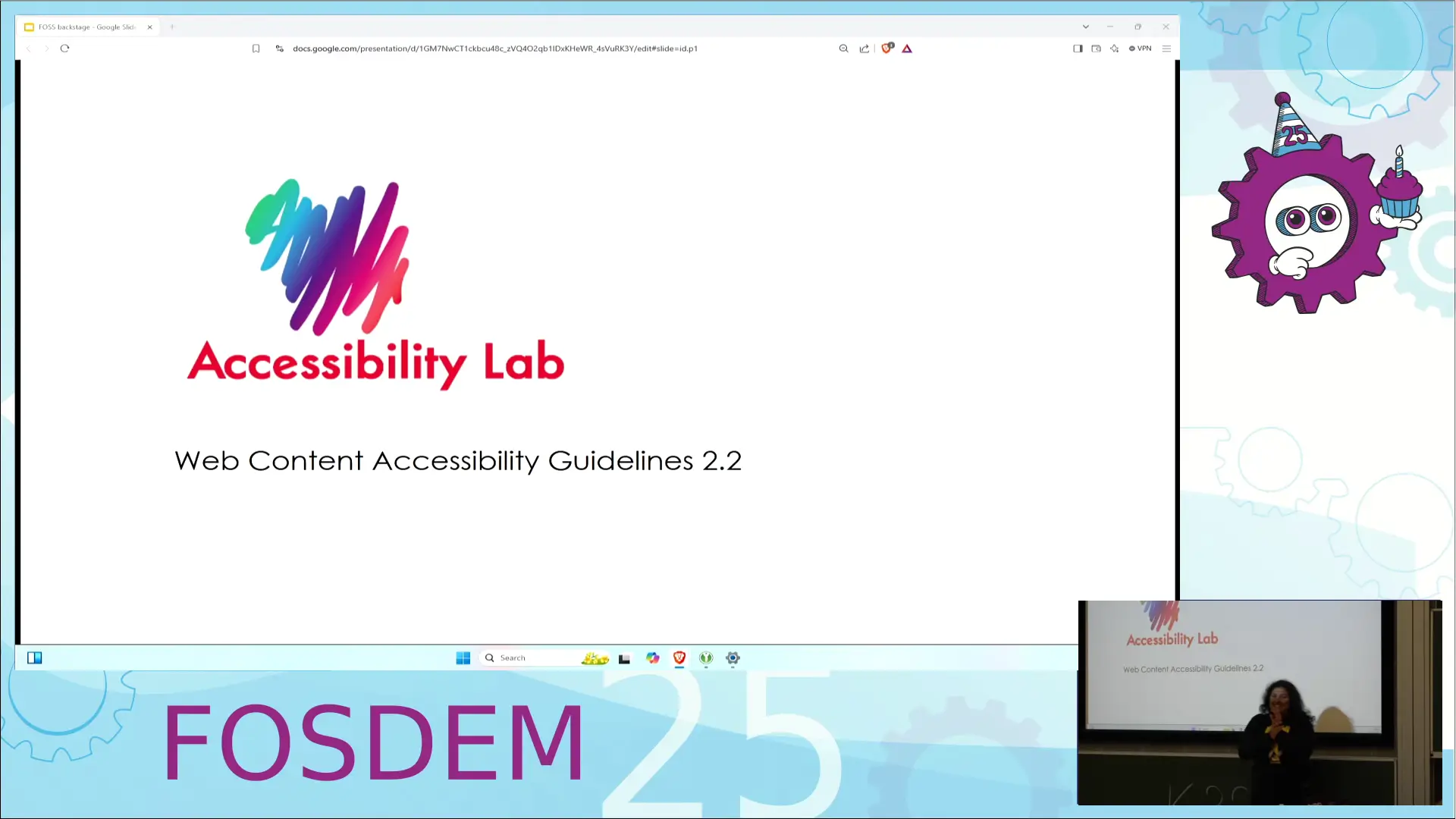
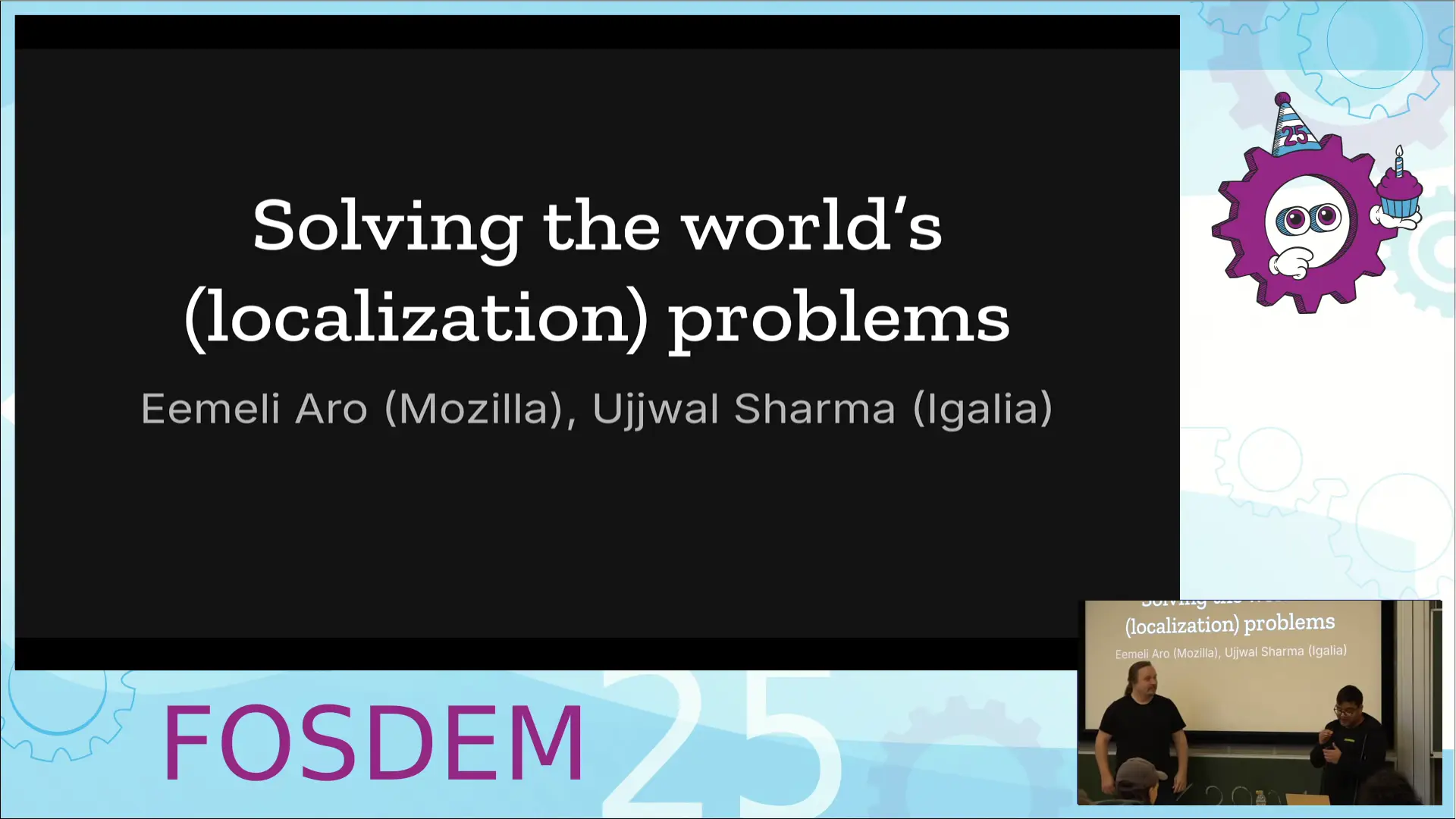
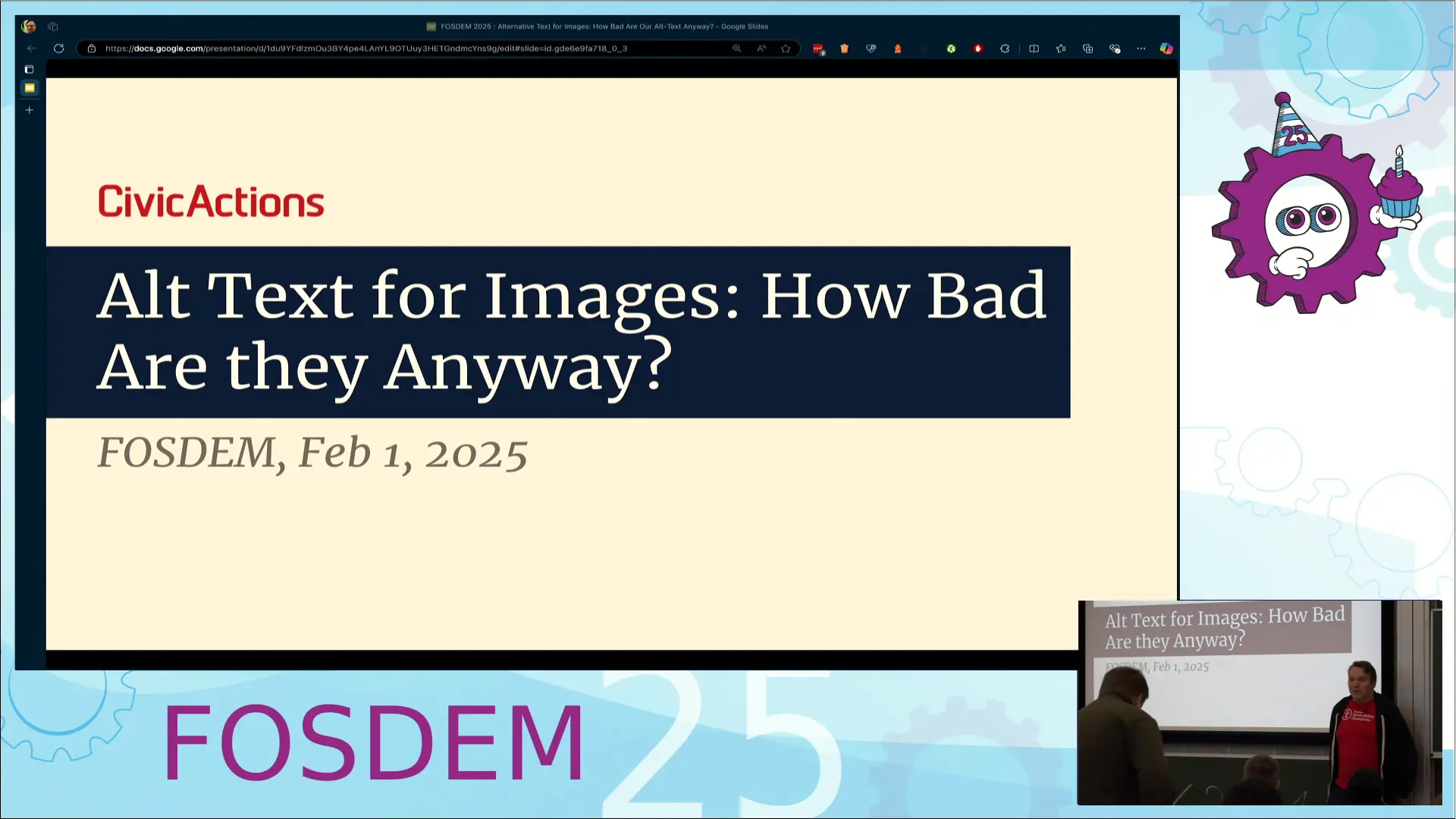
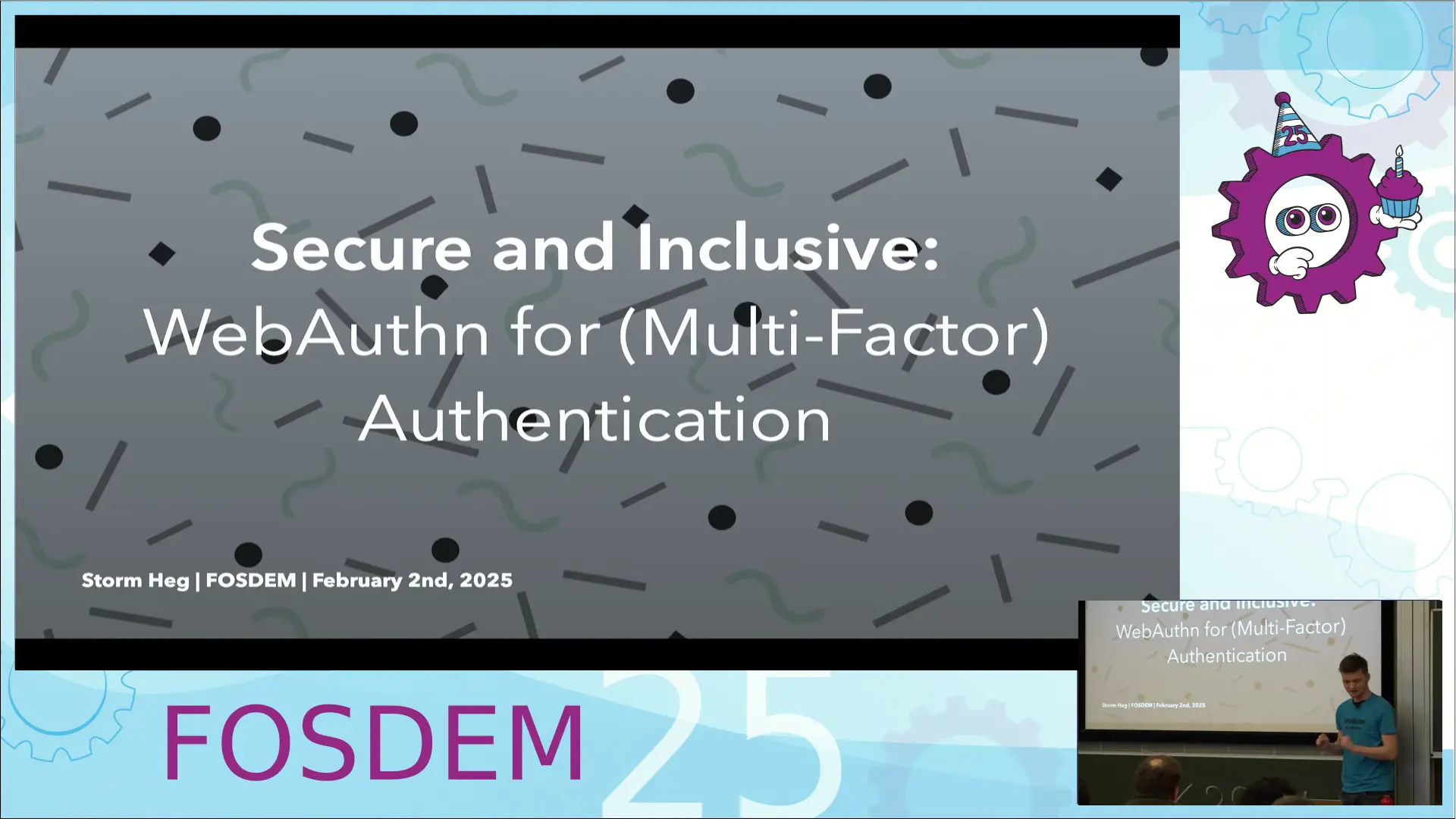

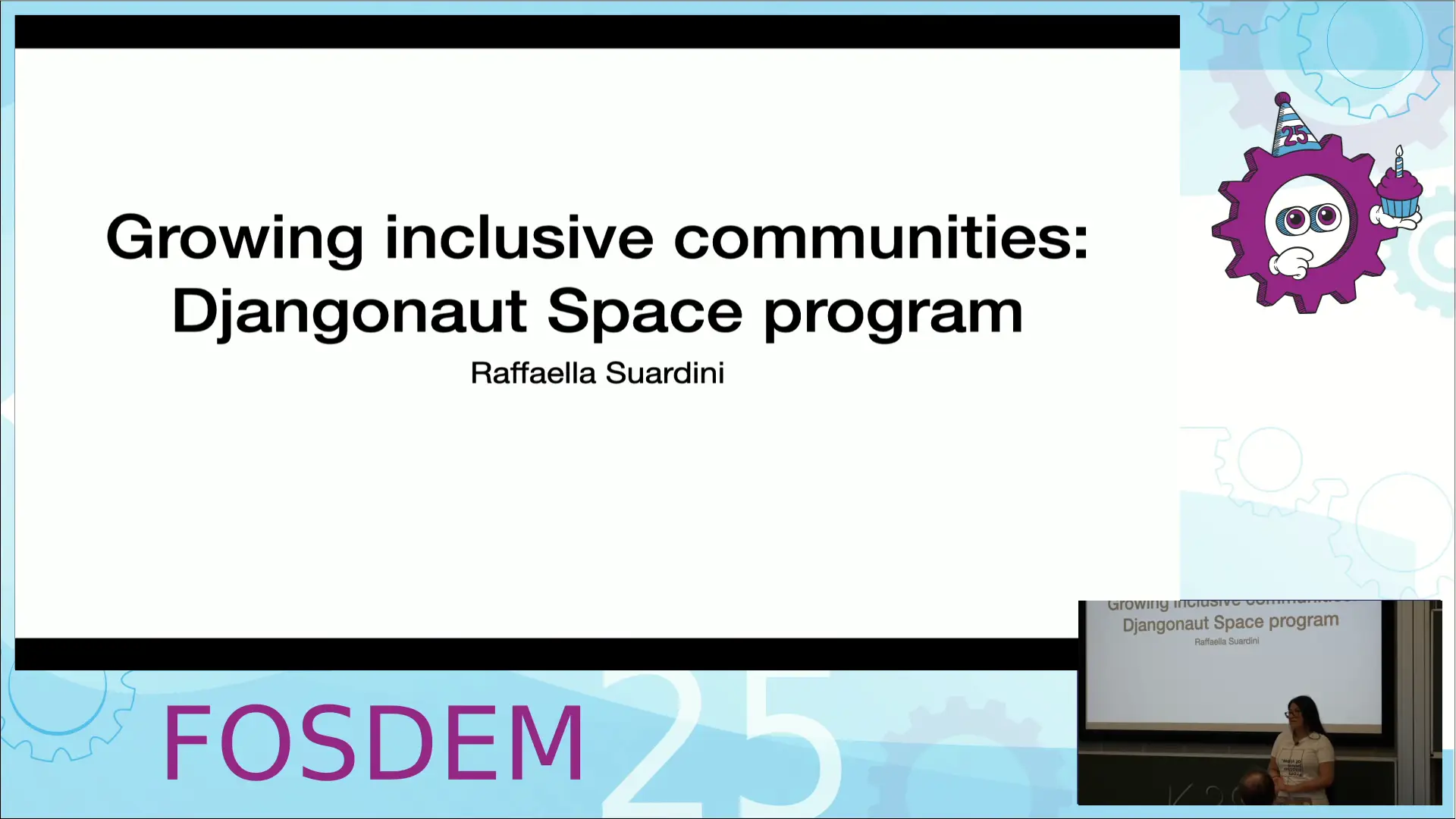
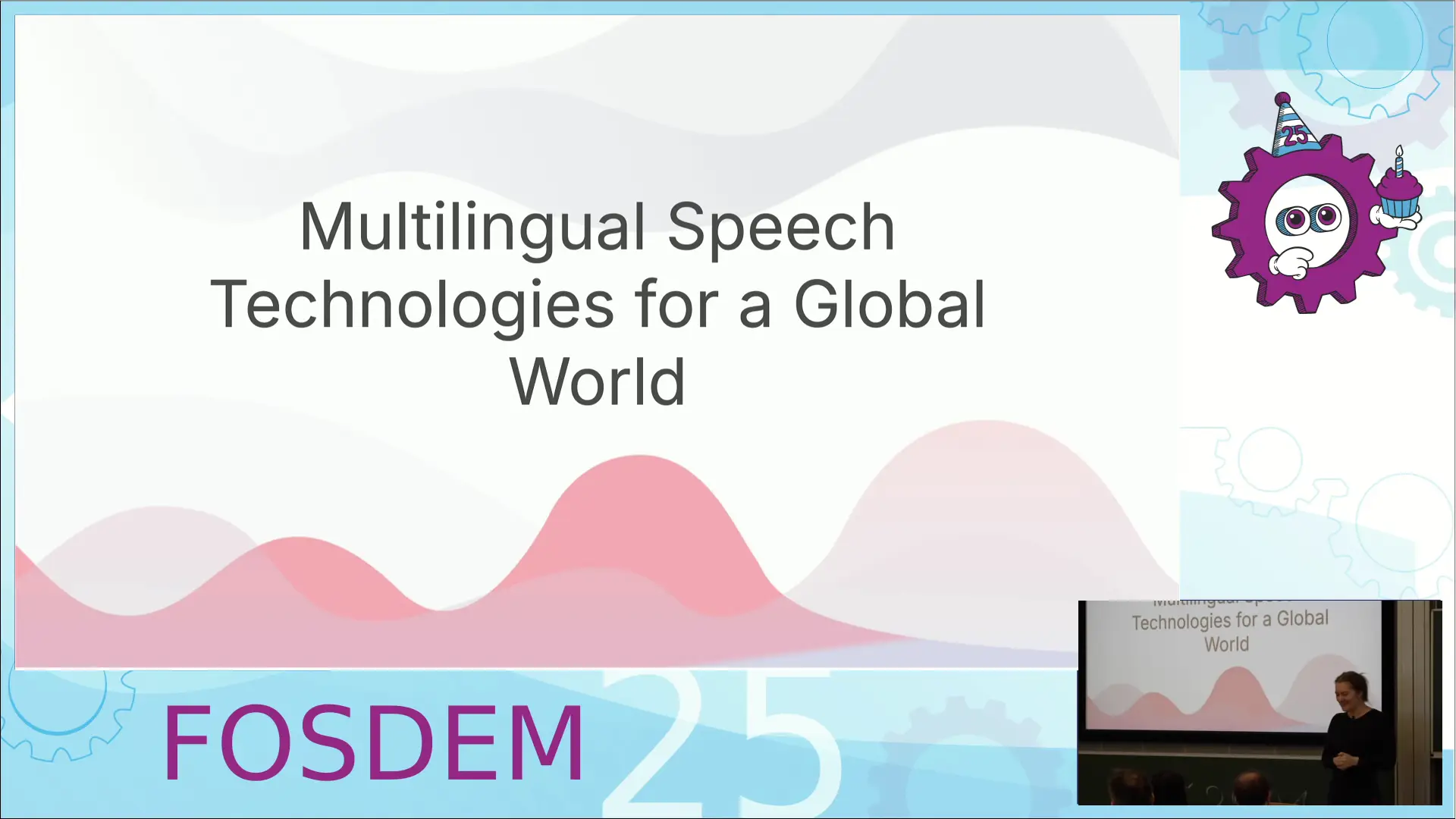
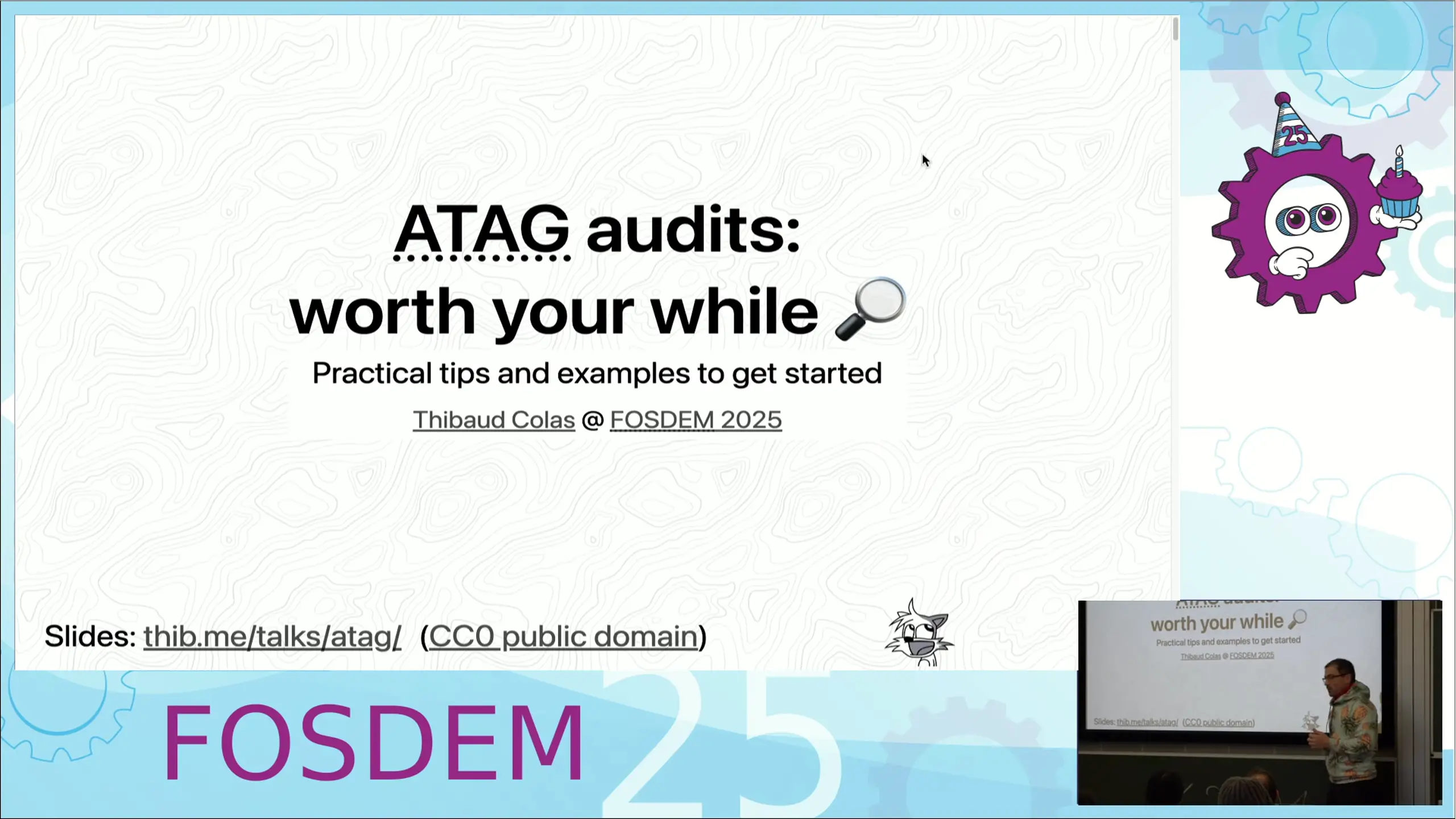
See you in 2026
We had a blast running this devroom, and we’re looking forward to doing it again in 2026 if we get the chance! Thank you to our speakers, devroom organizers (Saptak, Tom, Sarah, Thibaud, Eli), and helpers (Alex and Storm) for making this event a success! 🎉
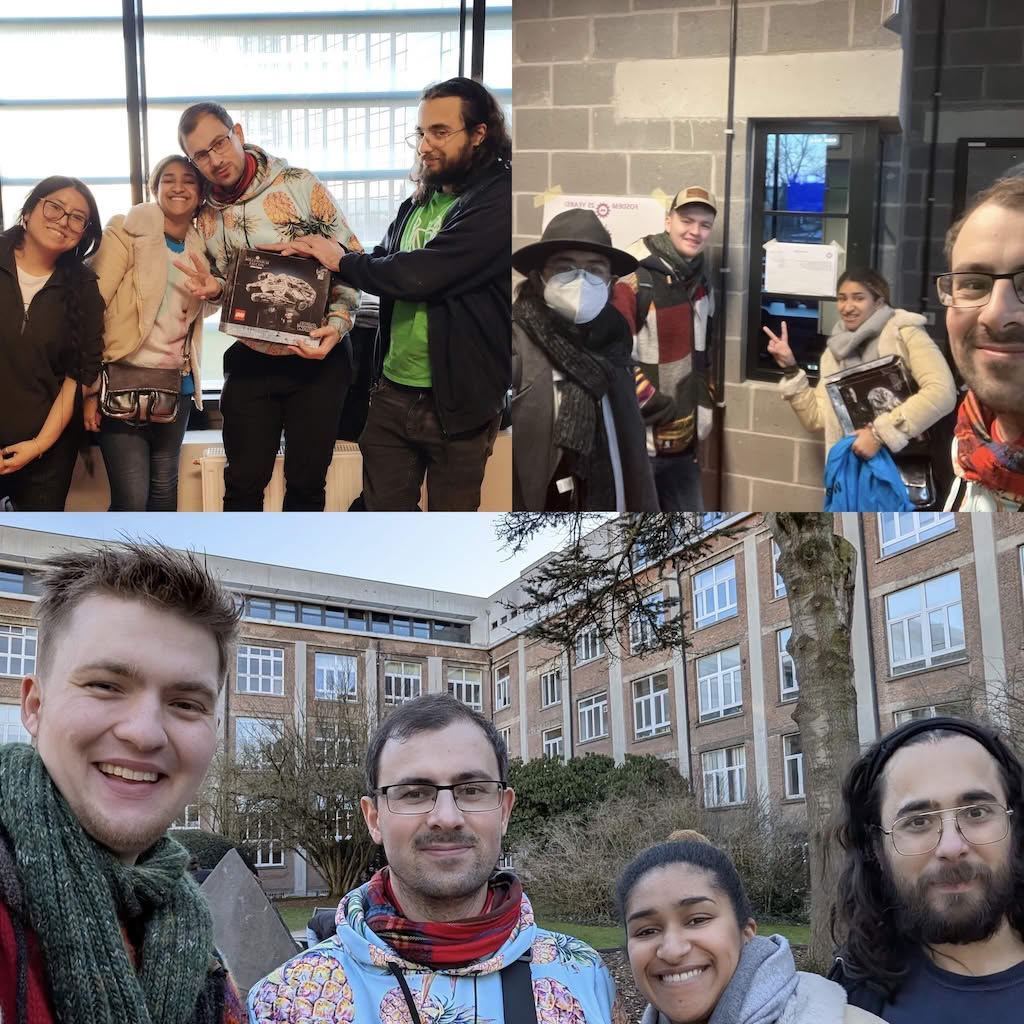
From The Django weblog at 2025-03-06 12:35:38
Django security releases issued: 5.1.7, 5.0.13 and 4.2.20
In accordance with our security release policy, the Django team is issuing releases for Django 5.1.7, Django 5.0.13 and Django 4.2.20. These releases address the security issues detailed below. We encourage all users of Django to upgrade as soon as possible.
CVE-2025-26699: Potential denial-of-service in django.utils.text.wrap()
The django.utils.text.wrap() and wordwrap template filter were subject to a potential denial-of-service attack when used with very long strings.
Thanks to sw0rd1ight for the report.
This issue has severity "moderate" according to the Django security policy.
Affected supported versions
- Django main
- Django 5.2 (currently at pre-release beta status)
- Django 5.1
- Django 5.0
- Django 4.2
Resolution
Patches to resolve the issue have been applied to Django's main, 5.2, 5.1, 5.0, and 4.2 branches. The patches may be obtained from the following changesets.
CVE-2025-26699: Potential denial-of-service in django.utils.text.wrap()
- On the main branch
- On the 5.2 branch
- On the 5.1 branch
- On the 5.0 branch
- On the 4.2 branch
The following releases have been issued
- Django 5.1.7 (download Django 5.1.7 | 5.1.7 checksums)
- Django 5.0.13 (download Django 5.0.13 | 5.0.13 checksums)
- Django 4.2.20 (download Django 4.2.20 | 4.2.20 checksums)
The PGP key ID used for this release is Sarah Boyce: 3955B19851EA96EF
General notes regarding security reporting
As always, we ask that potential security issues be reported via private email to security@djangoproject.com, and not via Django's Trac instance, nor via the Django Forum. Please see our security policies for further information.
From The Django weblog at 2025-02-24 09:05:03
Call for Proposals for DjangoCon Africa 2025 is now open!
The call for proposals for DjangoCon Africa 2025 is officially open! 💃🏻 Come be a part of this headline event by submitting a talk.
Submit a proposal for DjangoCon Africa 2025
Why speak at DjangoCon Africa
Simply put, it’s an excellent opportunity to put your ideas out there, share knowledge with fellow Djangonauts, and give back to our community. You get to reach both a passitonate local audience, and the global Django community once your talk is published online.
If you’re interested in our Opportunity Grants, being an approved speaker or tutorial presenter also puts you first in line to receive that.
What to cover
We’re looking for proposals from first-time speakers as well as veterans. We want talks (20 - 45 min), workshops and tutorials, (60 - 90 min), and also lightning talks (5 min). As far as topics, here are suggested ones:
- Django internals and challenges in modern web development.
- Wild ideas, clever hacks, surprising or cool use cases.
- Improving Django and Python developers’ lives.
- Pushing Django to its limits.
- The Django and Python community, culture, history, past, present & future, the why, the who and the what of it all.
- Security
- Emerging technologies and industries – AI, Blockchain, Open Source etc.
- Diversity, Equity and Inclusion
- Whatever you deem appropriate - it’s your conference after all
Ubuntu
In addition to Django, this year's edition will feature a new Pan-African open source event running alongside DjangoCon Africa - UbuCon at DjangoCon Africa!
We invite proposals on any of these topics, and more: Desktop, Cloud and Infrastructure, Linux Containers and Container Orchestration, DevOps, Virtualisation, Automation, Networking Windows Subsystem for Linux(WSL), IoT, Embedded, Robotics, Appliances, Packaging, Documentation, QA and Bug triage, Security, Compliance and Kernel, Data and AI, Video, Audio and Image editing, Open source tools, Community, Diversity, Local Outreach and Social Context.
I’m in! What do I do?
Great! 🤘 Go submit your proposal. You have until the end of March to do that but no need to wait – submit now and you can always edit the proposal later.
And if you’d like to increase your changes, make sure to review our Speaking at DjangoCon Africa 2025 documentation, and the Speakers resources.
Submit a proposal for DjangoCon Africa 2025
Not convinved yet? Check out our Connections that count: Reflecting on DjangoCon Africa 2023 in Zanzibar to hear from our 2023 participants on what the conference meant for them.
From The Django weblog at 2025-02-19 07:55:07
Django 5.2 beta 1 is now available. It represents the second stage in the 5.2 release cycle and is an opportunity for you to try out the changes coming in Django 5.2.
Django 5.2 brings a composite of new features which you can read about in the in-development 5.2 release notes.
Only bugs in new features and regressions from earlier versions of Django will be fixed between now and the 5.2 final release. Translations will be updated following the "string freeze", which occurs when the release candidate is issued. The current release schedule calls for a release candidate in a month from now, and a final release to follow about two weeks after that, scheduled for April 2nd.
Early and frequent testing from the community will help minimize the number of bugs in the release. Updates on the release schedule are available on the Django forum.
As with all alpha and beta packages, this is not for production use. But if you'd like to take some of the new features for a spin, or to help find and fix bugs (which should be reported to the issue tracker), you can grab a copy of the beta package from our downloads page or on PyPI.
The PGP key ID used for this release is Sarah Boyce: 3955B19851EA96EF
From The Django weblog at 2025-02-14 22:12:10
DjangoCongress JP 2025 Announcement and Live Streaming!
DjangoCongress JP 2025, to be held on Saturday, February 22, 2025 at 10 am (Japan Standard Time), will be broadcast live!
It will be streamed on the following YouTube Live channels:
This year there will be talks not only about Django, but also about FastAPI and other asynchronous web topics. There will also be talks on Django core development, Django Software Foundation (DSF) governance, and other topics from around the world. Simultaneous translation will be provided in both English and Japanese.
Schedule
ROOM1
- DRFを少しずつオニオンアーキテクチャに寄せていく
- The Async Django ORM: Where Is it?
- FastAPIの現場から
- Speed at Scale for Django Web Applications
- Django NinjaによるAPI開発の効率化とリプレースの実践
- Implementing Agentic AI Solutions in Django from scratch
- Diving into DSF governance: past, present and future
ROOM2
- 生成AIでDjangoアプリが作れるのかどうか(FastAPIでもやってみよう)
- DXにおけるDjangoの部分的利用
- できる!Djangoテスト(2025)
- Djangoにおける複数ユーザー種別認証の設計アプローチ
- Getting Knowledge from Django Hits: Using Grafana and Prometheus
- Culture Eats Strategy for Breakfast: Why Psychological Safety Matters in Open Source
- µDjango. The next step in the evolution of asynchronous microservices technology.
A public viewing of the event will also be held in Tokyo. A reception will also be held, so please check the following connpass page if you plan to attend.
Registration (connpass page): DjangoCongress JP 2025パブリックビューイング
From The Django weblog at 2025-02-11 04:51:31
DSF member of the month - Lily Foote
For February 2025, we welcome Lily Foote (@lilyf) as our DSF member of the month! ⭐
Lily Foote is a contributor to Django core for many years, especially on the ORM. She is currently a member of the Django 6.x Steering Council and she has been a DSF member since March 2021.
You can learn more about Lily by visiting her GitHub profile.
Let’s spend some time getting to know Lily better!
Can you tell us a little about yourself (hobbies, education, etc)
My name is Lily Foote and I’ve been contributing to Django for most of my career. I’ve also recently got into Rust and I’m excited about using Rust in Python projects. When I’m not programming, I love hiking, climbing and dancing (Ceilidh)! I also really enjoying playing board games and role playing games (e.g. Dungeons and Dragons).
How did you start using Django?
I’d taught myself Python in my final year at university by doing Project Euler problems and then decided I wanted to learn how to make a website. Django was the first Python web framework I looked at and it worked really well for me.
What other framework do you know and if there is anything you would like to have in Django if you had magical powers?
I’ve done a small amount with Flask and FastAPI. More than any new features, I think the thing that I’d most like to see is more long-term contributors to spread the work of keeping Django awesome.
What projects are you working on now?
The side project I’m most excited about is Django Rusty Templates, which is a re-implementation of Django’s templating language in Rust.
Which Django libraries are your favorite (core or 3rd party)?
The ORM of course!
What are the top three things in Django that you like?
Django Conferences, the mentorship programme Djangonaut Space and the whole community!
You have been a mentor multiple times with GSoC and Djangonaut Space program, what is required according to you to be a good mentor?
I think being willing to invest time is really important. Checking in with your mentees frequently and being an early reviewer of their work. I think this helps keep their motivation up and allows for small corrections early on.
Any advice for future contributors?
Start small and as you get more familiar with Django and the process of contributing you can take on bigger issues. Also be patient with reviewers – Django has high standards, but is mostly maintained by volunteers with limited time.
You are now part of the Steering Council, congratulations again! Do you have any words to share related to that?
Yes! It’s a huge honour! Since January, we’ve been meeting weekly and it feels like we’ve hardly scratched the surface of what we want to achieve. The biggest thing we’re trying to tackle is how to improve the contribution experience – especially evaluating new feature ideas – without draining everyone’s time and energy.
You have a lot of knowledge in the Django ORM, how did you start to contribute to this part?
I added the Greatest and Least expressions in Django 1.9, with the support of one of the core team at the time. After that, I kept showing up (especially at conference sprints) and finding a new thing to tackle.
Is there anything else you’d like to say?
Thanks for having me on!
Thank you for doing the interview, Lily!
From The Django weblog at 2025-02-05 12:00:00
Django bugfix releases issued: 5.1.6, 5.0.12, and 4.2.19
Today we've issued 5.1.6, 5.0.12, and 4.2.19 bugfix releases.
The release package and checksums are available from our downloads page, as well as from the Python Package Index. The PGP key ID used for this release is Natalia Bidart: 2EE82A8D9470983E.
From The Django weblog at 2025-01-23 22:20:00
Djangonaut Space - New session 2025
We are thrilled to announce that Djangonaut Space, a mentorship program, is open for applicants for our next cohort! 🚀
Djangonaut Space is holding a fourth session! This session will start on February 17th, 2025. We are currently accepting applications until January 29th, 2025 Anywhere on Earth. More details can be found in the website.
Djangonaut Space is a free, 8-week group mentoring program where individuals will work self-paced in a semi-structured learning environment. It seeks to help members of the community who wish to level up their current Django code contributions and potentially take on leadership roles in Django in the future.
“I'm so grateful to have been a part of the Djangonaut Space program. It's a wonderfully warm, diverse, and welcoming space, and the perfect place to get started with Django contributions. The community is full of bright, talented individuals who are making time to help and guide others, which is truly a joy to experience. Before Djangonaut Space, I felt as though I wasn't the kind of person who could become a Django contributor; now I feel like I found a place where I belong.” - Eliana, Djangonaut Session 1
Enthusiastic about contributing to Django but wondering what we have in store for you? No worries, we have got you covered! 🤝
From The Django weblog at 2025-01-19 20:30:00
Django earns the CHAOSS DEI Bronze badge 🫶
We’re excited to announce that Django has been awarded the CHAOSS Diversity, Equity, and Inclusion (DEI) Bronze Badge!
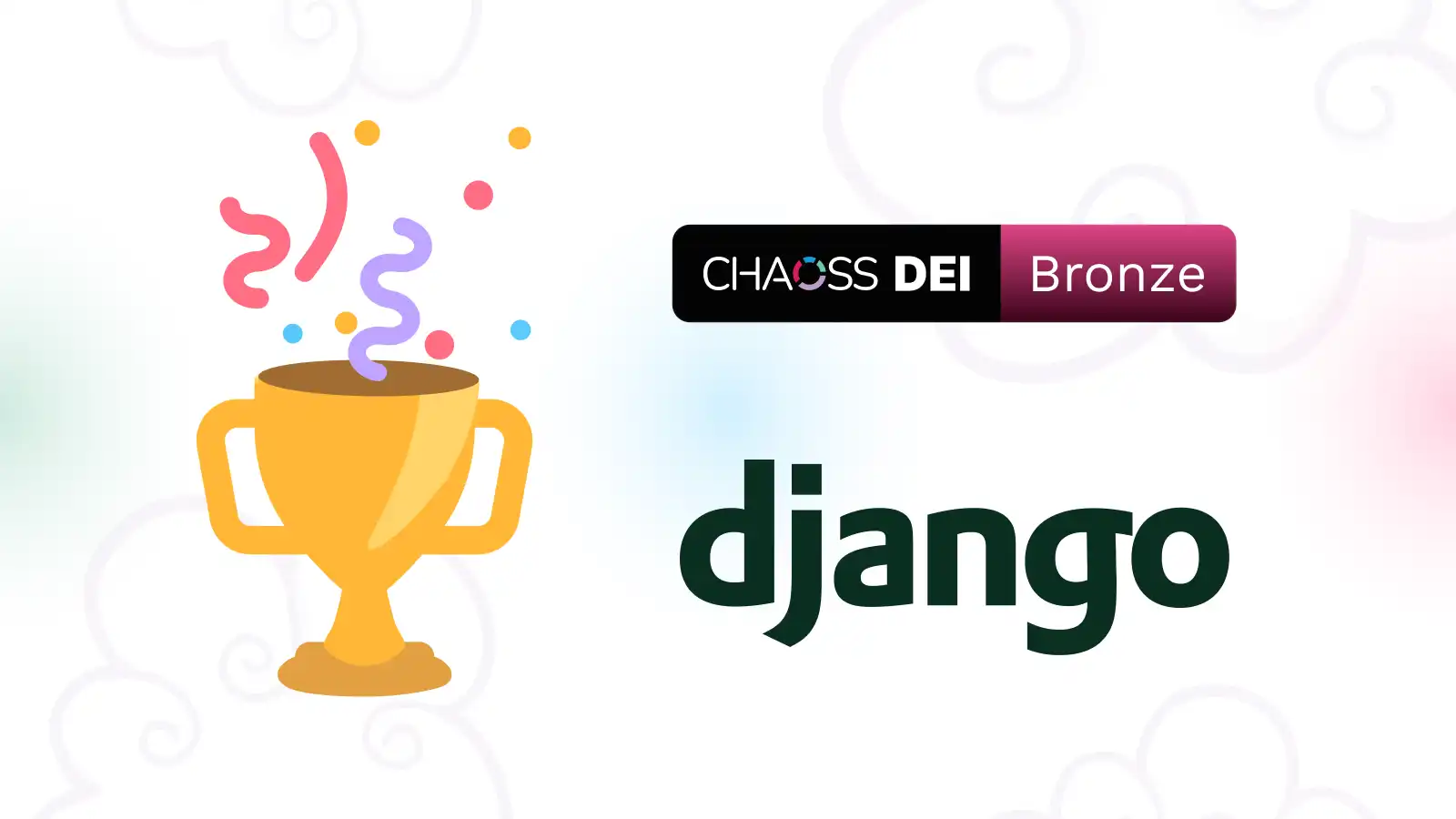
This badge reflects our ongoing commitment to fostering a diverse, equitable, and inclusive community for all Djangonauts. It’s part of the CHAOSS DEI Project Badging initiative.
Our new Diversity, Equity, and Inclusion Project Statement details all the ways in which we want to create an environment where everyone can participate and thrive, and complements our pre-existing Django Community Diversity Statement. From inclusive leadership structures to Django events, we strive to ensure our community is welcoming, transparent, and supportive.
Thank you to everyone in the Django community who contributes to making our project inclusive, accessible, and welcoming 🫶. Thank you to Sarah Boyce, who led the work for us to be awarded this badge as part of . We view this milestone as part of a continuous journey for our project and community to improve, and look forward to building an even more vibrant and supportive community together.
From The Django weblog at 2025-01-16 12:00:00
Hello from the new Steering Council; and a quick temporary voting process change
Hello Django community! The Steering Council is officially in action and we want to give you a heads up on a change we're making for the short-term.
The process for formal Steering Council votes (documented in DEP 10) has not been working. It's our goal for the community to refresh Django's governance during the upcoming release cycle. In order to allow us to move forward now, and under supervision of the DSF Board, we are suspending use of the +1, 0, -1 public voting system in cases where a Steering Council consensus clearly exists. Instead, we will deliberate internally, summarize our opinions, and share that publicly (location and full details TBD).
We hope that this allows us to move faster on the smaller things we have in front of us currently. We appreciate all of your patience and look forward to what we all do together!
-- The Django Steering Council: Carlton, Emma, Frank, Lilly, and Tim
From The Django weblog at 2025-01-16 06:15:00
Django 5.2 alpha 1 is now available. It represents the first stage in the 5.2 release cycle and is an opportunity for you to try out the changes coming in Django 5.2.
Django 5.2 brings a composite of new features which you can read about in the in-development 5.2 release notes.
This alpha milestone marks the feature freeze. The current release schedule calls for a beta release in about a month and a release candidate about a month from then. We'll only be able to keep this schedule if we get early and often testing from the community. Updates on the release schedule are available on the Django forum.
As with all alpha and beta packages, this is not for production use. But if you'd like to take some of the new features for a spin, or to help find and fix bugs (which should be reported to the issue tracker), you can grab a copy of the alpha package from our downloads page or on PyPI.
The PGP key ID used for this release is Sarah Boyce: 3955B19851EA96EF
From The Django weblog at 2025-01-14 14:00:00
Django security releases issued: 5.1.5, 5.0.11, and 4.2.18
In accordance with our security release policy, the Django team is issuing releases for Django 5.1.5, Django 5.0.11, and Django 4.2.18. These releases address the security issues detailed below. We encourage all users of Django to upgrade as soon as possible.
CVE-2024-56374: Potential denial-of-service vulnerability in IPv6 validation
Lack of upper bound limit enforcement in strings passed when performing IPv6 validation could lead to a potential denial-of-service attack. The undocumented and private functions clean_ipv6_address and is_valid_ipv6_address were vulnerable, as was the django.forms.GenericIPAddressField form field, which has now been updated to define a max_length of 39 characters.
The django.db.models.GenericIPAddressField model field was not affected.
Thanks to Saravana Kumar for the report.
This issue has severity "moderate" according to the Django security policy.
Affected supported versions
- Django main
- Django 5.1
- Django 5.0
- Django 4.2
Resolution
Patches to resolve the issue have been applied to Django's main, 5.1, 5.0, and 4.2 branches. The patches may be obtained from the following changesets.
CVE-2024-56374: Potential denial-of-service vulnerability in IPv6 validation
- On the main branch
- On the 5.1 branch
- On the 5.0 branch
- On the 4.2 branch
The following releases have been issued
- Django 5.1.5 (download Django 5.1.5 | 5.1.5 checksums)
- Django 5.0.11 (download Django 5.0.11 | 5.0.11 checksums)
- Django 4.2.18 (download Django 4.2.18 | 4.2.18 checksums)
The PGP key ID used for this release is Natalia Bidart: 2EE82A8D9470983E
General notes regarding security reporting
As always, we ask that potential security issues be reported via private email to security@djangoproject.com, and not via Django's Trac instance, nor via the Django Forum, nor via the django-developers list. Please see our security policies for further information.
From The Django weblog at 2025-01-09 00:43:00
DSF member of the month - Hiroki Kiyohara
This month marks the start of a new year, and the Django Software Foundation would like to wish you all a very happy new year. New year, new resolutions, but also the start of a new blog post series, with DSF members presented each month through an interview. A great way to learn more about the people behind Django, recognized for their contribution to the DSF mission.
For January 2025, we welcome Hiroki Kiyohara (@hirokiky) as our DSF member of the month! ⭐
Hiroki is the creator and a staff member of DjangoCongress JP. The CFP is still open!
He has done a lot for the Django Japan community which exist for many years and he has been a DSF member since October 2024.
You can learn more about Hiroki by checking out his website or visiting Hiroki’s GitHub Profile.
Let’s spend some time getting to know Hiroki better!
Can you tell us a little about yourself (hobbies, education, etc)
My name is Hiroki Kiyohara and I am the CEO of an AI Startup named ZenProducts. I like techno music, cars, drinking and VRChat!
How did you start using Django?
I started learning Python around 2010 after reading an essay "How to become a Hacker", which had a big impact on my life. I created a web service using Django, which has been a great project since then.
What other framework do you know and if there is anything you would like to have in Django if you had magical powers?
One thing I wanted to include in Django was an asynchronous worker, but it was already discussed as a future plan!
What projects are you working on now?
We are developing Shodo (https://shodo.ink/), an AI proofreading service for Japanese texts. The AI we developed in-house (by using transformers lib) and the server are all in Python. Of course we use Django with Async!
Which Django libraries are your favorite (core or 3rd party)?
We often use django-storages, DjangoRestFramework and pytest-django
What are the top three things in Django that you like?
Admin, Migration and ORM, and the last thing is the community (i.e. you!)
What made you decide to create DjangoCongress JP? Do you have any advice for someone who would like to create a local Django conference?
There was PyCon JP, but as Python became more widely used in different areas, there were fewer Django and web talks. So we created a Django-only event so that we could cover in-depth stuff.
I think if there is 1 person to join, you can start your event. Not just a big conference, we can create a community.
Do you have a quote or proverb in Japanese that you personally love?
I love 色即是空. It means that form is emptiness. So everything is not an absolute object or form and everything can be changed and something like flow. I also love "The times they are a changin’" by Bob Dylan. Both of them gave us a great perspective on the world.
Is there anything else you’d like to say?
I'm very glad to be here, thank you!
Thank you for doing the interview, Hiroki!
From The Django weblog at 2024-12-24 14:00:00
Welcome to our new Django accessibility team members - Eli, Marijke, Saptak, Tushar
Sarah Abderemane, Thibaud Colas and Tom Carrick are pleased to introduce four new members in the Django Accessibility team ❤️.
Marijke (pronounced Mah-Rye-Kuh) is a freelance web developer who creates human-friendly applications. She is based in Groningen, The Netherlands, specializing in Django, Python, HTML, SCSS, and vanilla JavaScript. She helps companies expand their existing projects, think about new features, train new developers, and improve developer team workflows. She is aDdjango contributor from the first session of Djangonaut Space program and she loves tea. You can learn more about Marijke on her website.
Eli is a full-stack developer from Uruguay who loves using Django and React. She is a Django contributor from the first session of the Djangonaut Space program. She is passionate about good quality code, unit testing, and web accessibility. She enjoys drinking Maté (and talking about it!) and watching her football team play.
Tushar is a software engineer at Canonical, based in India. He got involved on open source during his studies loving the the supportive community. Through fellowships like Major League Hacking, Tushar dove into Django and took part in Djangonaut Space. Learn more about Tushar on his personal website.
Saptak is a self-proclaimed Human Rights Centered Developer Web. He focuses on security, privacy, accessibility, localization, and other human rights associated with websites that makes websites more inclusive and usable by everyone. Learn more about Saptak on his personal website.
Listen to them talking about their work¶
Here are recent talks or podcasts from our new team members if you want to get to know them better.




What’s next¶
In truth, our four new accessibility team members joined the team months ago – shortly after we published our 2023 accessibility team report. Up next, a lot of the team will be present at FOSDEM 2025, organizing, volunteering, or speaking at the Inclusive Web Devroom.
From The Django weblog at 2024-12-18 19:38:28
Django 6.x Steering Council Election Results
The Steering Council for the Django 6.x release cycle will be:
- Carlton Gibson
- Emma Delescolle
- Frank Wiles
- Lily Foote
- Tim Schilling
Voting breakdown:
- 400 eligible voters
- 215 votes received (54%)
We had 400 eligible voters, and received 215 votes (54%). See the full voting breakdown on RankedVote.
Congratulations to the new council members! And thank you to all 12 candidates who stood for election, and everyone who took part in the voting.
—
For anyone looking for further opportunities to have their say on the future of Django, consider submitting our 2024 Django Developers survey, closing in 3 days.
From The Django weblog at 2024-12-11 02:00:00
Django 6.x Steering Council Candidates
Thank you to the 12 individuals who have chosen to stand for election. This page contains their candidate statements submitted as part of the Django 6.x Steering Council elections.
To our departing Steering Council members, Adam Johnson, Andrew Godwin, James Bennett, Simon Charette – thank you for your contributions to Django and its governance ❤️.
Those eligible to vote in this election will receive information on how to vote shortly. Please check for an email with the subject line “Django 6.x Steering Council Voting”. Voting will be open until 23:59 on December 17, 2024 Anywhere on Earth.
Any questions? Reach out via email to foundation@djangoproject.com.
All candidate statements ¶
To make it simpler to review all statements, here they are as a list of links. Voters: please take a moment to read all statements before voting!
- Andrew Miller (he/him) — Cambridge, UK
- Carlton Gibson (he/him) — Spain
- Emma Delescolle (she/her) — Belgium
- Frank Wiles (he/him) — Lawrence, Kansas, USA
- Jake Howard (he/him) — UK
- Lily Foote (she/her) — United Kingdom
- Mark Walker — Chester, UK
- Ryan Cheley (he/him) — California, US
- Ryan Hiebert —
- Sage Abdullah (he/him) — Jakarta, Indonesia / Bristol, UK
- Tim Graham — Philadelphia, PA USA
- Tim Schilling (he/him) — United States
Andrew Miller (he/him) Cambridge, UK ¶
Hi there, for those that haven’t come across me yet, I’m very active on the Discord, joining a couple of years ago, I serve as a moderator and generally helping out. I have also authored a Working Group proposal that is almost ready to go live, pending Board approval. Finally I organise the monthly Django Social in Cambridge.
However perhaps what is most relevant to my nomination for the Steering Council are the blog posts I have written this year. They have been short & snappy where I have prodded and explained different aspects of using Django, the contributing process and other aspects of the community.
I am nominating myself for the Steering Council to ensure that Django has a secure future. Personally I have used Django for the last 12 years and it has been integral to my software engineering career. The last two and half years have been the best in terms of getting involved in the community and has increased my passion for improving Django itself and seeing it have a future beyond my personal usage.
While there is energy in the community, the technical vision has stagnated and needs a reboot. As Django is about to celebrate it’s 20th birthday, I want to see Django celebrate it’s 30th & 40th birthday’s and still be relevant to the world of web development. But what does that mean for us now as a community and how to do we ensure that future? In short I believe the next Steering Council needs to experiment with a range of ideas and gauge the community reaction to them. These ideas will form the first iteration of processes that future Steering Council’s can progress and mature.
To me these ideas need to focus on the following high level goals:
- Transparency & Consistency of communication
- Clearer, simpler Governance
- Vision of where Django could be in 10 or 20 years from now.
- Strengthening the community through teams that provides growth for each and every member
Each of these goals have plenty of actionable items… for example:
- Communication: Coordinate with the Board to recognise the work of the wider ecosystem of packages on the website and in other resources.
- Governance: Deeply examine the DEP process, simplify it where needed so we can normalise the process of writing a DEP to be closer to Forum post.
- Vision: Identify potential landmark features for the 6.X release cycle and beyond. Even propose what features might be in the Django 11.X cycle (10 years time).
- Teams: Start to create career tracks within the community, this would include Djangonaut space, Google Summer of Code, existing teams and new teams yet to be formed.
Do I expect this next Steering Council to achieve all of these goals above in one go? While these goals are idealistic, I expect this next Council to lay the foundations for futures Council’s to thrive and creating the on-ramps for a larger vibrant community of Djangonauts, ensuring the Django’s future is bright and secure.
Feel free to reach out to me if you have further questions about anything above.
Carlton Gibson (he/him) Spain ¶
I'm running for the Steering Council to help push Django forward over the 6.x release cycle.
We’re at an exciting time for the framework. There’s a whole fresh wave of new contributors keen to experiment. I think we should lean into that. My particular interest here is in helping to support, promote, and leverage the third party ecosystem better that we have done. I wrote at some length on that in my recent Thoughts on Django’s Core, if you’d like the details.
Beyond that, I want to help our mentoring effort. There’s a big gap between starting to contribute and staying to maintain. We’ve got all the resources we need to turn the new generation of Django’s contributors into its next generation of maintainers. That’s where I increasingly see my time and focus being spent over the coming years.
I was unsure whether to run for election or not. Whilst I was never part of the old Django Core, as a former Fellow, and maintainer of packages such DRF, django-filter, and crispy forms, I’m certainly towards the older-guard side of things, that we’ve heard much about in recent posts. We’re at a delicate time. With the governance updates needed, I feel that I still have lots to offer, and can be helpful in advancing those. As I say, I think we’re at an exciting time for the framework. I’d be honoured to serve if chosen.
Emma Delescolle (she/her) Belgium ¶
For a longer version of this statement you can read this post on my blog
For a video on similar topics, you can watch my recent Djangonaut Space session on YouTube
As a member of the Django community for the past 10 years, I've had the privilege of witnessing firsthand the project's growth and evolution.
Over the decade, I've seen many exciting changes and improvements that have shaped Django into the powerful tool it is today. However, I've also noticed a gradual slowing down of this evolution in recent years.
I have also benefited from said growth and Django's reliability and stability as I have been running a business who's main activity revolves around Django for that same amount of years. Whether it be creating, reviewing, maintaining or updating software. My application to the steering council is one of the ways in which I can give back to the community.
With my candidacy as a member of the Django Steering Council, I want to highlight my focus on ensuring Django remains relevant and sustainable for the next 20 years.
Lowering the barrier to contribution and involving a more diverse set of contributors
Most code contributions merged into Django are bug fixes or cleanups. I believe this trend is not due to an unusual abundance of bugs within the project but rather due to an unsustainable barrier to contributing new features or code improvements. Contributing to Django requires a significant amount of time, mental energy and effort, which can be discouraging to most. And often, those who have bit the bullet and gone through it once do not go through it a second or third time.
Myself and others have noted, more or less recently, that the process of contributing code to Django, including but not limited to DEPs, is daunting. The words "brutal" and "bureaucratic" have been used by myself and others to describe the process.
If elected, I aim to identify areas that hinder effective code contributions to Django and work towards simplifying the process of contributing code to the project; while keeping the right balance to also protect the time, energy and sanity of the Fellows and the review team.
Dealing with the realities of an aging code-base
As Django approaches its 20th anniversary, it's essential to acknowledge the aging code-base and technical debt accumulated over time. My goal is to initiate a review process of the existing code-base, carefully evaluating technical debt and identifying areas where improvements can be made without disrupting existing functionality.
Missing batteries and deadlines
One of the core principles of Django has always been its commitment to being a "batteries included" framework. However, in recent years, I've noticed that many of these essential features and tools have remained stagnant, without new additions or replacements emerging to support the evolving needs of our community.
Furthermore, the third-party application ecosystem that was once thriving and a jewel of the community, has become harder and harder to navigate and discover. It has also become more time-consuming for developers to have to evaluate a large set of third-party applications to solve a specific need.
As a member of the steering council I would like to work on bringing better visibility and discoverability of those 3rd-party packages and evaluate whether any such package should be brought into Django, either Django core or a spiritual successor to
contribor some other way. Some packages that come to mind aredjango-csp,django-corsanddjango-upgradebut this is in no way an exhaustive list.Feature requests and Roadmap
I plan to use my position to champion "feature requests" – a critical aspect of the council's role that has never been utilized to this date. Feature requests being also a key part in being able to set a roadmap for Django and provide guidance to potential contributors on where to get started on their journey.
Code ownership and groups
My belief is that, as an unexpected side-effect of the dissolution of the core team and the high barrier to contribution, expertise in specific areas of Django has begun to erode. However, it can be regained through targeted efforts. People involved in the aforementioned code review process would be perfect candidates for these roles, as they'd already have taken a deep dive in thoroughly understanding specific areas of the framework.
Moreover, frequent contributors to an area of the framework are often well-positioned to take on a leading role in "owning" that part of the project. However, this implies recurring contributions to said area. I believe that we need to find ways to incentivize people to become area specialists. Which brings us back to need for lowering the barrier to contribution.
More generally, I think that the project can benefit from those specialized groups, starting with an ORM group.
Closing thoughts
I believe that everything listed here can technically be achieved during the 6.x cycle if I'm elected but... things take time in the Django world. So, I don't want to over-promise either.
Frank Wiles (he/him) Lawrence, Kansas, USA ¶
The community does a really great job of reaching consensus post-BDFLs but occasionally decisions do need to be made and a direction chosen.
I would like to think my long history with Django and my wide and varied use of it as a consultant gives me a unique perspective not just as a consumer of Django but as a manager/executive helping others to make decisions around how and when to use Django. The decisions that are made impact many people and organizations in sometimes subtle and non-obviously ways. I have a ton of skin in this particular game personally.
Django has been a huge part of what has driven my career and I would be honored to help steer for a bit.
Jake Howard (he/him) UK ¶
For those who don't know me, I've been using Django professionally for almost a decade, spending over half of that focusing on performance and security. I'm also on the Core team for Wagtail CMS.
Django has a great reputation for being "batteries included" and for "perfectionists", however that reputation is starting to age. Now, people think of Django and clunky, slow, and only useful for building big monoliths. Many developers choose leaner frameworks, and end up having to re-implement Django's batteries themselves, instead of starting with Django and focusing on building their application.
For Django to progress, it needs to recharge its batteries. The ticket backlog, as well as many developer's dreams are filled with great feature ideas just looking for a little push in the right direction. Not just the big features like 2FA, Background Tasks or even type hints, but also quality of life improvements to templates, views or even the user model. To achieve this, it requires more than just code - it takes people.
From personal experience, I've seen the friction from trying to add even small features to Django, and the mountains to climb to contribute large features. To encourage new contributors, that needs to change - just because it's the way it's always been, doesn't mean it has to continue. Django is a big, complex, highly depended on project, but that doesn't mean it needs to move at a snail's pace for everything, nor does every contribution need to be 100% perfect first time. Open source projects are built on passion, which is built up over time but destroyed in seconds. By fostering and enabling that passion, the Django contributor community can flourish.
By the time Django hits 7.0, I'd love to see it more modern, more sustainable, and living up to the ideas we all have for it.
Lily Foote (she/her) United Kingdom ¶
Hi! I'm Lily and I've been a contributor to Django for about a decade, mainly working on the ORM. My biggest contributions were adding check constraints and db_default. I've also contributed as a mentor within the Django Community. I was a navigator for the pilot of Djangonaut Space (and a backup navigator in following sessions) and a Google Summer of Code mentor for the Composite Primary Keys project. I also joined the triage and review team in 2023.
As a member of the Steering Council I want to enable more people to contribute to the Django codebase and surrounding projects. I think in recent years there has been too much friction in getting a change to Django agreed. I have seen several forum threads fail to gain consensus and I've experienced this frustration myself too. I also think the DEP process needs an overhaul to make creating a DEP much easier and significantly less intimidating, making it easier to move from a forum discussion to a decision when otherwise the status quo of doing nothing would win.
I believe a more proactive Steering Council will enable more proposals to move forward and I look forward to being a part of this. I will bring my years of experience of the Django codebase and processes to the Steering Council to provide the technical leadership we need.
Mark Walker Chester, UK ¶
I'm running for the Steering Council so that I might be able to help others. I wouldn’t be in the position I am today without someone very helpful on StackOverflow many years ago who took the time to help me with my first endeavour with python.
Over the years I’ve strived to help others in their journey with python & django, an aim aided by becoming a navigator for djangonaut space and the technical lead of the Django CMS Association. Through all of this I’ve acted as a facilitator to help people both professionally and in open source, something which ties in with discussions going on about the SC being the facilitator for the continued growth of the Django community and framework itself.
Ryan Cheley (he/him) California, US ¶
Hello, I’m Ryan Cheley and I’ve decided to stand for the Django 6.x Steering Council.
My journey with the Django community began in March 2022 when I started contributing pull requests to DjangoPackages. My initial contributions quickly led to deeper involvement, and I was grateful and honored to be asked to be a maintainer following DjangoCon US 2022.
At the DjangoCon US 2022 Sprints, I worked on a SQLite-related bug in Django's ORM. This proved so valuable that I was was able to give a talk about my experience at DjangoCon US 2023, where I delivered my talk “Contributing to Django or How I learned to stop worrying and just try to fix a bug in the ORM”.
Building on this experience, I returned to DCUS 2024 to present on “Error Culture” where I took a deep dive into the widespread but often overlooked issue of how organizations manage error alerts in technology and programming domains.
My commitment to the Django ecosystem extends beyond code contributions. I've served as a Navigator for two sessions of Djangonaut Space, helping guide newcomers through their first contributions to Django. This role has allowed me to give back to the community while developing my mentorship skills.
As one of the admins for Django Commons I work with some amazing folks to help provide an organization that works to improve the maintainer experience.
Additionally, I've made various contributions to Django Core, including both code improvements and documentation enhancements.
Throughout my involvement with Django, I've consistently shown a commitment to both technical excellence and community building. My experience spans coding, documentation, mentorship, and public speaking, reflecting my holistic approach to contributing to the Django ecosystem.
My focus will be in creating sustainable and inclusive leadership structures. This would, in turn, not only provide help and support for current Django leadership, but also develop and empower future leaders.
The avenues to meet these goals include gathering diverse candidates, providing mentorship opportunities, clearly communicating expectations, and removing financial barriers to participation.
As a member of the Django Steering Council (SC) for the 6.x series, I hope to be able to accomplish the following with my fellow SC Members:
- Establish a governance structure that allows the SC to be successful going forward by:
- Providing Mentorship for future potential SC members from the Community
- Reviewing the 18-month requirements for eligibility for SC
- Communicating the expectations for SC role in Community
- Working to increase the diversity of those that are willing and able to stand for the SC in the 7.x series and going forward
- Collaborate with Working Groups to
- ease burden of fellows in a meaningful way via the Fellowship Working Group
- work with Social Media Working Group to promote new or upcoming features
- Write up weekly / monthly reports, similar to the fellows reports
- Work with the Django Software Foundation(DSF) Board to establish a stipend for 7.x SC members going forward to support their work and allow more diverse participation
- Implement a road map for Django drawing input and inspiration from the Community, specifically from these sources
- Adam G Hill post
- Thibaud Colas Forum post
- Paolo Melichiore post
- Timo Zimmerman post
- Roadmap work from early 2024
- Work on and complete a DEPs to
- Remove Dead Batteries, similar to Python PEP 594
- Determine the long term viability of Trac, research alternatives, and come up with triggers that would lead to a migration if/when necessary.
- Review and approve or reject all current draft DEPs
The Django community has done so much for me. I’m hoping that with my involvement on the Steering Council I’m able to work to do my part to ensure the long term success and viability of the Django community and leave it in a better place than I found it.
Ryan Hiebert ¶
I've worked professionally with Django and Python for the past 13 years. I've mostly lurked on the mailing lists and forums, but I have been around maintaining some smaller projects, most notably among them being django-safemigrate, aldjemy, hirefire, tox-travis, and backports.csv. I had the privilege of giving a talk at DjangoCon 2024 about Passkeys and Django.
Django has excelled in three areas. We take a batteries-included approach that empowers new developers, we have strong community governance, and we are conservative about the changes we make to maintain stability. These have been critical to Django's success, but the combination has made it challenging for Django to keep up with the changing technology landscape.
To allow Django meet the changing needs of our users both now and for the future, we need to think carefully about the important parts of each of those priorities, and tune the tension between them to allow the Django community to thrive.
Django should transition away from including batteries directly, and toward enabling add-on batteries. We should favor proposals that empower interoperability between a variety of third party batteries (e.g. the Background Workers DEP), and disfavor proposals that wish to bless a particular solution in core, no matter how wonderful the solution is (e.g. HTMX).
Django should be encouraging work that aims to expose third-party packages in our official documentation and communication channels, especially those that implement core interoperability interfaces. This will make room for new ideas and more approaches.
Django should seek to make a clear boundary around a smaller core where our preference for stability is the more important factor in empowering our diverse community.
Django should favor changes that bring it into alignment with Python community standards. It should favor this even over the "one way to do it" principle. By encouraging using Python standards, Django will better meet its responsibility as an entryway for new Python developers to be better equipped to grow in Python generally. For example, Django could encourage using appropriate standards in the pyproject.toml over extending Django-centric idioms like adding to the settings.py.
Django should encourage proposals that seek to lower the footprint of a new project. Projects like Nanodjango should inspire us to make starting with Django trivial and minimal, and make each step a newcomer might take to grow be as small as possible, so they only need to meet only the challenges required by the work they are needing to do.
Django should favor proposals to begin to include correct types, even to the point of carefully making any necessary breaking changes to help make the types correct and usable.
The DSF should, when financially feasible, fund non-core batteries that can empower the community. It may be appropriate for the DSF to make some requirements about the necessary governance required of these projects in order to qualify for funding.
The Steering Council should strongly consider recommending changes to its decision making process to make it more feasible to make and reverse decisions as it faces new challenges. Stability is maintained by active, careful, and persistent effort, not indecision.
By making decisions with these principles in mind, we can help our community maintain the root of our goals: A stable community-governed base, empowering a diverse community that excels in the fast-paced world of web development, and being a gateway for new developers.
Sage Abdullah (he/him) Jakarta, Indonesia / Bristol, UK ¶
Django's best strength is that it's built by its community – but that's also a weakness. The reality of a project of Django's scale that's been around for so long, and has so many contributors, is that making substantial changes becomes increasingly difficult. You may have heard talks about how daunting it can be to get a PR merged into Django, or how hard it is to get a feature accepted.
It doesn't have to be that way.
In 2019, I added the cross-database JSONField as part of Google Summer of Code (GSoC). Many of Django's big features have come from GSoC, and some of the contributors stay involved in the community – this year, I became a GSoC mentor for Django. As a core team member of Wagtail (a Django-based CMS), I have seen the same pattern with our participations in such outreach programs. Django can do a lot more in making community contributions more accessible and sustainable, and I think I can help.
Here's what I think the steering council should do:
- Organize a living roadmap for Django. Rather than waiting for a DEP to be proposed and acted on, the steering council should actively help the community in highlighting issues and feature requests that are high priority or most wanted.
- Maximize the potential of mentorship programs. With a roadmap in place, the steering council could help find mentors and contributors who can take on the work. Programs like GSoC, Djangonaut Space, or other initiatives can flourish if we connect the ideas with the right people.
- Communicate and document progress. To allow continuous feedback and improvement, the steering council should engage with the community and document the progress of their activities, as well as the current state of Django.
Django is at a turning point. It's time for the steering council to take a more active role with the community in shaping the future of Django, and I believe I can help make that happen.
Tim Graham Philadelphia, PA USA ¶
My deep knowledge of Django comes as a user and documentation contributor since 2009, and from working on Django as a Django Fellow from 2014-2019.
Since 2019, I've been contracted to develop and maintain several third-party database backends for Django, including CockroachDB, Google Cloud Spanner, Snowflake, and MongoDB.
I remain active on the Django Internals section of the forum and the Django ticket tracker, as well as writing and reviewing patches for Django.
Tim Schilling (he/him) United States ¶
If elected to the Steering Council, I would strive to grow our contributor base and improve the support structures in the community. I'd like to do the work to make everyone else's lives easier.
I expect this to move slowly, but I do expect this to move. The three most important goals to me are the following:
Meet as the Steering Council regularly and post a record of the discussion and actions.
To check in on our various teams and individuals. For example, the Translations team isn't a formal team yet, but it should be.
To encourage and support feature development based on community recommendations.
I will need help with this role in understanding the context and history of technical decisions in Django. The community can support me and others like me by continuing to engage in those technical discussions on the forum. Having folks provide context and clarity will be invaluable.
If elected, I would step down from the DEFNA board and step away as a DjangoCon US organizer. That would leave me being involved with the Steering Council, Djangonaut Space, and Django Commons, all of which overlap in my goal to foster community growth.
I expect there to be technical change in the next term of the Steering Council. However, my particular focus will be on the people. By engaging the community more and encouraging new people, we can strengthen the foundation of our community to support our ambitious goals of the future.
More detailed opinions can be found at: Steering Council 6.x Thoughts · Better Simple.
A list of my involvements can be found at: Tim Schilling · Better Simple
Your move now
That’s it, you’ve read it all 🌈! Be sure to vote if you’re eligible, by using the link shared over email. To support the future of Django, donate to the Django Software Foundation on our website or via GitHub Sponsors.
From The Django weblog at 2024-12-04 15:40:17
Django security releases issued: 5.1.4, 5.0.10, and 4.2.17
In accordance with our security release policy, the Django team is issuing releases for Django 5.1.4, Django 5.0.10, and Django 4.2.17. These releases address the security issues detailed below. We encourage all users of Django to upgrade as soon as possible.
CVE-2024-53907: Potential denial-of-service in django.utils.html.strip_tags()
The strip_tags() method and striptags template filter are subject to a potential denial-of-service attack via certain inputs containing large sequences of nested incomplete HTML entities.
Thanks to jiangniao for the report.
This issue has severity "moderate" according to the Django security policy.
CVE-2024-53908: Potential SQL injection in HasKey(lhs, rhs) on Oracle
Direct usage of the django.db.models.fields.json.HasKey lookup on Oracle is subject to SQL injection if untrusted data is used as a lhs value. Applications that use the jsonfield.has_key lookup through the __ syntax are unaffected.
Thanks to Seokchan Yoon for the report.
This issue has severity "high" according to the Django security policy.
Affected supported versions
- Django main
- Django 5.1
- Django 5.0
- Django 4.2
Resolution
Patches to resolve the issue have been applied to Django's main, 5.1, 5.0, and 4.2 branches. The patches may be obtained from the following changesets.
CVE-2024-53907: Potential denial-of-service in django.utils.html.strip_tags()
- On the main branch
- On the 5.1 branch
- On the 5.0 branch
- On the 4.2 branch
CVE-2024-53908: Potential SQL injection in HasKey(lhs, rhs) on Oracle
- On the main branch
- On the 5.1 branch
- On the 5.0 branch
- On the 4.2 branch
The following releases have been issued
- Django 5.1.4 (download Django 5.1.4 | 5.1.4 checksums)
- Django 5.0.10 (download Django 5.0.10 | 5.0.10 checksums)
- Django 4.2.17 (download Django 4.2.17 | 4.2.17 checksums)
The PGP key ID used for this release is Sarah Boyce: 3955B19851EA96EF
General notes regarding security reporting
As always, we ask that potential security issues be reported via private email to security@djangoproject.com, and not via Django's Trac instance, nor via the Django Forum, nor via the django-developers list. Please see our security policies for further information.
From The Django weblog at 2024-12-04 08:53:10
And just like that, 2024 is almost over! If your finances allow, donate to the Django Software Foundation to support the long-term future of Django.
Of our US $200,000.00 goal for 2024, as of December 4th, 2024, we are at:
- 83.6% funded
- $167,272.85 donated
Other ways to give
- Official merchandise store - Buy official t-shirts, accessories, and more to support Django.
- Sponsor Django via GitHub Sponsors.
- Benevity Workplace Giving Program - If your employer participates, you can make donations to the DSF via payroll deduction.
Why give to the Django Software Foundation?
Our main focus is direct support of Django's developers. This means:
- Organizing and funding development sprints so that Django's developers can meet in person.
- Helping key developers attend these sprints and other community events by covering travel expenses to official Django events.
- Providing financial assistance to community development and outreach projects such as Django Girls.
- Providing financial assistance to individuals so they can attend major conferences and events.
- Funding the Django Fellowship program, which provides full-time staff to perform community management tasks in the Django community.
Still curious? See our Frequently Asked Questions about donations.
From The Django weblog at 2024-11-27 07:00:00
Django 6.x Steering Council Candidate Registration
Following our announcement of the 6.x Steering Council elections, today we open candidate registrations. Registrations will be open until December 4 2024 at 23:59 Anywhere on Earth.
Register as a Steering Council candidate
Eligibility
Candidate eligibility requirements are defined in DEP 12: The Steering Council. To be qualified for elections, we require both of the following:
- A history of substantive contributions to Django or the Django ecosystem. This history must begin at least 18 months prior to the individual's candidacy for the Steering Council, and include substantive contributions in at least two of these bullet points:
- Code contributions on Django projects or major third-party packages in the Django ecosystem
- Reviewing pull requests and/or triaging Django project tickets
- Documentation, tutorials or blog posts
- Discussions about Django on the django-developers mailing list or the Django Forum
- Running Django-related events or user groups
- A history of engagement with the direction and future of Django. This does not need to be recent, but candidates who have not engaged in the past three years must still demonstrate an understanding of Django's changes and direction within those three years.
If you have questions about the election please contact foundation@djangoproject.com or ask on the Django forum.
From The Django weblog at 2024-11-24 18:39:32
2024 Malcolm Tredinnick Memorial Prize awarded to Rachell Calhoun
This year it was hard to decide, and we wanted to also show who else got nominated, because they also deserve recognition, so it took a bit longer than we expected.
The Django Software Foundation Board is pleased to announce that the 2024 Malcolm Tredinnick Memorial Prize has been awarded to Rachell Calhoun.
Rachell Calhoun is an influential figure within the Django community, well known for being cheerful and always willing to help others. She consistently empowers folks behind the scenes.
Rachell got her start in the Django community through a Django Girls Seoul event. Being an educator, she started organizing Django Girls Seoul events. Her contributions to Django Girls Seoul and Django Girls Grand Rapids exemplify her commitment to sharing knowledge, spreading Django and lifting others up. Rachell is now a trustee for Django Girls +, contributing to its mission of helping women and other underrepresented groups around the world learn programming with Django.
In 2022, Rachell co-founded Djangonaut Space, an initiative designed to support new contributors to the Django ecosystem, encouraging leadership and growth. Rachell’s willingness to help people achieve their goals and celebrate their achievements has been imprinted in Djangonaut Space’s culture. Rachell and Djangonaut Space have done a stellar job on helping people become contributors and Django community members.
Her commitment to fostering diversity and inclusion extends beyond her organizational work; she has volunteered at multiple DjangoCon US events, bringing her welcoming and inclusive spirit to the community. A long-time volunteer and speaker at DjangoCon US and DjangoCon Europe from 2016 to 2024, she has shared her expertise and insights on various topics related to Django and web development.
Rachell has contributed to Django for many years, she has been instrumental in creating spaces where people of all backgrounds can thrive, making her a beloved and respected member of the global Django ecosystem.
Some quotes from the thirteen people who nominated Rachell had this to say about her:
Rachell advocates for others constantly through sponsorship, inclusivity, and connection. She is extremely empathic and seeks to not only welcome others in, but to actively bring them into the group.
She has been one of the core members of Djangonaut Space which has done a lot for bringing new contributors into the Django community. This program has done a lot to excite and energize the Django community and Rachell is one of the major reasons why. --
Throughout her career she's been involved in Django Girls starting about a decade ago in South Korea. She was a major organizer of the Grand Rapids, MI branch, before moving into the trustee role she occupies now.Rachell is one of my favorite people and she's been doing an excellent job at growing Django and helping others feel more welcome here. Rachell is an excellent choice for the Malcolm Tredinnick 2024 award!
— Tim Shilling
Rachell is an extremely skillful leader who is always nurturing newcomers into leaders. She has been pivotal to my experience with the Djangonaut Space Program.
I started out as a nervous Djangonaut who didn’t schedule my 1:1s until Rachell checked in with me and made sure I knew the program was a safe space to discuss anything.When I joined the program organizers as a Navigator Coordinator, I was initially much more of a follower. Rachell knew to step back while continuing to provide her support, so I could step into the leadership role and get my job done.
Rachell shows people that she believes in them. She does this in a friendly, gentle, and encouraging manner. She never forces anyone to make decisions that they don’t feel comfortable with. The community is really lucky to have Rachell.
— Lilian
Rachell Calhoun, one of the organizers and founders of Djangonaut Space, has been an open, supportive, and educational help on my Django journey. Her contributions to the Djangonaut Space program are invaluable—a program I hold quite dearly as a cornerstone of my technical interactions and growth.
Rachell's ideals of nurturing and guiding have shone through the program, for which I am grateful. Encouraging wonderful conversations, organizing and fostering mentorship, and being a great person!
I believe Rachell is an embodiment of the Malcolm Tredinnick spirit and am confident that should she win the prize, she would go on to create more impact for the Django community and the world at large.
— Emmanuel Katchy
Other nominations for this year included:
Anna Makarudze, Fundraising Coordinator at Django Girls+ Foundation, chair of the first DjangoCon Africa, previously served the DSF board as president.
Benjamin Balder Bach, chair of the DSF social media working group, organizer of Django Day Copenhagen for many years.
Black Python Devs, community founded by Jay Miller, to increase diversity and inclusion of typically underrepresented people.
Bhuvnesh Sharma, co-chair of the DSF social media working group, and co-founded and organized Django India.
Carlton Gibson, previously a Django fellow, co-host of Django Chat, volunteers in DjangoCon Europe and provides useful advice in forum and discord.
Christoph Bulter, active helper of the official and unofficial Django Discord.
Django Girls+, a non-profit organization and a community that empowers and helps women to organize free, one-day programming workshops by providing tools, resources and support.
Django Discord moderators and helpers, which are moderating the discord and provide help to keep the place welcoming and inclusive to everyone.
Daniel Moran, active contributor in various open-source projects, including django-tasks-scheduler. He is an administrator of the Django Commons organization.
Ester Beltrami, PyCon Italia and Django London organizer, is also a volunteer and a speaker in events such as EuroPython or DjangoCon Europe.
Felipe de Morais, co-founder of AfroPython, participant of Djangonaut Space program, organized and advised multiple Django Girls workshops across Brazil and Chile.
Jake Howard, speaker and contributor to Django, known for his work around background tasks.
Matt Westcott, frequent speaker and lead the development of Wagtail.
Russel Keith-Magee, python core contributor and previously Django core contributor and also served in the DSF board as President.
Ryan Cheley, django contributor and mentor (navigator) in Djangonaut Space program.
Simon Charette, long-time django contributor, previously member of the Django 5.x steering council
Sheena O’Connell, frequent speaker and DjangoCon Africa organizer.
Tom Carrick, Django Accessibility team creator and member, django contributor for many years and mentor (navigator) in Djangonaut Space program.
Tim Schilling, DEFNA secretary, DjangoCon Us organizer and co-founder of Djangonaut Space.
Will Vincent, former board member of the DSF, co-host of Django Chat and co-writer of Django News.
Each year we receive many nominations, and it is always hard to pick the winner. This year, as always, we received many nominations for the Malcolm Tredinnick Memorial Prize with some being nominated multiple times. Some have been nominated in multiple years. If your nominee didn’t make it this year, you can always nominate them again next year.
Malcolm would be very proud of the legacy he has fostered in our community!
Congratulations Rachell on the well-deserved honor!
From The Django weblog at 2024-11-24 16:57:43
DjangoCon Europe 2026 call for organizers completed
The DjangoCon Europe 2026 call for organizers is now over. We’re elated to report we received three viable proposals, a clear improvement over recent years.
We’ll let the successful team decide when and how to make their announcement, but in the meantime – thank you to everyone who took part in this process ❤️ We’re elated to have such a strong community in Europe. And for now, look forward to DjangoCon Europe 2025 in Dublin, Ireland! 🍀
What about 2027?
We’re not ready to plan that yet, but if you’re interested in organizing – take a moment to add your name and email to our DjangoCon Europe 2027 expression of interest form. We’ll make sure to reach out once the time is right.
From The Django weblog at 2024-11-21 17:00:00
The DSF is once again partnering with JetBrains to run the 2024 Django Developers Survey 🌈
Please take a moment to fill it out! It should only take about 10 minutes to complete. It’s an important metric of Django usage, and is immensely helpful to guide future technical and community decisions.
The survey will be open until December 21st, 2024. After the survey is over, we will publish the aggregated results. JetBrains will also randomly choose 10 winners (from those who complete the survey in its entirety with meaningful answers), who will each receive a $100 Amazon Gift Card or a local equivalent.
How you can help
Take a moment to re-share the survey on socials, and with your respective communities? The more diverse the answers, the better the results for all of us.
Thank you for taking the time to contribute to this community effort, and thank you to JetBrains for their consistent support over the years!
From The Django weblog at 2024-11-21 08:00:00
Announcing the 6.x Steering Council elections 🚀
Today, we’re announcing early elections for the Django Software Foundation Steering Council over the 6.x Django release cycle. Elected members will be on the Steering Council for two years, from the end of those elections in December, until April 2027 with the scheduled start of the Django 7.x release cycle.
Why we have early elections
The DSF Board of Directors previously shared Django’s technical governance challenges, and opportunities. Now that the Board elections are completed, we’re ready to proceed with this other, separate election, following existing processes. We will want a Steering Council who strives to meet the group’s intended goals:
-
To safeguard big decisions that affect Django projects at a fundamental level.
-
To help shepherd the project’s future direction.
We expect the new Steering Council will take on those known challenges, resolve those questions of technical leadership, and update Django’s technical governance. They will have the full support of the Board of Directors to address this threat to Django’s future. And the Board will also be more decisive in intervening, should similar issues keep arising.
Elections timeline
Here are the important dates of the Steering Council elections, subject to change:
- 2024-11-21: announcenemnt & opening of voter registration
- 2024-11-26 23:59 AoE (Anywhere on Earth): voter registration closes
- 2024-11-27: opening of Steering Council candidates registration
- 2024-12-04 23:59 AoE: candidates registration closes
- (one week gap per defined processes)
- 2024-12-10: voting starts
- 2024–12-17 23:59 AoE: voting ends
- 2024-12-18: results ratification by DSF Board of Directors
- 2024-12-19: results announcement
Voter registration
If you’re an Individual Member of the Django Software Foundation, you’re already registered to vote. There’s nothing further for you to do. If you aren’t, consider nominating yourself for individual membership. Once approved, you will be registered to vote for this election.
Alternatively, for members of our community who want to vote in this election but don’t want to become Individual Members, you can register to vote from now until 2024-11-26 23:59 Anywhere on Earth, use our form: Django 6.x Steering Council Voter Registration.
Candidate registration
If you’re interested, don’t wait until formal candidate registration. You can already fill in our 6.x Steering Council expression of interest form. At the end of the form, select “I would like what my submissions to this form to be used as part of my candidate registration for the elections”.
Django 6.x Steering Council elections - Expression of interest
Voting
Once voting opens, those eligible to vote in this election will receive information on how to vote via email. Please check for an email with the subject line “6.x Steering Council elections voting”. Voting will be open until 23:59 on December 17, 2024 Anywhere on Earth.
—
Any questions? Ask on our dedicated forum discussion thread, or reach out via email to foundation\@djangoproject.com.
From The Django weblog at 2024-11-17 23:56:08
2025 DSF Board Election Results
The 2025 DSF Board Election has closed, and the following candidates have been elected:
- Abigail Gbadago
- Jeff Triplett
- Paolo Melchiorre
- Tom Carrick
They will all serve two years for their term.
Directors elected for the 2024 DSF Board, Jacob, Sarah, and Thibaud are continuing with one year left to serve on the board.
Therefore, the combined 2025 DSF Board of Directors are:
- Jacob Kaplan-Moss
- Sarah Abderemane
- Thibaud Colas
- Abigail Gbadago*
- Jeff Triplett*
- Paolo Melchiorre*
-
Tom Carrick*
-
Elected to a two (2) year term
Congratulations to our winners, and a huge thank you to our departing board members Çağıl Uluşahin Sonmez, Chaim Kirby, Kátia Yoshime Nakamura, Katie McLaughlin.
Thank you again to everyone who nominated themselves. Even if you were not successful, you gave our community the chance to make their voices heard in who they wanted to represent them.
Please join us in celebrating this news on the forum thread: 2025 DSF Board Election Results or on social media (@djangopproject on X, @django@fosstodon.org on Mastodon, Django Software Foundation on LinkedIn).
From The Django weblog at 2024-11-14 17:00:00
Django’s technical governance challenges, and opportunities
As of October 29th, two of four members of the Django Software Foundation Steering Council have resigned from their role, with their intentions being to trigger an election of the Steering Council earlier than otherwise scheduled, per our established governance processes.
To our departing members, Simon and Adam, thank you for your contributions to Django and its governance ❤️. The framework and our community owes a lot to your dedication, and we’re confident our community will join us in celebrating your past contributions – and look forward to learning about your future endeavors in the Django ecosystem. And thanks to the remaining members, James and Andrew, for their service over the years.
Our governance challenges
Governance in open source is hard, and community-driven open source even more so. We’re proud that Django’s original two Benevolent Dictators For Life (BDFLs) both retired from the role and turned things over to community governance ten years ago now. The BDFL model can provide excellent technical governance, but also has its flaws. So the mantle of technical governance then went on to the Core Developers and the Technical Board (renamed to Steering Council) was introduced.
However, time has revealed flaws in the Steering Council’s governance model and operations. The Steering Council was able to provide decision-making – tiebreaking when the developer community couldn’t lead to consensus – but didn’t provide more forward-looking leadership or vision. Disagreements over how – or if – the Steering Council should approach this part of leadership led us to the current situation, with no functioning technical governance as of a few weeks ago. Even before those recent events, those flaws were also a common source of frustration for our contributors, and a source of concern for Django users who (rightly or not) might have expectations of Django’s direction – such as the publication of a “roadmap” for Django development.
The Django Software Foundation Board of Directors is and was aware of those issues, and recently made attempts to have the Steering Council rectify them, in coordination with other established community members. The DSF Board has tried to be hands-off when it comes to technical leadership, but in retrospect we should have been getting involved sooner, or more decisively. The lack of technical leadership is an existential threat to Django – a slow moving one, but a threat nonetheless. It’s our responsibility to address this threat.
Where we’re heading
We now need new Steering Council members. But we also need governance reform. There’s a lot about the Steering Council that is good and might only need minimal changes. However, the overall question of the Steering Council’s remit, and how it approaches technical leadership for the Django community, needs to be resolved.
We’re going to hold early elections of the Steering Council, as soon as we’ve completed the ongoing 2025 DSF Board elections. Those elections will follow existing processes, and we will want a Steering Council who strives to meet the group’s intended goals:
- To safeguard big decisions that affect Django projects at a fundamental level.
- To help shepherd the project’s future direction.
We expect the new Steering Council will take on those known challenges, resolve those questions of technical leadership, and update Django’s technical governance. They will have the full support of the Board of Directors to address this threat to Django’s future. And the Board will also be more decisive in intervening, should similar issues keep arising.
How you can help
We need contributors willing to take on those challenges and help our community come out ahead. It’s a big role, impactful but demanding. And there are strict, often annoying eligibility rules for the Steering Council.
To help you help us, we’ve set up a form: Django 6.x Steering Council elections - Expression of interest.
If you’re interested in stepping up to shepherd Django’s technical direction, fill in our expression of interest form. We’ll let you know whether or not you meet those eligibility rules, take the guesswork out of the way. You get to focus on your motivation for taking on this kind of high-purpose, high-reward governance role.
Django 6.x Steering Council elections - Expression of interest
How everyone can help
Those elections will be crucial for the future of Django, and will be decided thanks to the vote of our Django Software Foundation Individual Members. If you know people who contribute to the DSF’s mission but aren’t Individual Members already -- use our form to nominate them as Individual Members, so they’re eligible to vote. If you’re that person, do nominate yourself. We consider all contributions towards our mission: advancing and promoting Django, protecting the framework’s long-term viability, and advancing the state of the art in web development.
Any questions? Reach out via email to foundation@djangoproject.com.
From The Django weblog at 2024-11-11 06:01:01
Announcing DjangoCon Europe 2025 in Dublin, Ireland! 🍀
We're thrilled to announce the much-anticipated return of DjangoCon Europe, set to take place in the vibrant city of Dublin, Ireland, in 2025! DjangoCon Europe has been a cornerstone of the Django community, bringing together developers and enthusiasts from all over Europe and beyond to celebrate and advance the Django web framework.
Save the Dates
Mark your calendars for DjangoCon Europe 2025, which will be held from April 23th to 27th. The conference will host a balanced mix of insightful talks, hands-on workshops, and ample opportunities for networking and socialising with fellow Django enthusiasts.
Explore Dublin
With its rich history and vibrant tech scene, Dublin is the perfect backdrop for this year's conference. Dublin's thriving tech community and innovative spirit make it an ideal host for DjangoCon Europe. Plus, the city's lively culture, breathtaking architecture, and friendly locals are sure to provide an unforgettable experience.
Call for Proposals
DjangoCon Europe wouldn't be the same without the insightful and diverse talks contributed by our community. We encourage you to consider submitting a proposal to share your knowledge, experiences, and insights with the Django community. Keep an eye out for the Call for Proposals (CFP) announcement. This is your chance to contribute to the conference program and help make DjangoCon Europe 2025 exceptional.
Get Involved
DjangoCon Europe is a community-driven event, and we rely on the active participation and support of our community members. Here are a few ways you can get involved:
- Attend: Join us in Dublin for a week of learning, networking, and fun.
- Speak: Share your expertise by submitting a talk proposal when the CFP opens.
- Sponsor: Support the conference financially and gain visibility in the Django community (email us at sponsors@djangocon.eu)
- Volunteer: Help us make the conference run smoothly by volunteering your time and skills (https://forms.gle/xmwxssiheMa1oCvPA)
Stay tuned for updates on registration, sponsorship opportunities, and more by following DjangoCon Europe on Twitter and Linkedin.
Stay Informed
To stay up-to-date with the latest DjangoCon Europe 2025 news, visit our website and follow us on Twitter & Linkedin. We will be sharing details about the schedule, speakers, and more in the coming months, so make sure you're on the list!
We can't wait to see you in Dublin for DjangoCon Europe 2025. Get ready for a week of learning, networking, and celebrating all things Django. It's going to be an unforgettable event, and we look forward to sharing this experience with you. Thank you for being a part of our amazing Django community!
See you in Dublin! 🍀
PS: Keep an eye on our social media for special offer we will have during the upcoming holiday season 😉
